
| Homepage > The Work of the Assembly > Committees > Regional Development > Reports > Report on the Transport Bill | |||||||||||||||||||||||||||||||||||||||||||||||||||||||||||||||||||||||||||||||||||||||||||||||||||||||||||||||||||||||||||||||||||||||||||||||||||||||||||||||||||||||||||||||||||||||||||||||||||||||||||||||||||||||||||||||||||||||||||||||||||||||||||||||||||||||||||||||||||||||||||||||||||||||||||||||||||||||||||||||||||||||||||||||||||||||||||||||||||||||||||||||||||||||||||||||||||||||||||||||||||||||||||||||||||||||||||||||||||||||||||||||||||||||||||||||||||||||||||||||||||||||||||||||||||||||||||||||||||||||||||||||||||||||||||||||||||||||||||||||||||||||||||||||||||||||||||||||||||||||||||||||||||||||||||||||||||||||||||||||||||||||||||||||||||||||||||||||||||||||||||||||||||||||||||||||||||||||||||||||||||||||||||||||||||||||||||||||||||||||||||||||||||||||||||||||||||||||||||||||||||||||
| Application | Licence Issue | Renewal | |
| A | B | ||
| Applications | |||
| Regular Services (3 years) | €50 | €250 | €300 |
| Demand Responsive (1 year) | €50 | ||
| Special Event Services | €50 This is a once off licence | ||
| Specific Targeted Services (3 years) | €50 | €50 | €100 |
| Temporary | €50 Application fee includes cost of licence issue | ||
| Licence Transferral | €50 | ||
| Amendment of licence | €50 | ||
155. Clauses 13(1), 13(3) and 13(6) contain delegated powers to allow the Department to make regulations to determine the level of fees, the time by which fees should be paid and the refunding of fees in prescribed cases. These powers are all subject to negative resolution procedure and the Committee was content that this was the appropriate mechanism with which to exercise these powers.
156. Following consideration of the evidence received, the Committee was content with the provisions at clause 13.
157. This clause establishes that service permits are neither transferrable nor assignable. However, it does make provision for the Department to make regulations to deal with cases where a permit would need to be transferred: where a permit holder has died or become a patient within the meaning of Article 2(2) of the Mental Health (Northern Ireland) Order 1986 (NI 4), of for other reasons.
158. The Committee noted that Clauses 14(2), 14(3) and 14(4) contain delegated powers to allow the Department to make regulations to deal with specific circumstances in which a permit would need to be transferred in cases where a permit holder has died or become a patient under Article 2(2) of the Mental Health (Northern Ireland) Order 1986, or for other reasons; and in such circumstances to make modifications to a permit. These powers are all subject to negative resolution procedure and the Committee was content that this was the appropriate mechanism with which to exercise these powers.
159. Following consideration of the information received, and the Committees comments and recommendations on the issue of the Mental Health (Northern Ireland) Order 1986 discussed at clause 7 above, the Committee was content with the provisions at clause 14.
160. This clause allows the Department to make regulations to provide for a service agreement made with, or a service permit held by, any company or other body corporate to apply also to the provision of services by any of its subsidiaries. The Committee noted that clause 15 is to be exercised by a delegated power subject to negative resolution procedure of the Assembly, and the Committee was content that this was the appropriate mechanism with which to exercise this power.
161. No additional written or oral evidence was received during the Committee Stage of this Bill, with the exception of briefing from the Department for Regional Development on the content of this section.
162. Following consideration of the information received, the Committee was content with the provisions at clause 15.
163. This clause makes it an offence for a person, with intention to deceive, forges a permit. A person guilty of this offence shall be liable on summary conviction, to a fine not exceeding the statutory minimum; or on conviction on indictment, to imprisonment for a term not exceeding two years or to a fine or to both.[55]
164. No additional written or oral evidence was received during the Committee Stage of this Bill, with the exception of briefing from the Department for Regional Development on the content of this section. Following consideration of the evidence received, the Committee was content with the provisions at clause 16.
165. This clause makes it an offence to knowingly or recklessly make a false statement in relation to a service permit. A person guilty of this offence shall be liable on summary conviction to a fine not exceeding level 4 on the standard scale (£2,500).
166. No additional written or oral evidence was received during the Committee Stage of this Bill, with the exception of briefing from the Department for Regional Development on the content of this section. Following consideration of the information and evidence received, the Committee was content with the provisions at clause 17.
167. This clause amends section 4(1) of the 1967 Transport Act, and renames the road service licence to specify bus operator's licence.
168. No additional written or oral evidence was received during the Committee Stage of this Bill, with the exception of briefing from the Department for Regional Development on the content of this section. Following consideration of the information received, the Committee was content with the provisions at clause 18.
169. This clause provides that in section 5(1) of the 1967 Transport Act, in relation to particulars to be provided by applicants, paragraphs (b) and (c) shall cease to have effect.
170. No additional written or oral evidence was received during the Committee Stage of this Bill, with the exception of briefing from the Department for Regional Development on the content of this section. Following consideration of the information received, the Committee was content with the provisions at clause 19.
171. This clause amends section 6 of the 1967 Transport Act in relation to functions as to grant of licence, and provides for the identified provisions in section 6 to cease to have effect.
172. The Committee sought clarification from the Department on the following provisions in this clause. Currently under Part 2 of the Transport Act (Northern Ireland) 1967, the Road Service Licence comprises both an operator element (section 6A), which is to do with repute, financial standing and professional competence; and a route element (section 6), which relates to the suitability of the service. The proposed contracting and service permit system in the Bill replaces the route element of the Road Service Licence. The proposed amendments in the Bill remove the provisions in Part 2 of the Transport Act (Northern Ireland) 1967 which relate to public passenger transport services, i.e. the proposed service, the suitability of routes, the interests of persons likely to use the service, etc. as these will be covered by the new service permit arrangements. Remaining in Part 2 of the Transport Act (Northern Ireland) 1967 are the provisions relating to operator licensing, i.e. previous conduct in providing services, consideration of convictions, professional competence, financial resources available and financial standing. The Bill renames the Road Service Licence as a Bus Operator's Licence to reflect this change in function.[56]
173. No additional written or oral evidence was received during the Committee Stage of this Bill, with the exception of briefing from the Department for Regional Development on the content of this section. Following consideration of the information received, the Committee was content with the provisions at clause 20.
174. This clause makes a number of amendments to the Taxis Act (Northern Ireland) 2008 (c.4), to reflect the renaming of the road service licence, and provides that the specified provisions in the Taxis Act (Northern Ireland) 2008 shall cease to have effect.
175. The Committee sought the following clarification from the Department on the detail of the proposed amendments to the Taxis Act (Northern Ireland) 2008. The Department stated that the amendments to the Taxis Act (Northern Ireland) 2008 are required as a result of the transfer of responsibility for authorising taxi-bus type service from the DOE to DRD.
176. The only impact of these changes is that taxi operators seeking to provide public passenger transport service will apply to DRD rather than DOE. The Bill would require these operators to hold a taxi operator's licence in order to apply for a service agreement or permit. Taxi operator's licences are a requirement of the Taxis Act (Northern Ireland) 2008, the provisions of which have not yet been commenced. When the provisions are commenced, it will represent a change from the current position whereby taxi operators are only required to hold a route licence for a taxi-bus service. However, this is as a result of the Taxis Act (Northern Ireland) 2008 rather than the Transport Bill. The Department will need to ensure that transitional arrangements are put in place in the interim period to ensure that these taxi-bus services can continue under the new arrangements.[57]
177. NITHC / Translink, in its evidence to the Committee, was of the view that there may be merit in extending the scope of transport law to include taxi "regulation" within the public transport network. It suggested that this could be achieved by looking at network coverage, fares, ticketing, information, service quality, general regulation and enforcement. It noted with interest that similar agencies, such as Transport for London, include things such as cycling, in their remit that are not in the remit of the proposed Agency here. It asked whether there was an opportunity to take a more holistic view of public transport, and transport generally, and to extend the remit of the Agency.[58] NITHC / Translink did acknowledge that it may be premature, and possibly outside the scope of the Bill as presently drafted. However, it was keen that the Committee should note that allowing for discretionary regulations which can be made in future is not uncommon in Northern Ireland statutory terms. In its view, such a step would avoid the need for future primary legislation to enter into the Assembly timetable in the short to medium term.[59]
178. In response to these points, the Department stated that under the new arrangements, it will be responsible for issuing permits to taxi operators providing public passenger transport services on specific routes, such as West Belfast Taxi Association and Derry Taxis. However, all other taxi regulation is the responsibility of the Department of the Environment, alongside its responsibilities for vehicle and passenger safety. It added that there are no plans for taxi regulation to transfer from the Department of the Environment to the Department for Regional Development.[60]
179. In addition to its public call for evidence, the Committee invited taxi operators, as listed at appendix 7, to provide evidence on the Bill, however no responses were received. Following consideration of the information received, the Committee was content with the provisions at clause 21.
180. This clause amends section 55 of the 1967 Transport Act to reflect the proposed introduction of service agreements as set out in this Bill.
181. NITHC / Translink welcomed the provision in clause 22 as moderninsing the legislation associated with the operation of the railways, and had no objections to this clause.[61] No additional written or oral evidence was received during the Committee Stage of this Bill, with the exception of briefing from the Department for Regional Development on the content of this section. Following consideration of the information received, the Committee was content with the provisions at clause 22.
182. Comments on this part of the Bill made reference to both clause 23 and 24, and for this reason, they are addressed together below.
183. Evidence was received from the Consumer Council, NIC ICTU, Belfast City Council, NILGA and Omagh District Council on this part of the Bill. All responses welcomed the clarification of the role of the Consumer Council. NILGA and Omagh District Council were supportive of the role of the Consumer Council as a voice for the consumer, but expressed concern that there was no role identified for local government as part of the co-operation envisioned between DRD and the Consumer Council and in relation to the Consumer Council's work programme. Omagh District Council specifically questioned whether the Consumer Council had the voice of all communities or Section 75 groups.[62] Comment from Belfast City Council echoed these points, and was of the view that co-operation between the Agency and the Consumer Council would not ensure local democratic accountability, enable effective local integration or implementation of the new proposals.[63]
184. NIC ICTU sought clarification on how a non-elected body which in its view is bereft of public transport expertise was granted status in the Bill which ignores representatives of employees. NIC ICTU's response also stated that the view of the trade union movement was that recognition of the shared interest between the Department and the Consumer Council may well pose a threat to the retention of public transport as a public good.[64]
185. In responding to these comments, the Department provided the following by way of clarification. The Consumer Council is a statutory body and its role and functions in relation to public transport are set out in the General Consumer Council (Northern Ireland) Order 1984 (NI 12) and the Transport Act (Northern Ireland) 1967. The changes to the current system require the Department to clearly identify the impact on the Consumer Council's statutory role and to clarify its statutory role in light of the new arrangements. In the Department's view, the clauses in this Bill seek to strengthen and clarify the relationship between the Department and the Consumer Council, in particular to facilitate co-operation and consistent treatment of public transport matters. In respect of the "shared interest", it is the Department's view that in order to enhance public transport service provision it is imperative that statutory bodies work seamlessly to consider and meet the needs of all those who avail of and provide services in the public transport sector.[65]
186. In addition, the Department stated that the involvement of Councils can most appropriately be addressed through their involvement in the development of local public transport plans. As regards the democratic accountability of the Department and the Agency, this is achieved through the accountability to the Minister and the Assembly.[66]
187. Members considered the evidence received and welcomed the clarity provided on the role of the Consumer Council as well as on the co-operation between the Department and the Consumer Council. Members were somewhat concerned that the main route for local government involvement was identified as through the development of local public transport plans. As the Department stated elsewhere, there remains a considerable degree of ambiguity around the community planning responsibilities of local councils. Members, while recognising the difficulties of the current situation, were content that this matter would be resolved as part of the legislative programme implementing the Review of Public Administration.
188. Turning specifically to the Consumer Council's forward work programme, the Consumer Council confirmed to the Committee that it undertakes a consultation process as part of developing its forward work programme on transport, and regularly engages with local councils on transport issues[67]. Until the community planning elements of the Review of Public Administration are settled, the development of the Regional Transportation Strategy, sub-regional transport plans, regional strategic transport network transport plan and local transport plans rests with the Department for Regional Development, and this includes ensuring the views of local councils are reflected in these plans.
189. However, the Committee was mindful of the desire of local councils to play their full part in public transport in Northern Ireland and, in correspondence with the Consumer Council, sought and received an undertaking from the Consumer Council that in developing its forward work programme on transport, it would specifically seek the views of NILGA and the local councils on the issues to be included.
190. A number of important points for clarification on this part of the Bill were received in response to the Committee's public call for evidence. Comments on this part of the Bill focused on the general approach to enforcement, the definition of an authorised person, and the nature of evidence required to constitute "reason to believe". Because of the cross-cutting nature of comments received, these will be taken together.
191. In evidence to the Committee. NITHC / Translink accepted and agrees with the need for strong enforcement powers, backed by criminal law where necessary, to police the compliance with permits, agreements and other requirements. NITHC / Translink observed that a civil regime replete with financial penalties and legally binding undertakings has not been preferred as a means to deliver compliance in public transport. It questions whether this is a missed opportunity, on the grounds that in other industries here (e.g. water and energy regulation), civil sanctions have led to improved company behaviour and the prospect of more finances being retained in Northern Ireland for the benefit of the industries and the infrastructure concerned.
192. In response to these points, the Department stated that it proposes to deal with service agreement compliance through the terms of the contract, including financial penalties where appropriate. The Bill also contains powers to allow the Department to revoke, suspend or curtail service permits where its conditions have been contravened. The Department highlighted that a key part of effectively enforcing the system is dealing with those operating with no authority to provide services (i.e. hold neither an agreement nor a permit). It is not possible to deter these operators through either financial penalties through the terms of an agreement or through revocation or suspension of a service permit. It is the Department's view that criminal offences and appropriate fines are warranted in order to maintain quality and safety standards on the public transport network and to deter illegal service provision.
193. Following consideration of the evidence received on this issue, the Committee was content with the general approach to enforcement, using criminal offences and appropriate fines, as reflected in part 4 of the Bill.
194. The Federation of Passenger Transport queried what constituted an authorised person for the purposes of the Bill, and sought clarification on whether authorised persons will be specific personnel employed by the Department or can an 'authorised person' also be DVA enforcement personnel or PSNI personnel.
195. Also on the issue of authorised persons, NITHC / Translink made the following points. It was acknowledged that authorised officers would be an important part of the enforcement framework to ensure that the highest operational standards are adhered to. Translink was seeking more detail on the types and numbers of DRD staff, Agency staff, and other "constables" which may be enlisted and named as authorised persons from time to time. NITHC / Translink was of the view that having a somewhat flexible group of authorised officers may be helpful, but to have no clear boundaries or lists about who is or who can be an authorised person probably requires further thought. One risk with a loose definition of an authorised person is that the regime may be subject to abuse by rogue-enforcers purporting to inspect and seize other operators property; for these reasons greater assurance as to the identities, experience and numbers of authorised persons would be greatly welcomed.
196. Responding to the issues raised about authorised persons, the Department provided the following information by way of clarification. It stated that, powers of this nature are already exercised widely by the Department of the Environment in providing enforcement measures in the wider transport sector and particularly with regard to freight. Highly trained professional officers work in conjunction with the other law enforcement agencies and government departments seeking to prevent unlawful practices occurring. This includes preventing fraud, ensuring the safety and welfare of people and animals and other compliance issues set out in statute. It added that the agency staff employed to ensure compliance will be trained to the same high standards and will hold the professional expertise to provide appropriate enforcement measures and will work with the Police Service, Revenue and Customs and operators alike to ensure that timely, appropriate and commensurate action is taken to ensure enforcement requirements are met. Officials also pointed out that the drafting of this clause mirrors that for legislation which supports similar enforcement regimes for freight and taxi licensing.
197. The issue of enforcement was also raised at clause 7 above and following discussion with the Committee, the Department signalled its intention to seek an amendment to the Bill to include DOE enforcement officers within the definition of "authorised persons" for the purposes of this Bill.
198. In response to a query from the Committee, the Department provided clarification on the fees and costs usually associated with determinations of compensation by the Lands Tribunal under clause 25. There is a fee of £2 for an application, £25 for a hearing and £1 for an order to be made. The Lands Tribunal determines allocation of costs on a case-by-case basis. Again, it was not possible to estimate the legal costs to a litigant as they would depend on a range of factors including the length and complexity of the case and the costs of legal representatives retained by the individual.[68]
199. In relation to clauses 25 to 28, NITHC / Translink wondered what type or quality of evidence will be required before an authorised person moves to having the reasonable suspicion or "reason to believe" that an offence is taking place allowing him or her to exercise the considerable power to seize property? It was suggested that training in handling evidence and dealing with suspected persons fairly would be a pre-requisite which NITHC / Translink was sure the Department (or Agency) will properly consider and wish to set in place.
200. In response, the Department stated that Agency staff working in enforcement would be trained to the same high standards as staff currently working in the Department of the Environment, on wider transport enforcement generally and on freight in particular, and would hold professional expertise to work with other bodies and provide appropriate enforcement. The Department indicated during evidence to the Committee that it was seeking an amendment to the Bill to include enforcement officers with the Department of the Environment in the definition of "authorised persons" in this Bill, and this is addressed in the discussion at clause 47 below.
201. The Department provided the following clarification in response to a query from the Committee on the fees and costs typically associated with applications to the courts for the disposal of a document seized by the Department under clause 26. There is a fee of £100 for an application to the Magistrate's Court for the disposal of a document which has been seized by the Department but no prosecution has been taken. The court may award costs as it sees fit. The legal costs for a litigant would again depend on factors such as the length and complexity of the case and the costs of legal representatives retained by the individual.[69]
202. The Committee also sought clarification on the time limits referred to in clause 31(2). The Department stated that these time limits are set out in Article 10 of the Road Traffic Offenders (Northern Ireland) Order 1996. Prosecutions for these offences must be brought within six months of the Department having, in its opinion, sufficient evidence to take a prosecution. However, proceedings may not be brought by the Department more than three years after the offence was committed.[70]
203. Following consideration of the evidence on this issue, and subject to the amendment agreed above, the Committee was content with clauses 25 to 31 of the Bill.
204. In evidence to the Committee, Omagh District Council noted that clauses 32 – 37 relate to the payment of grants by the Department in relation to the provision of capital expenditure for the purchase of vehicles or facilities for passenger transport, public transport services and the provision of advice, information or training relating to passenger transport. The Council welcomes the payment of grants by the Department and would seek assurance that the criteria for payment of grants give a priority weighting to the distribution of grants for the provision of such services in the areas of greatest need.
205. By way of addressing this request, the Department stated that the Bill brings together and clarifies the circumstance in which the Department may pay grant aid. The priorities for the allocation of such funding will depend on the Executive's Programme for Government and the Minister's priorities as set out in the Department's annual business plan and its corporate plan.
206. This clause enables the Department to pay grants towards approved capital expenditure incurred, or to be incurred in providing vehicles and providing, improving or developing facilities for passenger transport. The Federation of Passenger Transport sought clarification on whether capital grants would be available to all transport operators equally as this is not specifically detailed in the Bill.
207. In response, the Department was of the view that this question raised issues of policy rather than legislation, however provided the following information.
208. The current power, under Article 6 of the Transport (Northern Ireland) Order 1977, to pay capital grant for the purchase of buses only allows for payment to NITHC. The Department currently provides capital funding to NITHC/Translink for the purchase of buses, trains and other infrastructure. It also provides grant aid for the purchase of buses for community transport. This funding is provided because both Translink and the community transport partnerships are required to deliver many public transport services which are not commercially viable without Government subsidy.
209. This clause broadens the power by removing the restriction of payment only to NITHC. This is because, in the future, there may be a need to purchase vehicles for use by a contracted operator, e.g. for rapid transit. The current Investment Strategy envisages capital funding being made available for the rapid transit project for the purchase of vehicles.
210. Other than the capital grants identified above, it is not envisaged that any further capital grant will be available to private transport operators for bus purchase – these permitted services are expected to be commercially viable in their own right.
211. Following consideration of the evidence on this issue, the Committee was content with the provisions in this clause.
212. Clause 33 enables the Department to pay grants towards expenditure incurred or to be incurred in providing services to benefit members of the public who have a disability, are elderly or who live in rural areas, and the provision, maintenance or improvement of any vehicle, equipment or other facilities provided to facilitate travel by members of the public who have a disability. Clause 34 enables the Department, if satisfied of certain things, to pay grants for the purpose of securing the provision of passenger transport services in any area, to any person providing, or proposing to provide, it in that area under a service agreement.
213. There were a number of comments received in relation to services for the benefit of certain sections of the public and on services in certain areas. To avoid repetition they are addressed together here. Comments relating to clause 34 only are addressed separately below.
214. Northern Ireland Environment Link was of the view that the use of the word may, in relation to clauses 33 and 34 should be supplemented by an indication that this is an important service to be provided. The wording at present leaves it appearing that this is an optional and therefore unimportant service. The need for public transport provision for residents in these categories should be fully acknowledged in the Bill.
215. On a related point, Belfast Healthy Cities observed that clauses 33 and 34 appear to relate to the Door-to-Door scheme and community transport schemes across Northern Ireland. It was of the view that these services contribute significantly to the health and wellbeing of older people, people with disabilities and rural dwellers without access to a car, by offering affordable access to services. For many users, these transport services also provide a vital opportunity for social interaction, which underpins mental wellbeing as well as social cohesion. It is to be welcomed that support for these services is enshrined in the Bill. However, for the long term wellbeing of users of these services Belfast Healthy Cities suggests it would also be important that a minimum service is defined and commitment to providing such level of service is given.
216. In addressing these comments and suggestions, the Department provided the following information. The word "may" is used to indicate that power is conferred on the Department to pay grants for services of benefit to vulnerable sections of the community and socially necessary services.
217. The Department is committed to the provision of such services and currently operates a number of schemes, including door-to-door transport and the Rural Transport Fund. However, primary legislation is not an appropriate vehicle for indicating Departmental priorities or designating the importance of particular policies. The inclusion of the power in the Bill reaffirms the Department's commitment to these issues. It did, however, sound a note of caution, highlighting that the continuing funding of these schemes is dependent on the funds available and Executive priorities, which will evolve over time. Therefore, it would be difficult to commit to providing a minimum level of service in primary legislation.
218. Following consideration of the evidence on this issue, the Committee welcomed the Department's restatement of its commitment to the support for the provision of services to people with a disability and older people. Members were also mindful of the caveat of funding availability, as set out by the Department. The Committee recommended an amendment to clause 1(1) of the Bill, above, to ensure that the Department has due regard to accessibility in securing public passenger transport services, and recognises that the provisions in this section of the Bill underpin the Department's commitment to accessibility.
219. This clause enables the Department, if satisfied of certain things, to pay grants for the purpose of securing the provision of passenger transport services in any area, to any person providing, or proposing to provide, it in that area under a service agreement. A considerable volume of comment was received in relation to the provision of services in certain areas.
220. The Older People's Advocate made the following points in her submission. On a general note, she suggested that an opportunity existed in the provision of services for the sharing of costs across the government departments, where a service specifically addresses a need for people to access social or other services in specific areas. She also queried, in clause 34(a) how the Department would define 'reasonable needs' and called for robust structures with clear criteria for assessing such need. In addition, at clause 34(b) she sought clarification on how the terms "efficiently and economically" would be assessed against the needs of individuals, particularly older people, without access to other forms of transport.
221. Responding to these queries, the Department provided the following clarification. The development of local public transport plans will assist in the identification of services which could be better integrated and more efficiently provided, to ensure value-for-money in overall service delivery. When the Department is developing local public transport plans and contract specifications, it is inevitable that it will have to define what are "reasonable needs". In deciding whether to pay grants, the Department will need to take account of the funding and other resources available to it. It was of the view that this is not a matter that can be defined in primary legislation.
222. Finally, in relation to the question of defining efficiency and economy, it stated that when plans are being produced for any new services it is always necessary to produce a business case for the proposed service to examine the costs and benefits (including the benefits accruing to beneficiaries) and the value for money of providing the service. This process, which would include an assessment of the funding available, would be used to determine whether or not it is viable to provide the required service.
223. The Community Transport Association asked that provision is made for innovative, non-economical routes that could be delivered by not-for-profit, community transport providers operating under section 10B of the Transport Act (Northern Ireland) 1967 ("10B permit"). The Association stated that, by its nature, not-for-profit transport delivered by and for the community remains outside commercial competition rules. The validity of transport routes on the basis of competition is not in areas where there will be low patronage but much needed access links will ensure social exclusion and rural isolation are addressed.
224. Addressing this point, the Department stated that the Bill includes powers, at clause 34, for the Department to pay grants for services in certain areas, such as rural areas, which would not otherwise be provided because it would not be profitable for operators. This allows the Department to either secure services through service agreement or by providing grant aid. It added that the Department for the Environment is currently reviewing the arrangements for operator licensing, including 10B permits, and indicated that it would continue to work closely with the Department for the Environment to ensure that any new arrangements for operator licensing are compatible.
225. Newtownabbey Borough Council raised concerns that there were areas throughout Northern Ireland where there is insufficient public transport provision to allow the workforce to easily access areas of employment. By way of example, the Council highlighted the employment opportunities at Mallusk, where there was a lack of public transport from areas like Longlands, Bawnmore, Rathcoole and Monkstown within the Borough.
226. The Northern Ireland Local Government Association stated its belief that if public confidence in, and use of public transport is to increase there must be an appropriate frequency of service. Whilst it is necessary to have a high frequency of service provision at peak times, it is the opinion of its members that service may be unsatisfactory or non-existent at other times, and that this can have a serious socio-economic impact, particularly in the evenings. It was felt that services at present, particularly in rural areas, are dedicated to schools and less focused on commuters. Commuter services need to improve, and in particular between towns, rather than 'all roads leading to Belfast'. This will become more pressing if the recommendations of the Bain review of public sector employment are followed. NILGA's members are extremely keen to overcome problems related to rural isolation and would encourage the Department to focus attention on addressing the transport requirements geared towards targeting isolation and enabling access to services, developing a system of links to the main arterial services. This is likely to require improved funding for community transport and other public transport providers.
227. The key to drawing up the details of the contracts and permits will be to consult on the service requirements for an area. NILGA stressed that there must be more involvement of the public transport providers in developing town master plans. The greatest opportunity for the community to influence service provision will be in the development of local transport plans between the Agency and local councils.
228. On this issue, NILGA stated that there needs to be a strategic link between the proposed Agency, the Department, Translink and local community planning/ local transport area planning structures. It was its view that local government, as a civic leader, rooted in the community, can easily identify the local issues and deal with those, with central government focusing on strategic policy. An effective link between the two within the community planning/ local transport area planning process will be the lynchpin of these proposals. There is a need to work more effectively locally, with a reporting mechanism to a strategic regional level. Although there is uncertainty as to the methodology and timeframe for taking community planning forward, it is clear that there is a strong link between the place shaping role of local councils and the provision of public transport. There must also be a mechanism for democratic approval of public transport plans. Finally, NILGA highlighted that whilst there is a reference to the 'Local Public Transport Plans' in the Explanatory Memorandum, it is a concern that there is no specific provision for such an important activity within the Bill.
229. On a related theme, Omagh District Council in evidence to the Committee stated that the provision of public passenger transport services needs to be on an equitable basis across Northern Ireland and priority needs to be given to the provision of such a service in those rural areas where the current infrastructure is poor. A more integrated approach to strategic and local level transport planning needs to be undertaken to make this happen and to create the confidence of the public to make greater use of public transport. It was of the view that whilst the Review of Public Administration is stalled, the responsibility for community planning is still to be given to local councils. In this context, the need for greater consultation and involvement of councils as a key stakeholder in the development of regional and local transport plans is essential to ensure they are compatible with and complementary to community plans and local development plans.
230. Finally, evidence from Stephen Wood Consultancy proposed that the Transport Bill is amended to include specific reference to the Department's commitment to prepare local public transport plans and to refer to these plans and other relevant policies and plans in issuing or refusing permits. Stephen Wood stated that he believes it is essential that a statutory transport planning process is established in Northern Ireland. This transport planning process will greatly assist the planning and delivery of an efficient and sustainable transport system.
231. The Department provided the following comment on the issues raised in relation to services for rural areas, services to support access to employment in specific areas and the issue of involvement of local councils and others in the development of local public transport plans.
232. It stated that the specification of service requirements will be determined through the development of local public transport plans. As the organisation with lead responsibility for developing the plans, the departmental Agency will work with key stakeholders, such as Road Service, operators, local councils, education authorities, consumers and community representatives. Arrangements will need to take account of the local councils' responsibilities for community planning as the policy on this evolves. The plans will provide a more explicit approach to identifying passenger needs and planning and prioritising service provision within the overall funding and resources available.
233. It added that the Agency model brings responsibility for planning the overall public transport network within the responsibility of Ministers and Assembly rather than as currently, transport operators. This enables more focus on decisions being taken in line with Executive policy and the wider public interest.
234. The Department agreed that the development of local public transport plans will provide the foundations for contracts, permits and grant aid for public transport services in local areas. As noted above, the involvement of key stakeholders (operators, Councils, community representatives, etc.) will be critical in ensuring that, as far as resources allow, the plans meet community needs. It stressed that the introduction and development of local public transport planning cannot be considered in isolation from the Department's current wider transport planning responsibilities including the Regional Transportation Strategy (RTS) which is underpinned by:-
235. As such, the Department considers that a wider statutory duty to produce local transportation plans would be more appropriate when both the outcome of the Regional Transportation Strategy (RTS) review and the way forward on the Review of Public Administration (RPA) become clearer. This is because such local plans will need to address wider transportation issues, in addition to public transport plans. There also needs to be greater clarity about any new structures/functions for local government which arise out of the Review of Public Administration, including any statutory duty for community planning. For clarification, it highlighted that at this stage, the proposed new local public transport plans will cover only the public transport element of the transportation plans. Its view was that the absence of a statutory duty to consult on local public transport plans as part of this Bill does not undermine or alter in any way the Department's intention or commitment to consult widely on the new public transport plans as they are developed and introduced.
236. Following consideration of the evidence on this issue, the Committee was content with this clause.
237. This clause enables the Department to pay grants to any person towards expenditure incurred or to be incurred in the provision of advice information, support or training relating to passenger transport.
238. No additional written or oral evidence was received during the Committee Stage of this Bill, with the exception of briefing from the Department for Regional Development on the content of this section. Following consideration of the information received, the Committee was content with the provisions at clause 35.
239. The Older People's Advocate sought clarification on the meaning of this clause. In response the Department offered the following clarification. This power allows the Department to pay grants where there is no other explicit power to do so. This will ensure that the Department has sufficient powers to provide funding in respect of the provision of public transport and provides the flexibility to allow for future developments in public transport.
240. Following consideration of the information received, the Committee was supportive of the need for flexibility in relation to the provision of funding now and in the future as public transport develops in Northern Ireland, and was content with the provisions at clause 36.
241. This clause provides for the exercise by the Department of Finance and Personnel of its functions in relation to public expenditure in Northern Ireland. In relation to this clause, in its evidence to the Committee the Older People's Advocate observed that, while it may be necessary to give this power to the Department of Finance and Personnel, there should be some requirement on that department to take the advice of the Department for Regional Development, or at the very least be required to give very clear reasons for not allowing payment where a clear need has been identified.
242. In addressing this comment, the Department stated that, if government departments have the legal power to do something they will only be able to pay for it if they have the financial authority to expend the money. This must be provided through the Assembly which provides the necessary resources through the Supply Estimate system and confirming Budget Act. It added that, public expenditure is controlled by the Department of Finance and Personnel, authorised by the Assembly and accounted for in public. It is important to note that Department of Finance and Personnel agreement to budget provision in spending reviews does not alone provide adequate authorisation, nor does the existence of specific legal authority. Departmental budgets are agreed in spending reviews. Departments need Department of Finance and Personnel consent before undertaking expenditure or committing to other resource consumption. Usually that department agrees general approvals for resource consumption subject to delegated limits and/or exclusions. This avoids the need for specific consent to each item.
243. Following consideration of the information received, the Committee was supportive of the need for proper controls, accountability and authorisations with regard to public expenditure in Northern Ireland, and was content with the provisions at clause 37.
244. This clause enables the Department, for any purpose in connection with its functions under this Act, to acquire by agreement or compulsorily any land. This clause also provides that Article 113 of the Roads (Northern Ireland) Order 1993 (NI 15) (vesting orders) shall apply for the purposes of subsection (1) as it applies for the purposes of Article 110 of that order.
245. The Committee sought an explanation of the procedures for vesting land and clarification of what the Department's proposed powers in relation to acquisition and disposal of land and obtaining information would mean in practice, and the Department provided the following in response.
246. In relation to the compulsory acquisition of land under clause 38 of the Transport Bill, the usual vesting procedures, as set out in Schedule 6 to the Local Government Act (Northern Ireland) 1972 (c.9), with the modifications set out in Schedule 7 to the Roads (Northern Ireland) Order 1993, would apply. Where the Department proposes to vest land, notice of its intention must be published on at least two occasions in the local area of the land, served on any person who has an estate in the land and served to such government departments and public bodies as the Department sees fit. The notice must also state the time period in which objections can be made to the Department. The Department would then consider any representations made and, if necessary, hold a local inquiry. Following this, the Department would take a decision on whether to make an order vesting the land in the Department. The Department would then publish a notice stating that a vesting order has been made and serve like notice to any person who has made an objection to the Department in respect of the vesting order.
247. If any aggrieved person wished to question the validity of the vesting order on the grounds that it was not within the powers conferred in the Transport Act or that the correct vesting procedure had not been complied with, they may make an application to the High Court within one month. Upon the hearing of the application, the court may decide to quash the vesting order or to dismiss the application.
248. A vesting order becomes operative one month after the date on which notice that it was made was published. Notice that the vesting order has become operative is served by the Department on every person who has an estate in the land and on such government departments and public bodies as the Department sees fit. The amount of compensation payable is determined either by agreement or, in disputed cases, by the Lands Tribunal. In cases which have been referred to the Lands Tribunal, the Department must provide it with maps and schedules of the land to which the vesting order applies together with the names of all persons with an interest in the land as owners, lessees or occupiers.[71]
249. No further written or oral evidence was received during the Committee Stage of this Bill, with the exception of briefing from the Department for Regional Development on the content of this section. Following consideration of the information received, the Committee was content with the provisions at clause 38.
250. This clause enables the Department to dispose of any land acquired under section 38 (acquisition of land by agreement or compulsorily), and provides that section 5 of the Stormont Regulation and Government Property Act (Northern Ireland) 1933 (c.6) shall not affect the disposal of land acquired under section 38. The Committee sought and received from the Department the following additional information on this clause.
251. Under clause 39, the Department would have the power to dispose of any land acquired by it under clause 38 (acquisition of land either by agreement or compulsorily). Section 5 of the Stormont Regulation and Government Property Act (Northern Ireland) 1933 relates to powers for the Department of Finance and Personnel to acquire land for the administration of any public service in Northern Ireland and to sell, lease, exchange or surrender land vested in it, including on behalf of other Departments. However, it does not apply to land where land acquisition and disposal powers are conferred on another Department by any enactment. Therefore it would not apply to disposal of land under clause 39 of the Transport Bill. The same situation applies to the Department's existing powers in relation to acquisition and disposal of land for roads.[72]
252. No other written or oral evidence was received during the Committee Stage of this Bill, with the exception of briefing from the Department for Regional Development on the content of this section. Following consideration of the information received, the Committee was content with the provisions at clause 39.
253. This clause provides that Article 118 of the Roads (Northern Ireland) Order 1993 (NI 15) (power to obtain information as to ownership of land) shall apply in relation to this Act as it applies in relation to that order. In addition, Articles 119 and 120 of that Order (powers to enter on land) shall apply for the purposes of this Act but as if references in Article 119 to that order were references to this Act.
254. The Department, in response to a request for clarification from the Committee, stated that clause 40 of the Bill relates to powers to obtain information and enter into land. This allows the Department to require the occupier of any land to state the nature of his interest in the land and the names and addresses of any other person known to him as having an interest in the land. It also allows an authorised person to enter on the land for the purposes of surveying the land, executing works for the purposes of the Act, inspecting or repairing any works or ascertaining if works are required. It also provides for the recovery of compensation, where damage or disturbance is caused by the Department, with questions of disputed compensation determined by the Lands Tribunal.[73]
255. No additional written or oral evidence was received during the Committee Stage of this Bill, with the exception of briefing from the Department for Regional Development on the content of this section. Following consideration of the information received, the Committee was content with the provisions at clause 40.
256. This clause provides for an insertion in section 47 of the 1967 Transport Act (establishment of the Northern Ireland Transport Holding Company), to the effect that section 18(2) of the Interpretation Act (Northern Ireland) 1954 (c.33) shall apply to appointments under this section.
257. The Committee sought the following clarification on the provisions in this clause. Clause 41 applies section 18(2) of the Interpretation Act (Northern Ireland) 1954 (c.33) to appointments made to the NITHC Board. Section 18(2) provides that where an authority has a statutory power to authorise the appointment of a person to any office, that authority will also be deemed to have the power:
258. The Department indicated that, in June 2008, the Public Accounts Committee made a recommendation that Departments should ensure that where they have a power to make public appointments, they should also ensure that they have clear authority to terminate them. The Department decided that applying the standard provision in the Interpretation Act (Northern Ireland) 1954 to appointments made under section 47 of the Transport Act (Northern Ireland) 1967 was the most appropriate way of complying with this recommendation. It also stated that it was not clear why provision available since 1954 was not applied to NITHC in 1967. In contrast, section 18(2) of the Interpretation Act (Northern Ireland) 1954 has been applied to other appointments made by the Department, notably the trust ports in the harbour specific Orders made in 2002. More recently a similar approach was used in relation to appointments to the Local Boundaries Commissioner, where the Local Government Act (Northern Ireland) 1972 was amended by the Local Government (Boundaries) (Northern Ireland) Order 2006, which applied section 18(2) of the Interpretation Act (Northern Ireland) 1954 to appointments to the Local Boundaries Commissioner.[74]
259. No additional written or oral evidence was received during the Committee Stage of this Bill, with the exception of briefing from the Department for Regional Development on the content of this section. Following consideration of the information received, the Committee was content with the provisions at clause 41.
260. This clause enables the Department to make regulations for the purpose of regulating the conduct of persons at or near bus stations, and confers powers on authorised persons for the purpose of the enforcement of regulations made under this clause of the Bill.
261. During its evidence to the Committee on this clause, Belfast Healthy Cities considered the conduct of persons at bus stations as a safety concerns, and as a barrier to increased public transport use, in particular among vulnerable groups such as older people. It was its view that regulations that are appropriately publicised and enforced can help to tackle this barrier, which not only limits patronage but also may limit mobility for some population groups. Belfast Healthy Cities also sought clarification on whether the regulations would also apply to all waiting areas for public transport, e.g. larger bus shelters. The role of design and maintenance of bus station buildings and the need to regulate the conduct of persons on public transport vehicles were also identified as contributing to promoting and ensuring safety and comfort of public transport passengers.
262. This last point, in relation to the relation to the behaviour of both passengers and drivers was echoed by the Older People's Advocate in her submission.
263. In addressing these points, the Department provided the following clarification. Regulations made under this section would apply at or near bus stations. This is intended to mean areas both inside the station building and outside e.g. bus stands, yards, etc. However, it is not envisaged that they would apply to bus stops/shelters. Attempting to regulate conduct at bus stops/shelters would present enforcement difficulties in that stops/shelters are unmanned and there is no distinction between the public street and bus stop/shelter area. The regulation of the conduct of passengers and drivers on buses is already provided for under the Public Service Vehicles Regulations (Northern Ireland) 1985 (No. 123).
264. In considering this clause, Members noted that 42(1) allows the Department to make regulations in respect of the conduct of persons at bus stations. A person who contravenes a specified provision of regulations under this section shall be guilty of an offence and liable on summary conviction to a fine not exceeding level 3 on the standard scale (£1,000).
265. Although the Committee is content that this provision should be contained in the Bill, Members views on the most appropriate Assembly procedure to be used in creating or varying the penalties attaching to these offences are discussed at clause 46 below.
266. Following consideration of the information received, and with the exception of the above, the Committee was content with the provisions at clause 42.
267. This clause enables the Department to make regulations to direct that any place, used by a person with whom the Department has entered into a service agreement (a service agreement between DRD and the owner of the station/facility) for the provision of services, shall be made available in accordance with the direction for the provision of specified services by another person.
268. A considerable amount of written and oral evidence was received by the Committee on this clause. NIC ICTU was concerned that the use of the term shared transport facilities could be construed as a carte blanche opportunity for private licensed operators to utilise publicly paid for facilities for private gain with no obligations to contributing to the upkeep of these services. Specifically, NIC ICTU was concerned that private operators may seek to utilise:
269. NIC ICTU stated its opposition to the extension of these facilities based on its arguments of private gain and health and safety dangers.
270. NITHC / Translink, in its submission, highlighted its experience of managing and owning various properties and premises since its establishment. Translink suggested that quite significant powers to direct "shared transport facilities" need to be exercised with some measure of sensitivity and care. In its view, directions under Part 6 need to take a balanced approach when weighing multiple-operator interests against the rights of businesses and owners of "shared" facilities to lawfully enjoy their property and possessions. It stated that there would need to be proportionate limits and thresholds as to what can be done on someone else's property (especially as in most cases the property in question would not in fact comprise public space or public property). Translink, as a significant property holder, respectfully reserved a right to constructively contribute to any subordinate regulations which the Department intends to use to flesh out the details underlying shared facilities.
271. NITHC / Translink recommended that the Committee satisfies itself as to the intended use of shared facilities directions, and to the types of premises they can cover, and suggested, for clarity, that the Bill's description of shared transport facilities as comprising "any place" is amended to realign with the more precise language of the Explanatory and Financial Memorandum (EFM), and of previous Hansard reporting (Volume 54, No 2), and suggested that the potential designation of "any place" in the Bill is wider than the designation of any "premises or facilities" in the EFM.
272. Commenting on this distinction, NITHC / Translink added that even the prospect of using "premises or facilities" is potentially too wide. The designation could alternatively refer to those essential facilities used by passengers to access services, including bus stops. Specific exclusions could encompass engineering works, back-office areas and financial/HR premises. Designations of shared facilities are therefore not without their challenges. Wide designations may be practically difficult, legally and commercially problematic and operationally inefficient. However, NITHC / Translink stated that it remained committed to assisting the Department to the fullest extent to deliver future sharing arrangements which are well thought through, commercially fair and most importantly, beneficial to the paying customer.
273. The Federation of Passenger Transport, in its evidence stated that there is the obvious fear, based on past experiences, that transport facilities will not be available equally to all operators providing public transport services. In its view, the new arrangements must ensure that there is both equality of use and access to, transport facilities for all transport operators providing passenger transport services.
274. In its response to these points, the Department provided the following information and clarification. Clause 43 of the Bill allows the Department to issue directions (in the form of regulations) that "any place used for the provision of services under a service agreement shall be made available for the provision of specified services by another person".
275. The purpose of this power is to make public transport more convenient and accessible to the public. Under the provisions in the Bill, after consultation with NITHC/Translink and other public transport operators, the Department would specify the conditions under which other operators would be allowed access to the shared facilities. These would include:
276. The Department stated that it envisages that the facilities to be made available under such a direction would include:
277. Acknowledging the question of health and safety, as raised by NIC ICTU, the Department stated it is aware that the proposal for shared access to passenger transport facilities may present health and safety issues. However, in taking forward the implementation arrangements, the Department will engage with NITHC/Translink to identify and resolve these matters. There are many examples in other jurisdictions of successfully managing access by multiple operators to bus stations and related facilities.[75]
278. The Department further stated that the reference to "any place" in the power to direct, is to avoid any potential ambiguity as to what can and cannot be included. For example, use of the word "premises" could be interpreted as excluding bus stops. Finally, it was the Department's view that the specific "places" to which operators will be granted access would be more appropriately dealt with in the direction itself.
279. The Northern Ireland Local Government Association was of the view that a rolling programme of improvements and investment needs to be put in place for local bus stations. A lack of facilities in some areas needs to be urgently addressed, prioritising key routes: for example, provision of bus stations in Banbridge and Portadown. It also stated that it will be vital for community transport services to have access to bus stations to ensure integration of service provision, and certainly, community transport must feature significantly in the tendering of contracts process (particularly for rural areas).
280. The important role to be played by community transport providers, was also made by Omagh District Council in its submission, and that Council sought assurance that community transport providers particularly in rural areas, will have access to bus stations and their facilities to ensure the integration of service provision.
281. In its response, the Department recognised the importance of linking community transport with mainstream public transport services. The power to direct that bus stations are made available for use by others will allow the Department to facilitate access. Applications for access will need to be carefully considered using clear criteria based on service requirements, the capacity of the facilities and health and safety considerations. The Committee sought clarification on this point and the Department stated that the provision in clause 43 do not exclude either those holding service permits or 10b permit holders, including community transport providers, from the arrangements for access to shared facilities. The reference in this clause is to a service agreement between the owner of the facilities and the Department. The clause therefore allows the making of regulations that would enable the Department to direct that any person would have access to the facility.[76]
282. Northern Ireland Environment Link suggested that the importance for all those involved in provision of public transport to work together to provide integration of their services to benefit the users of the service should be reflected in clause 43.
283. Addressing this point, the Department stated that it does not consider that primary legislation is an appropriate vehicle for designating the importance of particular functions/activities. The inclusion of a power for the Department to issue directions in respect of shared use of bus stations will facilitate the integration of services provided by different operators for the benefit of passengers.
284. The Committee considered the arguments made in the significant amount of written and oral evidence received on this clause. Members were sympathetic to the understandable desire on the part of both Translink / NITHC and the Federation of Passenger Transport for greater clarity on what the term "any place" might mean. The Committee was also keenly aware of the health and safety concerns raised by NIC ICTU and Translink. However, the Committee was clear that the face of this Bill was not the appropriate vehicle through which to deliver the level of detail required to address the complex issues raised in evidence. In recognition of the sensitivities and complexities of this matter, and mindful of the need for flexibility as the process of public transport reform progresses, the Committee made the following recommendations.
285. The Committee recommends that the development of regulations on shared facilities should be characterised by consultation with all interested parties, including NIC ICTU, Translink, the private operators, the consumer council as well as community transport providers.
286. In addition, the Committee recommends that the regulations making powers in this clause, which will provide for access to and identify the nature of shared services, should be subject to draft affirmative procedure of the Assembly. This will ensure that there will be full opportunity for Committee consideration as well as scrutiny and debate by the Assembly in the making of regulations on shared facilities. This amendment will be made at clause 46 (Regulations – general) below.
287. This clause enables the Department to make regulations which may provide for this Act to apply to partnerships with such modifications as may be prescribed.
288. No additional written or oral evidence was received during the Committee Stage of this Bill, with the exception of briefing from the Department for Regional Development on the content of this section. Following consideration of the information received, the Committee was content with the provisions at clause 44.
289. This clause allows the Department to make, by secondary legislation, any provisions which it considers necessary or expedient for the purposes of, in consequence of or for giving full effect to the Act. Orders made under this provision may amend, repeal or modify any statutory provision, including this Act. This means that DRD could, through subordinate legislation in the form of an Order in Council, amend or repeal primary legislation, however an order made in this way will be subject to draft affirmative procedure in the Assembly.
290. The Committee considered the provisions in this clause carefully. This type of clause, is known as a "Henry VIII clause". The House of Lords Select Committee on the Scrutiny of Delegated Powers in its first report of 1992-93 defined a Henry VIII clause as: a provision in a Bill which enables primary legislation to be amended or repealed by subordinate legislation, with or without further Parliamentary scrutiny. [HL 57 1992-93, para 10] The clauses were so named from the Statute of Proclamations 1539, which gave King Henry VIII power to legislate by proclamation.
291. The Committee was aware that this type of a Henry VIII clause would allow a Minister to make an order that changes the law in a specific Act or in several Acts. Members were concerned that such an order would not have the same scrutiny as a Bill and would deny the Assembly the opportunity to amend the provision, and it could, in theory, reverse parts of the Bill that have been agreed by the Committee. Although this power is subject to affirmative resolution procedure, the Assembly would only be able to vote yes or no to an order, and such an order could bring through relatively controversial plans without the level of scrutiny a Bill would receive.
292. The Clause 45 (2) gives the Department the following power:
"45(2) An order under this section may amend, repeal or modify any statutory provision (including this Act)."
293. During evidence from the Department the Committee queried whether the power itself was really necessary, or simply a convenient power to be used later, thus avoiding bringing additional provisions forward in the Bill now for the Committee's scrutiny. Members also queried the wide ranging nature of the power as currently drafted, and suggested that it was increasingly the case for such clauses to be more tightly drawn.[77]
294. Members pursued this matter with the Department during its scrutiny of the Bill and, in response officials provided the following clarification on the instances when this power might be needed arising from this Bill.
295. Incidental provisions would be minor, secondary provisions which are associated with and accompany existing provisions. This type of provision could include, for example, an amendment to clarify meaning or a correction of an error.
296. Supplementary provisions would be additional provisions which are auxiliary to the purposes of the Act. An example of where such a provision would have been useful in the past (but could not be made as the Transport Act (Northern Ireland) 1967 does not contain a power to make supplementary provision by Order) is in relation to the payment of grants to the Community Transport Association. The Department pays grant to the Rural Community Transport Partnerships for the provision of demand responsive services in rural areas under section 75A of the Transport Act (Northern Ireland) 1967. In connection with the provision of these services, the Department provides funding to the Community Transport Association for the provision of training, advice, information and support to the rural community transport providers. However, the scope of section 75A of the 1967 Act did not provide sufficient legislative cover for the payment of this grant to the Community Transport Association and as a result, the Department has had to rely on the annual budgetary legislation until such a time as specific legislative provision could be taken forward in primary legislation (i.e. in this Bill). Clause 45 of the Bill would provide a much simpler solution to this sort of scenario in the future by allowing the Department to make this type of provision in subordinate legislation, subject to affirmative resolution.
297. Consequential provisions would be provisions which are required in consequence of or resulting from other provisions. An example would be if amendments were required to make minor changes to the system following the Department of the Environment's review of operator licensing or if a relevant EC regulation were recast resulting in changes having to be made to the Act.
298. Transitory provisions are temporary or short-lived provisions which are made to cover a finite period. This could be used, for example, to make arrangements in relation to permits for taxi operators providing public passenger transport service on a particular route. The Taxis Act (Northern Ireland) 2008 makes provision for taxi operators licences, including authorising separate fares. In order to obtain a service permit to provide public passenger transport services, operators must hold either a bus operator's licence or a taxi operator's licence. However, the relevant provisions of the Taxis Act (Northern Ireland) 2008 have not yet been commenced. The Department may, therefore, need to make temporary arrangements to cover the period from the Transport Act (Northern Ireland) 2010 coming into operation and the relevant provisions of the Taxis Act (Northern Ireland) 2008 being commenced to ensure that the existing taxi-bus routes can continue to operate under the new system.
299. Transitional provisions would be to make intermediate arrangements to allow for a seamless move from an existing system to a new one. This could be used, for example, when moving from the current Road Service Licensing system to the new permit system. The Department could make provision for existing Road Service Licences to continue in force after the permit system comes into operation until they expire. This would prevent any disruption to services as a result of moving from one system of authorising services to another. It would also maintain the staggered renewal of permits and prevent a situation whereby all permits for all services are issued and renewed at the same time.
300. Saving provisions are those which make an exception, contain a reservation to the application of a particular provision or preserve the application of a particular provision to particular circumstances. This type of provision could be used in particular circumstances, e.g. applying or disapplying a clause until a certain date or for a particular category.
301. Following deliberation, and having considered all the evidence received on this clause, the Committee was of the view that in such a permissive Bill as this, where the majority of the detail in relation to service agreements and permits are to be laid down in regulation, and as the public transport reform policy and process has yet to be clarified and implemented, it was not content with this clause. The Committee for Regional Development recommended that the Assembly, during the Consideration Stage of the Bill, votes against the question "That the clause stand part of the Bill". The Minister also informed the Committee that he would not oppose the Committee's objection to the clause.[78]
302. This clause gives the Department powers to make secondary legislation, subject to negative resolution procedure, for carrying this Act into effect. In addition, it includes specific matters for which the Department can make regulations, such as; procedure for applications and issuing of permits; fees payable for replacements for lost or defaced permits; notification of routes where services under a permit are no longer being provided; the means by which vehicles operating services under agreement or permit can be identified; the custody, production and return of service permits; and in relation to ticketing machines and systems.[79]
303. It provides that, any person who contravenes a provision of regulations under this section, a contravention of which is declared by the regulations to be an offence, shall be guilty of an offence and liable on summary conviction to a fine not exceeding level 3 on the standard scale (£1,000).
304. No additional written or oral evidence was received during the Committee Stage of this Bill, with the exception of briefing from the Department for Regional Development on the content of this section. The Committee considered this Bill in relation to powers to make subordinate legislation in conjunction with the Delegated Powers Memorandum submitted by the Department for Regional Development.
305. During its scrutiny, the Committee noted that the Bill contains powers to make subordinate legislation (generally regulations subject to negative resolution) in clauses 1(9), 2(1), 2(3), 4(2), 5(1), 6(1)(f), 8(2), 10(1)(b), 13(1), 13(3), 13(6),14(2), 14(3), 14(4), 15, 42, 43, 45 (orders subject to draft affirmative procedure – incidental, supplementary, consequential, transitory, transitional and saving provisions), 46 and 49(3) (commencement orders – no Assembly procedure in accordance ).
306. The Committee was content that, with the exception of clause 45 to which the Committee objects, in general, the powers to make subordinate legislation seem to be appropriate as regards the level of Assembly scrutiny to which they are subject. In other words it seems to be appropriate that most of the powers to make regulations are subject to negative resolution, as per clause 46(3).
307. There were, however, three regulation-making provisions of the Bill which in the view of the Committee required further consideration. Two of these provide for the creation of criminal offences: they are clause 42(3) and 46(4). In both cases they are restricted in terms of penalty on the face of the Bill to being punishable by a fine not exceeding level 3 on the standard scale; but, as in the case of the Roads (Miscellaneous Provisions) Bill, the Committee is of the view that there is an important principle to consider here: generally, provision to create offences in regulations should be subject to draft affirmative procedure.
308. The other instance can be found at clause 43(2), which provides for the power to make regulations on access to shared transport facilities. The Committee was if the view that, given the sensitivities of the issue and the volume of evidence received on this issue, regulations on shared transport facilities should be subject to draft affirmative procedure rather than negative resolution. This is discussed in more detail at clause 42 above.
309. The Committee recommended to the Assembly that clause 46 be amended as follows:
Clause 46, Page 20, Line 24
For 'Regulations' substitute 'No regulations to which this subsection applies shall be made unless a draft of the regulations has been laid before, and approved by resolution of, the Assembly.
(3A) Subsection (3) applies to regulations under this Act if they include -
(a) regulations under section 42(3) or 43(2); or
(b) regulations under this section which make the declaration mentioned in subsection (4).
(3B) Any other regulations'
310. With the exception of the above, the Committee was content with the provisions in clause 46.
311. This clause sets out how a range of listed terms within the Bill are to be interpreted.
312. During the course of scrutiny of clause 7 and clause 25-31 above, the Department indicated that it wished to amend the Bill to include enforcement officers in the Department of the Environment within the definition of "authorised persons" in this Bill. The Committee agreed to this amendment and, at the meeting of 8 December 2010, agreed the text of the following amendment.
Clause 47, Page 20, Line 37
After "means" insert "-
(a)".
Clause 47, Page 20, Line 38
At end insert "or
(b) an examiner appointed by the Department of the Environment under Article 74 of the 1995 Order;".
313. No further written or oral evidence was received during the Committee Stage of this Bill, with the exception of briefing from the Department for Regional Development on the content of this section. The Committee was content with the provisions at clause 47, as amended.
314. This clause provides that the amendments and repeals listed in Schedules 1 and 2 shall have effect. It also repeals part 5 of the Belfast Corporation Act (Northern Ireland) 1924 (c.iv) (omnibuses), and provides the Department with the power to repeal any local or private Act which is inconsistent with the provisions of this Act, and amend any such Act to make it consistent. Such repeals or amendments would be made by the Department using subordinate legislation subject to the negative resolution procedure.
315. No additional written or oral evidence was received during the Committee Stage of this Bill, with the exception of briefing from the Department for Regional Development on the content of this section. Following consideration of the information received, the Committee was content with the provisions at clause 48.
316. This clause identifies those clauses which will come into operation on Royal Assent, and allows the Department to commence the specified provisions of the Act on such day or days as the Department may appoint. The Committee noted that these commencement orders were not subject to any Assembly procedure.
317. No additional written or oral evidence was received during the Committee Stage of this Bill, with the exception of briefing from the Department for Regional Development on the content of this section. Following consideration of the information received, the Committee was content with the provisions at clause 49.
318. The Committee did not receive any comments in relation to this schedule of the Bill and it was content with the short title as set out in clause 50.
319. Schedule 1 of this Bill sets out the amendments to be made to The Motor Vehicles and Road Traffic Act (Northern Ireland) 1930 (c.24); The Finance Act (Northern Ireland) 1966 )c.21); and The 1967 Act. The Committee did not receive any comments in relation to this schedule of the Bill and Members did not raise any concerns.
320. This schedule sets out the extent of the repeals to the following legislation, arising from the provisions in this Bill: The Transport Act (Northern Ireland) 1967 (c.37); The Transport (Northern Ireland) Order 1977 (NI 10); The General Consumer Council (Northern Ireland) Order 1984 (NI 12); The Transport (Amendment) (Northern Ireland) Order 1990 (NI 7); and The Taxis Act (Northern Ireland) 2008 (c.4). The Committee did not receive any comments in relation to this schedule of the Bill and Members did not raise any concerns.
321. During the course of gathering evidence as part of the Committee Stage, the Committee received comment on topics related to the Transport Bill and on broader public transport reform matters. The Committee noted this comment and the Department's responses, as set out below.
322. Belfast City Council made comment in relation to the involvement of local government in the Agency. The Council feels that to be fully involved in the future of public transport, particularly the rapid transit proposals, there must be some formal engagement processes proposed between the new Agency and the Council. It also stated that despite the delay in the Review of Public Administration (RPA) it has been made clear by the Minister of the Environment that local Councils can expect to receive a range of additional functions or responsibilities. Included within this transfer of functions is a community planning responsibility for local Councils. Belfast City Council states that a priority for it will be to ensure the integration between land use planning, community planning and transportation: a coordinated approach to local service delivery across agencies is a necessity.
323. Belfast City Council does not support the proposed creation of a new Agency with within the Department for Regional Development with responsibility for public transport provision. The main issues relate to the uncertainty in respect of provision to ensure local accountability for the proposed transport Agency. In its view, there has been a considerable shift from the 2006 position which included an option of transferring responsibility for public transport to local councils under the Review of Public Administration to the current proposals whereby local council involvement is minimal. After consideration of the Transport Bill the Council's initial concerns remain.
324. Whilst the Bill states under Clause 6 ("Service Permits") that the Department must have regard to any representations made by a District Council there is consistent lack of clarity in respect of the formal role for local Councils in the future of local public transport. Outside of Clause 6 there is no further reference to Council involvement. There is no mechanism proposed or outline of how the new Agency process will work within the draft Bill.
325. In response, the Department stated that following the Executive's review of RPA, it was decided that responsibility for local roads would not be devolved to the local councils. As a consequence, including given the interdependencies between public transport and road space usage, it was no longer considered viable to devolve responsibility for public transport to the councils. This issue was addressed in the Strategic Business Case, which was completed in May 2008 following the RPA review undertaken by the Executive.
326. Nevertheless, despite the difficulties of devolving responsibility for public transport to local Councils, it is recognised that local councils will have a vital role to play in the development of local public transport plans. This will become all the more important as responsibility for community planning and many aspects of land use planning are devolved to Councils in the future under RPA. The effective involvement of local councils and other local stakeholders will enable local needs to be taken into account, while retaining the benefits of integration with roads planning, design of the overall public transport network of services and more coordinated contracting and funding arrangements, all of which would be very difficult to sustain across multiple local Councils. It was for this reason that the agency model, accountable to the Minister and the Assembly, was proposed.
327. Belfast City Council was of the view that the Bill does not include any reference to the potential statutory planning role for any new transport Agency. The Council would have concerns in relation to the proposed role for the new Agency in relation to Planning Applications and Development Plans as outlined in previous consultations. This could introduce additional complexity in relation to the determination of applications and affect the discretionary Council responsibility in respect of any developer contributions.
328. Responding to this comment, the Department stated that at present works closely with Planning Service and Translink with regard to the provision of public transport where building development is taking place. The Agency will continue to fulfil this role and will comply with any new arrangements arising out of the review of the Planning (Northern Ireland) Order 1991 (NI 11) which is currently being considered by the Department of the Environment, including the specification of statutory consultees in relation to planning applications. The legislative arrangements in relation to planning are most appropriately dealt with through planning legislation brought forward by Department of the Environment, rather than in this Transport Bill
329. Belfast City Council further comments that the draft Bill Explanatory Memorandum (Para 13) in considering the Financial Effects of the Bill outlines potential additional costs from the creation of the new transport Agency which are attributed to new work such as "local planning". Whilst appropriately targeted increased public transport funding would be welcomed where it enhances delivery and provides value for money, in the absence of details in respect of the Agency and the structural relationships, it is impossible to gauge the potential value. Greater clarity is also required in relation to funding for local transport plans, which must be developed in conjunction with community planning/ local transport area planning.
330. The Department also stated that, the Outline Business Case (OBC) on Public Transport Reform considered the potential monetary benefits, non-monetary benefits and potential efficiency savings for the shortlisted options for reform, including a breakdown of the estimated staffing costs by function. A review of the OBC is currently underway and is due to conclude in October 2010. This will clarify the resources required for the Agency to perform its functions (including new functions that are not currently being undertaken). It will be shared with the Committee as soon as it is completed. As regards the resources available for local public transport plans, it is anticipated that some staffing resources within the Department/Agency would be identified for the development of local public transport plans, subject to the outcome of the forthcoming Spending Review. The Spending Review will also determine the resources available for public transport services, which will obviously have a knock-on impact on the extent to which local services can be funded.
331. The Committee undertook detailed clause-by-clause scrutiny of the Bill on 8 December 2010 – see Minutes of Evidence at Appendix 2.
332. "Agreed: That the Committee for Regional Development recommends to the Assembly that clause 1 be amended as follows:
Clause 1, Page 1, Line 6
After 'to' insert 'accessibility,'.
Clause 1, Page 1, Line 6
Leave out 'and'.
Clause 1, Page 1, Line 6
At end add 'and sustainability'.
333. "Question: That the Committee for Regional Development is content with clauses 2 to 5 as drafted, put and agreed to."
334. "Agreed: That the Committee for Regional Development recommends to the Assembly that clause 6 be amended as follows:
Clause 6, Page 4, Line 11
Leave out 'public passenger transport'.
335. "Agreed: That the Committee for Regional Development recommends to the Assembly that clause 6 be amended as follows:
Clause 6, Page 4, Line 17
At end insert -
'(3) In subsection (2)(b)(i) "services" means -
(a) public passenger transport services; or
(b) any other services to which section 33(1)(a) applies.'
336. "Question: That the Committee for Regional Development is content with clauses 7 to 9 as drafted, put and agreed to."
337. "Agreed: That the Committee for Regional Development recommends to the Assembly that clause 10 be amended as follows:
Clause 10, Page 5, Line 42
At end insert -
"( ) that the permit-holder has been convicted of an offence under the National Minimum Wage Act 1998 (c. 39);".
338. "Question: That the Committee for Regional Development is content with clause 11 as drafted, put and agreed to."
339. "Agreed: That the Committee for Regional Development recommends to the Assembly that clause 12 be amended as follows:
Clause 12, Page 7, Line 26
At end insert-
'(1ZA) This subsection applies where-
(a) an application is made for a new permit in respect of a service for which there is an existing permit;
(b) the applicant is the holder of the existing permit; and
(c) the Department considers that it is in the public interest for that service to be provided under a service agreement.
(1ZB) Where subsection (1ZA) applies, the Department shall not refuse the application without first giving the applicant notice that it is considering refusing the application for the reason mentioned in paragraph (c) of that subsection and holding an inquiry if the applicant requests the Department to do so.'
340. "Question: That the Committee for Regional Development is content with clauses 13 to 44 as drafted, put and agreed to."
341. "Agreed: That the Committee for Regional Development recommends that the Assembly, during the Consideration Stage of the Bill, vote against the question "That the clause stand part of the Bill".
342. "Agreed: That the Committee for Regional Development recommends to the Assembly that clause 46 be amended as follows:
Clause 46, Page 20, Line 24
For 'Regulations' substitute 'No regulations to which this subsection applies shall be made unless a draft of the regulations has been laid before, and approved by resolution of, the Assembly.
(3A) Subsection (3) applies to regulations under this Act if they include -
(a) regulations under section 42(3) or 43(2); or
(b) regulations under this section which make the declaration mentioned in subsection (4).
(3B) Any other regulations'.
Clause 47 – Interpretation
343. "Agreed: That the Committee for Regional Development recommends to the Assembly that clause 47 be amended as follows:
Clause 47, Page 20, Line 37
After "means" insert "-
(a)".
Clause 47, Page 20, Line 38
At end insert "or
(b) an examiner appointed by the Department of the Environment under Article 74 of the 1995 Order;".
344. "Question: That the Committee for Regional Development is content with clauses 48 to 50 as drafted, put and agreed to."
345. "Question: That the Committee for Regional Development is content with schedules 1 and 2 as drafted, put and agreed to."
346. "Question: That the Committee for Regional Development is content with long title of the Transport Bill, put and agreed to."
[1] http://archive.niassembly.gov.uk/legislation/primary/2009/niabill29_09_efm.htm
[2] Appendix 3 p.257 and p.203; and Hansard 5/10/2010, p.139
[3] Hansard, 15/9/2010, p.111.
[4] Hansard 5/10/2010, p.139
[5] Hansard 5/10/2010, p.139
[6] Appendix 3, p.228; Hansard 5/10/2010
[7] Appendix 3, p.238; Hansard 5/10/2010
[8] Hansard 5/10/2010, p.139
[9] Appendix 4, p.339
[10] Appendix 3, p.215; Hansard 5/10/2010
[11] Appendix 3, p.219; Hansard 5/10/2010
[12] Appendix 3, p.219; Hansard 5/10/2010
[13] Hansard 5/10/2010
[14] Appendix 3, p.234; Hansard 5/10/2010
[15] Appendix 3, p.217; Hansard 5/10/2010
[16] Appendix 3, p.219; Hansard 5/10/2010
[17] Appendix 3, p.203; Hansard 5/10/2010
[18] Appendix 4, p.339; Hansard 5/10/2010
[19] Appendix 4, p.420
[20] Appendix 3, p.234; Hansard 5/10/2010
[21] Appendix 3, p.217; Hansard 5/10/2010
[22] Appendix 4, p.339
[23] Appendix 4, p.339; Hansard 22/9/2010
[24] Appendix 3, p.266; Hansard 5/10/2010
[25] Appendix 4, p.382
[26] Appendix 3, p.302
[27] Appendix 4, p.339
[28] Appendix 3, p.217
[29] Appendix 3, p.215; Hansard 5/10/2010, p.139
[30] Hansard 5/10/2010, p.139
[31] Hansard 5/10/2010, p.139
[32] Hansard 5/10/2010, p.139
[33] Appendix 3, p.225
[34] Appendix 4, p.339
[35] Appendix 3, p.234; Hansard 5/10/2010, p.139
[36] Appendix 4, p.339; Hansard 22/9/2010, p.123
[37] Appendix 4, p.420; Hansard 24/11/2010, p.177
[38] Hansard 5/10/2010, p.139
[39] See: DHSSPS (2007) The Bamford Review of Mental Health and Learning Disability: A Comprehensive Legislative Framework, Consultation Report. Belfast: DHSSPS, p.11
[40] Appendix 3, p.203
[41] Appendix 4, p.339; Hansard 22/9/2010, p.123
[42] Appendix 3, p.225;
[43] Appendix 4, p.339; Hansard 22/9/2010, p.123
[44] Appendix 3, p.234; Hansard 22/9/2010, p.123
[45] Appendix 4, p.339
[46] Hansard 5/10/2010, p.123
[47] Appendix 4, p.420
[48] Appendix 4, p.402
[49] Appendix 3, p.272
[50] Appendix 4, p.420
[51] Appendix 4, p.439
[52] Appendix 3
[53] Appendix 4, p.339
[54] http://www.transportfordublin.ie/documents/public_bus_passenger_services.pdf
[55] The statutory maximum is £5000
[56] Appendix 4, p.420
[57] Appendix 4, p.420
[58] Hansard 5/10/2010, p.139
[59] Appendix 3, p.219
[60] Appendix 4, p.339
[61] Hansard 5/10/2010, p.139
[62] Appendix 3
[63] Appendix 3, p.226
[64] Appendix 3, p.234; Hansard 5/10/2010, p.139
[65] Appendix 4, p.339
[66] Appendix 4, p.339; Hansard 29/9/2010, p.131
[67] Appendix 6, p.605
[68] Appendix 4, p.439
[69] Appendix 4, p.439
[70] Appendix 4, p.420
[71] Appendix 4, p.439
[72] Appendix 4, p.439
[73] Appendix 4, p.439
[74] Appendix 4, p.420
[75] The Committee sought more detail on this point, and examples are provided at Appendix 4, p.420
[76] Appendix 4, p.339
[77] Hansard 29/9/2010, p.131
[78] Appendix 4, p.191
[79] Appendix 4, p.277; Hansard 29/9/2010, p.131
Appendix 1
Present: Michelle McIlveen MLA (Deputy Chairperson)
Willie Clarke MLA
Danny Kinahan MLA
Billy Leonard MLA
Conall McDevitt MLA
George Robinson MLA
In Attendance: Roisin Kelly (Assembly Clerk)
Trevor Allen (Assistant Assembly Clerk)
Andrew Larmour (Clerical Supervisor)
Alison Ferguson (Clerical Officer)
Apologies: Fred Cobain MLA (Chairperson)
Cathal Boylan MLA
Allan Bresland MLA
Trevor Lunn MLA
Ian McCrea MLA
10.44am The meeting commenced in open session.
Agreed: The Committee considered the delegated powers memorandum for the Transport Bill and agreed to forward the memorandum to the Assembly's Examiner of Statutory Rules for scrutiny and comment.
Agreed: The Committee discussed and agreed a list of key stakeholder organisations that would be invited to give written evidence, as part of the Committee's public call for evidence.
[EXTRACT]
Present: Fred Cobain MLA (Chairperson)
Michelle McIlveen MLA (Deputy Chairperson)
Cathal Boylan MLA
Danny Kinahan MLA
Billy Leonard MLA
Trevor Lunn MLA
Ian McCrea MLA
Conall McDevitt MLA
George Robinson MLA
In Attendance: Roisin Kelly (Assembly Clerk)
Trevor Allen (Assistant Assembly Clerk)
Andrew Larmour (Clerical Supervisor)
Alison Ferguson (Clerical Officer)
Apologies: Allan Bresland MLA
Willie Clarke MLA
The meeting commenced at 10.38am in open session.
11.21am Mr Kinahan joined the meeting.
The Committee received briefing from Assembly Research and Library Services on key issues in public transport reform and the Transport Bill.
The Committee received briefing from Departmental officials, Doreen Brown, Brian White and Sean Johnston, on the background to, and provisions contained in, the Transport Bill.
[EXTRACT]
Present: Fred Cobain MLA (Chairperson)
Michelle McIlveen MLA (Deputy Chairperson)
Cathal Boylan MLA
Allan Bresland MLA
Danny Kinahan MLA
Billy Leonard MLA
Fra McCann MLA
Ian McCrea MLA
Conall McDevitt MLA
In Attendance: Roisin Kelly (Assembly Clerk)
Trevor Allen (Assistant Assembly Clerk)
Andrew Larmour (Clerical Supervisor)
Alison Ferguson (Clerical Officer)
Apologies: Trevor Lunn MLA
George Robinson MLA
10.43am The meeting commenced in open session.
Members welcomed Mr Fra McCann to the Committee and also noted the extract of the Register of Members' Interests relating to Mr McCann.
Agreed: Members agreed to write to Mr Willie Clarke thanking him for his contribution during his time as a Member of the Committee for Regional Development.
Members noted papers which were tabled for consideration later in the meeting.
The Committee received briefing from Departmental officials, Doreen Brown, Anne Breen and Sean Johnston, on Clauses 1 and 2 of the Transport Bill and the related evidence received during the Committee's public call for evidence.
The Committee noted submissions to the Committee from the Environment Committee and Belfast City Council.
Agreed: The Committee agreed to write to the Department for Regional Development seeking clarification on a number of issues raised, during briefing by officials.
Agreed: The Committee noted and agreed a revised timetable for the Committee Stage of the Bill.
Agreed: The Committee also agreed a motion to the Assembly for extension of time to complete the Committee Stage of the Transport Bill.
[EXTRACT]
Present: Fred Cobain MLA (Chairperson)
Michelle McIlveen MLA (Deputy Chairperson)
Cathal Boylan MLA
Allan Bresland MLA
Danny Kinahan MLA
Billy Leonard MLA
Trevor Lunn MLA
Fra McCann MLA
Ian McCrea MLA
Conall McDevitt MLA
George Robinson MLA
In Attendance: Roisin Kelly (Assembly Clerk)
Trevor Allen (Assistant Assembly Clerk)
Andrew Larmour (Clerical Supervisor)
Alison Ferguson (Clerical Officer)
Apologies: None.
10.43am The meeting commenced in open session.
Members noted papers which were tabled for consideration later in the meeting.
Members noted a submission to the Committee from Lisburn City Council.
The Committee received briefing from Departmental officials, Brian White, Anne Breen and Sean Johnston, on Clauses 3 to 22 of the Transport Bill and the related evidence received during the Committee's public call for evidence.
12.13pm The meeting moved into closed session.
Agreed: The Committee considered advice from the Assembly's Examiner of Statutory Rules in relation to the delegated powers of the Transport Bill and agreed to write to the Department raising the Committee's concerns in relation to the procedures required to make subordinate legislation.
Members noted that the Committee's motion for extension of the Committee Stage of the Transport Bill has been scheduled for debate on 27 September 2010.
Members also noted arrangements for the Committee's stakeholder evidence event on 5 October 2010. The Committee decided to reschedule its weekly meeting, planned for 6 October 2010, to 5 October 2010 to facilitate the stakeholder event on that day, and not to meet during the week beginning 11 October 2010.
[EXTRACT]
Present: Fred Cobain MLA (Chairperson)
Michelle McIlveen MLA (Deputy Chairperson)
Cathal Boylan MLA
Allan Bresland MLA
Danny Kinahan MLA
Billy Leonard MLA
Fra McCann MLA
Ian McCrea MLA
Conall McDevitt MLA
George Robinson MLA
In Attendance: Roisin Kelly (Assembly Clerk)
Trevor Allen (Assistant Assembly Clerk)
Andrew Larmour (Clerical Supervisor)
Alison Ferguson (Clerical Officer)
Apologies: Trevor Lunn MLA
10.43am The meeting commenced in open session.
Members noted papers which were tabled for consideration later in the meeting.
Members also noted a briefing paper from the Assembly Bill Clerk in relation to Clause 45 of the Transport Bill.
10.46am Ms McIlveen left the meeting.
11.00am Mr Robinson joined the meeting.
Members noted that the Committee's motion for extension of the Committee Stage of the Transport Bill was passed in the Assembly on 27 September 2010.
Members also noted arrangements for the Committee's stakeholder evidence event on 5 October 2010.
The Committee received briefing from Departmental officials, Brian White, Sean Johnston and David Strain, on Clauses 23 to 50 of the Transport Bill and the related evidence received during the Committee's public call for evidence.
11.16am Mr McCann left the meeting.
Agreed: The Committee agreed to write to the Department seeking clarification on a number of issues raised.
[EXTRACT]
Present: Fred Cobain MLA (Chairperson)
Michelle McIlveen MLA (Deputy Chairperson)
Allan Bresland MLA
Danny Kinahan MLA
Billy Leonard MLA
Trevor Lunn MLA
Fra McCann MLA
Conall McDevitt MLA
George Robinson MLA
In Attendance: Roisin Kelly (Assembly Clerk)
Trevor Allen (Assistant Assembly Clerk)
Andrew Larmour (Clerical Supervisor)
Alison Ferguson (Clerical Officer)
Apologies: Cathal Boylan MLA
Ian McCrea MLA
10.47am The meeting commenced in open session.
The Committee received briefing from Departmental officials, Brian White, Anne Breen and Sean Johnston, on the Department's Review of the Public Transport Reform Outline Business Case.
Agreed: The Committee agreed to write to the Department for Regional Development seeking clarification on a number of issues raised during briefing by officials. The Committee also agreed to commission a research paper, from Assembly Research and Library Service, on the Department's Review of the Outline Business Case.
11.33am Mr Cobain left the meeting; Miss McIlveen took the Chair.
11.35am The meeting moved into closed session.
11.52am Mr Kinahan joined the meeting.
Agreed: Members considered the evidence received to date on the Transport Bill and noted the content of the first draft of the Committee's report to the Assembly.
Agreed: The Committee agreed a number of issues to be clarified in advance of formal consideration of its draft report.
12.19pm Mr Cobain returned to the meeting and took the Chair.
12.28pm Mr McCann left the meeting.
12.34pm Mr McCann returned to the meeting.
12.36pm Mr McCann left the meeting.
12.40pm The meeting returned to open session.
[EXTRACT]
Present: Fred Cobain MLA (Chairperson)
Michelle McIlveen MLA (Deputy Chairperson)
Billy Armstrong MLA
Cathal Boylan MLA
Allan Bresland MLA
Billy Leonard MLA
Fra McCann MLA
Ian McCrea MLA
Conall McDevitt MLA
In Attendance: Roisin Kelly (Assembly Clerk)
Trevor Allen (Assistant Assembly Clerk)
Andrew Larmour (Clerical Supervisor)
Alison Ferguson (Clerical Officer)
Apologies: Trevor Lunn MLA
George Robinson MLA
10.33am The meeting commenced in open session.
Members welcomed Mr Billy Armstrong to the Committee and also noted the extract of the Register of Members' Interests relating to Mr Armstrong.
Agreed: Members agreed to write to Mr Kinahan thanking him for his contribution during his time as a Member of the Committee for Regional Development.
Members noted papers which were tabled for consideration later in the meeting.
10.38am The meeting moved into closed session.
The Committee received a verbal update on the outcome of the Chairperson's meeting with the Minister for Regional Development in relation to the Transport Bill on 2 November 2010.
Agreed: The Committee considered a draft of its report on the Transport Bill and agreed further amendments to the draft report.
Agreed: The Committee agreed to write to the Department seeking clarification on issues raised and also to write to the Federation of Passenger Transport in relation to issues raised in its correspondence to the Committee.
10.50am Mr McDevitt joined the meeting.
Agreed: Members agreed to consider a draft Committee report on its evidence gathering event of 5 October 2010 following completion of Committee Stage of the Transport Bill.
The Committee decided to continue with its consideration of the draft report, from part 5 onwards, at its next meeting.
11.40am The meeting returned to open session.
11.30am Mr McDevitt left the meeting.
[EXTRACT]
Present: Fred Cobain MLA (Chairperson)
Michelle McIlveen MLA (Deputy Chairperson)
Cathal Boylan MLA
Allan Bresland MLA
Billy Leonard MLA
Trevor Lunn MLA
Fra McCann MLA
Ian McCrea MLA
Conall McDevitt MLA
George Robinson MLA
In Attendance: Roisin Kelly (Assembly Clerk)
Trevor Allen (Assistant Assembly Clerk)
Andrew Larmour (Clerical Supervisor)
Alison Ferguson (Clerical Officer)
Apologies: Billy Armstrong MLA
10.45am The meeting commenced in open session.
Members noted papers which were tabled for consideration later in the meeting.
12.35pm The meeting moved into closed session.
The Committee received briefing from Assembly Legal Services on legal advice in relation to the inclusion of social clauses in the Transport Bill.
12.46pm Mr McCrea left the meeting.
Agreed: The Committee agreed to write to the Department seeking an amendment to ensure that the payment of minimum wage is a condition of permits provided for in the Bill.
12.51pm The meeting returned to open session.
12.51pm Mr McCrea returned to the meeting.
The Committee noted correspondence from the Irish Congress of Trade Unions Northern Ireland Committee on the inclusion of social clauses in permits and contracts.
The Committee noted correspondence from the Department addressing the issues raised by Members at the briefing of 20 October 2010.
Agreed: The Committee noted correspondence from the Consumer Council in relation to how it consults with others, including local councils, as it develops its forward work programme on transport. Members agreed to defer further consideration of the correspondence to the meeting of 17 November 2010.
Agreed: The Committee continued its consideration of the draft of its report on the Transport Bill and agreed further amendments to the draft report.
[EXTRACT]
Present: Fred Cobain MLA (Chairperson)
Michelle McIlveen MLA (Deputy Chairperson)
Cathal Boylan MLA
Allan Bresland MLA
Billy Leonard MLA
Anna Lo MLA
Fra McCann MLA
Ian McCrea MLA
Conall McDevitt MLA
George Robinson MLA
In Attendance: Roisin Kelly (Assembly Clerk)
Trevor Allen (Assistant Assembly Clerk)
Andrew Larmour (Clerical Supervisor)
Alison Ferguson (Clerical Officer)
Apologies: Billy Armstrong MLA
10.35am The meeting commenced in open session.
Members welcomed Ms Anna Lo to the Committee and also noted the extract of the Register of Members' Interests relating to Ms Lo.
Agreed: Members agreed to write to Mr Lunn thanking him for his contribution during his time as a Member of the Committee for Regional Development.
Members noted papers which were tabled for consideration later in the meeting.
10.45am The meeting moved into closed session.
10.50am Mr Boylan joined the meeting.
The Committee received briefing from Assembly Research and Library Services on an analysis paper on issues raised in relation to the first Public Transport Reform Outline Business Case (OBC), and how these have been addressed in the revised OBC.
Agreed: Following Members questions, the Committee agreed to write to the Department on the issues raised and to request a briefing on the issues at the meeting of 24 November 2010.
11.18am Mr Boylan left the meeting.
11.22am The meeting returned to open session.
The Committee noted correspondence from the Department for Regional Development on issues of concern, relating to the Transport Bill, raised by members of the Federation of Passenger Transport (FPT).
The Committee also noted a number of items of correspondence from the Department addressing the issues raised by Members at the meetings of 20 October and 3 November 2010 and also in relation to issues raised at the meeting of 20 October 2010 on the Public Transport Reform Outline Business Case (OBC).
11.35am Mr Boylan returned to the meeting.
The Committee received briefing from Departmental officials, Doreen Brown, Brian White and Sean Johnston, on the agreed amendments to the Transport Bill and points of clarification requested by the Committee.
Agreed: That the Committee would return to this matter at next week's meeting and would continue to address the clarification and amendments requested.
[EXTRACT]
Present: Fred Cobain MLA (Chairperson)
Michelle McIlveen MLA (Deputy Chairperson)
Billy Armstrong MLA
Cathal Boylan MLA
Allan Bresland MLA
Billy Leonard MLA
Anna Lo MLA
Fra McCann MLA
Ian McCrea MLA
Conall McDevitt MLA
George Robinson MLA
In Attendance: Roisin Kelly (Assembly Clerk)
Trevor Allen (Assistant Assembly Clerk)
Andrew Larmour (Clerical Supervisor)
Alison Ferguson (Clerical Officer)
Apologies: None
10.59am The meeting commenced in open session.
Members noted papers which were tabled for consideration later in the meeting.
The Committee continued its briefing from Departmental officials, Doreen Brown, Brian White and Sean Johnston, on the agreed amendments to the Transport Bill and points of clarification requested by the Committee. It also received briefing on the issues raised at the meeting of 17 November 2010 in relation to the Review of the Public Transport Reform Outline Business Case (OBC).
Agreed: The Committee agreed that Departmental officials should meet with the Committee Clerk, on 25 November 2010, to discuss how to progress the amendments and outstanding issues.
[EXTRACT]
Present: Fred Cobain MLA (Chairperson)
Michelle McIlveen MLA (Deputy Chairperson)
Billy Armstrong MLA
Cathal Boylan MLA
Allan Bresland MLA
Billy Leonard MLA
Anna Lo MLA
Fra McCann MLA
Conall McDevitt MLA
George Robinson MLA
In Attendance: Roisin Kelly (Assembly Clerk)
Trevor Allen (Assistant Assembly Clerk)
Andrew Larmour (Clerical Supervisor)
Alison Ferguson (Clerical Officer)
Apologies: Ian McCrea MLA
10.37am The meeting commenced in open session.
Members noted papers which were tabled for consideration later in the meeting.
Agreed: The Committee noted a paper from Assembly Research Services on the use of audio visual technologies on public transport and agreed to request a briefing on the paper during the Committee's transport engagement event in January 2011.
The Committee noted an update paper on the meeting of Committee staff and Departmental officials, on 25 November 2010, on Members' outstanding issues of concern.
Members noted that Departmental officials are in the process of drafting a number of amendments to the Bill for consideration at the meeting of 8 December 2010.
The Committee also noted that work is ongoing with the Consumer Council to secure written assurance in relation to consultation with local councils as it develops its transport work programme.
Agreed: The Committee noted a paper from Assembly Research Services on the Mental Health (Northern Ireland) Order 1986.
The Committee considered the information received on the clauses in the Transport Bill..
Agreed: The Committee noted that the Department has agreed to the Committee's recommendation to amend clause 1(1). The Committee agreed that it was content with the information received to date on this clause and agreed to consider the draft amendment to clause 1(1) at the meeting of 8 December 2010.
10.56am Mr Robinson joined the meeting.
Agreed: The Committee agreed that it was content with the information received to date on these clauses.
Agreed: The Committee noted that the Department has agreed to the Committee's recommendation to amend clause 6(2). The Committee agreed that it was content with the information received to date on this clause and agreed to consider the draft amendment to clause 6(2) at the meeting of 8 December 2010.
Agreed: The Committee noted that additional information has been requested on the provisions of clause 7(6)(b) with reference to clause 2(2) of the Mental Health (Northern Ireland) Order 1986. Members also noted a research paper on this matter. The Committee agreed to defer consideration of this clause to the meeting of 8 December 2010, pending clarification on clause 7(6)(b).
Agreed: The Committee agreed that it was content with the information received to date on these clauses.
Agreed: The Committee noted that the Department has agreed to the amend clause 10(1) to include conviction for the offence under the National Minimum Wage Act as cause for revocation, suspension and curtailment of permits. The Committee agreed that it was content with the information received to date on this clause and agreed to consider the draft amendment to clause 10(1) at the meeting of 8 December 2010.
Agreed: The Committee agreed that it was content with the information received to date on this clause.
Agreed: The Committee noted that the Department has agreed to the amend clause 12(1) to include a provision to ensure that, in cases where permits are not renewed because the routes in question are to be included in the network, that permit holders have access to an inquiry and an appeal mechanism. The Committee agreed that it was content with the information received to date on this clause and agreed to consider the draft amendment to clause 12(1) at the meeting of 8 December 2010.
Agreed: The Committee agreed that it was content with the information received to date on this clause.
The Committee noted that additional information has been requested on the provisions of clause 14(2) with reference to clause 2(2) of the Mental Health (Northern Ireland) Order 1986. Members also noted a research paper on this matter, referred to at clause 7 above. The Committee agreed to defer consideration of this clause to the meeting of 8 December 2010.
Agreed: The Committee agreed that it was content with the information received to date on these clauses.
The Committee noted that an undertaking has been sought from the Consumer Council that it specifically engages with NILGA and the local councils in developing its forward work programme. The Committee agreed to defer consideration of this clause to the meeting of 8 December 2010, pending clarification on this issue.
Agreed: The Committee agreed that it was content with the information received to date on these clauses.
Agreed: The Committee noted its proposed amendment to clause 43(2), to amend the regulation making mechanism at clause 43(2) from negative to affirmative, on shared services will be made at clause 46. The Committee agreed that it was content with the information received to date on this clause and agreed to consider the draft amendment to clause 46 at the meeting of 8 December 2010.
Agreed: The Committee agreed that it was content with the information received to date on this clause.
Agreed: The Committee noted that additional information from the Assembly Examiner of Statutory Rules was expected in relation to this clause. The Committee agreed that it was content with the information received to date on this clause and agreed to defer consideration of the clause to the meeting of 8 December 2010.
Agreed: The Committee noted its proposed amendment to clause 46 to amend the regulation making mechanism from negative to affirmative for the creation of criminal offences. The Committee agreed that it was content with the information received to date on this clause and agreed to consider the draft amendment to clause 46 at the meeting of 8 December 2010.
Agreed: The Committee noted that the Department wishes to amend clause 47(1) to include examiners appointed by DOE within the definition of "authorised persons". The Committee agreed that it was content with the information received to date on this clause and agreed to consider the draft amendment to clause 47(1) at the meeting of 8 December 2010.
Agreed: The Committee agreed that it was content with the information received to date on these clauses.
Agreed: The Committee agreed that it was content with the information received to date on these schedules.
Agreed: The Committee agreed that its decisions on the clauses of the Bill be reflected in the Committee's report on the Transport Bill.
Agreed: The Committee agreed to consider the draft text of amendments, to take forward formal clause by clause scrutiny of the Transport Bill, and to consider the revised draft of the Committee' report on the Bill, at its meeting of 8 December 2010.
[EXTRACT]
Present: Fred Cobain MLA (Chairperson)
Michelle McIlveen MLA (Deputy Chairperson)
Billy Leonard MLA
Anna Lo MLA
Conall McDevitt MLA
In Attendance: Roisin Kelly (Assembly Clerk)
Trevor Allen (Assistant Assembly Clerk)
Andrew Larmour (Clerical Supervisor)
Antoinette Bowen (Clerical Officer)
Apologies: Billy Armstrong MLA
Cathal Boylan MLA
Allan Bresland MLA
Fra McCann MLA
Ian McCrea MLA
George Robinson MLA
10.39am The meeting commenced in open session.
Members noted papers which were tabled for consideration later in the meeting.
The Committee received an update on the Chairperson's meeting with representatives of the Consumer Council on 6 December 2010 in relation to the Committee's requirement to secure written assurance that the Consumer Council will consult with local councils on its transport forward work programmes. The Committee also noted correspondence from the Consumer Council of this matter.
Members noted correspondence from the Department for Regional Development that provided clarification on a number of outstanding issues of concern to the Committee. Members also noted correspondence from the Department for Regional Development that provided the draft text of the proposed amendments to the Transport Bill.
The Committee considered correspondence from the Department and a paper from the Committee office in relation to the outstanding issues of concern that were deferred from the meeting of 1 December 2010 to this meeting.
Agreed: The Committee noted the additional information and clarification provided on the provisions of clauses 7(6)(b) and 14(2) with reference to clause 2(2) of the Mental Health (Northern Ireland) Order 1986. The Committee decided that it was content with the information received on these clauses.
The Committee noted correspondence from the Consumer Council on its undertaking to specifically engage with NILGA and the local councils in developing its forward work programme. The Committee agreed that it was content with the information received on this clause.
Agreed: The Committee noted the additional information and clarification provided on its proposed amendment to the regulation making mechanism at clause 43(2), from negative to affirmative resolution of the Assembly, on shared services. The Committee agreed that it was content with the information received on this clause.
The Committee considered the draft text, from the Department, of the proposed amendments to the Transport Bill.
Agreed: The Committee noted the proposed text of the amendment to clause 1(1) and informally agreed that it was content with the proposed amendment.
Agreed: The Committee noted the proposed text of the amendment to clause 6(2) and informally agreed that it was content with the proposed amendment.
The Committee received briefing from Departmental officials, Doreen Brown, Brian White and Sean Johnston, providing clarification on issues of concern in relation to the proposed amendment to clause 10(1).
Agreed: The Committee noted the proposed text of the amendment to clause 10(1) and informally agreed that it was content with the proposed amendment.
Agreed: The Committee noted the proposed text of the amendment to clause 12 and informally agreed that it was content with the proposed amendment.
Agreed: The Committee considered additional information from the Assembly Examiner of Statutory Rules on the provisions of this clause. The Committee noted correspondence from the Department indicating that the Minister is accepting of its objection to clause 45, and to the removal of the clause from the Bill.
Agreed: The Committee noted the proposed text of the amendment to clause 46(3) and informally agreed that it was content with the proposed amendment.
Agreed: The Committee noted the proposed text of the amendment to clause 47(1) and informally agreed that it was content with the proposed amendment to include examiners appointed by DOE within the definition of "authorised persons".
The Committee formally scrutinised, clause-by-clause, the Transport Bill and agreed the following:
"Agreed: That the Committee for Regional Development recommends to the Assembly that clause 1 be amended as follows:
Clause 1, Page 1, Line 6
After 'to' insert 'accessibility,'.
Clause 1, Page 1, Line 6
Leave out 'and'.
Clause 1, Page 1, Line 6
At end add 'and sustainability'.
"Question: That the Committee for Regional Development is content with clauses 2 to 5 as drafted, put and agreed to."
"Agreed: That the Committee for Regional Development recommends to the Assembly that clause 6 be amended as follows:
Clause 6, Page 4, Line 11
Leave out 'public passenger transport'.
"Agreed: That the Committee for Regional Development recommends to the Assembly that clause 6 be amended as follows:
Clause 6, Page 4, Line 17
At end insert -
'(3) In subsection (2)(b)(i) "services" means -
(a) public passenger transport services; or
(b) any other services to which section 33(1)(a) applies.'
"Question: That the Committee for Regional Development is content with clauses 7 to 9 as drafted, put and agreed to."
"Agreed: That the Committee for Regional Development recommends to the Assembly that clause 10 be amended as follows:
At end insert -
"( ) that the permit-holder has been convicted of an offence under the National Minimum Wage Act 1998 (c. 39);".
"Question: That the Committee for Regional Development is content with clause 11 as drafted, put and agreed to."
"Agreed: That the Committee for Regional Development recommends to the Assembly that clause 12 be amended as follows:
Clause 12, Page 7, Line 26
At end insert-
'(1ZA) This subsection applies where-
(a) an application is made for a new permit in respect of a service for which there is an existing permit;
(b) the applicant is the holder of the existing permit; and
(c) the Department considers that it is in the public interest for that service to be provided under a service agreement.
(1ZB) Where subsection (1ZA) applies, the Department shall not refuse the application without first giving the applicant notice that it is considering refusing the application for the reason mentioned in paragraph (c) of that subsection and holding an inquiry if the applicant requests the Department to do so.'
"Question: That the Committee for Regional Development is content with clauses 13 to 44 as drafted, put and agreed to."
"Agreed: That the Committee for Regional Development recommends that the Assembly, during the Consideration Stage or Further Consideration Stage of the Bill, vote against the question "That the clause stand part of the Bill".
"Agreed: That the Committee for Regional Development recommends to the Assembly that clause 46 be amended as follows:
Clause 46, Page 20, Line 24
For 'Regulations' substitute 'No regulations to which this subsection applies shall be made unless a draft of the regulations has been laid before, and approved by resolution of, the Assembly.
(3A) Subsection (3) applies to regulations under this Act if they include -
(a) regulations under section 42(3) or 43(2); or
(b) regulations under this section which make the declaration mentioned in subsection (4).
(3B) Any other regulations'.
Clause 47 – Interpretation
"Agreed: That the Committee for Regional Development recommends to the Assembly that clause 47 be amended as follows:
Clause 47, Page 20, Line 37
After "means" insert "¬-
(a)".
Clause 47, Page 20, Line 38
At end insert "or
(b) an examiner appointed by the Department of the Environment under Article 74 of the 1995 Order;".
"Question: That the Committee for Regional Development is content with clauses 48 to 50 as drafted, put and agreed to."
"Question: That the Committee for Regional Development is content with schedules 1 and 2 as drafted, put and agreed to."
"Question: That the Committee for Regional Development is content with long title of the Transport Bill, put and agreed to."
Agreed: The Committee agreed that its decisions on the clauses of the Bill be reflected in the Committee's report on the Transport Bill.
The Committee commenced consideration of a revised draft of its report on the Transport Bill.
11.14am The Chairperson adjourned the meeting.
11.15am The meeting resumed in public session.
[EXTRACT]
Present: Fred Cobain MLA (Chairperson)
Michelle McIlveen MLA (Deputy Chairperson)
Allan Bresland MLA
Billy Leonard MLA
Conall McDevitt MLA
In Attendance: Roisin Kelly (Assembly Clerk)
Trevor Allen (Assistant Assembly Clerk)
Andrew Larmour (Clerical Supervisor)
Alison Ferguson (Clerical Officer)
Apologies: Billy Armstrong MLA
Cathal Boylan MLA
Anna Lo MLA
Fra McCann MLA
Ian McCrea MLA
George Robinson MLA
9.35am The meeting commenced in open session.
Members noted papers which were tabled for consideration later in the meeting.
The Committee noted correspondence from the Department of Health, Social Services and Public Safety (DHSSPS) providing clarification on a previously raised issue regarding the Mental Health (Northern Ireland) Order 1986.
Agreed: The Committee agreed to consider the revised draft of its report to the Assembly on the Transport Bill, section by section.
Agreed: The Committee agreed that the executive summary stands part of the report.
Agreed: The Committee agreed that the recommendations section stands part of the report.
Agreed: The Committee agreed that the introduction section stands part of the report.
Agreed: The Committee agreed that the introductory paragraphs on the Consideration of the Bill by the Committee stand part of the report.
Agreed: The Committee agreed that the paragraphs on the consideration of clause 1 of the Bill by the Committee stand part of the report.
Agreed: The Committee agreed that the paragraphs on the consideration of clauses 2-5 of the Bill by the Committee stand part of the report.
Agreed: The Committee agreed that the paragraphs on the consideration of clause 6 of the Bill by the Committee stand part of the report.
Agreed: The Committee agreed that the paragraphs on the consideration of clauses 7-9 of the Bill by the Committee stand part of the report.
Agreed: The Committee agreed that the paragraphs on the consideration of clause 10 of the Bill by the Committee stand part of the report.
Agreed: The Committee agreed that the paragraphs on the consideration of clause 11 of the Bill by the Committee stand part of the report.
Agreed: The Committee agreed that the paragraphs on the consideration of clause 12 of the Bill by the Committee stand part of the report.
Agreed: The Committee agreed that the paragraphs on the consideration of clauses 13-44 of the Bill by the Committee stand part of the report.
Agreed: The Committee agreed that the paragraphs on the consideration of clause 45 of the Bill by the Committee stand part of the report.
Agreed: The Committee agreed that the paragraphs on the consideration of clause 46 of the Bill by the Committee stand part of the report.
Agreed: The Committee agreed that the paragraphs on the consideration of clause 47 of the Bill by the Committee stand part of the report.
Agreed: The Committee agreed that the paragraphs on the consideration of clauses 48-50 of the Bill by the Committee stand part of the report.
Agreed: The Committee agreed that the paragraphs on the consideration of schedules 1 and 2 of the Bill stands part of the report.
Agreed: The Committee agreed that the clause-by-clause consideration of the Bill stands part of the report.
Agreed: The Committee agreed that appendix 1, containing the minutes of proceedings, stands part of the report.
Agreed: The Committee agreed that appendix 2, containing the minutes of evidence, stands part of the report.
Agreed: The Committee agreed that appendix 3, containing the written submissions, stands part of the report.
Agreed: The Committee agreed that appendix 4, containing the memoranda and papers from the Department for Regional Development, stands part of the report.
Agreed: The Committee agreed that appendix 5, containing the Assembly research papers, stands part of the report.
Agreed: The Committee agreed that appendix 6, containing other papers submitted to the Committee, stands part of the report.
Agreed: The Committee agreed that appendix 7, listing the stakeholders invited to give evidence, stands part of the report.
Agreed: The Committee agreed that the report be the First Report of the Committee for Regional Development for the 2010-11 Session.
Agreed: Members agreed that an extract of the minutes of proceedings of this meeting be included in Appendix A to the report, as unapproved minutes.
Agreed: The Committee agreed that the Report of the Committee for Regional Development on the Transport Bill be ordered to print.
Agreed: The Committee agreed that the report be laid in manuscript in the Assembly Business Office on Thursday 16 December 2010.
Agreed: The Committee agreed that the report be forwarded to the Minister for Regional Development, in confidence, 3 days prior to its publication.
[EXTRACT]
Appendix 2
14 April 2010
Members present for all or part of the proceedings:
Mr Fred Cobain (Chairperson)
Miss Michelle McIlveen (Deputy Chairperson)
Mr Cathal Boylan
Mr Willie Clarke
Mr Tommy Gallagher
Mr Billy Leonard
Mr Trevor Lunn
Mr George Robinson
Witnesses:
Mrs Doreen Brown |
Department for Regional Development |
1. The Chairperson of the Committee for Regional Development (Mr Cobain): We move to the departmental response to the Committee's comments on the public consultation. I remind members and visitors to switch off mobile phones completely, as this meeting will be recorded by Hansard staff and mobile phones interfere with the recording equipment.
2. Members' packs contain copies of the Committee's comments on the Department's briefing on the outcome of the public consultation, a response from the Department for Regional Development on the points that the Committee raised on 24 March and a letter from the Department on the final review of the EQIA on the public transport reform proposals and the changes arising from the public consultation.
3. Before we proceed, I ask Doreen Brown to introduce her colleagues.
4. Mrs Doreen Brown (Department for Regional Development): I am from the regional planning transportation division; I am accompanied by Brian White from public transport reform and Sean Johnston, who is the project manager.
5. The Department has responded to the Committee's letter of 24 March. In your letter, you made comments that were generally supportive of the proposals, but with some questions.
6. We do not intend to recap the whole letter but want instead to pick up on the Committee's queries as we go through it. We have distributed some slides that set out the main points that we will cover.
7. The Committee was interested to know what had taken place at the Minister's meeting with the trades unions, and our letter sets out the key points arising from that meeting with Peter Bunting of ICTU and the representatives of Translink unions. The Minister sought to reassure the unions that the legislation does not include any provisions to privatise Translink; he also told the unions that the contracts awarded directly to Translink will cover most of its existing business. Competition will apply only to new services, such as the rapid transit system that is coming into operation in Belfast and the park-and-ride schemes that are being developed.
8. The Minister stressed that the aim is to grow public transport and thus make the cake bigger, thereby enabling the private sector to become involved in new services and Translink to keep its existing services. The unions had expressed concern about the proposed involvement of councils in local public transport planning. However, the Minister emphasised the importance of putting public transport at the heart of community planning, which will be a function of the new councils following the review of public administration.
9. The Chairperson: Whenever it may happen.
10. Mrs D Brown: The unions were also worried about job losses. Nonetheless, they seemed to accept that greater efficiency in public transport services was important for the future; in fact, they highlighted areas where they thought that improved efficiencies should be introduced. They pointed to the flexibility that the unions had already shown when Translink developed the Metro service in Belfast. It was agreed that there will be continuing discussions between the Minister and his officials and the unions at key stages of the reform of public transport.
11. The Committee also picked up on the proposed role for the Consumer Council, including the need for the council to improve its engagement across the Province, as it was felt that the Consumer Council was perhaps Belfast-centric. The Consumer Council is part of our stakeholder forum, and we will be working closely with it to develop its role.
12. The next point is the provision of information for disabled people, which the Committee raised with us on several occasions. We have now identified a system that provides auditory information for disabled customers using public transport and which can be added to the equipment that has already been installed in buses. We are working with IMTAC, which is our advisory body, to agree an approach to piloting and evaluating the use of the new system. We are also picking that up in our planned information on the communications technology study. We will keep the Committee informed about that, because we know that members are very interested in it.
13. The next point is about the move from capital to revenue funding for bus services, which is a potentially complex area, given the current economic climate. In preparing for the forthcoming spending review, we have begun to examine the options for a switch from capital to revenue funding; they include: Translink borrowing the funding, a greater subsidy being put in place for uneconomic routes or the savings made from Translink efficiencies being used to contribute towards the cost of bus replacement. However, it is more likely that a combination of those actions will be chosen. We need to explore that in detail and carefully consider the options with DFP. Obviously, our Minister will want to consider the pros and cons of the various options. We will brief the Committee on our approach to the spending review and on that issue in due course. However, we cannot move from capital funding until there is some way of substituting it, whether from revenue funding that comes entirely from the public purse or through a combination of other options.
14. The next area on which the Committee picked up was the costs and benefits of the reforms, and we agree that clarity is important. The costs of the public transport agency are set out in the letter that we sent to the Committee and are fairly clear. If any new costs, such as ICT, arise, there will need to be separate business cases and justifications of cost and benefit.
15. Translink's efficiency savings were stated in the original outline business case (OBC) as £12·8 million over five years. However, that was seen as a starting point, not necessarily a definitive or final target. Translink's efficiency will be an ongoing consideration rather than a one-off event; it will not be settled once and for all in the OBC or in the review of it. The focus on efficiency will be needed to try to keep fare increases to a minimum and to enable us to comply with EU regulation 1370/2007, which means that we have to demonstrate that we are not over-compensating an in-house supplier of transport services such as Translink.
16. Since the original OBC was completed last summer, we have worked with Translink to ensure that when the review comes along, the missing pieces of information from the last OBC will be included as required. We have also just finished a review of the financial health of Translink in the context of 2010-11, in which its corporate business plan is being produced. That will provide useful information that will also feed into the review of the OBC.
17. The Committee was interested in the timing of the further work on the OBC. I think that the Committee's preference would be to have clarity on costs and benefits — having the OBC review completed — before a public transport reform Bill is introduced in the Assembly. However, that will create problems if we are to meet the timetable for legislation. We need to ensure that the OBC review is based on the most up-to-date information, which means financial data from the 2009-2010 financial year. We will not have the 2009-2010 accounts for Translink until June, so there is no way that we could start the OBC review before then. However, rather than leave the start of the review until September, we propose to bring it forward to July; therefore, instead of the review not being completed until the end of December, we could have it completed by the end of October. That would ensure that the information was available during the Committee Stage of any public transport reform Bill.
18. The Committee also asked about the equality impact assessment (EQIA). We sent it to the Committee so that members could see the changes that have been made to it as a result of the public consultation. There were not too many changes. They included an explanation of the balance of analysis in the EQIA between staff who would be affected and the effect on the wider community, and a commitment that proposals by the agency that affect transport services to the public would be subject to screening and analysis.
19. The EQIA has additional information on staffing profiles to show gender by grade. It also recognises the importance of public transport services to disabled and older people and confirmation that the agency will be fully committed to implementing the regional transportation strategy and the accessible transport strategy. It is intended that the final EQIA will be published at the same time as the consultation report.
20. That takes us to the next steps and what happens from here on in. The Department has circulated a draft policy memorandum to Ministers and we hope to receive Executive agreement to draft a public transport reform Bill. As members know, the intention is that such a Bill will combine the legislative requirements for public transport reform with what is required to enable rapid transit to be put in place because of the overlap between the requirements of what were, initially, to be two separate pieces of legislation. If a public transport reform Bill is to be enacted during the mandate of the present Assembly, it will need to be introduced in June 2010.
21. Those are all the comments that we propose to make.
22. The Chairperson: Doreen, there are a couple of matters on which we need more clarification. I become concerned when Departments rely on making efficiencies to serve me or someone else. Everybody can plan efficiencies, but whether they come to fruition is another issue. I am always concerned about plans to create savings using efficiencies.
23. In particular, I am concerned about the issue involving the Minister, the trade unions and efficiency savings. If I gauged what you said correctly, the trade unions are content that there will be no job losses and that all the pressures will be relieved as a result of efficiency savings. Is that what you said?
24. Mrs D Brown: Obviously, the unions do not want job losses, and they put that point to a number of Ministers.
25. The Chairperson: I know what the trade unions want, but what is the Department's position?
26. Mrs D Brown: The Department will not guarantee that there will be no job losses. Even in the past year, there were some job losses in Translink as a result of good housekeeping to trim uneconomic services and develop better services. Translink and the Minister discussed the matter fully with the unions, and they accepted that. Job losses would not be the ideal situation for the unions, but we cannot guarantee that under no circumstances would jobs be lost.
27. The Chairperson: I was talking about the specific talks between the Minister and the trade unions.
28. Mrs D Brown: The Minister did not give any guarantees.
29. The Chairperson: There is, therefore, no agreement between the Minister and the unions on that matter. There are two positions, but no agreement.
30. Mrs D Brown: That is a fair way to put it. We did not detect out and out opposition from the unions.
31. The Chairperson: You will not detect that until the unions see what you intend to do.
32. Mrs D Brown: They have seen the details in the consultation, to which they responded.
33. The Chairperson: We will probably revisit the matter as the situation develops.
34. Before turning to other members, I have a couple of further questions. My main concern has always been to ensure that public transport was open to everyone. I have raised that issue with you on a number of occasions. Will there be an integrated ticketing system?
35. Mrs D Brown: Yes, the Department is taking forward a project in which Translink is the lead operator, although other operators and the team that is planning the rapid transit system for Belfast are also involved. Funding will always be an issue, but we want to ensure that an integrated ticketing system is introduced.
36. The Chairperson: I want to make a point to you, Doreen, without equivocation. The Committee has raised the issue of public transport being open to everyone on a number of occasions. An integrated ticketing system could prove to be even more of a deterrent to open access. In the past, issues involving individuals with various disabilities were not addressed. It is difficult enough to address those issues now, but if an integrated ticketing system does not do so from the start, those people will become even more disadvantaged. It is not a matter of money: those matters simply must be tackled. There is no sense in introducing a new integrated ticketing system that does not allow free access for people with disabilities. It is not a matter of conducting some sort of pilot scheme. We do not want that. As soon as the system is introduced, everybody must have access to it.
37. Mrs D Brown: Any integrated ticketing system will have to be designed to ensure that everyone is able to access it properly.
38. The Chairperson: May I write that down?
39. Mrs D Brown: You may certainly write that down. Any proposed integrated ticketing scheme would have to have an equality impact assessment carried out on it.
40. The Chairperson: We must have public transport for people with disabilities and for those who are disadvantaged. We could go through the issues all day, but the equality impact studies during the earlier development of public transport must have been well off cue. When a blind person attempts to seek information in a bus station, the situation is dreadful, and very few older buses have audio facilities. However, I do not want to go through all that now. All I am saying is that I am glad that you are giving us an assurance that those matters will be sorted out.
41. Mrs D Brown: Absolutely. Examples of integrated ticketing systems exist around the world, and they are not introduced to deter people from accessing public transport.
42. The Chairperson: That will all be in the Hansard report.
43. Mrs D Brown: Yes, and I am totally relaxed about that.
44. The Chairperson: That is good. I want to ask you about the outline business case and the forthcoming legislation. We must have the information before we go through Committee Stage of the public transport reform Bill. We will not go through Committee Stage unless we have that information.
45. Mrs D Brown: That is why we are bringing forward the review of the outline business case as far as we can.
46. The Chairperson: My point is that the Bill will not proceed to Committee Stage unless we have the information in front of us. I make that point now so that it will be recorded in the Hansard report.
47. Mr Leonard: This is my first meeting, but not my first reference to lesser-used routes. There are many other issues, but I am sure that we will cover them between us. A balance must be achieved on lesser-used routes. If most of them are to remain in the public sector, there is a responsibility to be faced. You mentioned overcompensation as a factor, but we do not want a situation in which Belfast-centrism continues and rural routes are neglected.
48. The Chairperson: Swap one for the other.
49. Mr Leonard: Given the situation with regard to the move from capital to revenue funding and the other factors that you mentioned, how will rural routes be protected? The feeling in many rural areas is that there is no such thing as rural proofing; it is a term, but not a reality. I would love to hear you drill that down. I know that there is more information to come, but can we start to drill down on how we will protect the lesser-used routes?
50. Mrs D Brown: Very few bus routes make money. The commuter routes around Belfast may make money, and any profit cross-subsidises the lesser-used routes. We envisage that that arrangement will continue. We will not merely issue contracts for commercial routes and cease to operate any route that does not wash its own face. There will be a continuing process, and, if we manage to get revenue funding, we will cost a particular route. If it is profitable, we would not have to subsidise it, and, in fact, we might take back some profit. However, if a particular route is unprofitable, we will provide the subsidy. The idea is that the public transport agency will be responsible for ensuring a proper public transport network that spans urban and rural areas and combines commercial routes with those that are socially necessary.
51. Mr Leonard: How flexible will that cross-subsidising formula be?
52. Mrs D Brown: It depends on the form of the contract. The simplest way would be to tender for a route to ascertain how much it would cost for Translink or a competitor to operate it. If satisfied that the figures were not padded and reflected the true costs and, perhaps, an element for replacement of capital asset, we would provide the required amount of money for that route. It is more likely that we would do that for a cluster of routes, which would be a combination of commercial and non-commercial routes, for which the cross-subsidy would be built into the contract.
53. Mr Leonard: Will that be drilled down in the information that is still to come, because we do not want the rural service to be affected?
54. Mr Sean Johnston (Department for Regional Development): As part of the pre-consultation process, we had extensive discussions with the Rural Development Council and the Rural Community Network to ensure that our rural proofing met their needs, and their input was extremely useful.
55. Mr Brian White (Department for Regional Development): It is worth pointing out that we subsidise a number of services, particularly in rural areas. The rural transport fund provides a direct subsidy.
56. The Chairperson: We are aware of that.
57. Mr White: In that regard, the arrangements that we propose should make it easier to ensure that some of the specialist services, which are provided to people who have difficulty of access, integrate better with the mainstream services.
58. The Chairperson: Access is a major issue for the Committee. There is no sense in providing mainstream services if we cannot get people to the point of access. We want to talk to some of the district councils about the community transport issue, because they could, perhaps, play a role. We talked about that before.
59. Mr W Clarke: Thank you for your presentation. Will the pilot on the provision of auditory information for disabled users be carried out over a set period, and will it include rural areas?
60. Mr White: We do not yet have a set period for the pilot.
61. Mr W Clarke: Do you have a rough idea?
62. Mr White: I do not. Issues remain in connection with ensuring that we have sufficient resources to run it. It has not yet been decided when and where the pilot will take place.
63. Mr W Clarke: Will rural areas be included in the pilot?
64. Mr White: That has not been decided, but I understand your point.
65. Mr W Clarke: There is no point in running a pilot scheme only in an urban area, given that it would have a major impact for disabled people in rural areas, in which there may also be more difficulties.
66. Mr White: I understand that point.
67. Mr W Clarke: It does not seem that the Department understood that point originally.
68. Mr White: Your point about the need to ensure that a pilot scheme is a proper trial is well made and understood. However, we have not decided where the pilot will take place.
69. Mrs D Brown: The Department is still in discussion with the Inclusive Mobility and Transport Advisory Committee (Imtac) about the matter and will take its views on board. We will keep in mind Mr Clarke's view that a pilot scheme must be trialled in the right number of areas for it to be a proper pilot.
70. Mr G Robinson: My first point is about access to bus stations, particularly at weekends. I am not sure how other areas of Northern Ireland are affected, but in my area the bus station closes on Friday night and does not reopen until Monday morning. That is absolutely ridiculous, because passengers are at that bus station over the weekend, particularly on a Saturday when the Goldline service, for example, calls there. People are left waiting, and that is a problem, particularly during the winter months, that must be addressed urgently. I have been contacted by customers who simply cannot believe that there is no access to the bus station, particularly on Saturdays, but also on Sundays.
71. My second point concerns private transport operators using bus stations. I do not disagree with that idea; I am glad to see it. However, will that not create some conflict, because they will also be picking up passengers?
72. Mrs D Brown: The private sector users that we propose will have access to bus stations will be those operating routes that are judged to be part of the public transport network. A key part of the proposals` is that the system will be regulated and not a free-for-all. Different operators will have different routes, and they will not be allowed to chase each other's passengers. Therefore, it should be a planned and controlled system, in which it is known which routes operate in and out of each bus station. The bus station managers would provide space for buses coming in and out, regardless of who operates them.
73. There may still be a degree of suspicion on the part of Translink and its staff. They remain a bit worried about the idea of cherry-picking or some operator coming in and taking over Translink business. However, that could not happen in the regulated system that is at the heart of the Department's proposals.
74. Mr Johnston: That system is, of course, the norm elsewhere. There are multiple operators in bus stations in other jurisdictions. We are unique in seeming to have only one operator.
75. Mr Gallagher: Who will be the employer of those staff who transfer from DRD to the new agency? Furthermore, do you foresee difficulties should any staff members wish to transfer back to DRD?
76. Mrs D Brown: They will still be DRD staff, because the agency will be part of DRD, in the same way as Roads Service. At the moment, DRD staff who are in what we call "the core" will transfer within DRD to an agency, but they will still be employed by DRD. They will have a right to move to and from the agency for career development purposes, and so forth, in the same way as Roads Service staff do at present.
77. Miss McIlveen: Thank you for your presentation. You mentioned that in order to allay certain concerns of the trade unions, the Minister stated that he hoped that public transport would grow and that there would be a larger cake to divide. Were any anticipated percentages for that growth over a projected period given to the trade unions?
78. Mr Johnston: No. That is part of the regional transportation strategy and its sustainability. The Department has work to do before the volumes become known. However, the departmental targets, which were met in the previous round of public service agreements, envisage growth. Up to now, those targets have been met, but the trick will be to get more people to use public transport in general.
79. I suppose that, in the next spending round, the Department of Finance and Personnel and others will demand some figures, and I suspect that we will need to sort that out then. The trade unions accept and agree that public transport must expand and that they must play their part in that.
80. Miss McIlveen: You also mentioned the unions' concern about councils being involved in local transport planning. I am aware of the response that they received, but were they content with that?
81. Mr Johnston: The unions' initial stance on the involvement of councils was to question what the councils would know about the process. However, the Minister explained that councils will take on community planning responsibilities and public transport could become a key element of that. It is, therefore, not be so out of kilter to have them involved. As members probably know, many councillors are approached about local transport issues, and, therefore, the councils' involvement makes sense. By the end of the meeting, the unions were reassured that the councils' involvement made sense in light of their new planning responsibilities.
82. Mrs D Brown: Also, the consultation will not only involve the councils, although that will be an important part of developing proposals for local public transport arrangements. The agency will also consult other local interests, including those who provide rural community transport. Translink, as a provider of local services, will also be consulted, and thus the voice of the unions will get through. A range of local interests will have to be consulted during the planning of local public transport reform.
83. Miss McIlveen: At the end of your meeting with the trade unions, were you satisfied that their concerns had been allayed? When further details of the legislation and the Bill itself become available, are the trade unions likely to raise further concerns?
84. Mr Johnston: The meeting was very positive. At the end of it, the unions went away feeling that many of their concerns had been understood. They seemed to have been under the impression that the direct award would be only for a small amount of their business and would not include most of what Translink does now. They were reassured by the clarification that they received.
85. I have no doubt that they will express some outstanding concerns, but it was a relatively positive meeting. Although the unions do not like efficiencies, in that they usually mean job losses, they accepted that efficiencies are part of the way of the world these days. There is no getting away from them, and, inevitably, they mean some tightening of belts. There is no easy answer, and there is no magic wand that can make organisations more efficient without some reductions. If some routes are rationalised, and so on, there will inevitably be some job changes and losses, and some people will transfer elsewhere and not be replaced.
86. Compulsory redundancies were not on the agenda. At the end of the meeting, the unions made suggestions about how efficiencies could be made, which indicated that they were reasonably comfortable with the concept. They pointed out that they had been extremely flexible during the introduction of the Metro service a few years ago.
87. The Chairperson: Doreen, I want to ask you about EU regulation 1370. The Committee took the view that revenue was probably the best way to judge efficiency and effectiveness, but a capital element seems to have been introduced.
88. Mrs D Brown: That is to do with the move from capital to revenue. That would be the most transparent method of funding.
89. The Chairperson: Yes, but are you saying that we will not achieve a total transition from capital to revenue, or did I misunderstand you?
90. Mrs D Brown: It will still be our aim to effect a total transition.
91. The Chairperson: However, you will not totally achieve that. Does saying that it is your "aim" mean that you will not do it?
92. Mrs D Brown: If we can get the revenue and money from the spending review to replace the capital, that would be fine.
93. The Chairperson: Is that likely?
94. Mrs D Brown: Until we enter the spending review —
95. The Chairperson: Could it be a mixture of the two?
96. Mrs D Brown: It could, but that would be far from ideal. We may even have to stay with capital funding for a further period. We will not know until we see how much money is available in the spending review, so we cannot call that one.
97. The Chairperson: Will it be less than what we have now?
98. Mrs D Brown: We are all waiting to see what the finances will be like. We will seek to ensure that we do not give up anything. We will not give up capital unless we get revenue.
99. The Chairperson: The point that I am making is that no one on this planet thinks that we will get more money in the next financial year.
100. Mrs D Brown: It would be a case of swapping money, in that we would be giving back the capital to get revenue.
101. The Chairperson: Yes, I understand, but we will not be in that position.
102. Mrs D Brown: If we are not in that position, all that we can do is hold on to our capital until we are in a position to get the revenue.
103. The Chairperson: For ever and ever? [Laughter.]
104. Mrs D Brown: I do not have a financial crystal ball.
105. Mr G Robinson: Recently, new buses were introduced in Coleraine, and I want to congratulate the Department for using a local coachbuilder. I will not mention names; everyone knows who it is. Given the harsh economic times that we are in at the moment, that is a step forward.
106. The Chairperson: OK. Thank you very much.
107. Mrs D Brown: Thank you.
8 September 2010
Members present for all or part of the proceedings:
Mr Fred Cobain (Chairperson)
Miss Michelle McIlveen (Deputy Chairperson)
Mr Cathal Boylan
Mr Danny Kinahan
Mr Billy Leonard
Mr Trevor Lunn
Mr Ian McCrea
Mr Conall McDevitt
Mr George Robinson
Witnesses:
Mr Des McKibbin |
Assembly Research and Library Service |
|
Ms Doreen Brown |
Department for Regional Development |
108. The Chairperson (Mr Cobain): We will now receive a briefing from the Assembly Research and Library Service.
109. Mr Des McKibbin (Assembly Research and Library): Good morning. This presentation is based on the research papers that were submitted to the Committee in support of its consideration of the Transport Bill. The Bill provides the statutory arrangements for bringing forward the reform of public transport in Northern Ireland. Northern Ireland is characterised by having a disproportionate reliance on the private motor car, which accounts for more than 80% of journeys compared to public transport's share of only 7%.
110. When launching the public consultation on the proposals for public transport reform, the Minister emphasised the need to increase public transport use in line with the Executive's transportation, environmental, social inclusion and equality objectives. He stated that the choice to use public transport must become the first choice rather than the last resort. In preparing the Bill paper —
111. The Chairperson: Will you slow down a bit?
112. Mr McKibbin: I apologise.
113. In preparing the Bill paper, it has been important to set it in the context of the public transport delivery process that has been ongoing since 2002. Therefore, I will outline the important proposals that are not dealt with directly in the Bill. Those are the reformed institutional arrangements for the delivery of public transport, the local transport plans, and the role of the community planning process in drafting those plans.
114. Moving to the institutional arrangements; a key proposal within public transport reform is to restructure the way in which public transport is delivered. Currently, the Northern Ireland Transport Holding Company (NITHCo), which is a publicly owned corporation, oversees all rail services and the majority of bus services in Northern Ireland. Those services are operated by three subsidiary companies — Metro, Ulsterbus and NI Railways — under the collective brand name of Translink.
115. Fundamental to the proposed restructuring of public transport is the establishment of a public transport agency. That executive agency will operate within the Department for Regional Development (DRD) rather than being an arm's-length body. It will take control of the functions currently being undertaken by NITHCo and its subsidiaries and will incorporate the various regulatory powers of public transport, which are currently held by DRD and the Department of the Environment. It was concluded in the outline business case that the agency option provides greater independence and offers the prospect of a more efficient system.
116. The agency will take a lead role in bringing together all the necessary stakeholders that are responsible for compiling local transport plans, which are another important element of public transport reform. That process will have to consider the requirement to comply with community planning procedures, which are central to the review of public administration (RPA). Under the RPA proposals, there will be a duty on local councils and other public service providers to engage in the community planning process, which is defined as:
"the process through which public sector organisations work together and with local communities, the business and voluntary sectors, to identify and solve local problems, improve services and share resources".
117. Guidelines for community planning in Northern Ireland have yet to be finally drafted. That process is ongoing. The model being recommended for Northern Ireland is based on the Scottish model. Community planning partnerships are central to the planning process in Scotland. They co-ordinate initiatives in their localities and act as the principal connection between national and local priorities and policies.
118. Community planning partnerships are involved in the process of developing local transport strategies, ensuring that they are consistent with community plans. Although there is not a great deal of literature on the success or failure of the Scottish model, observers suggest that processes and experiences are broadly similar to those encountered in local governance reform and partnership development elsewhere in the UK. Common problems include those that relate to people and relationships, participants' skills and capacity, and processes and decision-making. Furthermore, it has been suggested that to align local and national priorities is difficult, if not impossible, and often results in inefficiencies and disappointment.
119. An initial review of community planning, which was published by Audit Scotland in 2006, supported those views. Key issues that came out of that report included that Executive Departments failed to work together, which led to lack of clarity about policy priorities, creating significant bureaucracy and undermining the potential of community planning at local level. Also, there were too many funding streams to support community planning, and monitoring, and reporting arrangements were overly complex and burdensome. Finally, too much effort and resources can be tied up in managing and servicing partnership structures, rather than in delivering real improvements.
120. The Bill proposes to modernise the way in which public transport is delivered in Northern Ireland, allowing for an improved and more accessible public transport system. It updates legislation that has remained largely unchanged in more than 40 years. In addition, it takes account of today's different operating environment. There is also a statutory requirement now to comply with EC Regulation 1370/2007, which introduces standard Europe-wide rules on procurement and funding of contracts for passenger transport services.
121. The Bill places a duty on the Department for Regional Development to provide an economical, efficient and safe public transport service. It has already been decided that public transport will continue to be regulated, with the Minister having ruled out privatisation now or in the future. Therefore, most public transport will continue to be provided by Translink. That is in compliance with EC Regulation 1370/2007. However, the Bill allows the Department to enter into service agreements with other providers, enabling, for example, the rapid-transit contract to be competitively tendered.
122. The Bill contains provision for the Department to issue permits to operate services that are supplementary to the contracts network. It is believed that that will allow for innovation and will encourage the growth of the public transport market in Northern Ireland. Furthermore, the Bill allows the Department to regulate fares on all public transport services. Although that limits the negative effects, it can also limit the positive effects that competition can have for consumers, such as reduced fares and increased services.
123. In light of the proposed powers to award service contracts to operators other than Translink, the Bill gives the powers to award grants for capital expenditure to other operators while giving statutory powers to fund community transport.
124. The Bill contains 13 miscellaneous and supplementary provisions, which include powers to acquire and dispose of land and to make regulations with regard to people's conduct in bus stations in line with current rules that apply in train stations.
125. I am happy to take questions.
126. Mr McDevitt: I want to ask a brief question about community planning. We are yet to have community planning here. However, it seems that much of the Bill's philosophy is premised on having a viable and successful community planning process. In your research, how central was good, solid community planning work to the success of models in Scotland, Wales or England?
127. Mr McKibbin: I am sorry, I do not —
128. Mr McDevitt: In your research paper, you point out that the community planning process is the bedrock. A good community planning process must be put in place, which would then allow one to take a bottom-up approach to the identification of, need for, and the design of, public transport services. Of course, due to the RPA crisis here, the community planning process is not where it should be. Indeed, it will not be where it should be for a long time. When you looked at Scotland, was community planning particularly important to the way in which they went about designing new public transport services?
129. Mr McKibbin: Again, the difficulty with planning is engaging with the right people. Although it tries to be inclusive, only stakeholders really get involved. The wider community is not, perhaps, as involved and does not get the representation that it needs.
130. I think that the same thing has gone the whole way through partnership formation over the past number of years.
131. Mr Boylan: I got the impression during your presentation that there is not enough evidence to suggest whether the model is working or not.
132. Mr McKibbin: There is no tangible outcome. There is no real research to show that it is making massive savings or efficiencies anywhere, but the process itself is positive as it sets out to involve people.
133. The Chairperson: Thank you.
134. I now welcome representatives from the Department. Good morning.
135. Ms Doreen Brown (Department for Regional Development): Good morning. Thank you for the opportunity to provide the Committee with a briefing on the Transport Bill. We have provided paper copies of slides that will underpin this morning's presentation.
136. The purpose of this briefing is to pick up on some of the points that we have covered in the briefing paper that has already been sent to the Committee. However, we want to take the opportunity to outline the aims of the public transport reform programme and the benefits that we see coming from it. We want to set out briefly the key provisions of the Transport Bill and to say something further about the proposals for the new organisational arrangements for the delivery of public transport. Finally, we will refer to next steps, or our perception of next steps. Obviously, the Committee will have to confirm that.
137. Regarding the aims of the public transport reform programme, it is worth saying that it has emerged out of a long period of consideration in which the Department for Regional Development (DRD) has worked closely with public transport stakeholders. That work was based on a recognition that public transport services were improving as a result of the substantial injection of resources from the original devolved Administration onwards but that structural changes were needed if those improvements were to be sustained and built on.
138. To summarise; the aims of the public transport reform programme are to support the implementation of the regional transportation strategy through the integration of services and maintaining the regulation of services and to enable the provision of high-quality public transport services that comply with EU requirements. The programme is aimed at promoting the use of public transport and maximising efficiency and value for money of the public transport arrangements.
139. The ultimate aim of the reform programme is to improve the service to public transport users. We consider that the important benefits that the reform programme as a whole will bring are as follows: a fully-integrated public transport provision across rural and urban areas; regulated fares and integrated ticketing; good quality information about the services, and an improved focus on accountability, efficiency and value for money, so that we get the best services from the resources available.
140. The final point, which is of great interest to the travelling public, is about increasing access to bus stations and shared facilities for operators, to bring benefits to the passengers using the services of those operators. The proposals were issued for public consultation, and there was widespread support for the changes that will be brought forward in the legislation.
141. We are conscious that we spoke about the main provisions of the Bill the last time we briefed the Committee before the summer, but we think that the main areas merit being mentioned again. Some provisions require quite detailed clauses whereas others, even though they are extremely important, are covered by quite brief clauses in the Bill. Central to the Bill are the contracting powers that will be given to the Department to enable it to contract for services, either directly through Translink or through competition, for example, for the rapid-transit system. Currently, the Department does not have any contracting powers for public transport. That responsibility currently lies with NITHCo Translink.
142. The Bill will also introduce a permit system to replace the Roads Service licensing system currently run by the DOE. That will ensure that public transport in Northern Ireland remains regulated. There was unanimity about that point in all of the consultations that we have carried out. The permits will allow innovative services to enter the market, at the operator's risk, while protecting existing services and permit holders.
143. The Bill will also introduce offences and penalties to enforce the contracts and the permit system. It will provide the power to designate premises as shared facilities, which will enable permitted operators to pick up and set down passengers in bus depots. It will also provide powers to regulate fares and fare structures and to regulate passenger conduct in bus premises. That might seem a strange provision, but currently there is only provision to regulate conduct in train premises but not in bus stations.
144. The Bill will also provide extended powers for the Consumer Council, to recognise its role as the representative of consumers and therefore of the users of public transport. Primarily, that will involve working collaboratively with the Consumer Council to agree a work programme for matters of shared interest. That arrangement is modelled on the functions that the Consumer Council currently carries out in relation to energy and water. The Bill will also provide powers to establish and regulate integrated ticketing systems and on-street ticking machines.
145. The next visual aid refers to the proposed three-tier structure. As the Committee's researcher has pointed out, the legislation does not actually cover those aspects of structural change. There was consensus among stakeholders that there should be a three-tier structure. The top level will be the core Department, with responsibility for policy and strategy, securing funding and making legislation. The second tier will be the agency in the Department delivering the Department's policy through specifying public transport requirements, securing their provision and managing contractual and licensing arrangements. The third tier will be the operators who will deliver the services specified by the agency.
146. The main new element in that structure is the agency, which will be a part of DRD and will be responsible to the Minister and the Assembly for the delivery of the proposed transport functions. It will not be a stand-alone body requiring separate administrative support services. It will not be a quango or arm's-length body. It will rely on the new powers in the Transport Bill to perform many of its functions. However, the establishment of the agency does not need to be specified in legislation: it can be brought about by administrative action under the powers of the Departments (Northern Ireland) Order 1999. Therefore, new powers are not required in the Transport Bill to allow the agency to be brought into being.
147. As I said, the agency will be a small agency within DRD and it will focus on operational planning and on securing the delivery of public transport services. However, it will, where possible, draw on the wider Department for its support services, such as finance, HR, IT and other corporate services. We envisage that specialist transport and contracting skills will need to be developed in the agency as those do not exist at the moment because contracting is not in place.
148. The benefits of the structure are in achieving the important separation of the responsibilities for design and setting requirements for public transport services from the operating organisations involved in the delivery of those services. Again, stakeholders attached a lot of importance to that clarity of role and function during the consultation phase. Therefore, there will be greater clarity of roles and responsibilities if the agency is part of the Department, rather than NITHCo, and representing the public interest in the provision of public transport services.
149. The agency will be directly accountable to the Minister and the Assembly. Its decisions on public transport will be taken in the context of wider transport policy developed in the Department. It will be able to contract for services and secure more joined-up services. It will also have the ability to direct NITHCo on certain commercial matters, and, importantly, it will be compliant with EC Regulation 1370/2007.
150. Clearly, we stand ready to provide the Committee with everything that it requires during the Committee Stage of the Bill, and we will work to whatever timetable is set. We have already provided the Committee with detailed notes on the clauses, and we are about to send it the Department's comments on the public evidence that the Committee received during the summer. I will also mention the review of the outline business case, because I know that the Committee has a strong interest in that area. The outline business case is well under way and is on course for completion in October. Finally, alongside the ongoing work on the legislation, we are continuing to develop the proposed new structures, particularly the agency in the Department. Those are the only points that we intended to make to the Committee this morning.
151. The Chairperson: Although we will go through the issue in more detail as time goes on because the Bill is quite complicated, I wish to make a couple of remarks; and perhaps, Doreen, you will comment briefly on them. I take your point that a lot money has been spent on infrastructural changes in public transport. That is very good, and customers and the Committee support that. There is a need for structural changes, and we must be prepared to look at that. I have read some stuff — forgive me for being a bit cynical here — about encouraging greater use of public transport. Will you explain in a bit more detail how you are actually going to do that?
152. The other point is about the consultation. We talk about community consultation, but when I look at the consultees, I do not see a lot of community consultation. I see a lot of professional bodies who respond to the Department. That is not community consultation in the usual sense. I am sure that the Committee wishes to see, and will see, who has been consulted on this issue.
153. The other issue is that I have seen no indication of the Department addressing the problem of accessibility for people with disabilities. This is a bugbear of mine, and it is something that I will raise until I am blue in the face. You talked about making public transport accessible to everyone, and we have talked about audio-visual aids on buses. However, we are getting nowhere. In this, the twenty-first century, it is totally unacceptable that a person with a disability using public transport has to ask the person beside them where he or she is at any moment.
154. I hope that the Committee wishes to see that issue addressed. It is particularly important when it comes to the integrated ticketing system. I hope that it will be recognised, when creating that system, that people with disabilities must have access to it. If the stand-alone integrated system does not have audio-visual aids, it will be of no use. That ties in to the audio-visual aids on buses, of which I have seen nothing either. The other issue is costs and benefits, which we will not get to until October. Those are just some issues on which I would like to know the Department's position.
155. Ms D Brown: There is no magic wand that one can wave to make public transport usage go up significantly. However, a combination of things can be done to make using public transport more attractive; an important example of which is the integration of services, whereby information about all services — be they Metro, Ulsterbus, railway, door to door, rural transport or rapid transit — and the links between them are clear and helpful to people using the services. Fare regulation is another way in which we hope to make public transport more attractive. I cannot promise that, as a result of all this work, fares will drop. However, there are a combination of things that we can do.
156. Similarly, as I mentioned, there will be improved access to bus stations. Someone who is getting a bus, no matter the operator, will know that he or she can go to the bus station to get that bus, rather than go to the bus station for Translink services but go down the road for others.
157. The Chairperson: I understand that. However, people with disabilities must be remembered in those options. We keep talking as though people with disabilities do not use public transport. They do. The Committee quite rightly receives correspondence from people who feel that public transport is not for them because it does not fulfil their needs. We will discuss this as we go through the Bill. The Committee has raised these issues before and has gotten nowhere. However, we will keep raising them.
158. Ms D Brown: There are provisions in disability legislation relating to the rights of disabled people to access public transport: they are not on the face of this Bill.
159. I recognise your interest in audio-visual facilities. I made a statement to the Committee on integrated ticketing, which I stand over and will make again: there is no way in the world that the Department will implement an integrated ticketing system that is not capable of being easily used by disabled people, who quite often rely on public transport for getting around. That would miss the point entirely.
160. The Chairperson: It also misses the point entirely if someone with a disability is sitting on a bus and there are no audio or visual aids for them. How can it be called public transport if it is not public transport? However, I take on board what you said, Doreen, and I am pleased about what you have said on the record.
161. Ms D Brown: You also mentioned the consultation. Are you referring to the extent of the consultation that we have carried out to date?
162. The Chairperson: No. When people think of community consultation, they think about individuals. However, the majority of consultees are groups. Therefore, in a sense, it is not community consultation. It does not drill down far enough, because the people that you are talking about and the people that I am talking about are two different sets of people.
163. Those who use public transport are ordinary members of the community and are completely different from the people who respond to the consultation process. How far did the Department go to ensure consultation with the community?
164. Ms D Brown: I make the distinction between our discussions with stakeholders and our consultation. We presented our proposals to the public and held a series of public meetings in various parts of the Province at various times of the day to try to suit the maximum number of people. Those public meetings were open to everyone. We were not knocked down by the rush of people coming through the door — attendance varied from place to place — but we were open to everyone. Community consultation will be important as we go forward, and when we are devising local public transport plans we should not just consult the usual suspects.
165. The Chairperson: That is my only point.
166. Mr McDevitt: I know that we will go through the Bill clause by clause. I want to ask about Part 1 of the Bill, which outlines the basic duties that it will place on the Department. Clause 1 says:
"The Department must secure the provision of public passenger transport services with due regard to economy, efficiency and safety of operation."
167. That is great and very welcome. However, you say — and I agree with you — that it is all rooted in the regional transportation strategy (RTS), which will be reviewed fundamentally next year because a new regional development strategy is being considered. The major change between the old regional transportation strategy and the new one will be that the concept of sustainability will be much more central to the new one. However, the Bill places no duty on the Department to consider environmental sustainability as a key criterion on which to drive and provide public services. The RTS will say that the goal is to increase sustainability. The reason that we must make massive investments in public transport is because, at this stage, we are practically the carbon footprint embarrassment of the European Union, and the problem is getting worse.
168. The old RTS failed miserably because there was no political backing for it, and people never put the necessary money into it to enable it to succeed. That is why bus journey times in Belfast are 15% longer today than they were 10 years ago and why car ownership in this region is breaking all records. How can you bring forward legislation that you say will be fit for purpose for the next decade and not place a statutory duty on the Department of the Environment to consider environmental sustainability alongside the economy, efficiency and safety of operation?
169. Ms D Brown: The point about sustainability was raised by one respondent to the Committee's call for evidence over the summer, and we are looking at the issue. Our assumption was that because the RTS would be founded on the bedrock of sustainability principles, the agency would work to those same sustainability principles and credentials when it implements the RTS. The Department has a duty under the sustainable development strategy to place sustainable development at the heart of everything it does. However, there could be a case for the Bill to contain something to reflect the importance of sustainability.
170. Mr McDevitt: I am referring to the need for a statutory duty. The RTS will say what it says; however, it is a strategy and not a piece of law, as is the case with the sustainable development strategy. A statutory duty to consider sustainability alongside other key issues could be very useful to everyone who supports greater investment in public transport.
171. Ms D Brown: That will come up during the clause-by-clause analysis. However, as I said, that has been drawn to our attention by the response to the Committee's call for evidence, and we are looking at it.
172. Mr McDevitt: I have one final question, and it is related to the Chairperson's earlier question and the matters that came up during the research. A lot of the new model, which many people support, presumes that we have a functioning community planning infrastructure as a result of RPA.
173. Ms D Brown: Yes and no. It would like to assume that, and it would like to operate in an environment where community planning is established and functioning.
174. However, even if that is not the case, we still envisage that the agency will be capable of developing local public transport plans. At the moment, there are three plans in the RTS. One of those is the subregional transportation plan (SRTP), in which there are detailed plans for 26 parts of the region. That covers transport in its widest sense, including public transport. That plan was drawn up without the development and establishment of community planning. Therefore, if need be, we would continue that sort of process and ensure that local public transport plans were drawn up on the basis of the best local community consultation that we could bring about, which would feed into the wider transport plans.
175. Mr McDevitt: By your own admission, that will be a small agency inside the Department.
176. Ms D Brown: Yes.
177. Mr McDevitt: It will not be top-heavy. By your own admission, it is the usual suspects, under the existing structures, who tend to turn up. The point of community planning, as envisaged by the RPA, is that it changes the conversation that local government has with its wider communities. I do not dispute that you will not try, but we should acknowledge that, for the legislation to work as it is envisaged, it requires community planning to operate as it was envisaged also.
178. Ms D Brown: In the absence of a well-developed community planning system, there will be something that is no worse than what we have already. I like to think that it would be better because there would be a greater focus on the public transport aspects of what local areas need. It would not be the full shilling without fully developed community planning, but it would be at least as good as, and probably better than, what we have managed to do already in the SRTP.
179. Mr McDevitt: Finally, you have been able to find very little evidence that the new structures, as much sense as they may make in public policy terms, have led to greater efficiency. That issue will be at the front of all of our minds in the next few months. What is your thinking in that regard?
180. Ms D Brown: That is why the outline business case is being reviewed at the moment. The original outline business case showed the scope for efficiencies to be made. Some of those have already been realised, partly because the process has started. The review of the outline business case will confirm the scope of further efficiencies to be had.
181. The Chairperson: That will be completed in October.
182. Mr Boylan: Thank you very much for your presentation. I have a couple of questions. Could you expand a wee bit on the contracting part and on where the responsibility lies for the whole structure? I also want to talk about the non-contracted services. I know that we are talking about Ulsterbus, but, forgive me, I have to go back to the rural community again. I want you to explain specifically what provisions are in the Bill in respect of a single operator. If Ulsterbus did not have a viable route, it could work with the community in question to try and provide a transport system. How will the Bill impact upon single operators?
183. The consultation on bus operators' licences is being conducted by the Department of the Environment (DOE), but you will obviously have to take on board how that is run. Will you comment on that as well?
184. Ms D Brown: The agency in the Department will contract for services. Its function will be to plan the network and then secure the provision of services on that network from the operators at the tier below. As regards viable routes, the agency will define where routes should go. Some of those will be commercial routes and others will be non-commercial, but the function of the agency will be to ensure that the coverage of the Province is adequate. In some instances, Ulsterbus might not be able to provide a viable service on a route because, for example, its buses are too big. In that sort of situation, the agency would be free to seek service on that route from some other operator.
185. Mr Boylan: Surely the Bill provides an opportunity to address that issue now. We need to do it now; that is why I am bringing it to a head now. I know that there will be clause-by-clause scrutiny of the Bill, but I wanted your response.
186. What action has the Department taken about the consultation as regards bus operators? Obviously, we will have to await the outcome of that. However, will you talk about the impact that it will have?
187. Mr Brian White (Department for Regional Development): I am not clear what consultation you are talking about. There is a consultation process that relates to the development of the contracted services. There is also the system, which is allowed for in the Bill, for permitted operators to make suggestions if they want to operate on a specific route. That system will include a mechanism for testing whether it is appropriate for them to be granted a licence. Is that what you were referring to?
188. Mr Boylan: The DOE is conducting a consultation on the future of bus operator licensing. It is considering how that will impact on the community and voluntary sector. Certainly, you have to take that into consideration.
189. Mr White: I am sorry; I misunderstood you. That is obviously a separate consultation. I do not think that it will have a major impact on what we are doing. I do not think that the consultation period ends until the end of the month. We, like others, are inputting to that. There is nothing that I want to draw attention to at this stage. I am aware that the Committee will receive a presentation later this morning about certain issues, but it is my understanding that some of the concerns are in the process of being resolved as part of the consultation exercise. The difficulty, of course, is that it is a DOE matter; it is not one for us. However, we are engaging with DOE to feed into that and we have an interest in what is going on in that consultation.
190. Mr Sean Johnston (Department for Regional Development): We must be clear that the Bill, as drafted, allows for services to be procured or obtained in a number of ways. That includes, for example, the direct award to Translink, which will include profitable routes and large numbers of unprofitable routes, which it cross-subsidises. It also allows for the continuation of grant aid for community transport, where that is the best solution; competitive tendering for contracts; and permits for operators, which would be largely for profitable services. Therefore, the Bill contains a number of options to address the unprofitable routes. Part of that relates to the services that Translink delivers, and that is one reason why Translink faces a bit of a challenge in meeting efficiencies — it already delivers large numbers of unprofitable routes. The community transport organisations step in for the routes that are not covered by Translink.
191. The Chairperson: On a point of clarification, Doreen, you said that the new agency, when it is set up, will have a model for what it thinks are the best and most efficient routes that meet the needs of the community.
192. Ms D Brown: Yes.
193. The Chairperson: Will we actually see all that before it —
194. Ms D Brown: Yes. There will be a defined public transport network.
195. The Chairperson: But, will we see that model before it is agreed?
196. Mr Johnston: It will be subject to a wide consultation. We will need to have a consultation before it comes to the Committee, because we will need to have worked it out with —
197. The Chairperson: My point is that, once these things are set in stone, it is difficult to break into them. We would like to see the model and how the agency came to decide on it and so on.
198. Ms D Brown: The network is not necessarily set in stone at any stage. The nature of these things is that they change.
199. The Chairperson: I am just making the point before we move on.
200. Mr Leonard: Thanks very much for the update and the information. I want to carry on from that point and maybe concentrate, not exclusively but mostly, on the permit scheme and associated aspects. We heard about the piecemeal nature of different funding streams for different types of transport. As Sean pointed out, there is good thinking behind the different ways of getting some transport on the road. However, is there a possibility that the downside of that may be some more piecemeal operations? How can the legislation help us to avoid that? Obviously, there will be avoidance in the roll-out of the legislation. We are talking about an agreed vision of a network, but there will be geographical casualties. My worry is about who would proactively seek the transport contracts to take stroke victims to their days out at the centres. In that case, it may not be geographical matter, but a sector of our society will be disadvantaged. I am wondering how the permit scheme with the associated permutations can deliver. Will it be up to the Department or will the agency really proactively bridge the gaps to ensure comprehensive coverage?
201. Ms D Brown: The permit scheme almost sits separately from the public transport network. The permit scheme is there to allow operators who see an opportunity or gap in the market to provide a service at their own financial risk. A good example of what would be included under the permit scheme is the service that is provided at the moment by Airporter. Some years ago, Airporter saw an opportunity to run a bus from the two main airports, and it has operated that successfully. That company received no funding from government. It took all of the financial risk, and, obviously, it takes the financial reward that goes with it. That is the sort of thing that the permit scheme will be designed to facilitate. It will not be allowed to cherry-pick profitable routes from what will be the public transport network. Again, it will sit separately.
202. Within the public transport network, the aim is to ensure that there is proper coverage geographically and for the different needs of people, with a particular focus on disabled people and elderly people. That will all be factored in as part of the definition of the range of public transport services that will be provided.
203. Mr White: Obviously, we are currently operating successful transport services in urban and rural areas throughout the Province. That will continue; the mechanisms will continue to exist with the introduction of the Bill. In relation to groups of disabled people, stroke victims, or whatever, there are currently mechanisms, supported by the Department, that get them from their homes to a destination. Nothing that we are doing will change that. Indeed, it will ensure that those services will be part of a wider network of provision. In a way, the legislation will make it clearer that we have the power to do those things.
204. Mr Johnston: We have to get the right level of co-operation with other statutory providers. It could improve the service, but it depends on other Departments that fund some elements of it. There was a strong argument for having more joined-up delivery, but it is not totally within our Department's control to make all of that happen.
205. Mr Leonard: The second part of my question relates to the revocation of permits. Perhaps it relates to the roll-out and management of the legislation. The wording is reasonably clear and refers to any condition. Will we face a situation in which permits will not be revoked because there is no alternative provider to stand in? Perhaps that is more related to the roll-out of the legislation, but can the legislation be made tougher to ensure that permitted operators live up to their responsibilities?
206. Mr White: The legislation is being made tough enough to ensure that the things that operators have to do can be properly enforced. One of the issues about revocation is whether, when a licence is revoked, it needs to be replaced by another service. To repeat the point, the permitted sector is designed to be an adjunct to what is there. If, for an example, an operator proposes to operate a service from A to B and claims that there are enough people there for that to make money, and if the operator is wrong and cannot sustain such a service, I do not think there will be an expectation that, because an operator thought there was a profit to be made on a route, the public sector will need to step in and ensure that that route is sustained.
207. Similar issues would arise in circumstances where an operator was doing something at his own risk and was not able to maintain the quality standards required. Revocation, in that instance, would be appropriate, but it would not necessarily be right to expect the public sector to step in and fill a gap that had not been there previously.
208. The Chairperson: Thank you very much.
15 September 2010
Members present for all or part of the proceedings:
Mr Fred Cobain (Chairperson)
Miss Michelle McIlveen (Deputy Chairperson)
Mr Cathal Boylan
Mr Allan Bresland
Mr Danny Kinahan
Mr Billy Leonard
Mr Fra McCann
Mr Ian McCrea
Mr Conall McDevitt
Witnesses:
Ms Anne Breen |
Department for Regional Development |
209. The Chairperson (Mr Cobain): The Committee now moves to the departmental briefing on the Transport Bill. Appearing before the Committee today are Ms Anne Breen, Ms Doreen Brown and Mr Sean Johnston from the Department. Good morning.
210. The Committee Clerk: As the Transport Bill is quite large and there is a great deal of detail in clauses 1 and 2, departmental officials will focus on briefing the Committee on those clauses today.
211. Ms Doreen Brown (Department for Regional Development): The Transport Bill contains 50 clauses and two schedules. As the Committee Clerk said, we aim to look at clauses 1 and 2 today. Those clauses are important as they provide the framework for the new public transport service delivery arrangements and they are supported by the remainder of the clauses.
212. The Committee received detailed commentary from the Department on the clauses. It has also taken written evidence from stakeholders over the summer and has received the Department's response to the issues that were raised in those submissions. We will cover the provisions of clauses 1 and 2 and deal with any questions and comments from the Committee and see whether we can identify any further or outstanding issues on which the Committee might need further information.
213. Since clause 1 is long, it may be inappropriate for me to talk about the whole of it. Should I therefore discuss clause 1(1) and then pause to deal with any issues?
214. The Chairperson: Yes.
215. Ms D Brown: Clause 1 makes several key provisions: the duty on the Department to secure public passenger transport services; the power to contract and to award permits; powers to regulate fares, provide vehicles and ticketing systems and machines; and the power to exploit commercial opportunities. It also provides that most services will be provided by the Northern Ireland Transport Holding Company (NITHCo); it also creates an offence of providing an unregulated service.
216. Clause 1(1) states that:
"The Department must secure the provision of public passenger transport services with due regard to economy, efficiency and safety of operation."
217. In the evidence that the Committee received over the summer were suggestions that, in fulfilling that duty, the Department should perhaps have regard to factors other than economy, efficiency and safety of operation, to include passenger need; sustainability or environmental impacts; accessibility; affordability for passengers; local public transport plans; and transparency in service delivery. We aim to cover each of those aspects in turn if the Committee is happy for us to do so.
218. In its response to the Committee, the Department said that it would consider whether an amendment in respect of passenger need would be helpful. The development of the local public transport plans will be a vehicle for identifying passenger need and designing the network to best meet the need of the public. However, that would have to be achieved within funding constraints, and it may be difficult to legislate for passenger need as the extent to which it can be met will be constrained by resource availability. The draftsmen could come up with a form of words that would recognise the concept of need while recognising that it would have to be taken account of from the Department's available resources.
219. The Chairperson: Will that be considered in the broad sense of the word "need"? Different groups have different definitions of "need".
220. Ms D Brown: We will need to have a clear idea of what we mean by "need" and whether it is about the needs of passengers or the public at large.
221. The Chairperson: Or perhaps groups within the public.
222. Ms D Brown: In its response to the Committee, the Department also said that it might consider how it might reflect sustainability in clause 1. Like all Departments, the Department for Regional Development has been under a statutory duty since 2006 to ensure that what it does contributes to sustainable development. The general rule that draftsmen go by is that if there is already a statutory duty in existence in one piece of legislation, it is not practice to replicate that duty in another piece of legislation. However, the Department would want to have a clearer idea of what is meant by sustainability in that context. Generally, sustainability is thought of as having three pillars: social, economic, and environmental. The Department is interested in what the Committee thinks sustainability means in that context and what aspects of public transport passenger services it feels should be covered.
223. Accessibility to transport is an area in which there is already statutory provision. As I said: if a statutory duty exists in legislation, it is not practice to replicate it.
224. Affordability for passengers was also raised. We believe that that issue can be taken into account as part of the fares regulation process, with the aim of keeping fares as low as possible. However, that has to be balanced with the resources available, as is the case now.
225. The Chairperson: Before you leave that issue, Doreen, will the subsidising of fares conflict with any EC regulations?
226. Ms D Brown: No, as long as we can show that we are not overcompensating an operator; that is the key.
227. The last time that we were here, we mentioned local public transport plans. We have not included in the Bill a statutory duty to prepare such plans, because we do not believe that public transport plans could or should be developed in isolation from the wider plans that the Department has developed with the existing plans that are in operation and which it would be developing for the future.
228. The final point was about transparency. We believe that the existing legislation on procurement, freedom of information and the reporting arrangements of EC regulation 1370/2007 already meets the need for transparency.
229. That covers a great deal. Perhaps the Committee will want to raise issues with me now rather than my going on further.
230. The Chairperson: Last week, I said that we wanted to see definitive coverage in the Bill of accessibility for passengers with disabilities such as deafness and blindness. I take your point about finances, but we are still awaiting the audio-visual equipment for new buses. That is a disgrace, and we will not stand for it. We either have a public service that is available to everyone or we do not. I realise that I am repeating myself, but you have been at Committee meetings often enough to know that that is a big issue for us. People who represent individuals with such disabilities make representations to the Committee and to the Department; to have brand-new buses on the road without such apparatus is not acceptable. We would like to see the Bill address that.
231. Last week, you gave us a guarantee about ticketing for people with disabilities.
232. Ms D Brown: Yes.
233. The Chairperson: You are on record telling us that that will not be an issue. The Committee feels strongly about people with disabilities, as it is a huge embarrassment for them to get on a bus and have to ask someone where they are. That is a big issue for us in a modern society.
234. Someone raised the issue of sustainability.
235. Mr McDevitt: I endorse what you said, Chairperson. I will begin by asking Ms Brown about need and follow that with a question about sustainability. It seems strange that we would not include a provision to ensure that the Department was able to develop a public passenger service that met the needs of the public in a public transport Bill. It seems to be an essential foundation of what you do. Those needs are linked to sustainability, because they are social and economic needs, as well as the needs that the Chairperson outlined. If we are serious about sustainable transport at a regional level, it would be a very powerful statutory foundation to lay and would send a clear signal, not just in policy terms. The current generation of legislators would put to future generations of legislators and bureaucrats that we build public transport around the needs of the people who live in this region. Why would we not want to have that philosophy and spirit at the heart of everything that we do in this legislation?
236. Ms D Brown: I was keen to get clarity on what sustainability in public transport services would be so that I had an understanding of whether it was merely environmental or included social and economic sustainability.
237. Mr McDevitt: Perhaps I could give my opinion. To me, it is social, environmental and economic. It is environmental to the extent that — as you rightly point out, Ms Brown — we are under a plethora of duties to behave sustainably in an environmental sense, yet we are failing, and nowhere are we failing more than in the transport sector at a regional level. In my opinion there is an absolute need to turn up the temperature and put ourselves under greater pressure to behave in the interests of environmental sustainability. It is also social because public transport is most failing those most in social need. If we are serious about improving access to cities and to transport — fulfilling the right to access — there is a significant social sustainability link.
238. It is also economic, because on the downside of the economic argument we are walking ourselves into serious infringement territory in the years ahead. We do not know what the fiscal policies, either at a European level in relation to indirect fiscal influence, at UK level, or even regionally, will be five or 10 years hence; but we can be sure that if we continue with the current carbon footprint it will cost us regionally and it will cost consumers.
239. Public transport must play a significant role in sustainable economic development, with a more sustainable public transport infrastructure, better buses, lower-emission buses, and also in relation to the wider implications and benefits to the green collar economy here. There are bus builders in this region — and many of us know them, because we visited them recently — who wish to become world leaders in a particular type and concept of bus. Not making it a statutory duty for us to put sustainability at the heart of public transport is a missed opportunity.
240. Ms D Brown: It is very helpful to get your clarification on how you regard sustainability specifically linked to public transport.
241. Mr McDevitt: What is your opinion?
242. Ms D Brown: It is not for me to say what is a good or a bad idea. We want to hear the considered views of the Committee, on which our Minister will reflect. All I can offer is a personal view, and I am not sure that that is what the Committee wants.
243. Mr Leonard: Is there a clash between the aspiration and the legislative language? Do you see problems in trying to boil down 20 points outlining such wide-ranging aspirations to the draftspersons?
244. Ms D Brown: It is difficult to know how wide or narrow the concept of "need" will be, as there might be a definitional aspect involved; I do not know that there would be the same difficulty with sustainability. However, there will have to be some recognition that the duty would have to be carried out with reference to certain constraints, such as resources.
245. Mr Leonard: That is just to help me.
246. The Chairperson: When Jim Wells was on this Committee he was a great champion of the issues relating to carbon footprints. In the Programme for Government, the Executive have laid out a road map for tackling emissions, which we are nowhere near. To take Billy's point about aspirations, the Programme for Government is clearly aspirational; this issue is more definitive. Will we put something in the Bill that deals specifically with the Department for Regional Development and our contribution to reducing carbon footprints? We are a big player in that, and this is a chance for us to put into a Bill something that is not aspirational and which forces the Department to take the matter seriously.
247. Ms D Brown: The Bill deals only with public passenger transport services, so there are other —
248. The Chairperson: Carbon footprints are an important issue when discussing environmental sustainability, and the Department has an important role in doing something about them.
249. Ms D Brown: Transport carbon footprint issues go much wider than that.
250. The Chairperson: Yes; I know.
251. Ms D Brown: As do measures to reduce the carbon footprint. We are dealing with just one aspect of the transport world here. You could consider sustainability in the Bill; but be conscious: it does not overtly apply to the wider transport world or to wider transport measures dealing with freight, roads, walking or cycling.
252. The Chairperson: Yes, but let us deal with what we are responsible for. Long journeys start with one small step; let us take the small step. The Executive do not take carbon footprints seriously. That is just how it is.
253. Ms D Brown: We are part of the inter-departmental group that is looking at reducing greenhouse gas emissions; we also did a baseline study to try to give a more definitive picture of where we are. Therefore we hope that we take the issue more seriously now than perhaps in the past.
254. The Chairperson: Than you did last week. [Laughter.]
255. Mr Boylan: Doreen, we have an opportunity through this Bill to address passenger need and accessibility; however, we need to be realistic and see what moneys and resources we have. Every morning, 70,000 cars come down the M1, with perhaps 60 or 70 going up the other side. Our starting point should be how we remove some of those vehicles from the roads.
256. You mentioned accessibility. The Chairperson always talks about disability, but we are talking about accessibility, even in the rural community. We harp on about that. We have an opportunity in the Bill to look at that, which is what we should be doing. That ties into sustainability, including the decentralisation of jobs and everything else. The Bill could drive that forward.
257. Mr McDevitt: Ms Brown, is it the Department's opinion that people should have a right to access to public transport in this region?
258. Ms D Brown: I can say yes to that. However, we have to define the quality of public transport anywhere, at any time and —
259. Mr McDevitt: I suspected that you would say yes, and I am glad that you did; otherwise we would be in trouble. How does one qualify that? The most obvious way is in accordance with need. You may then need to qualify need, but the next obvious step is to reaffirm the right of residents in Northern Ireland to have access to public transport in accordance with their needs.
260. Ms D Brown: As you say, you would have to qualify need.
261. Mr McDevitt: You would. However, I agree entirely with Mr Boylan that that is the step change that we need in order to be able to put the priority behind public transport that we all feel it lacks.
262. Mr Sean Johnston (Department for Regional Development): One would have to make a business case before doing that and weigh up the practicalities, the economics and the benefits to the public and to transport users. There will always be choices to be made
263. The Chairperson: We will revisit that before the scrutiny is over. At the moment, we are getting a flavour of where we will go, after which we will go through the Bill clause by clause when we have additional information from witnesses. The big issue will be how to define need. That has always been a difficulty.
264. Ms D Brown: That problem comes up in health and education, among others.
265. Mr Kinahan: You said that the local public transport plans are not included. However, there must be some linkage in how that works.
266. Ms D Brown: They are not included in the Bill as a statutory requirement on the Department; we do not have a statutory requirement to produce transport plans. However, we do produce transport plans that flow quite naturally from the regional transportation strategy. We felt that a statutory requirement for the production of local public transport plans would sit rather strangely alongside the lack of statutory responsibility to produce wider transport plans. In fact, a public transport plan does not stand on its own two legs; it needs a third leg from being melded into a wider transport plan. Therefore, we felt that although local public transport planning will be carried out, it is not necessary or appropriate to create a statutory duty for the production of local public transport plans.
267. Mr Kinahan: OK.
268. Ms D Brown: Clause 1(2) deals with the provision of public passenger transport services. The Department has no powers to contract for the provision of public passenger transport services, and the power to contract in that way is required as a result of EC regulation 1370/2007. Paragraphs (a) to (c) of clause 1(2) provide the Department with the necessary powers to enter into agreements for public passenger transport services that have been directly awarded to NITHCo/Translink and which have been competitively tendered.
269. It also provides us with the authority to issue permits for services on routes that are outside the contracted public transport network to operators who have identified a commercial gap in the market and who are prepared to take on the provision of services at their own risk. The details of the permit system that will apply in those circumstances are dealt with in clauses 3 to 17, which the Committee will come to later in its consideration.
270. It also allows us to enter agreements for ancillary services to support public transport provision such as, for example, the provision of passenger information, the procurement of ticketing systems and the installation of equipment at rapid transit halts. No specific issues were identified on those provisions during the Committee's call for evidence in the summer.
271. Mr Leonard: I have a general point. If we are to find some way of building need, sustainably and affordability into the issues that we have discussed, clause 1(2) might need to read:
"For that purpose the Department may, and in conjunction with 1(1)"
If the wording of clause 1(1) is broadened, there may need to be a roll-out from that; otherwise the licence operators will have to do it in that context.
272. Ms D Brown: Clause 1(2)(d) refers to fares regulation and gives the Department power to determine the general level of fares for services that are provided under contract or services that are provided under permit where the Department gives some subsidy or funding through a concessionary fares scheme or a fuel duty rebate. That will apply if the operator receives any public funding. Fares will not be regulated by the Department if operators operate under the permit system or take the financial risk themselves and get no money from us.
273. In your call for evidence, NITHCo, Translink and the Northern Ireland Committee, Irish Congress of Trade Unions (NICICTU) asked how fares would be regulated and whether we would go for net-cost or gross-cost contracts, which determines whether the commercial risk would lie with the Department or with the operator. The mechanisms for the regulation of fares will be defined during the implementation phase. We are not yet at the stage of saying what form of contracting we would follow or whether it would be a hybrid system. There are different examples in operation in different jurisdictions, and we want to choose the one that is best for here. The form of contracts can be changed over time; we do not have to be stuck with one approach. We can change our approach depending on the circumstances and on how well the existing contracts are working, for instance. We might want to use a variety of contracts, and we will want the legislation to allow some flexibility rather than being tied to net- or gross-cost contracts.
274. We have looked at Transport for London, for example, which has a similar enabling power in legislation to allow it to judge its approach according to circumstances.
275. The Chairperson: The definitive approach is that you will have to regulate for any fare subsidy that the Department introduces.
276. Ms D Brown: If an operator is receiving public funding, they will be part of the regulatory structure.
277. The Chairperson: Therefore a permit holder who gets no funding is not required to observe any of the fare regulations.
278. Ms D Brown: That is right: he or she would be taking the financial risk and, therefore, getting the financial rewards if people choose their service.
279. Mr McDevitt: How is the concept of general level defined? Does it mean that the Minister could say that operators can charge between an upper and lower limit?
280. Ms D Brown: It would probably mean something along those lines. Operators would be set a headline figure, above which they would not be permitted to go in their fare levels.
281. Mr McDevitt: In theory, it does not prevent competition in a subsidised market.
282. Ms D Brown: That is right. Operators would have a basket of more detailed fare provision below that. The Department would not be setting the fare level for every time of every day on every route. Translink has various promotional deals, and I do not think that the Department would see itself as either devising or micro-regulating them.
283. Mr Johnston: The regulated system prevents competition on the route. Once they have the contract or the licence, they are safeguarded.
284. Ms D Brown: Clause 1(2)(e) is about the provision of vehicles, ticketing machines and so forth, and it gives the Department power to provide facilities associated with the provision of services to operators on such terms as the Department thinks fit. We could, for instance, supply vehicles for an operator to be used in carrying out a contract. The Department would retain control of those assets, and, should the services cease to be provided by the operator, the Department would take back control of those assets and use them again for another operator. That is an example of the freedom that paragraph (e) of clause 1(2) gives us.
285. We are aware of your point that any ticketing systems be fully accessible to people with disabilities and take account of their needs. I will say it again: we have absolutely no problem with that; we would find it bizarre if a ticketing system operated in such a way that would put people off using public transport. We will ensure that any new ticketing systems take account of the needs of people with disabilities.
286. Mr Leonard: I have one thought on the practical workout of ticketing. Will there be an obligation on the licensed or permitted people to be part of the integrated ticketing system? Can we do that?
287. Mr Johnston: It depends on what they are doing. Generally, they are small operators, and it might not be economical or possible to include them. The complication arises because of the accounting at the backend of the process and making sure that the money for the service that is being delivered is received. The more operators, the more complicated it becomes.
288. Mr Leonard: Hostages to fortune, is it?
289. Ms D Brown: Their fare structures could be so different from the operators who are part of the main contracted network that it could be very difficult. They would sit outside the system doing their own thing, and that would have to apply to ticketing as well. Integrated ticketing will be a hard enough nut to crack for the mainstream operators.
290. We are looking at the development of an IS/IT strategy for public transport. That work is being led by the Department. That will help to identify the information systems and technology that are required to best support public transport. In developing those systems, we will take account of the needs of the different types of passengers who use the systems, although we also have to have regard to the funding that will be required and the affordability of the system. Our financial position could constrain the time that we have to do all the things that we want to do. There are examples of the successful implementation of integrated ticketing systems in other jurisdictions, and we can learn from them what worked and what did not. We are not exactly starting with a blank sheet.
291. Clause 1(2)(f) refers to commercial opportunities and gives the Department the power to exploit them. That would, for example, allow us to generate revenue from advertising at rapid transit halts; we need a specific power to enable us to do that. Translink and the Federation of Passenger Transport were worried that the Department would use that power to undermine their commercial activities. However, we do not intend to use the power to take over their revenue streams; it is a power to generate our own revenue streams as new opportunities arise and new facilities come on stream.
292. Clause 1(3) provides — subject to EC regulation 1370/2007 and the Department's duty to have regard to economy, efficiency and safety of operation and whatever other provisions that are put into clause 1(1) — that most services would continue to be operated by the Northern Ireland Transport Holding Company (NITHCo). We know that NICICTU's preference is for Translink to have an exclusive right to operate and that no other operator be allowed to compete, except perhaps for a small role for private operators to operate as subcontractors of Translink. It will continue to provide most of the services, but there will still be opportunities for other operators to enter the market in a regulated way. We are not giving Translink a monopoly.
293. We intend that Translink will receive a direct award contract, which is in line with European regulations. In so doing, however, we have to demonstrate that we are not overcompensating, which is where our work on benchmarking and on the outline business case will come into play. There is already quite a range of other operators in the market, perhaps not in mainstream public transport, but for urban door-to-door services, rural community partnership services, taxi services, including some black taxi services, and some private bus operators. We see those continuing. We will have rapid transit and, we hope, park-and-ride facilities being developed further. Those will be opportunities for other operators to enter the market if they can demonstrate that they would do it more efficiently and effectively than Translink.
294. The Older People's Advocate asked why Translink is deemed to be the most appropriate body to deliver the bulk of public transport services. Our view is that Translink is best placed because it has significant experience as well as the necessary infrastructure. Allowing it to continue to provide most of the services will help to maintain continuity of service. The idea of this exercise was never to throw everything out and start from scratch. When we went out to public consultation on the proposals, we made it clear that one of the proposals was that Translink would continue to be the main supplier, and we heard very few dissenting voices.
295. Mr Boylan: There is a time frame for people who take out subcontracts and they have to operate viably. How do you ensure that they continue to operate properly? You want them to prove to you that they can undertake the role viably, because people get used to a service, but how do you ensure that the contract does not fall through six months down the line?
296. Ms D Brown: The Department has a responsibility to monitor what is happening in any contract or service; standards would be set that the operator would have to meet. An operator failing to meet those standards could render a contract null and void and their licence could be taken away. In practice, the operator would be told where they were falling short and given an opportunity to improve their performance; if that did not happen, the contract would be removed and the service re-contracted. It would be important to ensure that the people who needed that service were not disadvantaged during any changeover. We have faced that already in relation to work that we have been doing in urban door-to-door services where we have had to ensure that we have contingencies in place.
297. Mr Boylan: It is the passenger that I am thinking of. That is the important part.
298. Ms D Brown: Absolutely. That is the main thing, particularly for services that operate for disabled people, older people and the vulnerable. The system must ensure that if something went wrong with a contract, people would not be bereft of a service. We have experience of developing contingencies to pick up on things like that for the very simple reason that people should continue to receive the service.
299. Still on the point about most services being provided by NITHCo, NILGA wrote in its submission to you that it is vigorously opposed to any move towards privatisation of the main provider. We reiterate that that is not our intention at all: there is no intention to privatise the public transport system now or in the future. NITHCo will remain a public corporation maintaining its status under the Transport Act (Northern Ireland) 1967.
300. Clause 1(7) is the offence of providing —
301. Mr McDevitt: Clause 1(2)(f) states that the Department may exploit any commercial opportunities which it considers appropriate. How will that sit against the policy intention never to privatise NITHCo? Could it provide a statutory basis on which the privatisation of part or all of NITHCo could happen?
302. Ms D Brown: I cannot speculate on that because the Minister's line is that Translink will not be privatised.
303. Mr McDevitt: That is the policy statement, but I am curious about whether it opens up the opportunity for future Executives to say that they have the power in law to exploit any commercial opportunities that, as Minister, I consider appropriate. Does that open the door to possible full or part privatisation?
304. Mr Johnston: That is not the intention of the clause.
305. Mr McDevitt: I understand that. It is a very general clause.
306. Ms D Brown: That is a very interesting point.
307. Mr McDevitt: It is a very general clause, and it deals with the overall provision of public transport services. However, I would not want us accidentally to make a provision so obviously against current policy and the settled will of the Assembly.
308. Mr Leonard: It is the "wedged door" principle. I am not a draftsman nor am I the son of a draftsman, but surely "exploit any commercial opportunities" could be qualified to ensure that that provision cannot be lifted to another context.
309. Ms D Brown: That is something that we would ask the draftsman about. In other spheres where privatisation might be an option at some stage, we have received advice that there needs to be a specific power to privatise before privatisation can go forward. I am happy to explore that with the draftsman, because it is not the intention of the clause.
310. The Chairperson: It should be more definitive.
311. Mr Johnston: If you were going to go down the privatisation route, the whole 1967 Act would have to be revised, so I doubt that that clause on its own would be sufficient.
312. Mr McDevitt: It could be sufficient. It is the wedge principle: you could begin to exploit significant commercial opportunities but stop short of privatisation, which would amount to a huge change in policy that is contrary to the spirit of the Bill. Do you understand?
313. Mr Johnston: Yes; I understand.
314. Mr F McCann: It is all open to interpretation, and that is where the difficulties lie.
315. Ms D Brown: Clause 1(7) deals with the offence of providing an unregulated service. An operator that provides a service without a contract or a permit or another authorisation, such as cross-border authorisation, would be committing an offence. There are fine levels up to level 5 on the standard scale, which is £5000. No one raised an issue about that in the call for evidence. Are members happy to move on and discuss clause 2?
316. The Chairperson: We will be going back over it again.
317. Ms D Brown: Clause 2 provides for the content of service agreements for contracts under Regulation (EC) No 1370/2007 and for the review of contract award decisions.
318. Clause 2(1) deals with the content of service agreements and gives us power to make regulations and subordinate legislation on matters that:
"may or must be dealt with in service agreements."
319. Those include the requirements of the EC regulation, but we also envisage that the service agreements will contain other elements, such as vehicle specifications, and they could include issues to do with accessibility; emissions; age; the key performance indicators of reliability and punctuality against which the operation of contracts could be monitored; and customer information requirements.
320. In its evidence, Translink drew attention to the need for service agreements to take account of the impact of civil unrest. That is an example of a matter that could be included in regulations and dealt with in the contract. There would be enough power to allow the competent authority to take emergency measures in the event of a disruption to services or the immediate risk of such a situation. We are very happy to engage with Translink in the development of the regulations in a way that, pragmatically and sensibly, deals with obvious operating difficulties that civil unrest can cause.
321. Clause 2(2) concerns contracts under Regulation (EC) 1370/2007 and provides us with the power to enter service agreements under clause 1(2), including power to award public service contracts. It also allows for the direct award contracts with NITHCo/Translink that we have already mentioned. No issues were raised on that clause in the Committee's call for evidence.
322. Clause 2(3) gives us the power to make regulations that provide for the review of public service contract award decisions. That is required by the EC regulation; we need to have an appropriate review procedure to ensure that decisions can be reviewed effectively and rapidly at the request of an aggrieved party. No issues were raised on that in the Committee's call for evidence.
323. The Committee Clerk: Before you go, I will recap some of the issues that came up, so that I can have clarity, and we will write to you about them.
324. First, references were made to statutory duties that exist in other legislation. Perhaps the Department could clarify what that legislation is. What is the nature of the duty that it places on the Department — in other words, what does the Department have to do to fulfil it? What is the mechanism to ensure that that is actually happening? Does someone monitor it; is there a reporting requirement? Is it an active or a passive duty? For example, does redress have to be sought by an individual or is there a requirement that it would go through a body such as the Equality Commission?
325. Secondly, in light of today's briefing, perhaps the Department could illustrate what mechanisms might be put in place to ensure that the local transport plans actually reflect the network planning that will go on through the agency, the regional transportation strategy and the regional development strategy (RDS). I am thinking particularly about whether there is a letter of compliance, a permission or a clearance mechanism or something like that. You also referred to the range of different operators in the market already; perhaps you could quantify those. You spoke about door-to-door services, taxis and so on. I am not sure whether you can provide an estimate of the monetary value that those services collectively add to the Department.
326. Finally, does clause 1(2)(f) open the door for future Administrations to privatise in full or in part? Perhaps you could illustrate how clause 1(2)(f) will interact with anything in the 1967 Act, or the other legislation governing NITHCo/Translink and the holding company arrangements, that speaks to those issues — whether it permits it or whether there is a copper fastening or a requirement there. Is there a belt and braces in some other piece of legislation?
327. Mr F McCann: I would just like to raise one question; forgive me if it has already been discussed at other meetings. I see nothing in the first Part of the Bill that would commit a service provider to taking on board the views of local communities or associations that may find that a route on any part of a road is detrimental to the well-being or safety of the people. I do not know whether that would be tied into it, but I am seeking advice on it.
328. Mr Johnston: Generally speaking, the routes are designed to be helpful to the people and get them around, but a permit application would have to be supported by user need, so there would have to be evidence that they had done some work to prove —
329. Mr F McCann: You are missing the point. The instances that I am talking about involve traders and people who live in the communities. Those people may have an opinion that a bus route is detrimental to the well-being and safety of people in a given street. That could be spread right across the board. Is there anything in the Bill that would commit Translink, or whoever, to speak to people and ensure that they are consulted?
330. Mr Johnston: They would consult with the councils on that aspect, and, if there was evidence that it was detrimental, I presume that they would know about it.
331. Mr F McCann: I am a councillor in Belfast, and that is not always the case. I know of one or two instances of that, and there may be a lot more. Is the provider tied to some type of consultation with local people before a bus route is established?
332. Mr Johnston: Only in relation to evidence of need. That is the only thing that I am aware of.
333. Ms D Brown: There will be consultations with councils and other groups in the development of local public transport plans. We aim to have a wide-ranging public consultation that would look at localised services. If anyone has concerns about the existing network that operates in a locality, that would be the opportunity to raise them.
334. The Chairperson: How would that be done?
335. Ms D Brown: That comes back to a conversation that we had last week about how local-transport planning would be carried out. If we are still working with existing arrangements, we envisage it being done in the way in which we have carried out consultation and work on RDS and existing transport plans, particularly subregional transport plans, whereby public consultation would be open to anyone. It would focus on councils' views as well. Taking our consultation on aspects of the RDS as a model, we would consult physically throughout the Province, because that is the best means by which to try to ensure that local views are not lost. It would not be a centrally run process but a locally based process.
336. Mr F McCann: I will leave that issue for now. However, I want to come back to it later.
337. The Chairperson: Thank you.
22 September 2010
Members present for all or part of the proceedings:
Mr Fred Cobain (Chairperson)
Miss Michelle McIlveen (Deputy Chairperson)
Mr Cathal Boylan
Mr Allan Bresland
Mr Danny Kinahan
Mr Billy Leonard
Mr Trevor Lunn
Mr Fra McCann
Mr Ian McCrea
Mr Conall McDevitt
Mr George Robinson
Witnesses:
Ms Anne Breen |
Department for Regional Development |
338. The Chairperson (Mr Cobain): Good morning, Brian. You are here to brief the Committee on clauses 3 to 22 of the Transport Bill.
339. Mr Brian White (Department for Regional Development): I will do my best. This morning, we are to look at clauses 3 to 22. We wish to discuss the provisions, clarify any issues resulting from the evidence received and identify any outstanding issues on which the Committee requires further information.
340. Committee members have already received detailed commentary on the clauses from the Department for Regional Development (DRD), written evidence from stakeholders and the Department's response to the issues raised in the written submissions.
341. Clauses 3 to 17 deal with service permits, and it might help members if I start by providing a quick overview. Service permits, together with the proposed contracts awarded by the proposed departmental agency, will replace the current road service licensing system for regulating public transport services, which the Department of the Environment (DOE) currently operates. It is expected that current non-Translink services will be authorised through the permit system. However, the purpose of the permit system is also, importantly, to allow the Department to authorise the provision of services that are supplementary or complementary to the contracted network of services that Translink provides. The permit system will allow operators to identify opportunities and apply for permits for services that are not already being provided in the contracted network. That will facilitate innovation by operators, enable private operators to propose new services and allow the public transport market to grow. Under the current system, 31 private operators provide 94 services or routes in addition to those that Translink operates.
342. I hope that most of the clauses from 13 to 20 are relatively straightforward and do not need much further explanation other than that which is already provided in the Bill. I intend to highlight the clauses with which there were issues in the responses to the Committee's call for evidence. Obviously, if any questions arise, we will be more than happy to try to deal with them.
343. I will start with clause 4, which deals with applications. Clause 4 provides for applications for permits to be made to the Department. Permits must be made in such form and include such information that the Department may specify in the regulations, including the services proposed to be provided and the vehicles to be used. The Older People's Advocate sought assurance in its submission that the application process will comprise a robust set of standards for all applicants to ensure a transparent process. The Department does not consider it appropriate to include specific details of the application process in primary legislation, because it would contain operational detail and may be subject to more frequent change than is practical in primary legislation. The application process would be more appropriately dealt with in subordinate legislation, and the Department has the power to make regulations under clause 4. Of course, subordinate legislation would be subject to Committee scrutiny. The requirements that we would include would be, for example, the requirement to have a map showing the proposed route, stopping points, timetable, details of vehicles to be used, and so on. If members are content, I will move on to discuss clause 6.
344. The Chairperson: Do you have an issue to raise, Cathal?
345. Mr Boylan: It is with clause 6.
346. Mr White: Clause 6 sets out matters that the Department will consider when deciding whether to grant a permit. The evidence received by the Committee included suggestions that those matters should also include the views of passengers and potential users; the general effect on users; and representations made by the Equality Commission and the Community Transport Association (CTA). As I have already said, a key purpose of the permit system is to facilitate new commercial services where operators have identified a gap in the market and are prepared to offer services at their own risk. Those services would be in addition to the contracted network of services, and the basic assumption is that any service provided under permit is likely to be beneficial to users and potential users, provided it does not compromise or undermine existing services.
347. Decisions about permits will, of course, be taken in the context of local public transport plans, and clause 6(1)(c) of the Bill specifically requires the Department to have regard to:
"the extent … to which the needs of persons likely to use the service to be provided are already adequately and economically served".
348. In applying for a permit, the operator will be asked to support the application with evidence of demand. Such evidence could include passenger or customer surveys; letters of support from local residents, community groups or businesses; customer requests; or a change to the demographics of the local area, such as a new housing development. In addition, as at present, relevant councils and Departments, all licensed operators, the PSNI and the Tourist Board will be consulted.
349. Therefore, the Department does not consider that changes are required, as there will already be a mechanism to take account of passengers' views when considering permit applications. Requiring potential operators to provide additional information would place a further burden on them, and it would be difficult to determine how much effort they should devote to establishing a representative view of potential users. In response to representations from the Equality Commission, the initiative for a service provided under a permit lies with the operator. Operators are not designated bodies under section 75 of the Northern Ireland Act 1998, and, as such, the Department takes the view that there is not a role for the Equality Commission specifically in considering permit applications.
350. The Department has said that it would consider an amendment to clause 6(2)(b)(i) to include representations from community transport providers. That would be to ensure that groups providing relevant services in the area would have the opportunity to comment on permit proposals. However, it should be remembered that applications for permits will be commercially driven and will not necessarily be targeted at addressing social need.
351. The Federation of Passenger Transport (FPT) sought clarification on the meaning of "suitability of the routes" in subsection (1)(a). When considering the suitability of a route, the Department may take account of matters such as the availability of stopping points, routes to be traversed, and so on. The Older People's Advocate commented that the word "shall" in clause 6(2) was not strong enough, and she suggested that "must" be used instead. In fact, in legislative interpretation, both terms are equally strong, and "shall" implies that it is a mandatory duty. That covers clause 6. I have already heard that some members have questions.
352. Mr Boylan: Thank you for welcome clarification on some points. There is a role for the CTA, because clearly it has identified the gaps out there. I welcome that introduction. The main issue, for those of us who represent rural areas, is people being able to get the private operators' contracts out to address the needs of isolated communities. I hope that the clause is robust enough that someone will not be able to take a contract and then drop it within six months. I would like some clarity on that.
353. Mr White: We need to take into account that it is not just the CTA. In considering a local area, it is probably more important to consult with a group that provides services in that area rather than see the CTA as a representative body. I think that that is entirely consistent with the view that you are taking on the importance of ensuring that people in the local area be properly consulted.
354. Mr Boylan: I totally agree, but I have seen examples of cherry-picking, which you will have seen yourself. The CTA is representative of all the bodies. I know that it should be inclusive.
355. I do not apologise for mentioning rural areas, just in case these urbanites plan to say something. [Laughter.]
356. Mr White: I would not expect you to.
357. Mr McDevitt: To return to a general principle of the Bill, in reviewing the Hansard report of last week's meeting, it struck me that we had not really asked whether the expectation is that the Bill will increase public transport usage.
358. Mr White: I think that it could do that. The Bill is primarily facilitating. Other factors that the Bill will not address will come into play concerning the use of public transport. Clearly, the level of subsidy that the Assembly and the Executive are prepared to provide to public transport would have an equally important impact on the level of uptake.
359. Moreover, on the issue of the permits, we are also trying to ensure that, in a regulated system, opportunities exist for people who see a need that is not being met to address it in a way that does not damage the rest of the system.
360. Mr McDevitt: What specific parts of the Bill will lead to increased usage of public transport?
361. Mr White: It is not about the Bill itself. The Bill sets up a system that will enable the Assembly and the Executive to set out their longer-term policies for public transport. It provides a mechanism that allows the growth of public transport through the development of policies. That is the answer to your question.
362. Mr McDevitt: OK. You said that the Bill will provide a mechanism. How will that mechanism provide for an increase in the use of public transport?
363. Mr White: As I said, part of the function of the Bill is to create the circumstances for an agency. An important part of that agency's role will be to assess the need for public transport services and to secure their provision through a contracted network. That is the basic mechanism or new principle in the Bill that allows public funding for public transport to be used in a way that is consistent with the public interest. If the public interest is in growing public transport, the Bill provides a mechanism for that to take place.
364. Mr McDevitt: Is this just a reorganisation exercise?
365. Mr White: I suppose you could assess it in that way. It is a reorganisation of a system that has been in operation since 1967. That system was designed at a time when the world looked very different from how it does today.
366. Mr McDevitt: Clause 6(1)(a) states:
"the suitability of the routes on which the service may be provided under the permit".
I know that you are roughly content with the suitability, but, as I understand it, one of the key barriers to suitability is planning policy. There are physical barriers to the suitability of routes, particularly in housing estates, and in some of the urban centres that have been planned. I do not know whether members are aware, although I think that Mr McCann is, but a number of estates in the outer southern outskirts of west Belfast that were designed in such a way that a bus cannot get in or out of them. They are unsuitable for the application of public transport. Even though they are very large developments, they will never be able to have adequate public transport.
367. When we look at the legislation and at issues such as suitability, a question immediately arises. It is a difficult question, Mr White, and I am not sure that I have the answer. What role will the legislation play in identifying, and seeking to close, significant policy gaps so that suitability can be tested in a way that meets the Bill's objectives, as stated in clause 1?
368. Mr White: There are two issues here. First, what is currently suitable? There are clearly circumstances in which one would not allow buses to go down certain roads, because it would just be a nonsense. Part of the rationale for the structures that we are creating is to have closer linkage between, for example, the design of the public transport system and the people involved in developing the road system. That is one of the things that has been missing in our system hitherto and is allowed for as part of the Bill.
369. I agree with you that there will be a further planning issue down the track. It is envisaged that the new public transport agency and, indeed, DRD will have a role in ensuring that public transport needs are taken into account properly in the development of plans. That is being done already. Roads Service is a consultee on planning applications and makes its views known where it feels that road provision for public transport is inadequate.
370. Mr McDevitt: Where is that extra role in influencing planning decisions reflected in the Bill?
371. Mr Sean Johnston (Department for Regional Development): It does not address that particular issue. Planning legislation that is going through the Committee for the Environment will address issues such as developer contributions and the associated mechanisms.
372. The Department of the Environment's guidance was issued in liaison with Roads Service about the impact on traffic in all reasonably sized developments. The extra role in influencing planning decision is addressed as part of that. Some of the more obvious problems, such as many housing estates not having turning circles for buses, have now been addressed. However, that is not to say that everything has been addressed and that there is no scope for further improvement and liaison.
373. The Chairperson: Roads Service is a consultee in any planning application, is that right?
374. Mrs Anne Breen (Department for Regional Development): Yes. We have also liaised with the Planning Service in its work on reviewing planning legislation. It will consider who the statutory consultees will be as that progresses. We will remain tapped into that process.
375. Mr Leonard: Until we get all the planning perfected, I hope that a smaller vehicle can do the job of serving some of the more difficult places. Common sense would go a long way.
376. What attitude will be taken to criss-crossing or the use of smaller parts of contracted routes? Is there a need to refer to that in primary legislation? There may not be, but there is a roll-out issue there. If someone sees a slot and operates on a contracted or part-contracted route at a time when that route is not served, is that person still in the mix for the permit?
377. Mr White: Your point about criss-crossing is not technically about the sustainability of routes. There is an assumption that it is generally a good thing if someone wants to take a risk and provide an additional service. However, that is not a good thing if it undermines other services. The system allows conditions to be attached to permits that allow the service that the operator aims to provide and, at the same time, protects an existing permit holder or contracted service. The aim is for permits to have sufficient flexibility to pick up those sorts of points.
378. Mr Leonard: Likewise, surely there will be flexibility in the system at least to assess the situations that I described.
379. Mrs Breen: Yes. Such a condition might be that part of a route has to be a closed door on the new application, because it covers something that another operator already provides. We can attach those sorts of conditions.
380. Mr Johnston: Inadequately served periods will be part of the consideration about whether an area is adequately served. Therefore, as with the current system, gaps of hours will not be permitted.
381. Mr Leonard: In the context of our scrutiny of the Bill, is there a need to include the suitability of a route and time? Is that necessary, or is the system —
382. Mr Johnston: To be honest, the whole subject of conditions is for regulations, because issues that you consider now might not be relevant in five years' time.
383. Mr F McCann: On the back of what Conall said, how do you determine whether a road or street is safe enough for a bus route? Is it to do with the width of the road or the size of the bus?
384. Mr Johnston: Those are considerations, and turning is a big issue. If buses are brought into an estate, there must be somewhere for them to turn. The ability to reverse buses in an estate is another big issue. Such problems prevent some places, which were designed years ago, from being served properly.
385. Mr F McCann: Buses are getting bigger. Do you constantly monitor whether they break the criteria that you have laid down?
386. Mr Johnston: That problem can be overcome, to some degree, by using smaller buses on main routes.
387. Mr White: Many services in rural areas are already provided by small buses.
388. Mr G Robinson: Town services.
389. Mr White: Clause 7, titled "Duration", states that a permit will usually be granted for three years, although it provides the Department with the flexibility to issue permits for a shorter or longer period or for one-off occasions. The Older People's Advocate suggested that there should be a requirement to monitor permits annually. The Department considers three years to be an appropriate duration for most permits in order to offer stability and a proper return on investment to operators.
390. To ensure that permitted routes are operated properly, the Department intends to operate a use-it-or-lose-it policy. Bus operators' licences and PSV certificates are renewed annually, which is important for safety. Adequate checks will be put in place to ensure the validity of those operating requirements.
391. The Chairperson: Are members content?
392. Mr Boylan: I have a minor point to make. Is this the Transport Bill or the Belfast Transport Bill?
393. In fact, I do have concerns. You say that the Driver and Vehicle Agency (DVA) will be responsible for the condition of buses. How will you manage the quality of service if you do not look at it annually? What checks will there be to ensure the quality of service and that it is operating properly?
394. Mr White: We are talking about permitted routes. People providing services on permitted routes will have to meet certain standards, including safety standards, and there will be mechanisms to detect when operators infringe the terms and conditions of their permit, which can be withdrawn.
395. There is a difference between services provided under contract by Translink and permitted services that will form part of the clearly regulated public transport services. Standards are likely to be set higher for permitted services. If a service is not provided to a particular standard, people will not use it and the operator will lose money, so there is —
396. Mr Boylan: Brian, I agree. I understand that, but as I said last week, the starting points are the passenger and the provision of service. No matter what legislation we bring through the Assembly, it is always about enforcement. You said that the Bill is sufficiently robust to deal with the issues that arise.
397. Mr White: I think so, yes.
398. Mr Johnston: The biggest risk when a permit is awarded is that someone applied for it simply as a blocking mechanism to keep everyone else out. What we do not want to happen is for someone to get a permit, and have us think that they are using it, yet it turns out that it is not being used. In that scenario, we can take the permit off the person.
399. Mr White: I do not have any points to make on clauses 8 and 9.
400. Mr Kinahan: If technology changes to make buses more environmentally friendly, can that be linked to a system of permits, and can rules be enforced to get more and more environmentally friendly buses?
401. Mr White: That raises a further set of issues. We are trying to ensure that issues of detail can be dealt with in regulations. Then, regulations can be made and changed to take account of developments.
402. Clause 10 deals with revocation, suspension and curtailment of permits. It allows the Department to do those things where there is reasonable cause. The Older People's Advocate suggested that the Department should consider complaints from the public in deciding on the continuation of a permit. The Department will require permit holders to put in place an appropriate complaints procedure as a condition of their permit. Any breach of that condition will be investigated, and, where appropriate, the permit may be revoked or suspended. More generally, the agency will also have a complaints process.
403. The Community Transport Association suggested that a mechanism is required for the delivery of public transport services where a permit has been suspended. The Department agrees that continuity of a permitted service may be important, and, where appropriate, it can make temporary arrangements for the continuation of suspended services.
404. Attracting powers under clause 1(2)(a) would allow the Department to award directly a contract to the internal operator — Translink — to meet passenger need during any period of suspension. The Department would also have power to issue permits for a period shorter than three years. Again, that would allow for the issue of a temporary permit. In those circumstances, I suppose that the Department does not think that further legislative provision is required on that point.
405. The Chairperson: Is everyone happy enough?
Members indicated assent.
406. Mr White: Clause 13 allows the Department to set fees to be paid for application for permits and for issuing them. In the Committee's call for evidence, the Northern Ireland Local Government Association (NILGA) and Omagh District Council said that the level of fees should be fair and reasonable. The Department will set the fee at a level that reflects the administrative costs associated with permit applications and consideration of their issue. We will ensure that fees are reasonable and not prohibitive to smaller operators. The level of fees will be described in regulations, which will be subject to the Committee's scrutiny.
407. The Chairperson: OK. Are members happy enough?
Members indicated assent.
408. Mr White: Clauses 18 amends section 81(1) of the Transport Act (Northern Ireland) 1967. "Road service licence" will be renamed "bus operator's licence".
409. Clauses 19 and 20 amend sections 5 and 6 of the 1967 Act to remove the route licensing functions, which are replaced by the permit clause of the Bill. Paragraphs 3 to 16 of schedule 1 to the Bill deal with the consequential amendments of that change. It is all to facilitate the split of licensing responsibilities required for the planning of routes, and for service provision to pass from DOE to DRD. As I said, DOE will retain operator licensing responsibility, alongside its other responsibilities for vehicle and operator licensing.
410. The Chairperson: Why does the Department that is issuing the licences not ensure that operators are upholding the law by paying the national minimum wage?
411. Mr Johnston: I think that the Irish Congress of Trade Unions (ICTU) raised that issue. Our response indicated that that was a matter for Revenue and Customs.
412. The Chairperson: Why is it not the responsibility of the Department to ensure that it is acting lawfully? Before issuing a permit, why does the Department not ensure that the applicant is reputable and that there is no issue over the paying of minimum wage?
413. Mr White: There is a mechanism to ensure that permits are issued only to people who are reputable. If people are not reputable, or have been in breach of the law, there is the power to remove the permit from them. That is slightly different from placing a responsibility on the Department to check that an operator is currently obeying all aspects of the law. Clearly, if operators are breaking the law, there is a mechanism for removing licences from them. There is also a mechanism to ensure that those people will not be given a new licence in other circumstances.
414. Mr McDevitt: There is probably precedent in the Department for that, because the social clause arrangements, which the Department applies when tendering for major capital works, include a number of specific requirements as to the terms and conditions that employees are expected to enjoy. It also, unfortunately, has not quite been able to negotiate further social clause obligations — which it has an ambition to do — which are to require people from a long-term unemployed background to be given specific training opportunities and for there to be quotas of trainees and apprentices in the staff body.
415. Transport is a sector that is given to apprenticeship work and to meeting some of the long-term structural issues in the region, particularly the people not in education, employment or training (NEET) issues. On the Chairperson's point, is there an opportunity in the legislation to express a positive desire to have social clauses, in the widest possible sense, included in the conditions for permitting?
416. Mr White: I take the point generally, and it is something that we can look at. I think that there is a difference between the sorts of duties that it is appropriate to impose when entering into a contract with a person to provide services on the Department's behalf and the mechanisms that we are talking about here. However, I understand the point that you make, and it is something that could be considered.
417. Mr Leonard: I appreciate the point that there is legislation to cover that, but if the minimum wage is a condition of the permit, that solidifies the position and protects the employees.
418. Mr White: The other point is that a minimum wage is the condition for any employer. It is the law.
419. Me Leonard: Yes, but if it is a condition of someone's permit to run that business on that route —
420. Mr White: It is the requirement of operators to operate lawfully, and there are mechanisms for licences to be taken off operators who do not act lawfully and fall into disrepute.
421. The Chairperson: We are taking it for granted that they are all operators who are operating lawfully, and, if not, their permit is at risk. Is that right?
422. Mrs Breen: They must have a valid bus operator licence before they can apply for the permit, so it is an issue there too.
423. Mr McDevitt: I think that there is an important distinction to be made, Mr White. I take your point about operating lawfully, but failure to pay the minimum wage is not unlawful behaviour in relation to what you are talking about. It would not be a breach of contract between the Department and the operator but would be a breach of contract between the individual and his or her employer, which is quite a different thing. If I am not paid the minimum wage, I must go and seek redress from my employer. What we are saying to you on a pretty cross-party basis is that we believe that it should be a condition of contract between the state and the bus operator.
424. Mr White: I should make it clear that a permit is not a contract.
425. Mr McDevitt: Make it a condition of permit, then.
426. Mr White: That is rather different from the contracts that we enter into with Translink. There is a distinction to be made between a contractual arrangement and a permit arrangement, but I note the point that you make, and I am sure that the Committee will want some further information on that.
427. Mr F McCann: How do we follow up on that? It is an important point that has been raised.
428. The Chairperson: We will be going back over this. That is only the Department's view; we have other individuals to take views from before the Committee forms its view, and we may have access to amendments as the Bill goes through.
429. Mr White: Clause 21 contains amendments to the Taxis Act (Northern Ireland) 2008 in order to accommodate the transfer of responsibility from DOE to DRD for authorising taxi firms that are operating public passenger transport services under a stage carriage licence. Primarily, that means the West Belfast Taxi Association and Derry Taxis. The only comment on the clause came from Translink, which suggested that taxi regulation should be included more formally in the public transport network. However, the Department currently has no plans to transfer taxi regulation responsibilities.
430. Clause 22 deals with the provision of railway services and amends the duty of Northern Ireland Railways (NIR) to take account of public service contracts put in place under EC regulation 1370/2007.
431. The Chairperson: OK. Thank you very much.
29 September 2010
Members present for all or part of the proceedings:
Mr Fred Cobain (Chairperson)
Mr Cathal Boylan
Mr Allan Bresland
Mr Danny Kinahan
Mr Billy Leonard
Mr Fra McCann
Mr Ian McCrea
Mr Conall McDevitt
Mr George Robinson
Witnesses:
Mr Sean Johnston |
Department for Regional Development |
432. The Chairperson (Mr Cobain): Good morning, Brian.
433. Mr Brian White (Department for Regional Development): Good morning, Chairman. If you are content, I will deal with clauses 23 to 50 in the same way in which we handled the earlier clauses last week. Committee members have a detailed commentary from the Department and have taken evidence from stakeholders. We will try to pick up on issues that have been raised with the Committee as we proceed.
434. I will start with clauses 23 and 24, which deal with the Consumer Council. The two clauses build on the statutory duties of the Consumer Council as outlined in the Transport Act (Northern Ireland) 1967. They place a duty on the council to produce a forward work programme and a duty on the Department for Regional Development (DRD) and the Consumer Council to make arrangements to co-operate on a memorandum of understanding. Submissions in response to the Committee's call for evidence were generally supportive of the clarification of the Consumer Council's role.
435. In its response, Northern Ireland Committee of the Irish Congress of Trade Unions (NICICTU) indicated its concern that recognising the shared interests of the Department and the Consumer Council may pose a threat to the retention of public transport services for the public good, whereas the Department had previously said that there is no intention to privatise the public transport market now or in future.
436. The Bill requires that most public transport services be secured through the Northern Ireland Transport Holding Company (NITHCo). It does not change the statutory position of the holding company as a public corporation.
437. Submissions from the Northern Ireland Local Government Association (NILGA) and Omagh District Council pointed to the lack of a formal statutory relationship between the Department and local government. We believe that the involvement of local councils can be most appropriately addressed through their participation in the development of local public transport plans.
438. We are under an obligation to come back to the Committee on that issue further, as a result of the Committee Clerk's letter to us of 21 September. We will pick up on the points mentioned therein at a later date.
439. Part 4 of the Bill deals with enforcement. Clauses 25 to 31 set out provisions for the enforcement of public passenger transport services. Powers conferred under Part 4 include the power to enter into and inspect vehicles and premises, to seize documents and to obtain information. Clause 28 creates an offence of obstructing an authorised person, while clause 31 deals with prosecutions. In its response, NICICTU said that it considered the proposed fine levels to be too lenient. The fine levels were determined by taking account of recent precedent for similar offences for freight under the Goods Vehicles (Licensing of Operators) Act (Northern Ireland) 2010. The Department of Justice, which has oversight of those matters, was consulted, as is required, and we are content with the levels proposed. Not all the offences envisaged in the Bill will be dealt with by fines. The offence of obstruction could result in a prison term of up to six months. There also clauses elsewhere in the legislation — for example, clause 16 which deals with forgery — that could be dealt with through imprisonment or fine on indictment. The sanctions are not necessarily lenient.
440. NITHCo/Translink and the Federation of Passenger Transport (FPT) sought clarification on the meaning of "an authorised person" in Part 4. Such a person would be designated by the Department in writing to carry out enforcement functions. That is dealt with in clause 47, which deals with interpretation. Constables would also have the same powers under clause 29(3).
441. The Department wishes to consider an amendment that will enable it to use the existing group of Department of the Environment (DOE) examiners, appointed under article 74 of the Road Traffic (Northern Ireland) Order 1995. The DOE's appointed examiners include both vehicle inspectors and enforcement officers. An amendment may be required to extend the definition of "authorised person" to include examiners appointed under the 1995 Order.
442. Mr Boylan: Do you mean authorised officers plus Driver and Vehicle Agency (DVA) officials? I am concerned about the amount of enforcement that is going on at present.
443. Mr White: What we are saying is that the DOE already has people appointed as authorised officers. We are considering circumstances in which they could also be authorised to deal with matters under this legislation. It is to have people who are already engaged in a very similar function to be used for functions under the Bill.
444. Part 5 of the Bill which deal with grants. Clauses 32 to 37 clarifies and builds on the Department's existing powers to pay grants for the purchase of vehicles; services for the benefit of people with disability, elderly people and those living in rural areas; the provision of uneconomical services; and for the provision of advice, information and support for passenger transport training. An example of that is the grants paid to the Community Transport Association (CTA). A number of the responses to the Committee's call for evidence made comments relating to defining a minimum service level and the criteria for assessing and prioritising the public's needs. Those comments relate more to the practical outworking of schemes than to the specific provisions in the legislation.
445. In that context, it should be noted that the Department's grant-making power is in addition to the Department's powers to enter into agreements with operators to provide services. It is also in addition to the duty that already exists in clause 1 to secure public transport services that meet certain conditions.
446. In developing local public transport plans, the Department will identify the service requirements and design a network of services in consultation with a wide range of stakeholders. That will include taking account of available funding.
447. The Older People's Advocate sought clarification on clause 36, which deals with a supplementary power to pay grants. The clause allows the Department to pay grants where there is no other explicit power for it to do so. That will ensure that the Department has sufficient power to provide funding for public transport services and provides the flexibility to allow for future developments in public transport. The important point is that those grants would, as usual, be subject to Department of Finance and Personnel (DFP) approval.
448. Mr Leonard: Is there any need for reference in the primary legislation to any of the EU standards on competition or anything similar? I know that that is a bit of a question in the dark.
449. Mr Sean Johnston (Department for Regional Development): The legislation does refer to those at the beginning.
450. Mr Leonard: OK, so it is covered.
451. Mr White: The Older People's Advocate also sought clarification on clause 37 about DFP approval. The Department has clarified DFP's approval in relation to the approval of grant payments in its written response to the Committee. It is a standard role that DFP has and has had.
452. Clauses 38 to 40 deal with the acquisition and disposal of land. The clauses contain powers for the Department to acquire and dispose of land, either by agreement or compulsorily. When giving evidence, NITHCo/Translink sought assurance that those powers will not conflict with NITHCo's statutory remit for land. The purpose of that power is to allow the Department to acquire and dispose of land for public transport purposes in instances in which Translink may not be the service provider; for example, for rapid transit. NITHCo would retain its statutory powers there.
453. Clause 41 deals with appointments to NITHCo. The clause applies section 18(2) of the Interpretation Act (Northern Ireland) 1954 to appointments made under section 47 of the Transport Act 1967. That will provide the Department with a clear power to terminate appointments made to NITHCo under that section. It has been included in the Bill to comply with the requirement to ensure that, where a Department has power to make a public appointment, it should also have clear authority to terminate that appointment. That requirement arose out of the recommendation in the Public Accounts Committee's report on the Hospitality Association of Northern Ireland. That recommendation was accepted by the Executive.
454. Clause 42 deals with conduct in bus stations. The power will allow the Department to make regulations over conduct there. That will bring the position for bus stations into line with that for railway stations, where conduct is regulated through by-laws. When giving evidence, the Older People's Advocate asked for clarification about the regulation of conduct on board buses. Conduct on buses is already covered by DOE regulations, which cover all public service vehicles, including buses, taxis, coaches, and so on. Those are the Public Service Vehicles Regulations (Northern Ireland) 1985.
455. The Chairperson: Before we leave that, the issue concerning bus stations is that there is no way in which to supervise behaviour. Is that right?
456. Mr White: The point is that there has not been a specific by-law-making power for bus stations, whereas there has been that power for train stations. It would enable a series of by-laws to be drawn up, which would create offences that could then be dealt with through using those by-laws. It is a simpler mechanism of dealing with behaviour problems and other problems that might occur in bus stations.
457. Mr F McCann: Does that take in matters such as the consumption of alcohol, drugs, and so on, in the confines of bus stations? I know that bus shelters, at which buses stop, is mentioned somewhere. Are bus shelters included?
458. Mr White: It is specifically about bus stations, but, to answer your first question, yes, by-law powers would enable behaviour of the sort that you mentioned to be forbidden in bus stations.
459. Mr F McCann: The reason that I raise the issue is that many of the problems do not occur in bus stations. Much antisocial activity take place in and around bus shelters, because of the nature of those shelters.
460. Mr Johnston: That would probably be dealt with through council by-laws.
461. Mr White: My understanding is that other powers would be available, particularly to deal with drinking. There are already powers to prevent drinking in certain public places.
462. Clause 43 deals with shared facilities and allows the Department to direct that any place that is used for the provision of public passenger transport services be available for the provision of other specified services. NITHCo/Translink raised a point of clarification about that power and suggested an amendment under which "any place" should be changed to "premises or facilities". The wording "any place" was used to prevent any ambiguity over what can and cannot be included in directions. For example, the use of premises could be interpreted as excluding bus stops. We want to ensure that bus stops are not excluded by accident from the terms of the legislation.
463. NICICTU expressed concern over publicly funded facilities being used for private gain and over health and safety issues. The purpose of the power is to make public transport more convenient and accessible to public transport users. It is not intended that such a direction would extend to areas such as bus depots, maintenance depots, engineering services and office accommodation. Directions would concern access to any areas that are required to facilitate the pickup and set-down of passengers at a bus station. Private operators would be required to pay a non-prohibitive charge to cover any additional costs of making facilities available.
464. The Department will need to work closely with Translink to identify and resolve any potential health and safety concerns in the implementation of the arrangements. However, there are many examples in other jurisdictions of successful management of access by multiple operators to bus stations and related facilities. The power to make regulations under the clause will allow the Department to ensure that it can take account of and manage issues such as insurance requirements and health and safety matters.
465. Mr McDevitt: On the concern that Translink raised about the phrase "any place", does a precedent for multiple use exist elsewhere on these islands?
466. Mr White: For multiple use? Yes.
467. Mr McDevitt: What term is used in the law there?
468. Mr White: There is a rather different set of circumstances across the water. We are creating a power to ensure that facilities that Translink currently owns are taken apart so that they become more widely available. I do not know that precisely equivalent circumstances exist, certainly in Great Britain.
469. Mr Johnston: They do. Multiple operators occupy every bus station in Great Britain. In the South, where CIÉ and Bus Éireann are the main providers, the recent legislation that set up the National Transport Authority (NTA) includes quite similar provisions that allow the NTA to direct CIÉ to allow other operators.
470. Mr McDevitt: We are all supportive of the provision, but Translink makes a fair point about the phrase "any place". What language has been used elsewhere in cases of legislators having to come up with language that reflects the need for passengers to be able to access transport, irrespective of who owns the signpost, the bit of ground or the bus station? It seems to me that Translink's concern is that we could end up in a situation whereby "any place" could extend to absolutely any place within the Translink estate. That could, down the line, force Translink into sharing facilities that are not essential for the provision of public transport.
471. Mr Johnston: It would be the proposed agency that would do the designation. If a private operator comes in and says that he or she wants into the maintenance depot, we would say that that is not part of the deal. No such direction would be issued to Translink. Private operators could not come in, willy-nilly, and say that they want to get in.
472. Mr White: The other thing to take into account is that the directions will be made under regulations. There is an opportunity to define more carefully in regulations for what the direction is being used. There is a second bite at the cherry.
473. Mr McDevitt: I understand that. It seems to me that the point of the legislation is to ensure that passengers have access to public transport and that no barriers to passenger access are put in place by any corporate body. If that is the point, why would we not simply define "a place" as a place that is necessary for a passenger's access to public transport?
474. Mr White: We did not do that, because we feel that there are at least two steps down the line in which that type of definition will be specified: in regulations and in the terms of the direction.
475. Mr Johnston: Our specific difficulty with doing so was that bus stops are owned by a number of people. Translink does not own all the bus stops. Some are owned by councils, and some have been set up by Roads Service. The majority of bus stops are owned by Translink, but we wanted to prevent anybody from saying that a bus could not stop at a particular bus stop. If an operator applies for a licence, and is traversing a route, we will sometimes need that operator to stop at that stop.
476. The Chairperson: Published regulations would be more specific around such issues as a means of sweeping up.
477. Mr White: In clause 43, "direction" means a direction under regulations, and the regulations would need to be brought back to the Committee before being made.
478. Mr McDevitt: We will return to the issue later, as you said.
479. Mr White: I understand the point that you are making.
480. Clause 45 is a supplementary provision, which allows the Department to make, by order, further provisions that it considers necessary, including amending or repealing any statutory provision. That will allow the Department to ensure that the legislative provisions relating to the provision of public transport remain fit for purpose. The Department would be able to react and adapt to changes in the public transport system. It would also allow the Department to take account of any further legislative provisions required after some experience with administering the new Act. There is an established precedent for similar powers in the Goods Vehicles (Licensing of Operators) Act 2010 and the Taxis Act (Northern Ireland) 2008, for instance. Orders made under that power are defined in their scope and must be related to giving effect to the Act or its provisions. Moreover, an Order made under clause 45 will be subject to affirmative resolution by the Assembly.
481. Mr McDevitt: I have a specific question around whether this Henry VIII clause is required to achieve what you have said that you want to achieve, which is to provide for amendment under the spirit of the legislation. Clause 45 allows you to amend much more than what you have said in your evidence, Mr White. Why have you gone for such a powerful clause, when your specific policy intent is quite focused?
482. Mr White: I am not certain that I fully accept that the power is as wide-ranging as you state. The clause as drafted makes it clear that the changes must be necessary to give full effect to the Act or the provisions in it, but it is not a power that can go off on its own and start delving into other legislative areas.
483. All of us know how difficult it is to see into the future and to see where new technologies will arise, for example. We are creating quite a new structure, so it is prudent to allow necessary amendments to be made down the line.
484. Mr Leonard: There is a worry that the power could have massive effects, not only in theory but in practice. Why do we need to go down such a different legislative avenue in the Transport Bill? Why can we not have a mild provision? What are the specifics? The wide effect of such a provision in a Bill to do with transport seems to jar. Therefore, what examples do you have of things that we may need to change, and could they not be changed by a different type of clause?
485. Mr White: That is precisely the difficulty. If I were able to come to the Committee today and inform it of the changes that we think that we need to make, we should be making them now, either in the Bill itself or through regulations. It is very difficult to see into the future. There are precedents in recent legislation that give similar powers. The basic point is that it is very difficult to look into the future and see the sorts of things that one may want to do in the future.
486. One way of looking at it would be just to look at some recent legislation. In Northern Ireland, primary legislation often has a list of miscellaneous provisions at the end of Acts and Orders that pick up such things. I noticed recently that the Road Traffic (Northern Ireland) Order 2007 gave a power to the Department to fund automatic number plate recognition. That was an Order made in 2007. It is difficult to think that that would have been on the cards when road traffic Orders were made in 1984, for example. That is the point.
487. Mr Leonard: I appreciate your point about precedence. You are articulating what is precisely the problem, because we cannot say what will happen in the future. However, in the context of the Transport Bill, there are not that many unknowns, if we want to get into a famous quotation. I was almost going to describe him as an American politician, but I have difficulties even with using that description. [Laughter.] However, the unknowns in the Transport Bill are not so vast as to require such stringent provision.
488. Mr White: The reality is that things change; technology changes. We are very conscious of the fact that technology changes. We know that there are unknowns, if I may plagiarise. The point is that the provision is in the Bill, and we are making a case for it. I repeat the point that any changes made under clause 45 would be subject to affirmative resolution. Any changes would not be subject to negative resolution.
489. The Chairperson: Brian, when any proposed change goes before the Assembly for vote by affirmative resolution, it is a case of voting yes or no. That is the difficulty.
490. Mr White: That does include no.
491. The Chairperson: Yes, but we would not have the same levels of scrutiny as we should have.
492. Mr McDevitt: I take Mr White's point that the provision is rooted in the Bill. However, clause 45(1) does allow for every consequence of or event arising from the Bill to fall under the purview of that clause. Clause 45(2) allows:
"An order under this section may amend, repeal or modify any statutory provision (including this Act)."
493. You are basically saying that just one vote in the Assembly in five years' time could dismiss and wipe away all the scrutiny work that we are putting into the Bill now.
494. There is an accountability issue, Mr White. Everyone is sensitive to the fact that a Department does not want to tie its hands or close down any avenues, but we effectively have a power in the Bill that would not allow a future Assembly to offer the same level of scrutiny in making any substantial changes that we were able to offer in shaping the legislation in the first place.
495. Mr White: That, by definition, is correct. However, the current procedures for taking forward affirmative resolution Orders involve rigorous Committee scrutiny. Ultimately, I take your point that it goes to a vote in the Assembly. I understand that.
496. The Chairperson: Or an amendment by the Committee.
497. Mr White: Clearly, those are issues on which you will have to take a view.
498. The Chairperson: It is one issue to which the Committee will return.
499. Mr White: Clause 46 gives the Department power to make general regulations for the purpose of carrying the legislation into effect. Clause 48 deals with amendments and repeals. Clause 49 deals with commencement and specifies a number of clauses that will come into force immediately on Royal Assent: clause 35, which relates to the payment of grants, and so on; clause 37, on DFP approval of grants; clause 41, which relates to the appointment of the directors of NITHCo; clause 45, on how to make supplementary provision; and clause 50, which is the Bill's short title.
500. Those clauses are not directly related to the reform arrangement for the delivery of public transporting so can come into force straight away, as there is no reliance on the implementation arrangements for the reform being in place. The remaining clauses will come into force on such day as the Department appoints under a commencement order.
501. The Chairperson: OK. Thanks very much.
5 October 2010
Members present for all or part of the proceedings:
Mr Fred Cobain (Chairperson)
Miss Michelle McIlveen (Deputy Chairperson)
Mr Allan Bresland
Mr Cathal Boylan
Mr Danny Kinahan
Mr Conall McDevitt
Witnesses:
Mr Peter Bunting |
Northern Ireland Council of the Irish Congress of Trade Unions |
|
Ms Anne Doherty |
Belfast City Council |
|
Ms Joan Devlin |
Belfast Healthy Cities |
|
Ms Claire Higgins |
Institute of Public Health in Ireland |
|
Mr JP Irvine |
Translink |
|
Mr Michael Lorimer |
Inclusive Mobility and Transport Committee |
|
Mrs Karen Magill |
Federation of Passenger Transport |
|
Ms Sonya McAnulla |
Omagh District Council |
|
Ms Kate McCullough |
Office of the Older People's Advocate for Northern Ireland |
|
Mr Robert McKnight |
Lisburn City Council |
|
Mr David McMurray |
Unite, the Union |
|
Mr Aodhan O'Donnell |
The Consumer Council |
|
Ms Helen Richmond |
Northern Ireland Local Government Association |
|
Mr Tom Wilson |
Freight Transport Association |
|
Mr Stephen Wood |
Stephen Wood Consultancy |
|
Ms Astrid Stuart |
Department for Regional Development |
502. The Chairperson (Mr Cobain): Thank you all for coming to Parliament Buildings for this evidence-gathering session this evening. As you are aware, the aim of the Bill is to create an effective, efficient and sustainable transport system for us all, and members of the Committee are, obviously, very interested in that. The Bill was introduced in the Assembly on 21 June; passed its Second Stage on 29 June, and the Committee Stage began on 30 June. The Committee asked for additional time, and was given an extension until 17 December, when it will report to the Assembly. We expect that the remaining plenary sessions of the legislative process will take place during January and February next year.
503. The Committee has received responses to its call for evidence from 22 organisations, many of which are represented here this evening. I take the opportunity to thank you all for your submissions. We required that responses be structured to reflect the 50 clauses of the Bill, and it is proposed that we follow the same approach today. The Committee Clerk will call each organisation to respond on the clauses.
504. As time is limited, I ask you to keep your comments succinct and that follow-on questions are as short and to the point as possible. We do not want a repeat of what happens in the Assembly, where we get a speech from each Member before we get a question. If we get quickly to the point, we can get through a greater number of questions in the time we have allocated this evening. I will call for responses to clause 1, and then we will go through the Bill on a clause-by-clause basis.
505. The Committee Clerk: For clause 1, the following individuals have indicated that they would like to speak: Stephen Wood, from Stephen Wood Consultancy; Karen Magill, from the Federation of Passenger Transport; Belfast Healthy Cities; the Inclusive Mobility and Transport Advisory Committee (IMTAC); Translink; NITHCo; the Institute of Public Health in Ireland; Belfast City Council and the Northern Ireland Committee of the Irish Congress of Trade Unions. We will just take them in the order that they are here.
506. Mr Stephen Wood (Stephen Wood Consultancy): I am a professional transport planner. Clause 1(1) states:
"The Department must secure the provision of public passenger transport services with due regard to economy, efficiency and safety of operation."
507. I propose that wording should be added to the effect that the Department must prepare local public transport plans. That would offer the opportunity to integrate the specification and delivery of public transport into local transport and land use planning practice. That approach is applied currently in the South of Ireland, most recently through the Public Transport Regulation Act 2008, and in Great Britain, where the Local Transport Act 2008 also includes wording with regard to the need for a local transport plan.
508. Further, I believe that the Department is well aware of the need for the development of local public transport plans, as was stated in the final report on the public consultation. The Department notes the advantages of including a statutory duty to consult on local plans. However, strangely, due to the doubt about RPA, the issue of statutory provision for the Department to prepare local transport plans seems to have disappeared as we have gone forward.
509. Finally, I argue that the lack of a statutory requirement for transport plans, in particular, and for a clearly defined transport planning process, in general, has contributed to ongoing problems of policy slippage. For example, the balance of highway and public transport that is being implemented has slipped from the balance that was proposed under the regional transport strategy. Given further delays in the reorganisation of public administration and the need for financial austerity, I am concerned that there is a danger that, with no statutory owner of local transport plans, those plans might not be given sufficient priority and their production may be delayed or not undertaken. That would work against the planning and delivery of an efficient and sustainable transport system, which, I think, we all agree is a prerequisite for a successful Northern Ireland.
510. Mrs Karen Magill (Federation of Passenger Transport): As a representative organisation, we brought together a number of members when considering the Bill. These are the comments that they made. I will comment, in particular, on clause 1(2)(f), which permits the Department to exploit any commercial opportunities it considers appropriate in securing the provision of public transport services. Although there is strong agreement that the Department should be able to exploit any commercial opportunities, it was considered that it should do so only under certain conditions and not where there is direct competition with transport providers. It could be permissible in a specific area of activity such as advertising. However, if it happens in direct competition, the exploitation of commercial activities could cloud what is socially necessary and cause problems between operators.
511. Ms Joan Devlin (Belfast Healthy Cities): In considering the Bill, as a World Health Organization healthy city that works to promote and address the social determinants of health in relation to people's well-being and quality of life, we note that public transport providers should also take account of the following: how economic the service provided for passengers and potential passengers is; how transport plays a fundamental role in providing access to jobs, services, leisure services and health appointments; and the key role that public transport has in contributing to overall quality of life, particularly that of vulnerable groups. We note, for example, the percentage of householders in Belfast who are not private car owners.
512. For example, a new route may improve people's access to jobs and services. In some cases, new job opportunities may become viable with a new or additional service provided in rural areas. That contributes directly to the Programme for Government aim of a fair and prosperous Northern Ireland.
513. A mechanism for gaining views would, therefore, support the objective of an economically sound and sustainable public transport system. We particularly ask that the Bill considers the economic costs of public transport.
514. Mr David McDonald (Inclusive Mobility and Transport Committee): We are concerned about the following words in clause 1:
"economy, efficiency and safety of operation"
515. The word "equality" should be included, and possibly "inclusion", because the disparate groups that may need to use public transport need to be taken into account. The words need to be included at the beginning of the Bill. The word "equality" probably best incorporates equality of opportunity and inclusion and brings the concept of social inclusion into the transport system, which is not in the Bill.
516. Ms Sonya McAnulla (Omagh District Council): On behalf of Omagh District Council, I thank you for the invitation to present evidence. Omagh District Council fully supports the main purpose of the Bill, which is to create an effective, efficient and sustainable public transport system.
517. The provision of public transport is a key issue for the council, particularly the deficit in public transport infrastructure in rural areas. That has resulted in a significant dependency on private cars, and in more isolated areas has adversely impacted on social inclusion and economic prosperity. Omagh District Council therefore wishes to see rural transport given priority and being adequately resourced in the reform process and in the implementation of the Bill.
518. Public transport is a key service to the community and to the sustainable economy of Northern Ireland. Omagh District Council is keen to promote sustainable development and hopes that the Bill will give due consideration to the economic, social and environmental factors associated with a more sustainable future. That can be achieved only by joined-up, cross-departmental and cross-agency working to ensure that public transport reform is not taken forward in isolation, but as an integral component of meeting the key economic, social and environmental objectives of the Executive.
519. Although value for money is important, it must be balanced against factors such as the role of public transport, connectivity and equity across the Province, and overcoming social isolation in rural areas.
520. Omagh District Council notes that clause 1 imposes a duty on the Department to secure the provision of public transport services in Northern Ireland, and provides the mechanism to do so through service agreements and service permits. It also notes, and welcomes, the provision in clause 1 to create an offence to operate unregulated services.
521. With regard to the power designated to the Department to regulate fares, and provide vehicles, ticketing machines and systems, the council is keen to ensure that the Department, in doing so, takes cognisance of the need to make public transport an attractive alternative to private transport. So, it must be an affordable, value-for-money, healthier and safer option. It must also be readily available. Therefore, accessibility and availability must be priorities. It must also be convenient. So, booking tickets and paying fares must be made easy.
522. Those factors are more important in rural areas, where at present it is easier to step into a private car or taxi than contemplate a number of transfers and an extended journey time due to fragmented connections between cities, towns and villages. In some rural areas, the non-availability of public transport to the nearest town or village is an obstacle to connectivity for those travelling to work, or to town for whatever reason.
523. As you know, local government will take the lead role for future community planning. Therefore, it is imperative that a more integrated approach to public transport is taken when planning public transport on a strategic as well as local level. There needs to be a seamless transition from strategic to local-level transport planning so that continuity and accessibility is assured across the North of Ireland.
524. In doing so, public confidence in the use of public transport will be increased. In the absence of an appropriate service, it is impossible to encourage or convince commuters that public transport is a good alternative to car journeys.
525. Omagh District Council believes that community transport has a vital and integral role to play in the development of a sustainable transport plan. Properly utilised and funded, community transport has the potential to fill the gaps and complement the existing services as well as to contribute to the local economy. For example, people from the Omagh District Council area who need to visit an acute hospital for an appointment or to visit sick relatives or friends, and who live in the outlying towns, villages or hinterland, have to journey to Enniskillen, Derry, Craigavon or Belfast. Such a journey by bus often necessitates transfers at set points which add to the journey time, or lacks a service running to and from the hospital at the times appropriate for appointments or visiting, particularly in the evening.
526. We acknowledge that it is impossible to have complete coverage in rural areas, but linkages need to be explored further with rural transport partnerships in the area or other private sector providers to try to address those gaps. The council encourages the development of partnership arrangements to take forward that initiative, particularly in the rural areas.
527. Omagh District Council welcomes the introduction of the Transport Bill and its contents. It trusts that the Department will take into consideration the needs of the rural areas and prioritise their transport requirements. Local government is happy to work with the Department and other agencies towards the development of a strategic public transportation plan, which in turn will help inform the development of the local community plans.
528. Mr McDevitt: I would like to clarify something? In your opening remarks, Ms McAnulla, you said that you wanted the Bill to give priority to rural transport. Are you asking us to legislate to give priority to rural transport over other types of public transport?
529. Ms McAnulla: I mean that rural transport should be one of the priorities that should be taken into consideration. Rural transport should be high on the priority list.
530. Mr J P Irvine (Translink): Good afternoon. I am the head of the legal department at Translink. We have three broad points to make on clause 1. I will try to be as succinct as I can.
531. I begin with a general point, relating to the entirety of clause 1. The powers taken in clause 1(2) are extensive and are no doubt considered necessary. We would like clarity on the extent of the split between the powers that the DRD is taking as our sponsor Department and those that it is taking on behalf of the agency that is due to come into place.
532. Roles and responsibilities in the Bill are of key importance; and clarity is also important. We suggested in our response that an information memorandum might be produced. The Committee may want it for its own benefit, or it might seek from the Department some explanation as to how it envisages the agency working, how it views those powers and what it intends to do to make good on them.
533. Getting down to specifics, I ask the Committee to note clause 1(2)(d), which looks at the DRD determining:
"the general level and structure of fares for services provided under a service agreement or a service permit".
534. Fares will be an important part of the Bill and of the agency. We want people to recognise that there are loss-making routes in the network. Fares are to be set by the agency, but it will be hard to sustain some of those loss-making routes if fares are set at a low level. A joined-up approach with the regulator and other stakeholders will be vital to ensure that fares are not set at a really tough level that will make a company like Translink think about whether it can continue to operate those services. That is going to have to be resolved.
535. One of the other stakeholders has already mentioned clause 1(2)(f), which is the power:
"to exploit any commercial opportunities which the Department considers appropriate."
536. That is important for the Department, as it strives in the current climate to make as much as it can from any holdings it will take. Translink has a holding company, the Northern Ireland Transport Holding Company (NITHCo), which was set up in 1967 to hold all the assets it needs to operate the network.
537. We hope that there will be no overlaps or conflicts between the holding company at the head of Translink and the agency regarding who owns what, and who manipulates and develops each opportunity as they come along. We have no particular objection to any of this, but we want to put our views on the record, so that the Committee for Regional Development can take account of them as it reaches its views.
538. One or two confusing messages have come from different sources, including the research paper that was produced for the Committee on 27 August. That paper suggested that the point of the Bill is to take control of the functions currently undertaken by NITHCo and its subsidiaries. That is probably true in one or two small respects, but, overall, NITHCo and Translink's roles will not be diminished, and our roles will not go away. Therefore, returning to what I said at the beginning of my contribution, the clarification of roles is key. I will leave it there for now. No doubt we will have more points to make later.
539. Mr Boylan: On the issue of fares, no matter what route the Bill takes, it should be viable and not involve cherry-picking. The previous speaker is from a rural area. How would you propose, using your experience, to address the issues and ensure that there is better service delivery in rural areas?
540. Mr Irvine: Cherry-picking is something that we are also a little concerned about. The devil in the detail will be confirmed once the public service contracts and agreements — which we will talk about later — are mapped out. Once we see the detail of those we will understand what routes Translink will have ownership of and responsibility for. We do not know the details of what our mandate will be yet, but Committee members need to have some of the loss-making, or less remunerative, routes at the forefront of their minds and keep their eyes on the ball with respect to those.
541. Mr Ciaran Rogan (Translink): We will come to the issue of cherry-picking when we speak about the contracts for services that are covered under clause 6. However, it is an issue that is foremost in our minds, because the research paper to the Committee highlighted that regulated fares do not necessarily mean lower fares, and that, in fact, introducing competition has actually reduced services in some areas in GB. There is an overall issue about the protection of the network, which will have to be taken into account when fares are set and contracts made.
542. Mr Wood: That relates to the issue I raised about the need for a comprehensive plan that includes the whole network of services. That will allow us to understand which routes are feeding others, how they link with other forms of public transport and how they interface with the cost of travel by car to town centres and car parking charges, etc. That is where the transport plan comes into its own.
543. Mr Boylan: Do you agree that two of the key elements are the provision and quality of service and value for money?
544. Mr Wood: Yes. If a transport plan is formulated, one will be able to calculate the value for money for the plan as a whole, understand what is contributing to what, and understand it in the round.
545. Mr Michael Lorimer (Inclusive Mobility and Transport Advisory Committee): Following on from what has been said; we highlighted the need for the inclusion of inclusion issues — for want of a better phrase. The concept from GB of accessibility planning was incorporated into local transport planning there, but it has not been thought of in this process. If inclusion were one of the stated priorities in the Bill, and we had to pay due regard to it, we could start to look at things like accessibility planning in our transport plans.
546. Mr Keith Sutherland (Belfast City Council): I will be very brief, because the points that I want to make have been picked up by other contributors. The general issues for the council are co-ordination and the role of councils in future structures and mechanisms. The issue of co-ordination through local transport plans, which was raised Mr Wood, is of significant concern to councils because it is about maximising the value of those services for users and for the city of Belfast. In future, co-ordination will align with the additional powers for community planning and the power of well-being that the council will receive under the ongoing transformation process for councils. Those are important considerations for the council. The formal role for councils has not, at this stage, been mapped out, save for a brief consultative role that is mentioned in some of the clauses in the Transport Bill.
547. Mr Peter Bunting (Northern Ireland Committee of the Irish Congress of Trade Unions): At the outset, I should say that I am concerned sometimes when multiple individuals make submissions that may be contrary to the submission from the Northern Ireland Committee of the Irish Congress of Trade Unions (NIC ICTU). NIC ICTU represents 230,000 people in Northern Ireland. Those people, as well as the members of 34 affiliated organisations, are transport users. We speak as one, as a collective, but we are representative of a lot of people.
548. We have a major difficulty with the Transport Bill in its current form. We see no need to hive off and start dividing the public transport operation into a deregulated system. Under EU regulation 1370/2007, any public authority that chooses to continue to operate its own public transport services, either directly or through its own internal operator, or, indeed, chooses to do so in the future, will come under this regulation. There is an exclusive right to operate; no other operator is permitted to compete. In other words, the entire operation can be allocated to Translink, as is the case currently. We favour that methodology.
549. In our experience, in GB and in other countries, where there are many operators on the pitch, there is less integration and more difficulties with the operation of public transport. We have difficulties with clause 1. We advocate the EU regulations being adhered to through the awarding of a direct contract to Translink, to ensure that public service contracts are transparent and consistent in the provision of an efficient and quality service, which also includes social cohesion, and, for that matter, is under democratic control. We are particularly concerned that there are undoubtedly people who wish to operate public transport services for the sole purpose of gaining profit. I am concerned that public money may be used to provide vehicles, ticketing machines, systems and other facilities for private interests to profit from public transport.
550. I will wait until the next section of the discussion to talk about service agreements.
551. Ms Claire Higgins (Institute of Public Health in Ireland): Today, all our responses relate to clause 1. We have three key points to make. The first is to do with the relationship between transport and health and how transport systems can contribute to good health or poor health. Transport is of key importance to health, because it contributes to social interaction. It is hugely important that people can maintain links with one another, and transport has an effect on access to services such as education, employment and healthcare. It also has an influence on exercise levels. A strong public transport system can improve health by helping to create a society that is health and wealth generating. However, transport can also impact less favourably on health when it comes to air and noise quality. It can create emissions that contribute to climate change, which, as we know, in the short and long term, is not favourable to good health. Transport services can also be involved in road traffic collisions.
552. There has been a significant growth in non-communicable diseases in Northern Ireland, such as cardiovascular disease, diabetes, high blood pressure and stroke. The institute recently conducted a piece of work from which we identified that those diseases would increase from 20% to 30% by 2020, which is quite alarming. Behind those statistics lies an obesity epidemic, with which I am sure the Committee is familiar. The institute believes that the Transport Bill can enhance opportunities for physical activity that can assist the Executive in halting the rise in those diseases. For example, in accessing public transport, people walk or cycle for about 20 minutes on average, which constitutes two thirds of the recommended 30 minutes of physical activity each day. Therefore, a more attractive public transport system can increase physical activity.
553. The second point, which has been covered quite a lot today, is that transport systems are an essential element of creating a more equitable society that cares for the needs of the most vulnerable. The Transport Bill can ensure that Northern Ireland has a safe, equitable and efficient transport service for all. However, in achieving that, we must take into consideration the different needs of different users.
554. Low income groups are more likely to use public transport. Therefore, there must be an efficient service that is cost effective and reliable. It must also provide choice, to ensure that those groups are not further excluded from opportunities and access to services.
555. We are happy that there is free transport for older people, but that transport needs to be accessible so that that group can be socially connected. We have also heard today about how transport provision differs in rural and urban communities. The Transport Bill must recognise the health inequalities that exist, to ensure that the difference in health outcomes is not widened further.
556. My third point is that the current transport policy is heavily focused on and development-structured for the motorised vehicle, and that must be complemented with measures to support other means of travel, such as walking and cycling. Active travel is part of the sustainable transport system, which supports movement without motorised means. Greenhouse gases have increased in Northern Ireland, and 84% of our travel-to-work journeys are by private vehicle. The institute contributed to the sustainable transport inquiry held earlier this year, which highlighted the fact that we need to tackle greenhouse gas emissions and our dependency on fossil fuels by reducing our over-dependency on the private car. Therefore, the Transport Bill has a responsibility to ensure that a public transport system is efficient, attractive, affordable, and well supported, so that people can recognise that it is a real alternative to private transport.
557. The Committee Clerk: That concludes discussion on clause 1(1). You will be glad to hear that none of the other clauses has as many people making as many points.
558. We will move on to clause 2, which Mr Peter Bunting from NIC ICTU will speak on. Belfast City Council has indicated that it wishes to speak on clauses 3, 4 and 5.
559. Mr Sutherland: That is probably a mistake in our submission. We had a general comment and we were not sure which clause it applied to. We have no further comment on clauses 3 to 12. We have nothing to add until Part 6.
560. The Committee Clerk: OK, thank you.
561. Mr Bunting: We have a number of problems with service agreements. I have already spelt out that our experience has been that when a form of deregulation is implemented, particularly by small operators, there is a tendency to twist and move on to where they can get better takings in adherence to their contract.
562. The freedom of information requests that we have received over the past seven years have highlighted the fact that HM Revenue and Customs (HMRC), the compliant body for non-payment of the minimum wage, has discovered that those who do not comply with the minimum wage are generally in small and medium-sized enterprises. According to HMRC, over 60% of the locations visited were not in conformity with paying the national minimum way. There is a huge difficulty with that, and we are concerned about the employment rights of people who are employed by private contractors. Apart from that, there is an instrument under the EU tendering system and procurement regulations that states that employment rights must be adhered to and licences that are in breach of that could be revoked.
563. We also maintain from experience that applicants for an operator's licence must be subject to a rigorous test of their professional ability, competence, financial security and other assessments commensurate with the provision of an efficient, high-quality service. The reason for that is that many people who have undertaken public service contracts have not been able to live up to them and may have gotten into financial difficulties. With that, the services have been withdrawn from the road and no one is left to provide that particular service. People from rural areas should bear that in mind.
564. Mr McDevitt: Thank you, Peter. I was curious to hear your reference to European Union regulations that could cause licences to be revoked if licensees do not pay due regard to employment law. Do you have details of those regulations?
565. Mr Bunting: I can supply the Committee with the relevant clauses in the EU procurement regulations.
566. Mr McDevitt: That would be helpful. Do you have any opinion on whether it would be possible to make the granting of service agreements or permits conditional on service providers complying with or behaving to a certain standard of employment law?
567. Mr Bunting: There is no problem with that in accordance with EU regulations. I will send you a paper that covers all those issues. There is nothing to prevent EU procurement legislation from ensuring that those who are awarded tenders employ apprentices or, indeed, the long-term unemployed.
568. The Chairperson: I reinforce what Conall said. We identified that issue to the Department already. As the Committee goes through the Bill, we will make some amendments if necessary. The minimum wage and paying people what they are entitled to is a big issue for the Committee, and we have spoken to the Department about that already.
569. The Committee Clerk: We do not have indications from people that they wish to speak to clauses 3, 4 or 5, so we move to clause 6. I ask people to focus their remarks on the key points that they wish to make in relation to their written submissions, which we already have. I am conscious that we have a lot more clauses to get through, and we want to hear from everybody. I will call in the following order: Stephen Wood Consultancy, the Federation of Passenger Transport, Belfast Healthy Cities, IMTAC, Translink, Belfast City Council, NIC ICTU and Unite.
570. Mr Wood: Clause 6 is entitled "Matters to which Department must have regard". I would like the first matter to include references to the relevant local public transport plans, to provide that clarity. I will take up some of the points that some of the other witnesses mentioned. The preparation of a local transport plan would take account of relevant policy documents such as the regional development strategy, the regional transportation strategy, local development plans and so on. It would also conventionally assess any of the network options against a number of standard objectives, including economics, safety, environment, accessibility and integration with other policies, and allow a calculation of costs and benefits and hence allow transparency in decision-making. That is just to reinforce what a transport plan is about, because, until now, I had not made that point, and I do not want to be misunderstood.
571. With respect to "Matters to which Department must have regard", although this may be a bit belt and braces, I propose that references to policy documents such as the Department for Regional Development's 'Regional Transportation Strategy for Northern Ireland 2002-2012' and other documents that relate to sustainable development and transport should be included. That would be entirely consistent with legislation in Great Britain and the Republic of Ireland, and it would embed public transport networks in land-use and transport planning.
572. Mrs K Magill: In discussions about clause 6, our members had different understandings of the meaning of clause 6(1):
"In deciding whether to issue or refuse a permit or to attach conditions to a permit, the Department shall in particular have regard (where appropriate) to the following matters —
(a) the suitability of the routes on which the service may be provided under the permit;"
573. They require clarification on "the suitability of the route". Does that mean, for example, that it is suitable to carry passengers or, operationally, to provide a smaller vehicle on a route due to health and safety considerations or the type of road? We require clarification on what that means and on the criteria that might be considered.
574. Ms Jonna Monaghan (Belfast Healthy Cities): We note that clause 6, "Matters to which Department must have regard", does not include users or potential users of services. Including that category would have many benefits, such as generating trust and helping the process to be seen as open and democratic. In addition, it would generate information that might improve decision-making, which relates to the issues that have been mentioned today. For example, installing a new route might improve access to jobs, and conversely, removing a route might make some jobs impossible to access. In addition, drastic fare increases could impact on people's ability to participate in society and to socialise with other people, particularly older and younger people, who have less access to private transport. In short, having a mechanism for gaining the views of users would support the objective of developing an economically sustainable and sound public transport system and contribute to a prosperous Northern Ireland.
575. Mr McDonald: With respect to "Matters to which Department must have regard", particular regard must be paid to existing legislation and policies. In particular, all section 75 categories should be taken into account. In addition, we should look not just at the suitability of the routes on which a service is to be provided but at the suitability of the vehicles that will be provided on any given service, depending on whether the service is rural or urban or aimed at disabled people, older people or children, and so on. Some thought must be given to the type of vehicle that is provided. Although vehicles are increasingly becoming more accessible, they are not all accessible. They might be by the time the Bill is enacted, but certain vehicles suit some people more than others, so the suitability of vehicles should be included.
576. Beyond section 75, there are the Disability Discrimination (Northern Ireland) Order 2006 transport regulations, as introduced in 2010, which we fought hard to get. Those should be included as part of the process. The accessible transport strategy should also be a major element of the Transport Bill, to indicate that disabled people and older people are being properly included.
577. The Chairperson: One of the big issues driving the Committee is the accessibility of public transport. Public transport should be accessible to everyone. That is a common theme that we have. We have talked to the Department about why audio-visual aids will not be available on buses and about access to integrated ticketing for individuals and how that will apply, particularly for people who are blind. As far as we are concerned, you are pushing at an open door on all those issues. The commitment from the Committee is that we want to see public transport made accessible to everyone. We are taking on board as many of the issues that you have raised with us as we possibly can. As a Committee, we cannot understand why the issue of audio-visual aids has not been tackled by the Department.
578. Mr McDonald: It is on its way.
579. The Chairperson: It has been on its way, as you know, for a number of years, yet it is still not here.
580. Mr McDonald: It is not just about the accessibility of vehicles. The accessibility of services is also important.
581. The Chairperson: Absolutely. There is a whole range of issues. The Committee is pushing as hard as we can to make sure that public transport is available to all.
582. Mr McDevitt: David, you talked about the suitability of vehicles and the suitability of routes. Do you think that those should be given the same weight in the legislation?
583. Mr McDonald: Yes. Without both, it cannot work. A while back, we had a problem with somebody claiming that their service was accessible, but, as I tried to explain, it was their vehicles that were accessible, not the service. For example, take the situation in which somebody in a wheelchair or an older person on a Zimmer frame lives at the bottom of a hill. No matter how accessible a bus is, if the bus stop is halfway up the hill, that person cannot get on the bus because they cannot get up the hill. Therefore, it is not just the vehicles that must be accessible, it is the service. We need to begin with accessible vehicles and then make the services accessible.
584. Mr Rogan: I will start by endorsing the point about accessibility. When service permits are given out, due regard should be given to accessibility requirements. We have gone a long way towards improving the accessibility of the network generally in Northern Ireland, and any additional service permits should not reduce that level of accessibility. There should be a general improvement as opposed to a diminution.
585. I would go further and say that when service permits are being considered, another area that should be regarded is the general level of quality. Translink services and its network are bound by reasonably strict passenger's charter quality requirements. A lot of money has been invested to achieve those quality requirements, and any service permits given out should not be to the detriment of current standards. Similarly, any service permits given out should not be to the degradation of the integration of the existing network or to its scope and extent.
586. That picks up on the more general point of cherry-picking. When service permits are given to individual operators, specific regard should be given to any potential negative impact that that may have on other parts of the network that are, in essence, cross-subsidised by profitable parts of the network. Cherry-picking and cross-subsidy need to be taken full account of.
587. When it comes to having due regard for issues when giving service permits, a completely different point relates to the railways. Unfortunately, as we have seen over the summer, Northern Ireland is not beyond suffering from what could be called, in the widest sense, civil disturbances. We have seen large sections of the railway network closed down over the summer because of civil disturbance in certain areas. When service permits are given out they should take due account of the possibility of such events and should also have regard for those who are expert in dealing with such events and putting services back again.
588. Mr Bunting: I will be very brief and will just make two points. We share the concerns about accessibility. It is a public service, and it should meet a public need. The other point relates to clause 6(1)(d), which states:
"the general effect which the grant of the permit would be expected to have on –
(i) other holders of permits;".
589. More importantly, there is no mention of those who are currently employed, which is a vast number of people who have been there for years and have given public service, particularly at times throughout the conflict, when they serviced the public by driving their buses through all sorts of mayhem. Yet that part of the clause mentions everybody — the dog, his dinner and his wife — except the people who are currently employed. There is no reference at all to the workers currently employed.
590. The Committee Clerk: I also call on the Irish Congress of Trade Unions to speak to clause 7.
591. The Chairperson: You are getting a good run today, Peter.
592. Mr Bunting: I always get a good run, Fred. In relation to clause 7, we have a huge difficulty with licences and the duration of them. Perfect competition does not work in economic terms within public transport. In many senses, public transport is, by its nature, monopolistic. That has been proven when people have attempted to introduce perfect competition. The difficulty that we have is that some of that needs to be more stringent. Although there may well be some degree of penalty for those who renege on their existing permit, there is a difficulty with that. If someone declares themselves bankrupt, how do they pay the penalty? You cannot get blood out of a turnip. There are difficulties with that situation, which is why we are straight on the fact that there should be one direct award for everyone.
593. If necessary, if there are efficiencies for auxiliary-type buses on weekends or whatever, they should do what Bus Éireann did in the Republic of Ireland and play the small private contractors on to the pitch in a subcontracted role. That utilises the livelihoods of those who are subcontracted and would give them a role in beefing up the normal services, particularly at peak times and, perhaps, in rural areas.
594. Mr McDonald: Clause 7(1) states that:
"A permit shall, unless previously revoked, continue in force".
595. I have a concern about the reference to the Mental Health (Northern Ireland) Order 1986 in subparagraph (6)(b) of clause 7, because that Order refers to someone who is diagnosed as having, or perceived as having, a mental health problem. The definition in that Order is somewhat iffy. Some people who are seen for mental health issues might not necessarily have those in the end. I have some concerns that people could jump in there too quickly.
596. I appreciate that it comes from a particular health Order, but it needs to be looked at, because we know well enough now that mental health problems include things like stress and depression, and people working in today's modern society can fairly quickly become stressed and depressed. We do not want to be knocking somebody out who needs to stay in the job and who may have done a good job and could continue to do so with the right support and help. It needs to be revisited.
597. The Committee Clerk: If there are no further comments, we will move on.
598. There has been no indication that anyone wants to speak about clauses 8 to 17; therefore, we will move on to clause 18. That clause is in Part 2 of the Bill, which deals with buses, taxis and trains. The first person to speak will be the representative from Lisburn City Council, who wants to speak about clauses 18, 19 and 20.
599. Mr Robert McKnight (Lisburn City Council): I thank the Chairperson and members of the Committee for the opportunity to come along and speak to them. Lisburn City Council's issues arose from the recent consultation by the DOE on the future of bus operating licensing in Northern Ireland. The draft consultation identified that the DRD and the DOE would have different tasks, with the DRD dealing with the bus operating licences that are included in the Bill. Lisburn City Council submitted its view to the DOE on the future of bus operating licensing during the previous consultation exercise and submitted similar views to the DRD during the consultation on the Transport Bill.
600. Lisburn City Council supports improving road safety and supports any measures to achieve that. However, the council is concerned about cross-border licensing, and whether if someone is licensed in Northern Ireland they are OK to travel in the South. If an operator takes passengers from Northern Ireland to a destination in the South will they be covered? Similarly, will those in the South be properly covered when they enter Northern Ireland?
601. Another point also relates to two Departments dealing with similar issues on bus operator licensing. The council wants to ensure that there is very close co-operation and contact between the Departments in taking forward both pieces of legislation.
602. Finally, Lisburn City Council continues to run a community minibus service. It also supports Lagan Valley Rural Transport through funding, and that service also receives funding from the DRD. The council is keen to ensure that bus operating licensing is brought forward correctly for those types of service.
603. The Committee Clerk: Thank you very much. The Irish Congress of Trade Unions indicated an interest in those clauses, but its representative has now withdrawn his intention to speak.
604. The Committee will now move on to discuss clauses 21 and 22. Clause 21 amends the Taxis Act (Northern Ireland) 2008 and clause 22 deals with the provision of rail services. We will not group those clauses and will take them separately. Lisburn City Council indicated that it wished to speak on clauses 21 and 22, but its representative has now withdrawn his intention to speak. I call the representative from Translink.
605. Mr Rogan: Clause 21 goes some way towards modernising the Taxis Act (Northern Ireland) 2008. We ask whether there is merit in more formally including taxi regulation in public transport and transport policy generally in relation to the regulation of fares, information and quality standards. It is notable that the National Transport Authority has been set up in the Republic of Ireland, and that it will subsume the powers of the Taxi Regulator there. We contend that public transport, in its broadest sense, includes taxi provision. That is particularly so in Northern Ireland, and if we apply regulation on public transport, it should also be applied to the taxis sector.
606. It is interesting that similar agencies, such as Transport for London, include things, such as cycling, in their remit that are not in the remit of the agency here. We ask whether there is an opportunity to take a more holistic view of public transport, and transport generally, and extend the remit of the agency.
607. Clause 22 is an attempt to modernise the legislation associated with the operation of railways. That modernisation is welcome and we have no objections to it.
608. The Committee Clerk: We will now move on to clauses 23 and 24. Those clauses are in Part 3 of the Bill, which relates to the Consumer Council. We have a representative from the Consumer Council who wishes to contribute.
609. Mr Aodhan O'Donnell (Consumer Council): With regard to clause 23, the Consumer Council has a responsibility under the General Consumer Council (Northern Ireland) Order 1984 to represent the interests of Northern Ireland passengers, who are the consumers of public transport services.
610. The Consumer Council's role in representing passengers goes beyond complaints and enquiries, and concerns passenger information, looking at fare reviews, charter monitoring, research into attitudes, and passenger behaviour. The forward work programme would provide greater openness and transparency on the breadth of work undertaken into public transport and passenger interests. It would also provide potential for greater coherence and co-operation across organisations, those that represent passengers and those from the industry, and facilitate greater integration and connection between consumers and passengers, and the providers.
611. The forward work programme, which would be consulted on by the Consumer Council, also covers road, rail, air and sea issues. So, there is an opportunity for greater integration across some of the issues we heard today about accessibility, facilities and service integration.
612. Mr Bunting: I am commenting on many of the clauses because NICICTU put in a written submission, and I therefore feel obliged to speak about them. With regard to clauses 23 and 24, there is a view in the trade union movement that in recognising the "shared interest" between the Department and the Consumer Council, that may well pose a threat to the retention of public services as a public good. Again, this comes from past experience, with people in the Consumer Council advocating the privatisation of public transport.
613. Ms K Magill: Clause 25(1) states:
"The powers conferred on an authorised person by this section are exercisable for the purpose of ascertaining whether any provisions of, or made under, this Act are being complied with."
614. It is imperative that authorised personnel do not include those who are from just the agency, but will include, maybe, DVA enforcement personnel and the PSNI. The other authorities that have other powers of enforcement need to be able to make sure that they can also control and monitor the operations and activities of all transport providers.
615. Mr Irvine: We endorse what the Federation of Passenger Transport has said about "authorised person" to the extent that there does not yet seem to be any clarity in the Bill about who can perform the role of authorised person. Their powers stretch to stopping, searching, entering and seizing, which are quite big powers. So, it would be nice to work out, whether at this session or through the Committee's deliberations, what sort of people can perform that role for the Department, and what qualifications they may need to have or to develop.
616. In clauses 25 and 26, the trigger for moving to stopping, searching, seizing, entering and doing all those things is the "reason to believe" or "reasonable cause". That seems fine, and is probably the correct legal language on paper. However, wide powers can be abused if they are not checked, and if people are not trained properly as to who they suspect of having a bus or whatever that is not compliant with the regulations.
617. I want to make a broader point on Part 4, if I may. The heavy hand of criminal law seems to be on a lot of the Bill. Criminal sanctions are needed at many times and in many places to back up certain laws. However, from Translink's point of view, the civil sanction regime, with financial penalties and behavioural commitments, may be another way to go.
618. Instead of having an enforcement section in clause 28 and peppered throughout the document at clauses 9 and 46 etc, we could do better for Northern Ireland if people will be asked to improve their behaviour or commit to certain undertakings instead of being given a jail term or criminal record. The Committee may be familiar with this from the water regime, which is part of the Water (Northern Ireland) Order 1999.
619. Mr McDevitt: As regards authorised persons, do you have any sense of how this will differ from the current arrangement? At the moment, people have the power to inspect a person and their vehicle, and I presume that some of those people are officers of the Department and some are officers of other bodies. What will be different about this?
620. Mr Irvine: That is the unknown for us: it is not specified.
621. Mr McDevitt: What does the legislation that governs you today say?
622. Mr Irvine: I cannot tell you. My colleague might be able to tell you.
623. Mr Rogan: There are specifications about what the police can do, and there are regulations in respect of vehicle inspection, etc. We are concerned that this power relating to what is in essence all transport activities will be quite wide ranging. We need further clarification, or definition, because the current powers seem to be quite specific or more specific.
624. Mr Irvine: We need that, particularly if new branches in the Civil Service are going to be trained in dealing with members of the public and new companies. We want the extra level of comfort that there will be sufficient guarantees and training.
625. Ms K Magill: I want to address Mr McDevitt's question. The DVA enforcement authorities play the enforcement role over our industry. We have a problem with their lack of powers. In summary, they can seize a vehicle only when they take it off the road due to its unroadworthy condition. They do not have any other powers. Their powers are also limited when they stop an operator who may not be fully compliant. The powers of enforcement and seizure need to be taken forward, not only with them, but with the agency, because they are the only people who have the power to do that at this time.
626. There are about 18 active enforcement officers on the road, and they have to look after more than 30,000 freight, more than 10,000 taxis and more than 3,500 buses and coaches in our industry. You can imagine, therefore, how much time they get to look at some of the issues that they should be looking at.
627. Mr Kinahan: Have we had any feedback on what is done on authorisation by the other countries in Europe? That would be beneficial.
628. Mr Bunting: I disagree with what our colleagues in Translink have said about the enforcement issues in Part 4. We have seen how life regulation got us into severe trouble with respect to the financial institutions.
629. With regard to the power of enforcement, it is our view that now is an opportune time to establish a transport police unit. That would deal not only with the regulations concerning a transport operation, but, while on duty, its officers could deal with antisocial behaviour on trains and buses. It would be a huge combined effort. The unit would be professionally trained and well versed in all the regulations. It would have a whole new role, specifically to deal with transport.
630. The Committee Clerk: If no one else wants to come in, we will move to Part 5. The Federation of Passenger Transport has indicated that it wants to speak on clause 32, which is on the issue of grants and capital grants.
631. Ms K Magill: The Department may pay grants towards approved capital expenditure incurred or to be incurred. We want clarification on whether the capital grants will be available to all transport providers.
632. Mr McDonald: Clause 32(1)(a) refers to the expenditure incurred or to be incurred in providing vehicles, and clause 32(1)(b) refers to providing, improving or developing facilities for passenger transport. We feel that paragraph (a) should be similar to paragraph (b) in providing, improving and developing vehicles for passenger transport. We are thinking along the lines of audiovisual displays on buses, for example. A bus may be accessible but it might require tweaks to make it more accessible to disabled people and older people.
633. Mr Bunting: We have difficulty with public money being used for private profit. We are favourably disposed to the overall thrust. However, we would like operations to be benchmarked against other public transport entities and performances and evaluated on the normal criteria in a very open and transparent manner. There should be a caveat in the regulations with respect to the awarding of public money.
634. The Committee Clerk: The next clauses on which people have indicated that they wish to speak are clauses 33 and 34.
635. Ms Devlin: I want to emphasise the significant contribution that the services referred to in clause 33 make to the most vulnerable groups, namely older people, people with disabilities, and people in rural areas who do not have access to a car. As others have said, transport services provide a vital opportunity for social interaction. It is welcome that support for those services is enshrined in the Bill. However, for the long-term well-being of service users, it is important that a minimum service is defined and that a commitment is given to providing such a level of service.
636. We carried out a significant piece of work on transport and older people over a two-year period. It is important to work cross-departmentally, particularly with the Department of Health, Social Services and Public Safety, in relation to the service that is provided to older people and people with disabilities and their ability to attend Health Service appointments and so on. It is also important to consider both the change in demographics of Northern Ireland, namely the ageing population, and in the family structure.
637. Mr McDonald: We have concerns that clause 33 is a wee bit in the past in the way in which it is written and conceived. We feel that it should be more about general inclusion than services that are exclusively or mainly for people with impairments or disabled people. The idea, by and large, is for as much public transport as possible to be inclusively accessible to as many disabled people as possible; the accessible transport strategy should lead to that.
638. There will always be a need for particular services, such as door-to-door services. The idea is not to minimise the need for such services but reduce the number of people who need to use them to those who definitely cannot use other public transport services. Public transport services should be so inclusive that as many disabled people and older people as possible can use them. We are concerned about the phrase "wholly or mainly" because it should be about inclusion rather than exclusion.
639. As regards clause 34, I come back to the issue that we raised about the accessibility of vehicles and services. Vehicles might be accessible, but services might not necessarily be accessible if a bus cannot stop in certain places. We need to look at the possibility of buses being able to stop between bus stops. That already happens in rural areas where there are no bus stops. However, it may also be required in some areas in larger towns and urban environments to enable as many disabled people as possible to use the service.
640. Mr Lorimer: To follow on from what David has said, there is concern about the specific wording of the legislation and the fact that the Department could be tying itself into a specific type of service rather than opening up the opportunity to operate wider, more flexible, services targeted at social inclusion.
641. A report on the impact on services of accessibility planning was published in GB recently. The type of people who are affected by transport and social exclusion include: those without cars; those on low incomes; those living in isolated housing estates or in deprived areas where it is not profitable to run bus services; those with disabilities; older people; children and young people; and those living in remote, rural, isolated communities. Therefore, we are talking about large sections of the community that the wording of the legislation could, potentially, leave out. We are not arguing that we should not provide services for older people and disabled people; we think that the legislation should be flexible to allow different types of services and not exclusively those for disabled people and older people or people in rural areas. There needs to be greater flexibility. I can send a copy of that report to the Committee, because it contains good examples of more inclusive services based on community need rather than on the needs of specific groups in society.
642. Mr Ryan Simpson (Consumer Council): With regard to clauses 33 and 44, a lot of what we were going to say has already been covered, but I will add our voice. The Consumer Council supports the provision for the Department to fund specialist services for people with a disability as part of the overall public transport network. Research that the Consumer Council has undertaken with young people across Northern Ireland has highlighted that lack of public transport in rural areas has a major impact on the ability of many young people, older people and people with a disability, to access services such as healthcare, education and employment. We are keen to present that to the Committee at a later date. The Consumer Council is of the view that ensuring that the Department has the ability to provide grant funding for services that are not commercially viable will allow for the provision of socially necessary routes in the future.
643. Ms Kate McCullough (Office of the Older People's Advocate for Northern Ireland): In relation to clause 33(1), we have an issue with what is efficient and economic and what is vital for an older person; and, who decides the outcome if the decision is outweighed by cost. How will the issue be decided? We found that, throughout the Bill, a lot of the wording seemed to have been made up at the last minute. Therefore, the wording needs to be tightened up.
644. Mr Wood: In respect of public transport planning and provision of networks, it is well understood that one cannot provide public transport without an ongoing subsidy. Good public transport costs money. It is not simply about having to pay out for individual groups or areas. A worthy public transport in Northern Ireland will require ongoing subsidy.
645. The Committee Clerk: Thank you very much. We will now move on to Part 6, which covers general clauses. A representative from Belfast City Council has indicated that he wishes to speak.
646. Mr Sutherland: In the earlier consultation, there was reference to local planning and the potential for planning agreements to contribute to the funding of public transport. There is still a link to that in the explanatory and financial memorandum under the heading "Financial Effects of the Bill". Is the Committee still considering that for inclusion, or should it be more overt in the Bill, so that it is clearer that it is something that will be taken forward in respect of a way of funding public transport in relation to new development and short-term provision for services to test viability?
647. The Committee Clerk: The Irish Congress of Trade Unions has expressed a wish to speak about clause 38 and clause 42.
648. Mr Bunting: May I include clause 43 as well, so that I can deal with them all at once?
649. NICICTU favours the granting of powers to the Department for the acquisition and disposal of land. That is, of course, premised, and it is probably envisaged as well, on the fact that the legislation will be used as an aid to enhance the public transport system in the following ways: bus priority measures; park and ride facilities; passenger facilities; and bus stops and shelters. Those are the acquisitions that we see taking place; in other words, they provide added value to public transport.
650. We welcome the fact that clause 42(1) makes the conduct of persons at bus stations equal to that of passengers alighting at railway stations. We also want to remind the Committee about the need for transport police to implement that power.
651. Clause 43 deals with shared transport facilities. Apart from the fact that we see that there is a degree of anarchy around the place, we have a huge difficulty with that clause. As far as we are concerned, these are public facilities that are paid for by public money for the public. We are a bit unclear about this: it could be construed that the legislation gives carte-blanche to private licensed operators, some of whom may not even come from Northern Ireland, but from the Republic, from across the water or from Europe, to use public-paid-for facilities for private gain with no obligation to contribute to the upkeep of those facilities.
652. Clause 43 is deficient because it does not specify that, if "Bunting Buses", for example, uses Great Victoria Street, and its drivers use the drivers' canteen or the maintenance facilities, there is an obligation on me to pay for the upkeep of those facilities, unless that is going to be included in a contract, as opposed to Translink, which may be the majority holder. We need to include that so the clause is a bit clearer, unless I am misinterpreting it, which I doubt.
653. We are talking about a whole range of issues. Does clause 43 refer just to the public lobby of a station and its boarding areas, or does it mean the entire bus depot, the canteen facilities, the office accommodation and the maintenance and engineering services? All of those are paid for with public money. We have a difficulty with the clarity of clause 43.
654. Mr Rogan: My colleague JP Irvine will talk about clause 43. I want to make a relatively brief and seemingly mundane point about clause 42. Like Peter Bunting, we welcome the extension of the by-laws from railway services and facilities specifically to bus services and facilities. We are particularly keen that the definition of "facilities" in the legislation and the regulations that will follow is sufficiently broad to include all land owned or used by public transport. We say that because fly-tipping littering is a huge issue for us and incurs huge costs for public transport service providers. We want it within our powers that, under by-laws, we will be able to prosecute offenders.
655. Mr Irvine: I want to pick up on clause 43, and particularly the power of the Minister to direct any places to be shared transport facilities. We believe that the clause needs to be looked at carefully. It seems that in the debates in the House some of the language has slipped a little bit. It has gone from being "any transport facilities" to "any place". We do not think that the entire bus depot, toilets, back office or places in which we keep confidential financial data are up for grabs. We think that the definition should be narrower. We will need to have another conversation on how narrow that should be, but it should certainly be narrower than that which includes the entire bus depot and different facilities.
656. On that point, we note that regulations will be coming down the track, which will probably give a little more detail to what is meant by any transport facilities. We are the registered owner of the land and much of the properties that will be used, albeit granted Peter's point that they were paid for with public money, and we would love to have advance sight of some of those regulations and try to shape them. We ask the Committee to appreciate the sensitivities when it is directing that part of someone's property will be used for x, y or z.
657. The key point for Translink in this section and in others is that we do not want any of the changes to impact on our commercial freedom or curtail our operational capabilities to deliver the service in the best interests of customers.
658. Mrs K Magill: As Peter said, the shared transport facilities are for use by the public. Any new arrangements for those facilities must, therefore, ensure equality of use and access for passengers. It really should not come down to whichever transport provider is providing the service. All passengers should be able to avail themselves of the shared transport facilities.
659. I want to return to something that Mr Bunting said in reference to the regulations. The matter is not that open-ended. Clause 43(2) states:
"Regulations may make provision enabling the Department to direct that any place used by P for the provision of services under a service agreement".
660. There may be some comfort there for Mr Bunting that it will not be a case of private operators coming from here, there and everywhere being able to just drive in and use the facilities.
661. The Chairperson: Karen, will you clarify what you are referring to when you say "any place"?
662. Mrs K Magill: Clause 43(2) states:
"Regulations may make provision enabling the Department to direct that any place used by P for the provision of services under a service agreement".
663. Therefore, "any place" is anywhere that the new agency directs as a shared transport facility. Obviously, we are not sure exactly what places, but any place that it does designate as a shared facility for the provision of any service should be under a service agreement.
664. Mr Simpson: With regard to clause 43, as those facilities were developed using public funds, the public should be able to avail themselves of the facilities regardless of what operator is providing the service that they happen to be using. Improving customer experience, safety and comfort is important to encourage greater use of public transport overall. Sharing facilities would allow for more joined-up services across different operators, to the benefit of passengers.
665. Ms Helen Richmond (Northern Ireland Local Government Association): Northern Ireland Local Government Association members support the need for a statutory requirement to develop local transport plans that conform with relevant regional policy, including the regional development strategy and regional transport plans, to ensure a joined-up approach across the region.
666. Our members consider the need for that statutory duty to be even more important given the delays and uncertainties of: moving to the 11-council model; the introduction of a community planning duty; and the transfer of planning functions, including area planning, to councils. We would also welcome consideration of a provision to allow transport plans to cover more than one council area, to build on where local councils already work well together and may do so in future, in the interest of improvement and efficiency.
667. We also consider that there is a requirement for a statutory duty for meaningful consultation with councils on the local transport plans. Local knowledge is critical to ensuring that plans can address the diverse needs of users.
668. The Committee Clerk: Thank you very much. Hansard will produce a transcript in a couple of days, which will be sent to everyone who participated. We ask you to look at that, and go back to Hansard if you wish to make corrections.
669. I have a note of those who said that they will provide the Committee with information; it would be greatly appreciated if you sent that in. If, on looking at the Hansard report, you think of factual information that may be useful to the Committee, Hansard cannot put that into the transcript, but please submit that to the Committee with a cover note and we will consider it as part of the evidence.
670. The Chairperson: Thank you all for coming this evening. On behalf of the Committee, thank you for your expertise, which helps us greatly. We are always trying to reach out to individuals and communities, to engage with them in the best way possible. Therefore, rather than have the formal Committee-style structure, we felt that this was a better approach. For me and, I hope, the Committee, it has been a rewarding evening. The transcript of this evening's events will be circulated, and, when finalised, will feed into the Committee's report to the Assembly in December.
671. Finally, I thank the Assembly's external liaison unit for assisting with the event, the staff from the Official Report for transcribing the event, Assembly broadcasting for providing the recording service and the catering and support staff for all their help. Thank you very much, and safe journey home.
20 October 2010
Members present for all or part of the proceedings:
Mr Fred Cobain (Chairperson)
Miss Michelle McIlveen (Deputy Chairperson)
Mr Allan Bresland
Mr Billy Leonard
Mr Trevor Lunn
Mr Fra McCann
Mr Conall McDevitt
Mr George Robinson
Witnesses:
Ms Anne Breen |
Department for Regional Development |
672. The Chairperson (Mr Cobain): At the Committee meetings of 24 March, 14 April and 26 May 2010, departmental officials provided briefings to the Committee on proposals for the Transport Bill. At those meetings, it was made clear that the Committee would not complete the Committee Stage of the Transport Bill without receiving an update on the review of the outline business case. It was indicated at the meeting of 26 May 2010 that that would be available in mid-October 2010.
673. Departmental officials are here. Brian, I ask you to introduce your colleagues.
674. Mr Brian White (Department for Regional Development): Good morning. I have brought with me Sean Johnston and Anne Breen, who are both experts in this area. Thank you for asking us to speak about this matter. We have distributed a slide presentation, which will give you some idea of the structure that I want to follow. The purpose of the presentation is to give the Committee an update on the emerging findings resulting from the outline business case (OBC) review of our public transport reform proposals. The review is currently being finalised, and, at the end, I will say a bit about how we are taking it forward.
675. The purpose of the first slide is to remind the Committee, particularly members who have joined since the original OBC was produced, about that OBC. It was completed in May 2009 and examined three potential organisational models for the reform programme. As part of that original OBC, an efficiency review of Translink was conducted to determine the levels of efficiency that would be expected as a result of the reform programme. The overall conclusions from the report, which are shown in the slide, were that the preferred model was for a departmental agency and that the anticipated benefits were of around £12·8 million over five years.
676. There were some gaps in the information that was available at that time. As a result, the Committee requested that the review that we were intending to undertake of the OBC be brought forward, so that it would be available for your consideration during the Committee Stage of the Transport Bill. The review was commenced in July, the earliest date at which we could do it while ensuring that the information from the latest management accounts was available. The report should be finalised in the next few weeks.
677. The OBC review covers three main areas: an examination of the efficiencies achieved to date by NITHCo/Translink; an update of the comparative efficiency of Translink as benchmarked against other operators in GB, including an assessment of the additional efficiencies that Translink could deliver in the future; and an update of the proposed agency costs and benefits. Discussions with Translink are ongoing about the level of efficiencies that it may achieve in the future. Therefore, the figures that I am quoting today may change somewhat in the near future, although hopefully by not very much.
678. Slide 4 refers to the update on the comparative efficiency of Translink companies. Before turning to the emerging findings, I will deal with the gaps in the information in the original report, which resulted in consultants having to devise a methodology to estimate the financial impact of the provision of authority-type functions within Translink. Since the completion of the earlier report, Translink has been working with the Department to identify more precisely the cost and impact of delivering those functions. We believe that the gaps have now been filled. Moreover, Translink has carried out further work to quantify and to provide supporting evidence in relation to Northern Ireland-specific factors that influence the delivery and cost-effectiveness of the public transport system here.
679. What I say about the review of efficiencies comes with the caveat that there may be some change to the figures as we do our final accuracy checks in relation to the OBC. The first area considered in the report is an update on the efficiencies already achieved within NITHCo/Translink. The annual cost savings reported by Translink in the period 2008-09, 2009-2010 was £11·2 million. Around two thirds of that relates to savings in staff costs, including the group's voluntary redundancy programme. The consultants conducting the review of the OBC have looked at the savings reported by Translink against the management accounts for the period and have assessed any changes in gross operating costs and net operating profit. That allowed for consideration of adjustment for changes in activity levels, wage rates and fuel prices. As a result, the report concluded that the total efficiency savings generated over that two-year period were around £6·2 million.
680. Slide 6 shows the emerging findings of the benchmarking review. The caveat here is that the OBC is, primarily, comparing Translink bus operations with the deregulated market in Great Britain, where cost-efficiency is perhaps more easily achieved because operators deliver only services on which they can make a profit or at least break even. That slight health warning needs to be taken into account. The OBC review shows that Metro performed less well than GB operators in measures of cost-effectiveness and cost-efficiency. There could be a number of reasons for that, including the lower bus speed in Belfast at peak times, higher than expected fuel prices, wage levels that are somewhat higher and a larger bus fleet. The larger bus fleet is possibly due to a combination of two factors: the legacy of the Troubles and the purchases made during phase 2 of the Metro project.
681. Ulsterbus's performance on cost-effectiveness and cost-efficiency was also lower than that of its GB comparators. Reasons for that include low patronage on many services, a number of unprofitable routes, higher wage rates and fuel prices. Ulsterbus continues to be the area with the greatest scope for efficiency savings. The results of benchmarking indicate that Ulsterbus performs relatively better in cost-efficiency, which is the cost of running the services across the network, than in cost-effectiveness, which is the cost per passenger using the service. That might be seen as being consistent with the company's having a lower passenger load than operators elsewhere and as a consequence of maintaining the provision of a comprehensive network of socially necessary services across all areas.
682. Slide 7 looks at NIR, on which it is quite difficult to benchmark. There are not many easy comparators, but NIR seems to be performing well compared with Iarnród Éireann. In making use of the benchmarking information to determine future levels of efficiency targets, we have also been able to use additional information provided by Translink to quantify and make allowances for certain mitigating factors such as pension costs, costs relating to the provision of duplicate services and vandalism costs. As a result of that, the review gives a more realistic assessment both of the potential benefits of the reform programme and of the efficiency targets for Translink in the future.
683. Slide 8 sets out the consultants' assessment of the impact of the revised benchmarking on efficiency targets compared with the original OBC. As a result, the final efficiency target that is expected as a result of the programme of reform is around £10·3 million.
684. Slide 9 deals with agency costs and benefits. The original OBC talked about the need for 117 staff, with annual personnel costs estimated at £3·5 million. That was based on average salary costs for the new grades. The emerging findings, we hope, are more precise. They show that the agency would require 80 full-time staff, with running costs of around £4 million. Of the 80 full-time equivalent staff, it could be anticipated that 53 would transfer from current positions in DRD where the work is currently being performed. Therefore, there would be 27 new posts, which would include specialist transport planners.
685. That has been a quick rattle through what is a lengthy report. I have no doubt that you look forward to reading it as much as I enjoyed looking at it. The presentation was intended to give you a brief heads-up. I assure you that the report contains an executive summary, which I hope will be helpful to the Committee. The report is in the process of being finalised, and we hope that, subject to clearance from the Minister, it will arrive while you are on your recess and will be waiting for your return, when you will be refreshed and able to look at it with renewed vigour.
686. The Chairperson: It is difficult for us because we have not seen the report, so we are talking in a vacuum. I appreciate your attendance this morning, but we need to see the report and to have some detailed discussions on it in parallel with the Transport Bill. We do not have any benchmarking against the report. We had a number of serious concerns about the original report. When we see the review of the outline business case, which we hope to get next week, we will study it over the next three or four weeks in parallel with the Bill.
687. I have one query that may be silly. When you spoke about the costs and benefits of a new agency, you said that it was originally proposed to have 117 staff at a cost of £3·5 million and that the new proposals are for 37 fewer members of staff but at a cost of £4 million.
688. Mr White: The more recent figures are more accurate. In the original OBC, the staff costs were based on averages. What we have been able to do as a result of working more closely on this is to produce more actual salary information and to ensure that associated administrative costs are attached to those figures.
689. The Chairperson: Things such as that are abstract for us without the report.
690. Mr White: I understand that.
691. The Chairperson: It seems curious to me that there are fewer members of staff, yet it is costing more money. I know that civil servants are well paid, but —
692. Mr Sean Johnston (Department for Regional Development): We are not that well paid. The annual costs have gone up.
693. The Chairperson: I am seeing only the bare figure, and it seems a bit strange.
694. Mr McDevitt: I have two questions, one of which the Chairperson just asked. On the basis of the presentation, it seems that there is a 40% reduction in head count and an increase in costs of in excess of £500,000. That takes some getting your head around, and I look forward to exploring that one.
695. My other question is about the pretty worrying way in which the consultants benchmarked Metro. Mr White, you talked about benchmarking Metro against deregulated bus providers in GB. That is, as you rightly said, a limited benchmark. Before we see the final report, would it be possible to get the consultants to benchmark against a more comparable bus provider in another region of the European Union that is not operating in a deregulated market? That way, we could genuinely try to get some sort of sense of how Metro is performing relative to like-with-like comparators.
696. Mr Johnston: We can look at Dublin Bus. I am not quite sure of all the figures, though. I think that one of the reasons why Dublin Bus was not used was the fact that it did not publish its information in the same degree of detail as the Bus Industry Monitor in Great Britain. Mr McDevitt is right that a deregulated market tends to be more cost-efficient — perhaps less cost-effective — simply because it runs services only where it can make money. Under EU regulations, we must compare our services with those of an efficient operator, so the comparison made was not an unreasonable one.
697. Mr McDevitt: The EU regulations require us to operate efficiently, but they also allow us to take a policy decision to operate in a regulated environment.
698. Mr Johnston: Absolutely; and the fact that we are doing so means that it is difficult for Translink to show up well in terms of cost-effectiveness.
699. Mr McDevitt: From a scrutiny point of view, it is in all our interests — our shared interests, given the model that we are opting for — to be able to compare like with like.
700. Ms Anne Breen (Department for Regional Development): It can be difficult to get the actual information. By using the GB operators, the consultants were able to get the TAS Bus Industry Monitor information that was available. A lot of the operators themselves are reluctant to give detailed information. The consultants looked at a combination of operators and other factors. They looked at operators in GB that operated in regions of comparable size and included three publicly owned operators to try to make the comparisons as close as possible.
701. Mr McDevitt: I am sure that there will be data on comparable regions and cities on the continent and in other parts of the European Union, for instance through Euro monitoring work. It would be interesting to see that.
702. The Chairperson: Did I read somewhere that 80% of Translink's routes are unprofitable?
703. Mr Johnston: That relates to Ulsterbus. The fact that 85% of its routes are unprofitable means that it is depending on a few key routes to pay for the lot.
704. Mr Leonard: My question is about where we are going with this. We have had the work in 2009; the review in 2010; the movement in the figures in such a short time; and the benchmarking in which Iarnród Éireann was picked out as a comparator for the train service, but Dublin Bus was not picked out as a comparator for the bus service. I appreciate the point that Anne made about there being some difficulties with the companies, but the selection of certain benchmarks can skew figures. Perhaps that was an enforced selection. I am not criticising; I am trying to understand where we are going.
705. It was stated that 85% of Ulsterbus's routes are unprofitable. I transpose that to the impact of the Transport Bill on the cherry-picking of efficient routes. We are going to be looking to other people to select other routes under the permit scheme and all the rest of it, and they are going to have to make up the business case. A swathe will be left unserved. It is possible that an awful lot of unprofitable routes will be struggling to serve under the new regime. Are we going down that route?
706. Mr White: It is quite the reverse. The proposed new regime is aimed as much at safeguarding the current position, which enables cross-subsidy from more profitable routes to less profitable ones. The reform's ethos is to ensure that that element of the system that we have had in the past is safeguarded going forward, while demonstrating to the European Union that services are being operated efficiently. Protecting that capacity is part and parcel of the reform and a key element of it. That is not to say that there will not have to be discussions in the future about whether, and to what extent, routes are supported, but that is entirely proper, and the reform process allows the Minister, the Assembly and the Committee for Regional Development to have a greater impact on decision-taking of that kind than is currently the case.
707. Mr Leonard: I appreciate that that sort of thing has been said before, and it is quite right that you should repeat it. However, the worry may be about how the discussion and the cross-subsidy would work in the roll-out.
708. Mr White: We will be able to make a direct award to Translink on the basis that it will provide a range of services. Some of the services that it provides may be profitable and others unprofitable, but the arrangement that we agree will require Translink to provide those services. Inherent in what we are proposing is that we want to allow permitted routes; we want operators to come along. However, we have been clear, and I am sure that I have previously told the Committee, that our aim is to ensure that, when a permit is given, it is not one that cherry-picks from the service's central core. A permit will not siphon resources away from the defined set of routes that we want to carry on providing.
709. Mr Leonard: I appreciate all that you have said, but, if there is not enough fat to be spread over all the other routes, would there be a limit to the amount of cross-subsidy given? How do you perceive that? I appreciate that the ethos is for a certain situation, but the roll-out may lead to a different situation that does not serve the required purpose.
710. Mr White: The limitation is a public finance limitation, not a policy limitation per se. The Department or whoever takes a policy decision that a particular route needs to be supported will be able to do so under the proposed reform. Whether it has the finance, which will be partially achieved from fares, is another question. However, public transport has been subsidised in the past, and that is likely to continue. We wait to see at what level. The risk is a financial rather than a policy one; let me put it that way. I am sure that Mr Leonard understands my point.
711. Mr Leonard: Absolutely; and the amount of subsidy in the overall financial package that can move from profitable to non-profitable routes will be the proof of the pudding.
712. Mr White: Yes; providing that cross-subsidy is done for proper social reasons, against criteria, and so on. I am sure that that would be of interest to the Committee. We already subsidise services to the disabled and in remote rural areas. We subsidise services to people with accessibility difficulties. There is nothing in what we are proposing that takes that away. As ever, the issue will be one of how much money is available to provide those services.
713. I return to the benchmarking point. The Committee will see from the review that a considerable amount of thought has been given to benchmarking. It is never a precise science. However, I think that members will be able to see where the assumptions have been made and to arrive at a judgement, whether they agree with them or otherwise.
714. Miss McIlveen: Some of the questions that have been asked are about a test of the robustness of the revised business case, compared with the original that we saw last year. There was criticism about gaps in data and so on, and there was a critical overview from Research Services. What has changed in your relationship with Translink in the preparation of this business case, compared with what was originally presented to us?
715. Mr Johnston: There were gaps around the head office functions. Translink performs some authority-type functions, some of which it will retain under the new arrangements, but bits of which will move to the agency. It is not a group in Translink that performs those functions; it is bits of people all over the place. The accounting systems were not sufficiently refined to gather that information in the time we had available for the original OBC. That was the main area of difficulty. Since then, however, we have been working with Translink to narrow down which people and how many. We now have figures that we are content with.
716. The other area in which there were gaps was school transport. From the figures that we were given, there was a lack of complete understanding about the impact of school transport on the overall business. We have all that information now, and school transport is, frankly, quite an important contributor. I would not describe it as a cross-subsidy, but it certainly helps to make the whole thing a viable package.
717. Those were the two areas that were not quite clear, simply because we did not have time to get into the nitty-gritty of Translink's accounting systems. However, it has now had time to produce that information, which we have gone through in a fair degree of detail, as have the consultants, and we are content with what we have. Translink realises that it is in its interests to have a good handle on all those costs and on where the efficiencies and improvements could be derived.
718. Miss McIlveen: The Chairperson's comments are valid. There is no point in us labouring the issue, because we have to see the report.
719. Mr Johnston: There is a lot of detail in the report. It is reasonably easy to follow, and we tried to relegate to the appendices some of the detail.
720. Miss McIlveen: Just for my own clarity, can you tell me when is the total efficiency target of £10·3 million to be achieved?
721. Mr Johnston: It is over a five-year period. Some of it is in the pipeline, of course. Targets were set when the business plan was agreed for this year and next year. We think that it would be reasonable for that to be achieved over a five-year period.
722. Miss McIlveen: Is that from now?
723. Ms Breen: Benchmarking is on the basis of the year 2008-09, so it will be five years running on from then.
724. Mr G Robinson: How was the £6·2 million in efficiency savings achieved?
725. Mr Johnston: It was achieved across the business, but about 75% of it was staff savings made when the business was re-engineered. There were voluntary redundancies, and some very low usage routes had to be curtailed. There was a whole raft of factors. There were savings on contracts and all sorts of things that were factored into it. There is a detailed breakdown in the report of the cost savings as opposed to the efficiency savings.
726. The Deputy Chairperson: Those are all the questions that we have at this stage. Obviously, we will see you in the very near future. Thank you very much.
10 November 2010
Members present for all or part of the proceedings:
Mr Fred Cobain (Chairperson)
Miss Michelle McIlveen (Deputy Chairperson)
Mr Cathal Boylan
Mr Allan Bresland
Mr Billy Leonard
Mr Fra McCann
Mr Ian McCrea
Mr George Robinson
727. The Chairperson (Mr Cobain): We now move to consider the remaining sections of the Committee's draft report on the Transport Bill.
728. The Committee Clerk: Last week, we left off at 'Grants' on page 37.
729. The Chairperson: Paragraph 185: We are going to have an amendment drafted for that clause.
Members indicated assent.
730. Paragraph 192: We are going to have an amendment drafted for that clause.
Members indicated assent.
731. Paragraph 210: We are going to have an amendment drafted for that clause.
Members indicated assent.
732. Paragraph 212: The Committee is content.
Members indicated assent.
733. Paragraph 214: The Committee is content.
Members indicated assent.
734. Paragraph 217: The Committee is supportive of that and is content.
Members indicated assent.
735. Paragraph 219: The Committee is content.
Members indicated assent.
736. Paragraph 221: The Committee is content.
Members indicated assent.
737. Paragraph 223: The Committee is content.
Members indicated assent.
738. Paragraph 225: The Committee is content.
Members indicated assent.
739. Paragraph 231: The Committee is broadly content.
Members indicated assent.
740. Paragraph 232: The Committee is content.
Members indicated assent.
741. Paragraph 252: The Committee is content.
Members indicated assent.
742. Paragraph 254: The Committee is content.
Members indicated assent.
743. Paragraphs 256, 257, 260 and 261: The Committee is asking for the Henry VIII clause to be removed. The Department will come back to us on that amendment.
Members indicated assent.
744. Paragraph 267: The Committee is seeking an amendment.
Members indicated assent.
745. Paragraph 268: The Committee is content.
Members indicated assent.
746. Paragraph 270: The Committee is content.
Members indicated assent.
747. Paragraph 272: The Committee is content.
Members indicated assent.
748. Paragraph 274: The Committee is content.
Members indicated assent.
749. Paragraph 276: We did not receive any comments, and we are content with the short title.
Members indicated assent.
750. Paragraphs 277 and 278: We had no concerns, and we are happy with schedule 1 and schedule 2.
Members indicated assent.
751. That is it. Thank you.
752. The Committee Clerk: For the record and the Hansard report, I will go over the Committee's decisions. The Committee is seeking an amendment to clause 1(1) on accessibility and sustainability. It is also seeking a change to the type of Assembly procedure that is employed in creating criminal offences via secondary legislation. That relates to clauses 46(4) and 42(3).
753. The Committee is content that the Department draft the amendment that it wants to make to clarify the role of DOE enforcement officers in discharging functions or being authorised persons in the context of the Bill. The Committee is also content for the Department to draft an amendment to clause 6(2) to reflect a role for the community transport operators in the list of those organisations that the Department must have regard to when considering applications for permits.
754. In relation to the payment of minimum wage, the Committee is seeking an amendment to clause 1 to reflect social and employment rights. A form of words will be drafted for the Committee to consider, and approaches will be made to the Department to discuss that drafting. The Committee is also seeking an undertaking from the Department that all the elements of clause 1(1) will be reflected in the development of regulations. The Committee recognises that the issue of enforcement is a matter for individuals to pursue with HM Revenue and Customs, but it will be seeking an arrangement similar to the health and safety arrangements, whereby the conditions of the permit and those sorts of things are publicly displayed for employees. That reflects the decision that was taken today.
755. The Committee has approached the Department about giving a notice period and an appeal and enquiry mechanism in those instances in which permits are not to be renewed. That is not when permits are revoked, suspended or curtailed, but when a decision has been taken not to renew them.
756. The Committee has also raised issues in relation to clause 45, which is what is called a Henry VIII clause. Clause 45(1) states that:
"The Department may by order make such incidental, supplementary, consequential, transitory, transitional or saving provisions as it considers necessary or expedient for the purposes of, in consequence of or for giving full effect to this Act".
757. The Committee raised some questions about that, and the Department is currently preparing a briefing to provide more concrete examples in response to the Committee's questions. However, the Committee's consideration thus far has been that the Department needs to be much clearer about its position and why the clause is necessary. If the Committee is not satisfied with the Department's response, it will need to consider whether it wants to register opposition to the clause.
758. There are a number of other issues, but they simply reflect the Committee's sense of this to date. I have highlighted the matters that are currently with the Department, and the Committee awaits its amendments. There are also a number of areas in the Bill that are marked with red comment boxes in the versions that members have. The Committee office is seeking additional information or clarification on those areas for inclusion in the Committee's report.
17 November 2010
Members present for all or part of the proceedings:
Mr Fred Cobain (Chairperson)
Miss Michelle McIlveen (Deputy Chairperson)
Mr Cathal Boylan
Mr Allan Bresland
Mr Billy Leonard
Ms Anna Lo
Mr Fra McCann
Mr Ian McCrea
Mr Conall McDevitt
Mr George Robinson
Witnesses:
Ms Doreen Brown |
Department for Regional Development |
759. The Chairperson (Mr Cobain): Good morning. Doreen, do you want to lead off?
760. Ms Doreen Brown (Department for Regional Development): Yes, I will lead off, thank you. We are here today to give some further briefing on aspects of the Transport Bill. The Committee wrote to the Department on 8 November about some issues, and our response was issued on 15 November. However, we did not have enough time to address all of the issues raised in the Committee's letter. We, therefore, agreed with the Committee Clerk that we would deal with what we could in the first letter and then follow up on other issues in a second letter, which we hope to get to the Committee before next week's session, subject to ministerial clearance. We have also written to the Committee about the outline business case (OBC) and responded to some of the preliminary points raised about that. However, we are not intending to cover that in today's briefing.
761. The Chairperson: We need you back here next week to talk specifically about that. We will write to you about that.
762. Ms D Brown: OK.
763. The purpose of today's briefing session is to enable the Committee to raise any questions that it may have on foot of our letter of 15 November. As you say, Chairperson, we are scheduled to attend next week's session to cover further points from that letter, from the next letter or, indeed, about the OBC.
764. Our letter of 15 November was set out in three main parts. One part dealt with amendments that we have agreed and which now need to be drafted for Committee scrutiny. The second area was potential amendments on which further work and, indeed, clarification are required by the Committee and the Department. The third section provided clarification on some other matters that the Committee had raised. If the Committee is happy, I intend to run through the main points in that letter. As I do so, it is probably best that I take your questions as they arise rather than wait until the very end.
765. The part on agreed amendments is probably the best place to start, even though that does not quite follow the sequence in our letter. I will start with what is set out in paragraphs 6 and 7 of the letter. We want to cover three areas.
766. Clauses 42(3) and 46(4) make provision for regulations, and we are proposing amendments in order to change the Assembly control procedure for regulations creating offences from negative resolution to affirmative resolution. We also propose to amend clause 47 to include DOE examiners appointed under the Road Traffic (Northern Ireland) Order 1995 as authorised persons in relation to enforcement. We further propose to amend clause 6(2) to include representations from grant-aided community transport providers as matters to which the Department must have regard when deciding on permit applications. We have asked the draftsman to draft the necessary amendments, and the amended clauses will be sent to the Committee as soon as they have been drafted and approved.
767. The next part is important, because it is about proposed amendments on which we would welcome further clarification from the Committee. The relevant points are covered briefly in paragraphs 4 and 5 of our letter, and it may help if I say a little bit more about them. The first areas on which we are asking for further guidance from the Committee relate to the inclusion of sustainability and accessibility as matters to which the Department must have due regard when securing the provision of public passenger transport services. We are keen that those areas be included in the Bill. However, we need to be clear that we are both on the same wavelength, so that we can seek specific amendments. At the moment, the draftsman is saying that we do not have sufficient clarity for him to be able to draft provisions covering those areas.
768. I will say a bit about sustainability. Section 25 of the Northern Ireland (Miscellaneous Provisions) Act 2006 states:
"A public authority must, in exercising its functions, act in the way it considers best calculated to contribute to the achievement of sustainable development in Northern Ireland, except to the extent that it considers that any such action is not reasonably practicable in all the circumstances of the case."
769. That duty, therefore, applies to DRD and public transport. Thus, if we were to undertake procurement of public transport services at present or were to award a contract directly to Translink, we would need to ensure that sustainable development was taken into account in areas such as the design of vehicles, the technology for greener transport, and so forth. A direct award to Translink would also involve a large social element that we would want to safeguard as far as possible, and that feeds into the notion of social sustainability.
770. There is a third leg to sustainability. As well as the environmental and social, there is the economic element of sustainability. At the moment, we are not clear on how the Committee wants to see a duty involving sustainability be reflected in the Bill and how that will relate to the duty that is in the 2006 Miscellaneous Provisions Act. Therefore, any guidance that the Committee can offer on that would be welcome.
771. Mr McDevitt: Thanks, Doreen. I have always believed that we should build on the provisions of the St Andrews Act, which was, of course, introduced by Parliament, not by here. In my mind, we are talking about enshrining in the transport legislation a duty to consider the social, economic and environmental sustainability of the region and, specifically, how transport can contribute to that.
772. Our objective is for a statutory duty in the Bill to build on the provisions of the 2006 Act. I did not see it as being just one of the three legs. I saw it as us encapsulating clearly in legislation the need for transport to properly take into account social, economic and environmental sustainability.
773. Ms D Brown: That sounds very reasonable. We then get to the issue of measurement, and how we would measure whether the Department was fulfilling that duty. We still have some discomfort about how we could do that and, therefore, prove that we were doing it or defend ourselves against accusations that we were not doing it.
774. Mr McDevitt: That is an interesting question. The point of putting it in the Bill is because, as it stands in the 2006 Act, it is aspirational. My understanding is that there is no duty on any public authority to measure it. I am no lawyer, but the way I read the 2006 Act, it does not set a benchmark against which the public authorities are held accountable. It is a loose, aspirational thing.
775. In the light of conversations that we will be having about the regional development strategy and, more importantly, the regional transportation strategy, we must take the opportunity now to place a clear statutory duty on the Department to be able in future to define what we mean by sustainability. It is ultimately about arriving at the point where we will be measuring that.
776. Ms D Brown: The fact that there are three legs to sustainability creates almost an internal tension, because they can pull in opposite directions at opposite times. The trick with sustainability is to try to achieve a balance. That balance will be a very difficult concept in legislation.
777. Mr McDevitt: What is being enshrined in legislation is the statutory duty. You are thinking — it is obviously your job as a civil servant to think about this — about the future liability that that statutory duty could put you under as a Department. However, sustainability, in the broadest sense, places other Departments under an equal duty. The problem with the 2006 Act is that it is quite loose. It is aspirational. The sustainable development strategy is, of course, now decommissioned, and we do not have another one properly in development. The duty for us, as legislators looking at transport specifically, is to ensure that, when we have the opportunity to enshrine the principle of sustainability in law, we take it.
778. I take your point about the need to benchmark all this at a future point. However, the reference points for benchmarking would be wider Executive policy on social, economic and environmental sustainability, which would not be the responsibility of the Department for Regional Development. From the point of view of our duty to legislate for public transport in the years ahead, if we fail to include a clear benchmark on those criteria, we will allow future Departments — well after our time, of course — with less noble intentions to wriggle out of all sorts of commitments. Frankly, that could have massive financial implications for us, given our carbon problem, particularly this Department's carbon problem. This is one of those important statements of intent, which will have down-the-line consequences for everyone, including the scrutineers and the officials who will have to work it.
779. Ms D Brown: Any such duty would have to be in the context of the limitations of budgetary constraints and cost-efficiency and effectiveness considerations. There could not be an absolute duty of sustainability without regard to the resources that would be available to the Department and public transport operators.
780. The Chairperson: You said that the draftsman has looked at this stuff. Has he drawn up any examples of where he thinks that we could go, rather than talk in a vacuum here? Has he given any consideration to what shape some of the amendments would take?
781. Ms D Brown: In the early stages, the only thing that the draftsman came up with was a statement that was solely related to environmental sustainability, and that sort of missed the wider point. He has not been able to draft anything because he feels that he has not been given sufficient clarity to enable him to go any further.
782. Mr Leonard: In mentioning the vacuum, Chairperson, you went in the direction that I want to go. Surely there is some legislative precedent that drills down the general aspiration in this context. I do not know whether it is enough for the draftsperson/Department to ask for a bit of guidance. I would have thought that there were other areas where transport sustainability has been enshrined in legislation.
783. I am still open to the debate about primary legislation versus secondary legislation, but I know that the Department obviously wants to go with primary legislation. Surely, there are precedents and people in that neck of the woods and the domain of draftsmanship or departmental officials with their great grand resources and all the rest of it who would be able to show us where we could go.
784. Mr Sean Johnston (Department for Regional Development): If someone is not clear about what they want, the Office of the Legislative Counsel will usually say, "Go away and sort out what you want. When you know what you want, we will turn our minds to it." The draftsman did look at amending the clause in relation to sustainability. Frankly, I am not sure whether there is any legislation that we could lift or point to from other jurisdictions. Transport Acts have been produced in Great Britain relatively recently. We could chase that up.
785. Mr Brian White (Department for Regional Development): I doubt that there is a ready precedent. We are talking about the local environment. What we are proposing to do here is quite different in structure from that which operates across the water.
786. Mr Leonard: I appreciate the points that have been made, and I am not looking for Evo-Stik legislation, a direct lift or anything like that. There are a couple of EU examples, and we should look more broadly than GB. I am sure that there is some precedent. I hope that there is.
787. Mr McDevitt: To pick up on Billy's point: there are a couple of reference points. My understanding is that sustainability is clearly defined, certainly in European terms. As I understand it, it may not be enshrined in transport law, but the principle is in British statute. It is the three-legged stool definition. We are no longer debating what sustainability is; we are clear about what it is. Therefore, I do not see a barrier there.
788. The second issue is cost. I take the point that was made, but we must consider the cost of not doing this. That is the real driver behind sustainability in policy terms. As you know, the problem is not the cost of taking the decision today but the cost of ignoring the issue and leaving Departments and public authorities with no statutory duties to address it. To argue against Doreen's point: that is what we need to reflect on.
789. I am quite content that we are not making a world's first here; far from it. I suppose that what I am arguing to colleagues is that we should have the courage to do it.
790. Ms D Brown: We will go back and talk to the draftsman and will see whether we can find examples of this being enshrined in other legislation and, in particular, in other transport legislation. We will come back to the Committee on that quite quickly.
791. The Chairperson: We are looking at clause 1(1), which talks about having:
"due regard to economy, efficiency and safety of operation."
792. There is bound to be some flexibility around that. We are actually talking about the economy and efficiencies. In a sense, it means that sustainability is that.
793. Ms D Brown: OK. We will see what we can come up with.
794. The Chairperson: Good.
795. Ms D Brown: Can I move on to accessibility?
796. The Chairperson: Yes. This is your hobby horse. We have the promises that you made us written down, Doreen.
797. Ms D Brown: Again, we want to be clear about what changes the Committee would like to see to meet its desire to have accessibility in the Bill. We are not opposed to that as long as we understand what it is that we are drafting. We indicated in a previous briefing that there is quite a lot of existing legislative provision in this area, and we set out the detail of existing duties on accessibility in our letter of 7 October. Therefore, before we can ask for other amendments to be drafted, we need to be clear about what the Committee finds lacking in what is already provided and what additional provisions it considers necessary to cover accessibility in the Transport Bill.
798. The Chairperson: This brings us back to where we were on sustainability. We have talked about accessibility on numerous occasions. We may be able to put this in subordinate legislation, but when we talk about accessibility to transport, we mean that everyone who wants to use public transport can use it, as the Minister said last week. When you were last here, Doreen, you gave us some agreements and assurances around this issue. We are not absolutely sure that it is as clear as it can be, or whether we can use subordinate legislation to reinforce the primary legislation around it. As long as we are all thinking about the same things and working towards the same objectives, which I am sure that we are, we are happy to keep working on this.
799. What we see at the moment in public transport is that those people who have disabilities are basically left to one side on the basics. We have talked about that before. We have talked about accessibility to audio-visual stuff, if we are going to put kiosks in and to introduce integrated ticketing. If we are all on the one page here, which I hope that we are, we need to look at strengthening stuff around this issue. We can do that next week, but some of the stuff is a bit up in the air at the minute.
800. Ms D Brown: There is quite a raft of provisions in disability discrimination regulations relating to transport vehicles. Again, if the Committee thinks that there is not enough there, we are keen to know what else is required. Those regulations also require transport providers, where reasonable, to make changes to any:
"practice, policy or procedure which makes it impossible or unreasonably difficult for disabled people to make use of those services."
Quite a lot is provided for already. We are asking whether there is something extra that is not already in legislation that the Committee feels needs to be included, either in this Bill or in subsequent regulations.
801. The Chairperson: We are also going to raise the issue of minimum wage in respect of clause 1(1). The Bill says that:
"The Department must secure the provision of public passenger transport services with due regard to economy, efficiency and safety of operation."
802. Can accessibility be added to that?
803. Ms D Brown: If we understand what aspects of accessibility you require to be in this Bill that are not covered elsewhere —
804. The Chairperson: We will firm that up a bit more, but is there any objection to putting in "accessibility" so that it reads: "due regard to economy, efficiency, safety of operation and accessibility"?
805. Ms D Brown: No; there is not.
806. Mr Johnston: No; there should not be.
807. Ms D Brown: Again, it goes back to how we measure it. How will we know whether we are doing it?
808. The Chairperson: It is not a matter of measuring accessibility. Accessibility means that all individuals can access transport. It is clear to me what that means.
809. Mr Johnston: The problem would arise if it was interpreted with the cost issue, where we were —
810. The Chairperson: This is not a cost issue, Sean.
811. Mr Johnston: People with disabilities should not be getting any less service.
812. The Chairperson: Yes, so it is not a cost issue.
813. Mr Johnston: For example, we would not want to have a provision in the Bill whereby we were forced to do something that we did not have the money to do, such as the sort of adjustments that the operator could not make.
814. The Chairperson: This is not an issue about costs. If we have a public transport system, it should be accessible to the public, not to only portions of the public. We cannot have people being told that they cannot get on a bus in a wheelchair because we do not have the money to make the bus wheelchair-friendly, or that people cannot use the train if they are blind because we do not have an audio system. We cannot have that any more. It is not a cost issue. We have been through all this 150 times. We are determined to ensure that public transport means public transport. I hope that that is where the Department is.
815. The issues that we need to address concerning accessibility of transport are not a matter of cost. It is a matter of the Department and the Committee working together to ensure that that happens. If it is a matter of cost, it becomes a matter of priorities. Do we put in audio-visual facilities, or do we make buses more accessible to wheelchairs? Do we introduce an integrated ticketing system that is accessible to everybody, or do we use the money for something else? We are not into that; we are way by that.
816. Ms D Brown: In going forward, we are inevitably going to have to consider priorities, because we are going to face such constraints on funding that we are not going to be able to do everything that everyone wants to do, whether in relation to transport in the broadest sense or to public transport. We will not have enough money to cover our wish list.
817. The Chairperson: The Department will have to ensure that public transport means public transport. If we are buying new buses or trains, all of those things should be integrated into them before we buy them. If we are to have an integrated ticketing system, we will know what we need before we put the machine in place. There is no point in putting the machine in place and then apologising because we did not have enough money to do the rest. We do not want any of that.
818. Ms D Brown: That is already covered by existing regulations, which means that we would not be able to do that, even if it was our intention.
819. The Chairperson: I know that the Department and the Committee are on the same page. All I am saying to you is that we want to make sure, when we talk about public transport and accessibility, that that is what it means. It does not mean some of the buses and some of the trains. We do not want any of that. If you put that in the Bill, we can go through it again when you are here next week.
820. Mr McDevitt: In a supplementary question during Question Time yesterday, the Minister was asked whether he would be willing to accept an amendment on accessibility, and he confirmed that he would.
821. Ms D Brown: Yes, absolutely. I think that I made clear at the outset that we do not have a problem. We would like to include those things in the Bill, as long as we understand what they will actually require us to do.
822. The Chairperson: They will require you to make public transport open to the public.
823. Ms Lo: How much reference do you take from the Disability Discrimination Act (DDA) in relation to accessibility when drafting the Bill?
824. Ms D Brown: We deem ourselves to be bound by existing legislation that deals with disability. There is no question of us not conforming to that. Legislation already exists, and we would not need to replicate those provisions in this Bill. If something additional was required, we would see whether we could reflect it in the Bill. Certainly, we are very much bound by the existing disability legislation.
825. Ms Lo: Are you saying that, if we add the word "accessibility" to the Bill, we will be doing over and above what is required by the DDA?
826. Ms D Brown: We do not know, because we do not know if you are asking for something over and above what is covered by the DDA.
827. The Chairperson: We will do that next week.
828. Mr Leonard: I am not a legal eagle, but if there is reference in clause 1(1) to economy, efficiency, safety and accessibility, I do not see why there should be a brand new debate about all aspects of accessibility when we are not re-debating all aspects of safety of operation or of efficiency. There are fluid terms there, and we have to accept that fluidity. Accessibility is important, but it carries equal weight to the other three.
829. Mr Boylan: Doreen, the issue is about accessibility for everyone. However, you started to go into priorities, which is what I have a problem with. I know that accessibility is a broad concept for the Bill. Who does that cover? Does that mean accessibility for everybody? That is what we are trying to get at. The detail will come next week, but that is our first step. I know that disability was discussed, but it is about making public transport accessible to everyone. We can talk about budgets at a later date, but that is our starting point.
830. Ms D Brown: That is a broader definition of "accessibility" than accessibility for elderly people or disabled people. That does bring us into the territory of resources. We can only fulfil those duties to the extent that resources are available to enable us to do so.
831. Mr Boylan: I will not go into the rural issue today.
832. Ms D Brown: I shall now touch on need and social inclusion. In our reply, we set out that the Bill provides what we thought were comprehensive powers to cover all the circumstances that we could envisage. Clauses 34, 35 and 36 provide permissive powers to fund service provision in connection with the purposes of the Act. You said that you wanted us to look at the concepts of need and social inclusion, and, I think, you have been considering the matter. We are keen for your clarification on whether you feel that clauses 34, 35 and 36 are adequate to deal with your view of those concepts.
833. The Chairperson: We had discussions with the legal department last week, and we are waiting on wording from it. We will talk to you about that next week. We are forming an amendment on the national minimum wage issue, so we will talk to you about that next week as well.
834. Ms D Brown: Will I just skip over that for today?
835. The Chairperson: Yes, because we are not going to agree on it anyway. We have asked Legal Services for clarification, which we hope to have by next week. We have rehearsed those arguments two or three times.
836. Ms D Brown: I shall move on to clause 45, which is the so-called Henry VIII clause. In annex A of our letter of 15 November, we set out, as the Committee requested, some of the circumstances in which the powers to amend primary legislation might be used for public transport. We also set out how that sort of power has been used elsewhere.
837. We still take the view that that sort of provision is a useful safeguard in the event that matters arise during implementation or subsequently that would otherwise need new primary legislation in order to fully implement the new arrangements. The Bill is quite wide-ranging, but there is no guarantee that we have thought of everything and that nothing that needs to be addressed will emerge during implementation. We reiterate that the power in clause 45 could be used only for the purpose of giving effect to the transport Act. We could not use it to take forward any matter that was not directly linked to the scope or purpose of the Act. On the face of it, it seems to be quite a wide-ranging power, but we could not use it on a whim to cover something that is not at the heart of the Bill.
838. Mr McDevitt: Thank you for your letter's annex, which is very helpful. You made the point that the Bill is very wide-ranging. The power is restricted to the confines of the Bill, but those confines are massive, particularly when one thinks about the way in which it will grow over the years. With all the secondary legislation, it will be like the top of the family tree, and, by the time that you get to the bottom, a huge body of statute will exist.
839. I note that such provision has been applied elsewhere in recent years. As we have only received your response, I have not had time to look at those pieces of legislation. However, looking at their titles and your description of them, none of them are anywhere near as wide-ranging as the Transport Bill. From the way in which you have described them, Doreen, the clause tends to apply to specific aspects of specific Bills. You are asking us to accept it for the entire Bill. If, for example, you said to us that it may apply to a particular part because there are "unknown unknowns", to use that awful phrase, there may be some weight in the argument that you presented. However, given the breadth of the Bill, to apply it to the entire Bill is asking us to give you a blank cheque.
840. Ms D Brown: It is not a die-in-the-ditch issue as far as we are concerned. We felt that it would be helpful in case anything was overlooked, as the Bill is wide-ranging. I understand the unease that was expressed about the breadth of it. We will look to the Committee's view on it, and we are happy to go along with whatever it decides.
841. Mr White: We do not regard having to make subordinate legislation as being a blank cheque. We would have to come back to the Committee and the Assembly with that legislation.
842. The Chairperson: Why not just take it out and use the statutory rules should any issues arise from the Bill?
843. Ms D Brown: That would not always work. It would depend on the issue whether we could do it through statutory rules or whether we would require new primary legislation.
844. The Chairperson: You are saying that the clause is included in the Bill as a safety net.
845. Ms D Brown: Yes.
846. The Chairperson: You do not envisage using it every day. Therefore, why not find another vehicle? Why not remove the clause and, if an issue arises from the Bill, use the statutory rules?
847. Mr Johnston: That is what we would do in normal circumstances. The provision would be applied only in circumstances in which the advice was that primary legislation rather than subordinate legislation was required.
848. Mr McDevitt: The point is that that would mean a substantial change.
849. Mr Johnston: It might and it might not. Some of those things can be relatively minor.
850. Mr McDevitt: Mr Johnston, you have allowed yourself so much scope for secondary legislation. To some extent, we are giving birth to the great-great grandfather of what will be the ultimate legislation.
851. The Chairperson: The Committee is really not happy about the clause.
852. Ms D Brown: As I said, we do not regard it as a drop-down-dead issue. It would be nice to have it though.
853. Mr McDevitt: So says the deputy secretary.
854. The Chairperson: It is also nice to get Christmas boxes. The Committee is not happy about the clause, but we will talk about it more next week.
855. Ms D Brown: The third clump of issues covered in our letter was those on which clarification had been sought by the Committee. We hope that we have given the Committee enough detail in our reply, but I thought that I would talk through those issues paragraph by paragraph.
856. Paragraph 20 of our letter dealt with the issue of patients under the mental health legislation. Our understanding is that the Mental Health Order is to be reviewed, but, for now, we have to run with existing legal definitions in that area.
857. The Chairperson: OK.
858. Ms D Brown: Paragraph 21 dealt with shared facilities. The Committee had asked about the possibility of having a tighter definition of "place" in relation to shared facilities. We think that an appropriate approach would be to define "place" in regulations, which would require affirmative resolution, rather than seeking to put a precise definition in the Bill.
859. The Chairperson: OK; good.
860. Ms D Brown: Paragraphs 23 to 25 deal with permits issued under section 10B of the Transport Act (10B permits). We aimed to clarify in those paragraphs the circumstances of 10B permit exemptions.
861. Paragraphs 26 to 29 cover exempt services. In those paragraphs, we have explained the circumstances in which an operator is exempt from the need to have a permit.
862. Paragraphs 30 to 32 deal with fees for permits. We have not yet determined the level of fees for permit applications, but we have outlined in the letter the levels of fees that are used by Transport for London and the National Transport Authority in Dublin. We have also explained the circumstances in which a refund of the fee may be appropriate.
863. Paragraph 33 deals with the statutory maximum fine, which we have explained is currently £5,000.
864. Paragraph 34 relates to amendments to the road service licence. We have explained the amendments required to Part II of the 1967 Transport Act as a result of this Bill. In paragraphs 35 to 37, we have explained the impact on the Taxis Act (Northern Ireland) 2008.
865. Paragraph 38 refers to time limits for prosecutions. Prosecutions must be brought within six months of the Department having sufficient evidence, but, in any event, they cannot be brought more than three years after the alleged offence was committed.
866. Paragraphs 39 to 41 deal with appointments to the board of the Northern Ireland Transport Holding Company. That is another area where we are tidying up legislative provision. This requirement arose from a Public Accounts Committee report, which recommended that, where a Department has the power to appoint people to public bodies, it also has to have the power to terminate those appointments. We believed that we had that power, but we found out that we did not. Therefore, we are taking the first legislative vehicle to plug that gap.
867. Paragraphs 42 and 43 relate to shared facilities. The Committee had asked for examples of that. The sharing of public transport facilities is quite widespread in GB and in many other jurisdictions where bus depots are publicly owned, and we have set out some examples in those paragraphs.
868. Mr Boylan: I have one point for clarification. The matter of 10B permits is being dealt with in the review of bus operator licensing.
869. Mr Johnston: That is the Department of the Environment's (DOE) review.
870. Mr Boylan: You said that there is no impact. What impact is there in respect of transporting people in general?
871. Mr Johnston: Community transport will continue to operate under the 10B permit regime until the DOE changes it. However, the DOE cannot change it without taking account of the provisions that are contained in this Bill.
872. Ms D Brown: I have gone through the content of our letter. As I said at the outset, we owe the Committee a further response to cover notice periods and appeals for non-renewal of permits; monitoring arrangements and level of enforcement resources for permits; costs and processes associated with upper tribunal, land tribunal and courts; and powers and vesting procedures for the acquisition of land.
873. The Chairperson: We need to talk with you next week about the outline business case.
874. Ms D Brown: Yes, OK.
875. The Chairperson: Thank you very much.
876. The Committee Clerk: The Committee will write to officials this afternoon on the issues around the outline business case.
24 November 2010
Members present for all or part of the proceedings:
Mr Fred Cobain (Chairperson)
Miss Michelle McIlveen (Deputy Chairperson)
Mr Billy Armstrong
Mr Cathal Boylan
Mr Allan Bresland
Mr Billy Leonard
Ms Anna Lo
Mr Fra McCann
Mr Ian McCrea
Mr Conall McDevitt
Mr George Robinson
Witnesses:
Ms Doreen Brown |
Department for Regional Development |
877. The Chairperson (Mr Cobain): I welcome Doreen Brown, Sean Johnston and Brian White from the Department for Regional Development.
878. Ms Doreen Brown (Department for Regional Development): Good morning. We plan to cover three sets of issues: first, there are the remaining issues raised by the Committee in its letter of 8 November that we were not in a position to cover when we were here last week; secondly, there is the proposal to incorporate reference to payment of the national minimum wage, to which the Committee's letter of 18 November referred; and, thirdly, the Committee's letter of 18 November sought clarification on some aspects of the outline business case, to which we sent a reply on 22 November. Are members happy for me to run through matters in that sequence?
879. The Chairperson: Yes.
880. Ms D Brown: The first outstanding issue from the Committee's letter of 18 November was about the notice period and appeals process for the non-renewal of permits. The Committee noted that the Bill allows for a period of notice, an inquiry and an appeal where a licence is revoked because it is in the public interest that a route be provided under a service agreement. The Committee asked the Department to consider a mechanism similar to that used when a permit is not renewed for the same reasons. We accept the Committee's view that a gap exists, so we suggest adopting a mechanism to remedy that. We explored the matter with the draftsman and are considering a draft amendment, which we will share with the Committee shortly in conjunction with other outstanding amendments.
881. The Chairperson: Will that address our concerns on the issue?
882. Ms D Brown: Yes.
883. The Chairperson: Good.
884. Ms D Brown: Secondly, the Committee's letter asked about the monitoring and enforcement arrangements for service permits. Our response set out the arrangements envisaged for monitoring and enforcing permits as part of the wider function of specifying and procuring public transport services identified in the outline business case (OBC) review. It also referred to the need to liaise with the Driver and Vehicle Agency in determining the enforcement arrangements, given the shared aim of ensuring that operators are properly licensed and authorised to run services. We want to ensure that enforcement arrangements are as robust as we can make them, and we envisage a form of agreement with the DOE for its input to the process. Our response also provided the Committee with information on procedures for the acquisition and disposal of land and the costs associated with the Upper Tribunal (Lands Tribunal) in the Magistrate's Court. We hope that that provides the Committee with all the information that it needs on that matter.
885. I turn now to the national minimum wage. We understand that the Committee is engaging with the Assembly's Legal Services and the Bill Office on a possible form of words, drawing on provisions in EC 1370/2007 to reflect what the Committee wants in this area, and we look forward to discussing that with members. There are ways in which it might be covered. For example, one possible solution that we have been looking at would be to amend clause 10(1), which deals with the revocation, suspension and curtailment of permits, to include offences under the National Minimum Wage Act 1998 as a cause for revoking a permit. We can discuss that in further detail.
886. The Chairperson: Providing there is recognition of the issue, the Committee will be perfectly happy with whatever way you wish to work on finding a solution through primary legislation or through regulations. Either way would be a step forward for us, so long as we are on the same track.
887. Ms D Brown: Absolutely, it is just a case of finding the best way to refer to it.
888. The Chairperson: We want permit holders to be accountable for not paying the minimum wage, so we will be happy to support any ideas around that.
889. Ms D Brown: The third area in your letter of 18 November was on the OBC review. You requested clarification on a number of points, and we replied on 22 November. I shall quickly run through the headlines from that reply. Your first query was on how the new figures in the OBC review will affect the evaluation and outcomes of the original OBC. In short, the new figures do not lead to different conclusions. Although the figures changed, as better information became available, the ranking of options for the way forward has not changed. The changed figures feed in to each of the options. It is not just that the net present value of the agency option has reduced; the net present value of any alternative model has also reduced by an equivalent figure.
890. In other words, no alternative option emerges as being more attractive. The figures have changed but the way forward has not. We do not believe that the new figure work undermines the preferred option.
891. Your letter also mentions some areas of information that were not addressed in the OBC review. I will explain the difficulty of getting comparative data on passenger kilometres. That information is closely guarded in the transport industry for commercial reasons — that just seems to be a fact of life in the industry. The only way to get that sort of information is through benchmarking clubs. There are not many of those, and, at the moment, Translink is not a member of a benchmarking club, so we were not able to get that set of data, but, as you saw in the OBC review —
892. The Chairperson: How do we know that we are as efficient as we need to be if there is no benchmarking?
893. Ms D Brown: There is benchmarking of other aspects, and that information is set out.
894. The Chairperson: People tell me that passenger kilometres is one of the main benchmarks of efficiency; is that not true?
895. Ms D Brown: If the information were there it would be a good way —
896. The Chairperson: I understand that.
897. Ms D Brown: However, because the information is not there, benchmarking is not currently done on that basis. It would be nice if it were done on that basis.
898. The Chairperson: So, is it done like that anywhere?
899. Ms D Brown: We have not come across that information to allow benchmarking to take place.
900. The Chairperson: Is it done on the mainland?
901. Ms D Brown: Not that we are aware of.
902. The Chairperson: OK.
903. Ms D Brown: You also raised a point about school transport. The OBC review refers to the impact of that on Translink and highlights the benefits gained by combining school transport with public transport. It is a particular feature in rural areas. We believe that the OBC says as much as possible about the impact of school transport.
904. You picked up on some of the figures relating to the Metro service, and one of your questions was whether we intended to set a target for reducing Metro by 38% or £12·8 million. Our reply pointed out that the comparison in question was extreme. The OBC review went on, in the same section, to compare Metro to operations in smaller urban areas. That is actually a better type of comparison to make.
905. Setting targets will have to be done in a way that balances the desirability of getting cost savings with possible detrimental impacts on services. The aim is to reduce costs without damaging services, so setting a very ambitious short-term target without proper care and attention would be a very blunt instrument that could do more damage than good. Target setting is something that we will do to take us down a path, but we have to be careful about the level that we set.
906. The Chairperson: The outline business case review, which the Department commissioned, states that:
"Cost per vehicle kilometre is an important measure of cost-efficiency for bus services, covering the delivery of service outputs (in this case, running services across the bus network) at the lowest cost possible."
You do not think that cost per vehicle kilometre is a benchmark of efficiency, even though the outline business case review states that it is important?
907. Ms D Brown: Of course, it is important. It is important to look at where there could be cost efficiencies, but it is also important to remember that a number of different elements play into the way in which we might achieve cost savings. Some are easy, some are not easy, and some could damage services.
908. The Chairperson: But, the cost per vehicle kilometre is an important measure of cost-efficiency. Is that not so?
909. Mr Sean Johnston (Department for Regional Development): Yes, cost per vehicle kilometre is in the report. However, it is the total kilometres travelled by passengers — in other words, passenger numbers — that you will not get. That metric is not available. The cost per vehicle kilometre mentioned in the report is a measure of cost-efficiency. That was one of the key areas that we assessed. However, passenger numbers are guarded with a great degree of secrecy. Everybody runs into difficulty in getting those figures; they are not available, but cost per vehicle kilometre is in the report for Ulsterbus and Metro.
910. The Chairperson: So, having revisited that area, the review found that:
"Bringing Metro's 2008-09 cost per passenger kilometre down to the levels reported in metropolitan areas of England would involve a reduction of some 38%, or £12.8m."
911. It adds the caveat that Metro would struggle to achieve the necessary economies of scale.
912. Mr Johnston: The conclusion was that that is too big a step —
913. The Chairperson: Who came to that conclusion, Sean?
914. Mr Johnston: That is the recommendation of the consultants. The metropolitan areas are, largely, the big areas such as Manchester, Leeds and Liverpool. It is fine to look at them with respect to cost-effectiveness from a crude benchmarking perspective. However, when it came to setting targets, we erred on the side of caution. We compared the other cost-efficiency measures, such as staffing, with those in smaller cities, which we thought was more realistic. In other words, we did not base it on the passenger transport executives (PTEs).
915. The Chairperson: So, was basing it on the metropolitan areas wrong?
916. Mr Johnston: No, it is not wrong. That is a good measure.
917. Mr Brian White (Department for Regional Development): There is a substantial amount of information on Metro in that chapter. It follows through logically how the team has gone about its task. There is an element — and you are quoting from it — in which there is comparison across the board with the major PTEs that operate in Great Britain. In certain ways, that is a valid comparison to make. Then, as the chapter develops, the report goes on to indicate that, in considering the savings that might be achieved by Metro, the better comparison is with smaller operators in geographical areas that are more similar to here than the big metropolitan areas. The report does not say anything that is wrong or incorrect; it merely sets a starting point and then goes on to modify that.
918. The Chairperson: Would I be cynical in thinking that you are liable to get a better result by doing it in smaller areas rather than in metropolitan areas?
919. Mr Johnston: It is a more accurate comparison when setting efficiency targets.
920. The Chairperson: We could go through this all day. That is the worst thing about information such as this. I find it very frustrating that, if we are going to benchmark, you are saying that it is better to benchmark against smaller areas rather than metropolitan centres, because that will give you a better result. I do not mean a better result for the company —
921. Ms D Brown: It is fairer.
922. Mr Johnston: Let us be clear about benchmarking. The figures available are for PTE areas, which are the big metropolitan areas, and non-PTE areas. Non-PTE areas mean everywhere apart from London. To compare Metro with everywhere else across the UK would not be reasonable. That is why the PTE is the nearest benchmark that we can get on the figures available. However, the efficiency targets are set on the smaller areas, which we think is more reasonable.
923. The Chairperson: It is as clear as muck to me.
924. Mr White: We are doing our best. [Laughter.]
925. Ms D Brown: There is a sequence in the OBC review that explains different comparators and concludes that smaller urban areas, because they are like the Metro area of Belfast, are the legitimate comparator, rather than the headline of the big metropolitan areas and the cost per passenger kilometre reduction of £12·8 million.
926. The next question in your letter was about how satisfied we were that all the costs are clearly and robustly included in the OBC. In short, we are satisfied, but this is not a once-and-for-all analysis. The information in the OBC about enhancing performance, benchmarking, and so forth, is something that we will continue to use and roll forward. That is the way in which we are going to have to continue to try to demonstrate, under European regulations, that we have sufficient clarity about how Translink is operating and that we can demonstrate that it is not being overcompensated, or, if it is, that we are taking action to reduce that overcompensation. We will continue to scrutinise the other cost areas identified in the OBC review, including the costs of administering the arrangements. We will keep those to the minimum, consistent with meeting the needs of the public transport system and the requirements of the EU regulations.
927. Your letter also asks about the impact of the revised OBC figures on the costs shown in the explanatory and financial memorandum (EFM) attached to the Transport Bill. Our reply sets out the revised figures. The EFM referred to staffing costs of £3·5 million with £2 million covered by existing sources, leaving an additional cost of £1·5 million. The OBC review reduced that figure to £1·3 million. That figure includes the costs of the functions that will be transferred from Translink to the agency, but we do not intend to take any money from Translink. The original EFM showed £600,000 transferring from Translink to the Department, but we do not intend to strip that resource out. We do not give revenue funding to Translink to cover those functions and there is no way that we could take the money back. However, we expect Translink to reduce its cost base by that amount or direct those resources to improving services for passengers. That summarises our letter to the Committee.
928. The Chairperson: OK. Among the issues that we spoke about last week was the Henry VIII clause. The Committee would prefer that clause to be removed from the Bill, rather than address it in some form or legislate around definitions. It would be easier and clearer for us if it were taken out. I know that you are having some discussions tomorrow.
929. Ms D Brown: Yes.
930. The Chairperson: We look forward to a number of issues being clarified through those discussions.
931. Ms D Brown: OK.
932. Mr Boylan: I want to clarify a few points. You spoke about monitoring arrangements and enforcement resources, and there seems to be a role for the DOE in that. In your letter to the Committee, you suggested that resources will be utilised sufficiently between the DRD and the DOE. When will we see what they are trying to do, and when will it be rolled out? Enforcement is a major issue, but it is normally a last resort.
933. You also suggest that the safe operation of public transport passenger services will be achieved by maintaining vehicle standards. A vehicle may be fine when it leaves a PSV testing centre, but it may not be fine three weeks later. When will we see those proposals and how they will be phased in? Will there be a full cost recovery? If not, what do you propose?
934. Mr Johnston: We responded to the Committee about licence fees. We have yet to reach a conclusion on fees, but we gave the Committee some examples of the sort of charges that are available.
935. Some detailed process work must still be undertaken on enforcement. One reason that we wanted to amend the Bill to include DOE staff as authorised persons was that if they are out on the road doing checks we do not want them to be able to do their checks but not ours. It will kill two birds with one stone and will save us having two groups on the road when one will do.
936. The detail still has to be worked out, but we expect agreement to be reached with the DOE on how it will work and the amount of effort that will be put in. We could debate how much effort the DOE puts into the bus element of enforcement, but it is resourced for that work, and we need to get more detailed commitments from it. We also expect the agency to have some enforcement capability, so we do not rely on DOE staff to carry out all of the enforcement work.
937. Mr Boylan: When will we see the detail?
938. Mr Johnston: I suspect that it will be in the regulations, which will be made after the Bill is enacted.
939. Mr Boylan: Will those be made as soon as the Bill passes?
940. Mr Johnston: Yes; as soon as we take on that function. It will part of the transfer of the function, which we must make regulations for. It will be part of that package.
941. Mr Leonard: To rewind the tape to the OBC, the difference between OBC and son of OBC is quite clear and there are real questions about how that difference can be so vast. However, I do not want to dwell on negatives. It points the way to the future, it may be for a future Committee to take forward, and I am unsure how relevant my comments are this morning.
942. In your letter, you said that you need to concentrate on more detailed process design of the new functions, et cetera, and on that whole area of work. I do not know whether that type of work has been brought to a Committee in the past, but if we are to scrutinise, we need to know your operating system. The system underpinning your monitoring needs to be brought to a future Committee, so that, as that this is rolled out in practice, the conversation can be a lot more informed. If there is secrecy around passenger numbers, we have a weak starting point.
943. Mr Johnston: That is not our secrecy; it is the industry's secrecy.
944. Mr Leonard: I totally appreciate that, Sean. However, there is also the evolution of comparators. When you get on to a new platform — and excuse the use of that word — I think there should be more work between the Department and this Committee, and succeeding Committees.
945. Ms D Brown: Yes, indeed. That ties in with the role of the middle tier, which will be setting and monitoring standards and making sure that everything is moving in the right direction. The sorts of measurements in the OBC are those that we will have to continue, and that is the information that the Department will be bringing to the Committee on a regular basis.
946. Mr Johnston: The Bill provides for quite a few regulations to be produced; and with those regulations will come processes that will underpin them as to how we will make this work in practice. As we go through the detailed regulations, the Committee might reasonably expect us to have, for example, the detail you asked for on how we will enforce this with the DOE. I cannot give you chapter and verse on that today, but when we come to make regulations, we will have the underpinning resources and processes.
947. The Chairperson: Thank you.
1 December 2010
Members present for all or part of the proceedings:
Mr Fred Cobain (Chairperson)
Miss Michelle McIlveen (Deputy Chairperson)
Mr Billy Armstrong
Mr Cathal Boylan
Mr Allan Bresland
Mr Billy Leonard
Ms Anna Lo
Mr Fra McCann
Mr Conall McDevitt
Mr George Robinson
948. The Chairperson (Mr Cobain): In this session, we will identify any of the outstanding issues that we need to take forward. We will go through the Bill clause by clause. The departmental officials are here if we need them to comment on any aspect of the Bill.
949. The Committee office and the Bill Clerk met with departmental officials on 25 November to discuss the outstanding amendments, as requested by the Committee. A short update on that meeting is included in the papers.
950. The Committee Clerk: Yesterday evening, the Department sent us draft amendments to clauses 6, 10, 12, 46 and 47. Those are not included in today's papers, because we are going to do the formal clause-by-clause scrutiny of the Bill and consider the text of the amendments next week.
951. Clause 6 relates to service permits and the amendment is to include representations by community transport providers. The amendment to clause 10 actions the Committee's point about the minimum wage and adds a line on the inclusion of convictions under the National Minimum Wage Act 1998 as cause for the revocation, suspension or curtailment of a permit.
952. The amendment to clause 12 relates to the Committee's request to ensure that, if permits were in existence and were not to be renewed, and those services were to become part of the network, there would be an inquiry, an appeal mechanism and notice for them. The amendment to clause 46 is about changing the Assembly procedure for making regulations that will create offences. The amendment to clause 47 is an amendment that the Department would like and includes Department of the Environment (DOE) enforcement in the definition of "authorised person".
953. We will consider the text of those amendments in detail next week. In train is our amendment on sustainability and accessibility and the issue with clause 45, the Henry VIII clause.
954. We are still waiting for a response from the Health Committee on the scope, timetable and terms of reference for article 2(2) of the Mental Health (Northern Ireland) Order 1986. There is a research paper in today's tabled papers, which the Assembly Research and Library Service very kindly produced for us at very short notice. That should provide some clarity on the issue. We are also awaiting a response from the Consumer Council on the transport forward work programme and its engagement with local councils.
955. Mr F McCann: I have gone through the research paper, and, as I said last week, there is a clear difference between the 1986 Order and some of the other legislation that deals with mental health. I believe that that Order is still in operation but that it is in the process of being changed. How will it be enhanced to bring it up to date? We can leave that issue until we hear word back from the Health Department.
956. The Chairperson: We need to be careful about the way in which we deal with this, because that is not our Bill. However, the Department will need to recognise our suggested changes in some way.
957. The Committee Clerk: To clarify, we are awaiting a response from the Health Department about the timescale, scope, terms of reference, and so on for the Bill. The Department previously indicated — officials may come to the table to keep me right if I go wrong — that certain provisions in the mental health Bill will mirror those that are in place for a bus operator's licence. People need to have such a licence to get a permit. Therefore, the provisions for a bus operator's licence are the responsibility of another Department. There is a coupling between having a bus operator's licence and being able to apply for a service permit, which is what this clause relates to.
958. The other issue is the review of the Mental Health (Northern Ireland) Order 1986 and any subsequent legislation. When that legislation is made by the Health Department in Northern Ireland, it may repeal and amend the provisions of other legislation that the 1986 Order affected. Therefore, when the Mental Health Order is reviewed and its replacement comes into force in Northern Ireland, all of that other legislation will be automatically updated.
959. The Committee has the option of writing to ask the Health Committee to point out to the Health Department that provisions in other legislation may impact people's livelihoods and the operation of their businesses and to take that into account when it is designing the terms of reference and scope of the Bill during its review. I have outlined the mechanism by which this provision in the Mental Health Order will be updated when the Order is either replaced or amended. I cannot be clearer than that, because the situation is not yet clear. As I said, we are awaiting information on the scope, time frame and terms of reference.
960. The Chairperson: We cannot get ahead of the Health Department. However, it must take cognisance of the outcome of this and make provision for it in the Bill, rather than the other way round.
961. We will hop through this bit. Next week, we will insert the amendments as agreed and have a final run-through. Now, members should turn to the relevant paper in the tabled papers.
962. Clause 1 relates to provision of public passenger transport services. Following discussion with officials, as outlined in the Committee Clerk's memo, the Department has agreed to the Committee's recommendation to amend clause 1(1) to include sustainability and accessibility at clause 1(1) as items to which the Department must give due regard when securing the provision of public passenger transport services.
963. With the exception of the above, are members content with the information received to date on this clause, or do members wish to seek additional information? Are you happy with where we are?
Members indicated assent.
964. The Chairperson: Clause 2 relates to service agreements. Members reviewed the written and oral evidence received from stakeholders and the Department, at pages 16 to 18 of the draft report, at the Committee's meetings in November 2010.
965. Are members content with the information received to date on clause 2, or do members wish to seek additional information? Are you content?
Members indicated assent.
966. The Chairperson: Clause 4 relates to applications. Members reviewed the written and oral evidence received from stakeholders and the Department on clauses 3 and 4, at pages 18 and 19 of the draft report, at the Committee's meetings of 3 November and 10 November 2010.
967. Are members content with the information received to date on clauses 3 and 4, or do members wish to seek additional information? Are you content?
Members indicated assent.
968. The Chairperson: Clause 5 relates to the notification of subsequent events. Members reviewed the written and oral evidence received from stakeholders and the Department, at page 19 of the draft report, at the Committee's meetings of 3 November and 10 November 2010.
969. Are members content with the information received to date on clause 5, or do members wish to seek additional information? Are you content?
Members indicated assent.
970. The Chairperson: Clause 6 relates to matters to which the Department must have regard. Members reviewed the written and oral evidence received from stakeholders and the Department, at pages 19 to 23 of the draft report, at the Committee's meetings of 3 November and 10 November 2010. The Department is drafting an amendment to clause 6(2) to include the community transport operators in the list of those whose representations the Department shall take into account when deciding to issue, refuse or attach conditions to a permit. That will be considered by the Committee at next week's meeting.
971. With the exception of the above, are members content with the information received to date on clause 6, subject to the agreed amendment, or do members wish to seek additional information? Are you content?
Members indicated assent.
972. The Chairperson: Members will consider the draft amendment to clause 6 at next week's meeting. Are you content to defer consideration of all of clause 6 until then?
Members indicated assent.
973. The Chairperson: Clause 7 relates to duration. Members reviewed the written and oral evidence received from stakeholders and the Department, at pages 23 and 24 of the draft report, at the Committee's meetings of 3 November and 10 November 2010. Members are seeking additional information on the provisions in clause 7(6)(b) with reference to article 2(2) of the Mental Health (Northern Ireland) Order 1986. Members may wish to refer to the research paper.
974. Are members content with the explanation received today? Do you want to consider the clause at next week's meeting? Is it the latter?
Members indicated assent.
975. The Chairperson: Clause 8 relates to variation. Members reviewed the written and oral evidence received from stakeholders and the Department, at page 24 of the draft report, at the Committee's meetings of 3 November and 10 November 2010.
976. Are members content with the information received to date on clause 8, or do members wish to seek additional information? Are you content?
Members indicated assent.
977. The Chairperson: Clause 9 relates to conditions. Members reviewed the written and oral evidence received from stakeholders and the Department, at page 24 of the draft report, at the Committee's meetings of 3 November and 10 November 2010.
978. Are members content with the information received to date on clause 9, or do members wish to seek additional information? Are you content?
Members indicated assent.
979. The Chairperson: Clause 10 relates to revocation, suspension and curtailment of permits. Members reviewed the written and oral evidence received from stakeholders and the Department, at pages 25 and 26 of the draft report, at the Committee's meetings of 3 November and 10 November 2010. Members decided to amend the Bill to seek to ensure that employees of permit holders would be entitled to the minimum wage and that a permit would be jeopardised if that was not the case. Following consideration of a number of alternative options and discussion with officials, the Department suggested that an amendment be made to the list at clause 10(1) to include conviction for the offence under the National Minimum Wage Act as cause for revocation, suspension and curtailment of a permit.
980. With the exception of the above, are members content with the information received to date, or do members wish to seek additional information? Are you content?
Members indicated assent.
981. The Chairperson: Are members content to defer consideration of clause 10 until next week's meeting, pending consideration of the wording of the proposed amendment to clause 10(1)?
Members indicated assent.
982. The Chairperson: Clause 11 relates to disqualification. Members reviewed the written and oral evidence received from stakeholders and the Department, at page 26 of the draft report, at the Committee's meetings of 3 November and 10 November 2010.
983. Are members content with the information received to date on clause 11, or do members wish to seek additional information? Are you content?
Members indicated assent.
984. The Chairperson: Clause 12 relates to revocation, disqualification, etc.: supplementary provisions. Members reviewed the written and oral evidence received from stakeholders and the Department, at page 27 of the draft report, at the Committee's meetings of 3 November and 10 November 2010. Members decided to seek an amendment to the Bill to ensure that, in cases where permits are not renewed because the routes in question are to be included in the network, permit holders have access to an inquiry and an appeal mechanism. The Department is proposing that that can be achieved by including that provision at clause 12(1).
985. With the exception of that amendment, are members content with the information received to date on clause 12, or do members wish to seek additional information? Are you content?
Members indicated assent.
986. The Chairperson: Members will consider the draft amendment to clause 12(1) at next week's meeting. Are members content to defer consideration of all of clause 12 until then?
Members indicated assent.
987. The Chairperson: Clause 13 relates to fees. Members reviewed the written and oral evidence received from stakeholders and the Department, at page 27 of the draft report, at the Committee's meetings of 3 November and 10 November 2010.
988. Are members content with the information received to date on clause 13, or do members wish to seek additional information? Are you content?
Members indicated assent.
989. The Chairperson: Clause 14 relates to permits not to be transferable. Members reviewed the written and oral evidence received from stakeholders and the Department, at pages 27 and 28 of the draft report, at the Committee's meetings of 3 November and 10 November 2010. Members are seeking additional information on the provisions in clause 14(2) with reference to article 2(2) of the Mental Health (Northern Ireland) Order 1986. Members have considered the research paper tabled today and have decided on this matter during the Committee's consideration of clause 7.
990. With the exception of the above, are members content with the information received to date, or do members wish to seek additional information? Are you content?
Members indicated assent.
991. The Chairperson: Are members content to defer consideration of clause 14 until next week's meeting, pending clarification on clause 14(2)?
Members indicated assent.
992. The Chairperson: Clause 15 relates to holding companies and subsidiaries. Members reviewed the written and oral evidence received from stakeholders and the Department, at page 28 of the draft report, at the Committee's meetings of 3 November and 10 November 2010.
993. Are members content with the information received to date on clause 15, or do members wish to seek additional information? Are you content?
Members indicated assent.
994. The Chairperson: Clause 16 refers to forgery, etc. and clause 17 to false statements. Members reviewed the written and oral evidence received from stakeholders and the Department, at pages 28 and 29 of the draft report, at the Committee's meetings of 3 November and 10 November 2010.
995. Are members content with the information received to date on clauses 16 and 17, or do members wish to seek additional information? Are you content?
Members indicated assent.
996. The Chairperson: We move to Part 2 of the Bill, "Buses, Taxis and Trains." Clause 18 relates to road service licence renamed, clause 19 to particulars to be provided, and clause 20 to functions as to grant of licences. Members reviewed the written and oral evidence received from stakeholders and the Department, at pages 29 to 32 of the draft report, at the Committee's meetings in November 2010.
997. Are members content with the information received to date on clauses 18, 19 and 20, or do members wish to seek additional information? Are you content?
Members indicated assent.
998. The Chairperson: Clause 21 relates to amendments of the Taxis Act (Northern Ireland) 2008, and clause 22 relates to provision of railway services. Members reviewed the written and oral evidence received from stakeholders and the Department, at pages 32 and 33 of the draft report, at the Committee's meetings in November 2010.
999. Are members content with the information received to date on clauses 21 and 22, or do members wish to seek additional information? Are you content?
Members indicated assent.
1000. The Chairperson: We move to Part 3 of the Bill, "Consumer Council." Clause 23 relates to forward work programme and clause 24 to co-operation between the Department and the Consumer Council. Members reviewed the written and oral evidence received from stakeholders and the Department, at pages 33 and 34 of the draft report, at the Committee's meetings in November 2010. Members will be aware that an undertaking has been sought from the Consumer Council that it will specifically engage with NILGA and local councils in developing its transport forward work programme.
1001. With the exception of the above, are members content with the information received to date on clauses 23 and 24, or do members wish to seek additional information? Are you content?
Members indicated assent.
1002. The Chairperson: We move to Part 4 of the Bill, "Enforcement". Clause 25 relates to powers of entry. Members reviewed the written and oral evidence received from stakeholders and the Department, at pages 34 to 36 of the draft report, at the Committee's meetings in November 2010.
1003. Are members content with the information received to date on clause 25, or do members wish to seek additional information? Are you content?
Members indicated assent.
1004. Mr Boylan: There are clauses with amendments that we need to read through. As there is no contention with the other clauses, can we group them together and ask the question as one?
1005. The Committee Clerk: Yes, we can.
1006. The Chairperson: We are on grouped clauses 26 to 31. Members reviewed the written and oral evidence received from stakeholders and the Department, at page 36 of the draft report, at the Committee's meetings in November 2010.
1007. Are members content with the information received to date on clauses 26 to 31, or do members wish to seek additional information? Are you content?
Members indicated assent.
1008. The Chairperson: We move to Part 5 of the Bill, "Grants" and to clauses 32 to 37. Members reviewed the written and oral evidence received from stakeholders and the Department, at pages 37 to 43 of the draft report, at the Committee's meetings in November 2010.
1009. Are members content with the information received to date on clauses 32 to 37, or do members wish to seek additional information? Are you content?
Members indicated assent.
1010. The Chairperson: Part 6 relates to miscellaneous and supplementary. In relation to clauses 38 to 41, members reviewed the written and oral evidence received from stakeholders and the Department, at pages 43 and 44 of the draft report, at the Committee's meetings in November 2010.
1011. Are members content with the information received to date on clauses 38 to 41, or do members wish to seek additional information? Are you content?
Members indicated assent.
1012. The Chairperson: Clause 42 relates to conduct of persons at bus stations. Members reviewed the written and oral evidence received from stakeholders and the Department, at pages 44 and 45 of the draft report, at the Committee's meetings in November 2010.
1013. Are members content with the information received to date on clause 42, or do members wish to seek additional information? Are you content?
Members indicated assent.
1014. The Chairperson: Clause 43 relates to shared transport facilities. Members reviewed the written and oral evidence received from stakeholders and the Department, at pages 45 to 48 of the draft report, at the Committee's meetings in November 2010. Members decided to amend the regulation making mechanism at clause 43(2) from negative to affirmative procedure on shared services to provide the opportunity for debate by the Assembly and to recommend that regulations on shared facilities be developed in consultation with Translink, operators and relevant stakeholders. That amendment will be made to clause 46.
1015. With the exception of the above, are members content with the information received to date on clause 43, or do members wish to seek additional information? Are you content?
Members indicated assent.
1016. The Chairperson: Clause 44 relates to the application of the Act to partnerships. Members reviewed the written and oral evidence received from stakeholders and the Department, at page 48 of the draft report, at the Committee's meetings in November 2010.
1017. Are members content with the information received to date on clause 44, or do members wish to seek additional information? Are you content?
Members indicated assent.
1018. The Chairperson: Clause 45 relates to supplementary provision. Members reviewed the written and oral evidence received from stakeholders and the Department, at pages 48 and 49 of the draft report, at the Committee's meetings in November 2010. Members had previously decided that they were not content with this clause. Before concluding consideration of the matter, members will wish to consider additional information from the Examiner of Statutory Rules on examples of the use of Henry VIII clauses in other legislation and in other jurisdictions. That will be included in next week's papers.
1019. With the exception of the above, do members require any additional information, or are members content? Are you content?
Members indicated assent.
1020. The Chairperson: Are members content to defer consideration of clause 45 until next week?
Members indicated assent.
1021. The Chairperson: We move to clause 46, "Regulations — general". Members reviewed the written and oral evidence received from stakeholders and the Department, at pages 49 and 50 of the draft report, at the Committee's meetings in November 2010. Members decided to amend clause 46 to ensure that the draft affirmative procedure is used in making regulations that create criminal offences, as well as in making regulations on shared facilities.
1022. With the exception of the above, are members content with the information received to date, or do members wish to request further information? Are you content?
Members indicated assent.
1023. The Chairperson: Are members content to defer until next week's meeting any further consideration of clause 46 until the Committee has had an opportunity to consider the text of the proposed amendment?
Members indicated assent.
1024. The Chairperson: Clause 47 relates to interpretation. Members reviewed the written and oral evidence received from stakeholders and the Department, at page 51 of the draft report, at the Committee's meetings in November 2010. Members will be aware that the Department is proposing an amendment to clause 47(1) to include examiners appointed by DOE in the definition of "authorised persons".
1025. With the exception of the above proposed amendment, are members content with the information received to date on clause 47, or do members wish to seek additional information? Are you content?
Members indicated assent.
1026. The Chairperson: Are members content to defer until next week's meeting any further consideration of clause 47 until the Committee has had an opportunity to consider the text of the proposed amendment?
Members indicated assent.
1027. The Chairperson: We move to clauses 48 to 50. Members reviewed the written and oral evidence received from stakeholders and the Department, at page 51 of the draft report, at the Committee's meetings in November 2010.
1028. Are members content with the information received to date on clauses 48 to 50, or do members wish to seek additional information? Are you content?
Members indicated assent.
1029. The Chairperson: We move to the schedules. Members reviewed the written and oral evidence received from stakeholders and the Department, at pages 51 and 52 of the draft report, at the Committee's meetings in November 2010.
1030. Are members content with the information received to date on schedules 1 and 2, or do members wish to seek additional information? Are you content?
Members indicated assent.
1031. The Chairperson: Having informally considered the clauses and schedules, are members content that today's comments are reflected in the Committee's report on the Bill?
Members indicated assent.
1032. The Chairperson: Is the Committee content that, at next week's meeting, we take forward clause-by-clause scrutiny, review and agree the text of the proposed amendments and consider the next draft of the report?
Members indicated assent.
1033. The Chairperson: Next week's meeting will be the last one, so everything will have to be done by then.
8 December 2010
Members present for all or part of the proceedings:
Mr Fred Cobain (Chairperson)
Miss Michelle McIlveen (Deputy Chairperson)
Mr Billy Leonard
Ms Anna Lo
Mr Conall McDevitt
Witnesses:
Ms Doreen Brown |
Department for Regional Development |
1034. The Chairperson (Mr Cobain): I draw members' attention to the draft text of the amendments to the Bill to date; additional information that has been provided by the Examiner of Statutory Rules on clause 45 of the Bill — the "Henry VIII clause"; a paper on formal clause-by-clause scrutiny of the Transport Bill, which was emailed to members on Monday 6 December 2010; and the third draft of the Committee's report on the Transport Bill, which was also emailed to members on Monday 6 December 2010. I remind members that the information from the Examiner of Statutory Rules is marked "Restricted" and should be treated accordingly.
1035. The purpose of this meeting is to clarify a number of outstanding issues; take forward informal clause-by-clause scrutiny of the remaining clauses of the Transport Bill that were not fully addressed at last week's meeting; take forward formal clause-by-clause scrutiny, and consider the latest draft of the Committee's report to the Assembly. Departmental officials are in attendance to answer any questions that members might want to ask.
1036. On Monday 6 December 2010, I met the Consumer Council to discuss, among other matters, the Committee's requirement to secure its written assurance on consultation with local councils on its transport forward work programmes. I refer members to the tabled correspondence from the Consumer Council providing that undertaking.
1037. I refer members to two items of tabled correspondence from the Department, which include clarification on a number of outstanding issues and the draft text of all amendments to the Bill.
1038. At our meeting on 1 December 2010, the Committee agreed to defer decisions and informal clause-by-clause scrutiny of a number of clauses, which are 1, 6, 7, 10, 12, 14, 23, 24, 43 and 45 to 47 until today's meeting, pending receipt of the wording of proposed amendments and clarification on a number of issues. The tabled memo from the Committee Clerk, and the Department's correspondence, provide that clarity.
1039. If members are content, we will proceed in the following order: we will clarify outstanding issues on clauses 7, 14, 23, 24 and 43; consider the draft text of amendments to clauses 1, 6, 10, 12, 46 and 47; consider additional information on clause 45, which we have received from the Examiner of Statutory Rules; conduct formal clause-by-clause consideration of the Bill; and consider a third draft of the Committee's report on the Transport Bill. Are members content to progress in that order?
Members indicated assent.
1040. The Chairperson: I draw members' attention to the Committee Clerk's memo, which is tabled in today's papers. It replaces the version in members' packs. You may find it useful to refer to that memo as we progress through the meeting. We will go quickly through the issues that were to be clarified, which are covered in paragraphs 3 to 9 of the Committee Clerk's memo.
1041. The Committee Clerk: Members will recall that at the meeting on 1 December, we considered a number of clauses formally and deferred a number of issues on which clarification was needed. As stated in the tabled paper, decisions were deferred on clauses 7, 14, 23, 24, and 43. Clauses 7 and 14 were deferred because they refer to the Mental Health (Northern Ireland) Order 1986. The memo in front of members contains an extract from the draft Committee report that reflects the discussion that took place at last week's meeting and how the Committee chose to deal with the issue of the Order and how it is referred to in clause 7.
"On consideration of all evidence received on clause 7(6)(b) the Committee was of the view that the Mental Health Order (Northern Ireland) 1986 was clearly outdated in approach and in need of reform and recommended that this be pursued with all reasonable and proper speed. Members recognised that possession of a bus operator's licence was a pre-requisite of the award of a permit, and hence the necessary link between the provisions in this Bill and the requirements of the Department of the Environment's bus operator's licence with regard to Article 2(2) of the Mental Health (Northern Ireland) Order 1986. The Committee also understands that once the planned Mental Capacity Bill has been enacted, together with the consequential repeals and amendments to other legislation arising from that Bill, that the provisions in relation to mental health issues and permits in this Bill will be amended to reflect the more modern, rights-based approach in the proposed Mental Capacity Bill.
Although this situation is far from satisfactory, the Committee decided it was the most practical in the short term, by ensuring that the modernisation of mental health legislation in the proposed Mental Capacity Bill would be coherently and consistently implemented in this, and other public transport related legislation.
In the interim, the Department has assured the Committee that provisions in clause 14 of the Bill can be used to transfer a permit in cases where the permit holder dies, or becomes a patient within the meaning of Article 2(2) of the Mental Health (Northern Ireland) Order 1986. The Committee also decided to write to both the Committee for the Environment and the Health, Social Services and Public Safety Committee on this matter."
1042. The Chairperson: Are members content?
Members indicated assent.
1043. Miss McIlveen: Have we received responses from those Committees?
1044. The Committee Clerk: Not yet. If they are received before next week, they can be tabled and reflected in the Committee's report.
1045. The Chairperson: Clauses 23 and 24 relate to the Consumer Council. The issue concerns how the Consumer Council will interact with local councils.
1046. The Committee Clerk: There is an extract in the memo reflecting how that will be handled in the Committee report. Members have been provided with a copy of a letter from the Consumer Council providing the undertaking that the Committee requested.
1047. The Chairperson: Are members happy with that?
Members indicated assent.
1048. The Committee Clerk: Clause 43 makes provision for shared transport facilities. The evidence illustrated that there are different viewpoints as to what may be meant by the term "any place" in relation to access to shared facilities. The Committee decided that, rather than seek to put a definition of shared transport facilities on the face of the Bill, it would recommend that regulations made on access to shared services would be consulted on and would be subject to draft affirmative resolution. The Department was content with that. There is an extract from the Committee's report in the memo setting out the Committee's views and reflecting how the issue was handled. Members should note that no amendment has been made to clause 43 because the amendment is made at clause 46, which deals with regulation-making powers.
1049. The Chairperson: Are members happy with that?
Members indicated assent.
1050. The Chairperson: Are members happy with the insertion of "sustainability" and "accessibility" to clause 1?
Members indicated assent.
1051. The Committee Clerk: Paragraphs 13 and 14 of the memo show the text of the amendment to clause 1 and how the revised clause would read.
1052. The Chairperson: Are members happy with the proposed amended clause 1(1)?
Members indicated assent.
1053. The Committee Clerk: Paragraphs 15 to 17 of the memo deal with matters to which the Department would have regard. The amendment is about changing clause 6 to reflect representations from community transport operators. Again, the memo includes the text of the amendment and how the revised clause will read.
1054. The Chairperson: Are members happy with that?
Members indicated assent.
1055. The Chairperson: We move to the proposed amendment to clause 10, revocation, suspension and curtailment of permits, and the non-payment of the national minimum wage.
1056. The Committee Clerk: Again, the memo gives the text of the amendment and the impact it would have on the revised clause. The numbering will be adjusted when members indicate that they are content with the change.
1057. Miss McIlveen: May I just ask a couple of questions? Do we have any information as to how many cases there have been of convictions in which employers had breached the national minimum wage?
1058. The Chairperson: No.
1059. Miss McIlveen: If we were to include this amendment, would it include those who have previously been convicted?
1060. The Chairperson: No, I do not think that we can have retrospective legislation.
1061. Miss McIlveen: Would it be taken into consideration during the assessment of prospective permit holders?
1062. The Chairperson: When a permit is given, the rules would apply.
1063. Miss McIlveen: But, would it not be taken into consideration as criteria at the time a permit is being given?
1064. The Committee Clerk: We could ask the officials to come to the table. Previously, a briefing was provided on the issue of good repute and the way in which the Department of the Environment assesses that. However, the officials could provide clarification.
1065. Mr McDevitt: The reading of the proposed amended clause is that the power that it gives is the power to revoke, suspend or curtail a permit within reasonable cause, including "any of the following". We are basically saying that one of "the following" will include the provision that the permit holder has been convicted of an offence under the National Minimum Wage Act 1998. Therefore, if at any point in the past an individual was convicted, that would be grounds for revocation according to the legislation as amended.
1066. Mr Brian White (Department for Regional Development): That is not a question that we were expecting. [Laughter.]
1067. The Chairperson: This could be quite a delicate issue, because very little legislation is retrospective.
1068. Mr White: In this case, the issue is that this provision relates to a permit that is in existence — sorry, I am a bit croaky this morning.
1069. As I said, it relates to an existing permit and defines circumstances in which that permit can be revoked. It is difficult to envisage a situation in which a permit would be granted to an individual with outstanding, unspent convictions.
1070. Miss McIlveen: But, a spent conviction will obviously not be considered, because doing so would discriminate against the permit applicant. Therefore, a spent conviction is not going to be taken into consideration.
1071. Ms Doreen Brown (Department for Regional Development): If it is spent for the purpose of DOE's consideration of good repute it will not be considered. Brian is right: the provision applies if there is a permit in existence and we are considering whether there are grounds to revoke, suspend or curtail that permit on the basis of a new conviction.
1072. The Bill Clerk: The legislation is not retrospective. A lot of legislation has criteria that people must meet. A similar analogy may be somebody undergoing a criminal record check before they go into a school. The Department has the discretion to look back, but, as was pointed out, when it is looking, it can revoke, suspend or curtail, so it has the discretion to use that information.
1073. Miss McIlveen: I really wanted to know whether it would be a criterion for granting the permit in the first instance.
1074. Mr Leonard: Surely, the good repute ethos would cover that when it comes to considering awarding the permit in the first place. After that, what is in the legislation, which is what we are talking about this morning, would take care of the operational issues.
1075. The Chairperson: Yes, but I assume that that would apply in the case of a company being fined or prosecuted around that issue. We could not look back in time and tell a company that it was prosecuted 10 years ago. These permits are new. I am not sure, but I do not think that we can have retrospective legislation unless it is specifically granted. Legislation applies from the day that it is made. Therefore, it does not matter what someone who applies for a permit did 10 years previously. It matters only what is happening when they apply for that permit. Is that where we are?
1076. Mr White: There are two things in play. The first is that the legislation that we are looking at relates to the permit. However, it is interrelated to arrangements for issuing licences in the first place, which have been around for some time. There are circumstances in which people who have been guilty of offences would be precluded from getting licences. That provision exists.
1077. The Chairperson: That is in another place, isn't it?
1078. Mr White: Yes, but it exists and will be carried forward.
1079. Mr McDevitt: I am comfortable with that, Chairperson, for two reasons. First, it does not place a statutory duty on the Department to do it: it does not say "shall" it says "may". Secondly, Mr Leonard's point is well made. As I read it, nothing in this will take away from existing good repute provisions. Therefore, it does exactly what we wished it to do, which was to highlight and explicitly state that this issue of —
1080. The Chairperson: And give information to workers in a company that they have a right to —
1081. Mr McDevitt: — Yes.
1082. The Chairperson: — I mean all of that is in this.
1083. Miss McIlveen: I am fine with it. I just wanted clarification.
1084. The Chairperson: Are members content with the proposed amendment to clause 10?
Members indicated assent.
1085. The Chairperson: We now move to clause 12.
1086. The Committee Clerk: Paragraphs 22 and 23 of the memo set out the proposed amendment to clause 12 and how the revised clause would read. This provides for cases where, if a decision were taken for a service operating under a permit, it would be in the public interest to bring that into the regulated network. There would be a revocation process, and that process would also include a period of notice, and an appeals and inquiry mechanism. The clause is being amended to cover all cases in which revocation will happen.
1087. The Chairperson: Are members happy with that?
Members indicated assent.
1088. The Chairperson: We now move to "Regulations", which are clauses 42 and 43. The Committee decided that it wished to amend the Bill to ensure that regulations provided for that create or amend criminal offences be subject to draft affirmative procedure of the Assembly, rather than negative resolution.
1089. The Committee Clerk: In line with previous decisions, the Committee agreed that powers where offences would be created in regulation would be subject to draft affirmative, rather than negative, resolution. There was also the issue with clause 43, concerning the regulations that will provide for access to shared transport facilities. That would allow for fuller debate at that point, rather than put an amendment in the Bill. As the process rolls out and the public transport reform programme is embedded, and as detail becomes available about what may, and will, want be shared, that will be subject to a view from the Committee at SL1 stage. However, there would also be draft affirmative procedures, and debate, or an opportunity for debate, on the Floor of the House.
1090. The Chairperson: Are members content?
Members indicated assent.
1091. The Chairperson: We move to "Enforcement".
1092. The Committee Clerk: In order to provide for flexibility and joined-up working between the Department of the Environment and the Department for Regional Development on the enforcement and inspection regimes that already exist in the DOE for driver and vehicle licensing, and to create synergies between the working of those two Departments, the Department is seeking to amend this clause to bring within the definition of authorised persons the enforcement staff in the DOE. The text is set out at paragraph 29, and the revised wording is set at paragraph 30.
1093. The Chairperson: OK. We are now on to the "Henry VIII clause".
1094. The Committee Clerk: The members' information packs include additional information that the Examiner of Statutory Rules was asked to provide. There are examples of what are called "Henry VIII" clauses from other legislation, and from other jurisdictions. Last week, members deferred consideration until they had a chance to look at that information from the Examiner of Statutory Rules. Members may wish to change their view after having read that information.
1095. Mr McDevitt: I note the advice from the Examiner of Statutory Rules in that he is not really giving us specific advice on this issue. He is leaving it to our discretion. When I read that, I still feel very uncomfortable about the basic principle.
1096. It is a highly permissive Bill, with a huge amount of secondary legislation. When you look through precedents in other devolved Administrations, and at Westminster, it still appears to me that that is normally applied in Bills with much tighter scope than this Bill. I suppose that you could mount an argument for being able to take powers to make significant changes within Bills that are reasonably tightly scoped out. However, given that this Bill covers three or four different aspects of transport policy, and as the officials themselves said at the beginning of our evidence sessions a few months ago, it really should not be called a transport Bill; it should be called a miscellaneous something Bill. It is that big and wide ranging. Given its permissiveness, I still suggest that we have that struck off the Bill.
1097. Miss McIlveen: I agree with Conall. Having read the information from the Examiner of Statutory Rules, that is my opinion. I understand that the Minister has agreed that it can be removed from the Bill, so do we need to go any further?
1098. The Chairperson: OK.
1099. Mr Leonard: When the Examiner gives the technical perspective, he says "however" or "having said that". Therefore, there is obviously room to manoeuvre, and our thinking from previous meetings still pertains.
1100. The Chairperson: OK. We need to formally read this into the Hansard report.
Clause 1 (provision of public passenger transport services)
1101. The Chairperson: The Committee for Regional Development recommends to the Assembly that clause 1(1) be amended to read as follows: "The Department must secure the provision of public passenger transport services with due regard to accessibility, economy, efficiency, safety of operation and sustainability."
Question, That the Committee is content with the clause, subject to the Committee's proposed amendment, put and agreed to.
Clause 1 agreed to.
Clauses 2 to 5 agreed to.
Clause 6 (Matters to which Department must have regard)
1102. The Chairperson: The Committee for Regional Development recommends to the Assembly that clauses 6(2)(1) be amended to remove the words "public passenger transport." The Committee recommends that clause 6 be amended to add the following: "(3) In subsection (2)(b)(i) 'services' means -
(a) public passenger transport services; or
(b) any other services to which section 33(1)(a) applies."
Question, That the Committee is content with the clause, subject to the Committee's proposed amendment, put and agreed to.
Clause 6 agreed to.
Clauses 7 to 9 agreed to.
Clause 10 (Revocation, suspension and curtailment of permits)
1103. The Chairperson: The Committee recommends to the Assembly that clause 10 be amended to add the following: After clause 10(1)(g) insert: "( ) that the permit-holder has been convicted of an offence under the National Minimum Wage Act 1998 (c. 39)."
Question, That the Committee is content with the clause, subject to the Committee's proposed amendment, put and agreed to.
Clause 10 agreed to.
Clause 11 agreed to.
Clause 12 (Revocation, disqualifications, etc,: supplementary provisions)
1104. The Chairperson: The Committee recommends to the Assembly that clause 12 be amended to add the following after clause 12(1)(b): "( ) This subsection applies where-
"(a) an application is made for a new permit in respect of a service for which there is an existing permit;
(b) the applicant is the holder of the existing permit; and
(c) the Department considers that it is in the public interest for that service to be provided under a service agreement.
( ) Where subsection (a) applies, the Department shall not refuse the application without first giving the applicant notice that it is considering refusing the application for the reason mentioned in paragraph (c) of that subsection and holding an inquiry if the applicant requests the Department to do so."
1105. Question, That the Committee is content with the clause, subject to the Committee's proposed amendment, put and agreed to.
Clause 12 agreed to.
Clauses 13 to 44 agreed to.
Clause 45 (Supplementary provisions)
1106. The Chairperson: The Committee opposes the question that clause 45 stand part of the Bill.
Clause 46 (Regulations – general)
1107. The Chairperson: I propose that the Committee for Regional Development recommends to the Assembly that clause 46 be amended to substitute for clause 46(3), the following: "(3) No regulations to which this subsection applies shall be made unless a draft of the regulations has been laid before, and approved by resolution of, the Assembly.
(3A) Subsection (3) applies to regulations under this Act if they include -
(a) regulations under section 42(3) or 43(2); or
(b) regulations under this section which make the declaration mentioned in subsection (4).
(3B) Any other regulations."
Question, That the Committee is content with the clause, subject to the Committee's proposed amendment, put and agreed to.
Clause 46 agreed to.
Clause 47 (Interpretation)
1108. The Chairperson: I propose that the Committee for Regional Development recommends to the Assembly that clause 47 be amended to substitute, for the definition of "authorised person", the following: "'authorised person', except in section 42, means
(a) any person authorised in writing by the Department for the purposes of this Act; or
(b) an examiner appointed by the Department of the Environment under Article 74 of the 1995 Order."
Question, That the Committee is content with the clause, subject to the Committee's proposed amendment, put and agreed to.
Clause 47 agreed to.
Clauses 48 to 50 agreed to.
Schedules 1 and 2 agreed to.
Long title agreed to.
1109. The Chairperson: That concludes the Committee's formal clause-by-clause examination of the Transport Bill. Having formally considered the clauses, are members content that the comments made today are reflected in the Committee's report on the Bill?
Members indicated assent.
1110. The Chairperson: Are members content that to take forward consideration of the next draft of the Committee's report?
Members indicated assent.
1111. The Chairperson: I refer members to the draft report that was emailed to them on 6 December.
1112. The Committee Clerk: The first text that was amended since the last version of the report is on page 8 at paragraphs 24 and 25. As the Chairperson said, the draft report was emailed to members on 6 December. There are also copies on the Table if members need them. I am sorry that the quality of the photocopies is not great. If members will take their ease for two minutes, we will get clearer versions.
1113. The Chairperson: We will have another meeting next Wednesday to sign off the report. We will run through the report even though the printing is not great. If there are any issues we can deal with them next week. The amendments we agreed earlier have been included in the relevant paragraphs in the report.
1114. Paragraphs 29, 30, 33, 38, 39, 42, 43, 47, 56, 60, 61, 62, 63, 64, 65, 67, 71, 72, 73, 77, 100 and 104 agreed to.
1115. Mr McDevitt: I have a really silly question, but what about paragraph 101?
1116. The Committee Clerk: Paragraph 101 will be the text of the amendment that we agreed today.
1117. The Chairperson: These will be inserted and we will see the final draft next week.
1118. Mr McDevitt: Thanks, Chairperson.
Paragraphs 107, 108, 109, 110, 111, 112, 113, 123, 133, 136, 140, 141, 142, 143, 147, 148, 149, 150, 156, 176, 179, 180, 183, 192, 193, 197, 201, 202, 205, 206, 207, 215, 222, 240, 249, 250, 251, 252, 253, 254, 255, 256, 258, 259, 261, 262, 263, 285, 288, 289, 290, 298, 299, 300, 301, 302, 303, 304, 305, 310, 311, 312, 313, 315, 316 agreed to.
1119. The Chairperson: Thank you very much.
Appendix 3
Thanks for inviting us to comment on the Transport Bill but having looked at the document, we will not be sending any evidence.
Regards
Linda
Linda Brown
Divisional Director
Institute of Directors, 4 Royal Avenue, Belfast BT1 1DA
W: www.iod.com
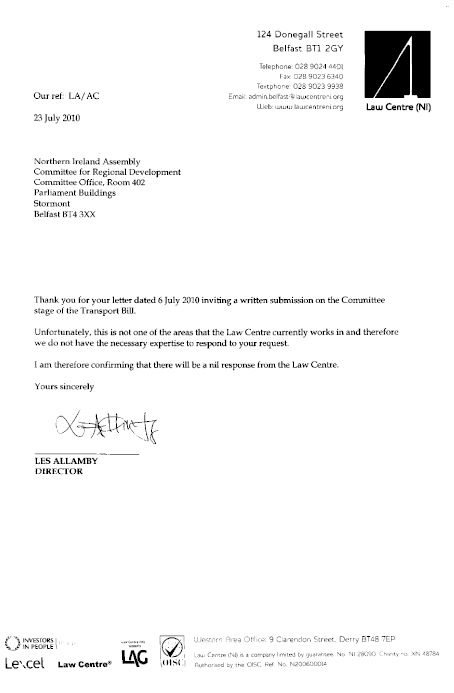
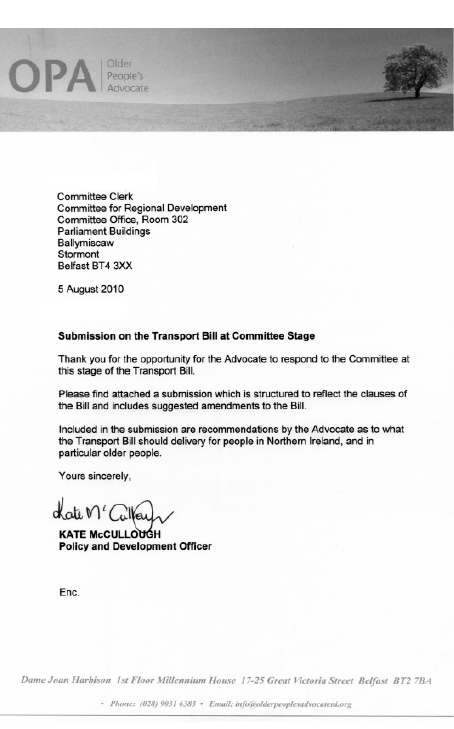
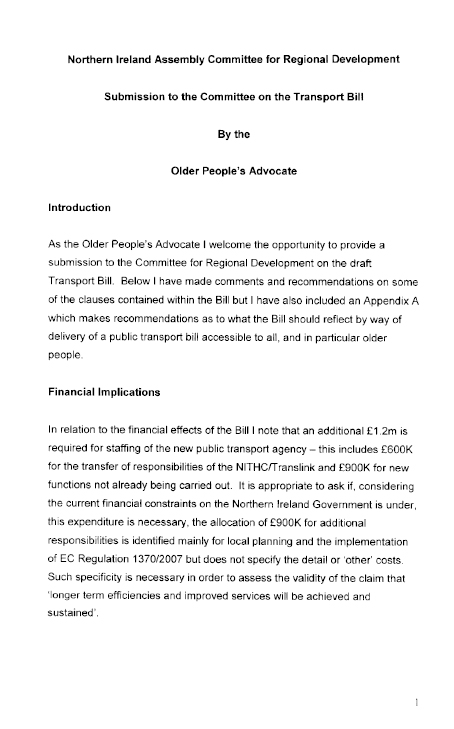
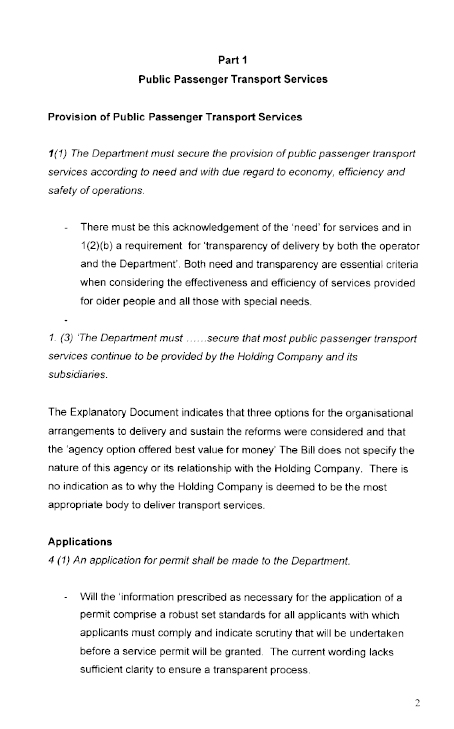
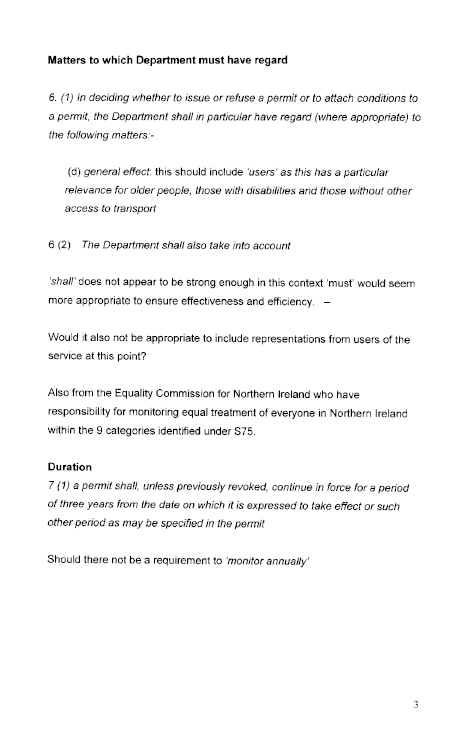
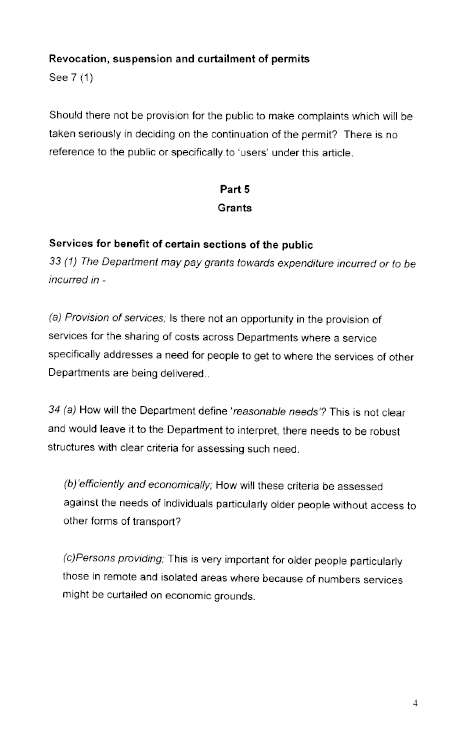
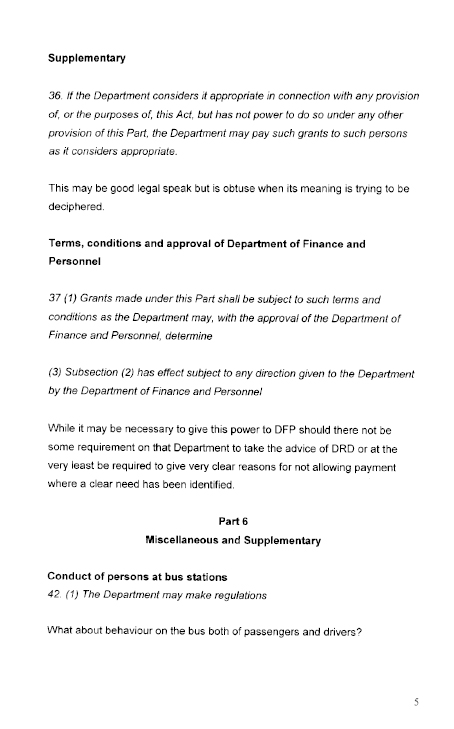
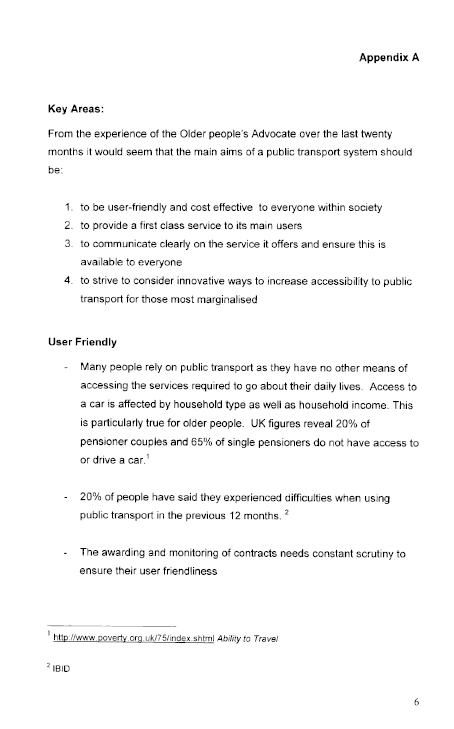
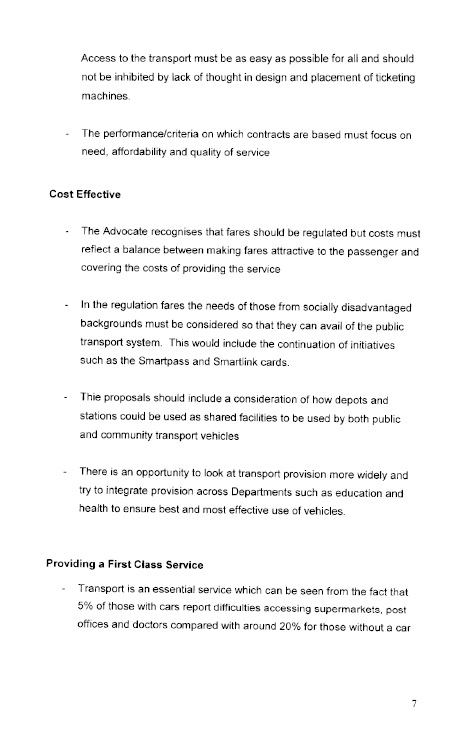
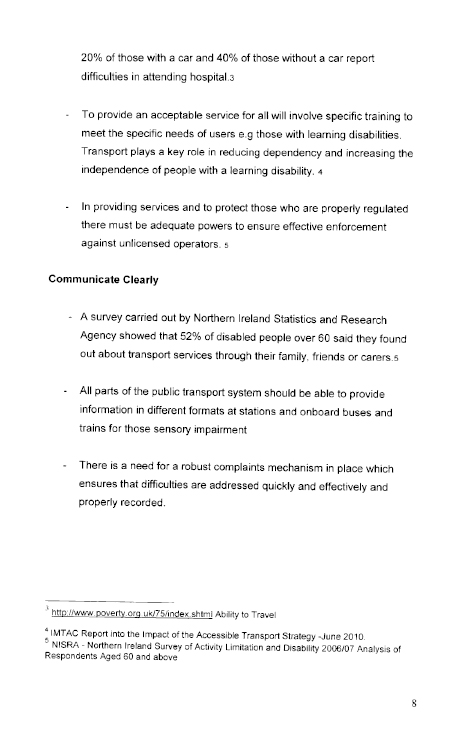
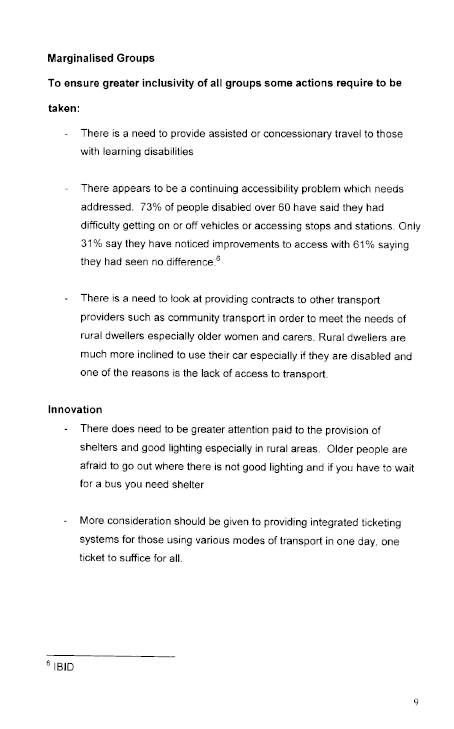
Northern Ireland Environment Link (NIEL) is the networking and forum body for non-statutory organisations concerned with the environment of Northern Ireland. Its 58 Full Members represent over 90,000 individuals, 262 subsidiary groups, have an annual turnover of £70 million and manage over 314,000 acres of land. Members are involved in environmental issues of all types and at all levels from the local community to the global environment. NIEL brings together a wide range of knowledge, experience and expertise which can be used to help develop policy, practice and implementation across a wide range of environmental fields.
These comments are agreed by Members, but some members may be providing independent comments as well. If you would like to discuss these comments further we would be delighted to do so.
Prof Sue Christie, Director
Northern Ireland Environment Link
89 Loopland Drive
Belfast, BT6 9DW
W: www.nienvironmentlink.org
Northern Ireland Environment Link is a Company limited by guarantee No NI034988 and a Charity registered with Inland Revenue No XR19598
NIEL welcomes the progress of this Bill and would like to offer the comments below.
In Part 1 Section 1 we feel it is very important that the concept of sustainable technology and use of resources, in particular carbon, is mentioned along with the other areas with which the Department must ensure compliance. Insertion of words to this effect, such as environmental sustainability, carbon efficiency or resource efficiency is necessary in this first paragraph of the Bill to demonstrate that the Department is ensuring that the delivery of this Bill plays its part in the drive to reduce greenhouse gas emissions in Northern Ireland.
In Part 5, sections 33 and 34 the use of the word 'may' should be supplemented by an indication that this is an important service to be provided. The wording at present leaves it appearing that this is an optional and therefore unimportant service. The need for public transport provision for residents in these categories should be fully acknowledged in the Bill.
Part 6 Section 43 would benefit from specific mention of the importance for all those involved in provision of public transport to work together to provide integration of their services to benefit the users of the service.
13 August 2010
Belfast Healthy Cities welcomes the opportunity to comment on the draft Northern Ireland Transport Bill.
Belfast Healthy Cities is a partnership organization working to improve the health and wellbeing of people in Belfast and beyond. Belfast is also a leading WHO European Healthy City, designated to Phase V (2009-2013) of the WHO European Healthy Cities Network with a strong track record of meeting WHO objectives in the previous four phases. Key partners include Belfast City Council, Public Health Agency, Belfast HSC Trust, Northern Ireland Housing Executive, Bryson Group, Planning Service and Queen's University of Belfast.
The key aim of Belfast Healthy Cities in Phase V is to integrate health and health equity in all local policies. The work of the WHO European Healthy Cities Network in Phase V builds on the WHO Commission on the Social Determinants of Health, which identified improved living conditions and a fairer distribution of assets, resources and power as key to sustainable health and wellbeing, as well as long term prosperity of all countries. The role of Belfast Healthy Cities' office, as a focal point for intersectoral collaboration and liaison with WHO, is to identify mechanisms and tools for achieving this as well as building and sharing evidence to support the work.
We broadly agree with the scope and provisions of the Bill. In the following, we outline some further comment in relation to clauses we feel are particularly relevant from the perspective of improving health and health equity. Belfast Healthy Cities would of course be happy to provide further detail on any aspect of this response, should that be helpful.
Firstly, however, we note in the Explanatory and financial memorandum that an Executive Agency will be established within DRD to specify and manage contracts with public transport operators. We would stress that it is important that the Agency works in close collaboration with the policy making divisions of DRD, in particular the Regional Planning and Transportation Division and Transportation Division, to enable the Agency to effectively meet policy objectives and targets, and engage in developing future policy.
Clause 1 states that 'The Department must secure the provision of public passenger transport services with due regard to economy, efficiency and safety of operation'. We would note here that public transport providers also should take into account how economic the service provided is for passengers and potential passengers. When setting fare structures, ensuring affordability is essential to promote the mobility and social inclusion of the most vulnerable groups in society, including older people, people with disabilities and people on low incomes. Affordable fares can also help incentivize public transport usage, especially in comparison to private cars, and can contribute to increasing patronage.
Clause 6 does not include views of users or potential users of a service, or persons living along the proposed route, among issues to which the Department must have regard. Such consultation can, however, provide valuable qualitative information on how a service would affect these stakeholders, and improve decision making. For example, a new route may improve people's access to jobs and services. In some cases, in particular where a new or additional service is provided in rural areas, new job opportunities may become viable, which contributes directly to Programme for Government aims of a fair and prosperous Northern Ireland. A mechanism for gaining views could therefore support the objective of an economically sound and sustainable public transport system.
Clause 33 and Clause 34 appear to relate to the Door-to-Door scheme and community transport schemes across Northern Ireland. These services significantly contribute to the health and wellbeing of older people, people with disabilities and rural dwellers without access to a car, by offering affordable access to services. For many users, these transport services also provide a vital opportunity for social interaction, which underpins mental wellbeing as well as social cohesion. It is to be welcomed that support for these services is enshrined in the Bill. However, for the long term wellbeing of users of these services it would also be important that a minimum service is defined and commitment to providing such level of service is given.
Clause 42 considers the important issue of conduct of persons at bus stations. As safety concerns are one barrier to increased public transport use, in particular among vulnerable groups such as older people, regulations that are appropriately publicised and enforced can help tackle this barrier, which not only limits patronage but also may limit mobility for some population groups. It would be helpful if it was clarified whether regulations also apply to all waiting areas for public transport, eg. larger bus shelters.
Providers should also consider the design and maintenance of bus station buildings, as this can play a significant role in promoting and ensuring safety and comfort of public transport passengers.
In addition, it is important that conduct of persons on public transport vehicles is regulated through appropriate provisions.
9th August 2010
Committee Clerk
Committee for Regional Development
Committee Office Room 402
Parliament Buildings
Stormont
Belfast BT4 3XX
Following a meeting with members of FPT NI to review the Transport Bill, I would advise that with the exception of the following , there were no other comments.
Provision of Public Passenger Transport Services
2(c)
Comments :-
Examples of what is meant by non contracted services would be helpful to understand exactly services are being referred to.
2(f)
Allows the Department to exploit any commercial opportunities which it considers appropriate in securing the provision of public passenger transport services.
Comments :-.
Whilst there is agreement that the Department should be able to exploit commercial opportunities, this should only be under certain conditions and not where there is direct competition with other transport providers or companies who are private organizations and not publicly funded.
It is important that any commercial activities undertaken should be specific to certain activities such as advertising on vehicles or bus depots but not on passenger transport services , otherwise the parameters of what is socially necessary and the exploitation of commercially activities becomes somewhat clouded and could potentially cause problems..
(3)
The Department must, subject to subsection (1) and Regulation (EC) No. 1370/2007, secure that most public passenger transport services continue to be provided by the Holding Company and its subsidiaries.
Comments :-
Obviously this secures Translink's position as the main transport supplier of services and directly awards most of the current services to them subject to mandatory requirements laid down in regulation EU1370/2007.
However, there is no mention made to the other services currently carried out by private sector transport providers. Will these services be included under the same directly awarded contract?. Or will they remain with the original operator?
If they are directly awarded to Translink, then how will this process be handled ? Is there an appeal against this decision to award to Translink or a compensation scheme for the loss of livelihood?
Matters to which Department must have regard
(1) In deciding whether to issue or refuse a permit or to attach conditions to a permit, the Department shall in particular, have regard (where appropriate) to the following matters :-
(a) The suitability of the routes on which the service may be provided under the permit;
What exactly is meant by suitability of a route? And what criteria is applied when considering this?
(1) The powers conferred on an authorised person by this section are exercisable for the purpose of ascertaining whether any provisions of, or made under, this Act are being complied with.
What constitutes an authorised person? Will authorised persons be specific personnel employed by the Department or can an 'authorised person' also be DVA Enforcement personnel and PSNI personnel?
(1) The Department may pay grants towards approved capital expenditure incurred or to be incurred in—
Will capital grants be available to all transport operators equally as this is not specifically detailed ?
Shared Transport Facilities
Comments :-
(2)
There is the obvious fear based on past experiences that transport facilities will not be available equally to all operators providing public transport services. The new arrangements must ensure that there is both equality of use and access to, transport facilities for all transport operators providing passenger transport services?
I would also advise at this time , that we would be pleased to have the opportunity to provide an oral briefing to the Regional Development Committee.
Yours sincerely
Chief Executive
This response is made by the Northern Ireland Transport Holding Company, whose main operating subsidiaries are Ulsterbus, Citybus (Metro) and Northern Ireland Railways. These subsidiary companies trade under the name of "Translink". For ease of reference, we use the name "Translink" throughout the document to refer to the parent undertaking, the subsidiaries and the Group in general.
Translink notes that the Regional Development Committee (the "Committee") will be considering the Transport Bill during its formal Committee Stage in the Assembly. It also notes that written evidence will be accepted until August 16th 2010 and that the Committee intends to produce a report on its consultation findings during the first half of October 2010. As an organisation with an unrivalled interest in the promotion and modernisation of public transport policy in Northern Ireland, we welcome the opportunity to submit evidence to the Committee at this particular time, and in the future.
In broad terms, Translink welcomes the Bill and the opportunity to comment on, and contribute to, its content prior to passing into legislation. For the most part, the Bill represents a significant step in the process toward modernising public transport and instilling best practice throughout the wider EU transport sector. The Bill provides greater transparency and certainty in terms of funding, relationships, and joined-up service provision.
Translink therefore supports the Department for Regional Development ("DRD") in its vision to improve the present public transport regime along the broad lines envisaged in the Bill. New public transport law is arguably long overdue. Primary legislation in this area has been passed in 1948 and more recently in 1967. Forty three years on, the time is ripe to look afresh at the various enforcement, financial, contractual, governance and other related building blocks to ensure Northern Ireland retains a modern, fit for purpose public transport system. It is in everyone's interests that this Bill delivers a progressive framework, not just for the short term, but also for the longer term.
We submit the following comments along with four specific recommendations, and look forward to further engagement and feedback in due course.

Catherine Mason
Group Chief Executive
Translink
1. Translink notes the Committee's wishes that "written submissions should be structured to address the specific clauses of the Bill". Insofar as we have been able to do so, our comments address each of the six Parts of the Bill, and a number of individual clauses where appropriate. There will however be some general themes and issues which are not "clause-specific". Rather, such general themes capture two wider points which we believe need to be considered and our submission starts with these.
2. We note the new powers and functions being given to the DRD in what we would call "blanket terms". Translink, being one of a number of transport operators, will have a direct and extremely important regulatory relationship with the new Agency. The Bill does not demarcate which of the DRD functions, powers and duties will be vested in the Agency and which will be vested in the DRD as transport policy lead (and Translink sponsor). It would be very helpful for the industry and for customers to understand what new powers, competencies and role will go to the new Agency, and indeed how the DRD envisage the day to day interactions and operation of the Agency's new regulatory relationships will work. Neither the Bill nor the sub-Regulations appear to address this information gap.
Recommendation 1: Translink recommends that it would be helpful for the Committee and for stakeholders in general to have a better understanding of the nature and extent of the work and remit of the new DRD Agency (for example by way of an information-memorandum which would deal with items such as constitution, operation, interactions, and costs).
3. The Bill is drafted well and is succinct, numbering no more than fifty clauses. This is a distinct benefit to those who will come to rely on the resultant legislation in due course. Brevity in the primary legislation will add a degree of flexibility as future public transport arrangements evolve, but this is not entirely without risk.
4. The permissive nature of the Bill, which cedes prescriptive detail to possibly more than nine sets of subordinate Regulations, requires some further thought. The real prospect of less legislative scrutiny for the detailed Regulations (using the negative resolution procedure) could have unintended effects. For example, the Committee may wish to seek better information on the scope of bus passenger conduct rules, the rationale the DRD will use when designating "shared facilities" or indeed whether there might be any further indirect extensions of the criminal law by use of Regulations.
Recommendation 2: Translink recommends that the Committee explores the intended use and phasing-in of subordinate Regulations by the DRD, and considers the case for alternatives. (i.e. using Directions instead of Regulations, or conversely, by adding more primary-legislative certainty to the existing Bill where it can be accomplished (for example by incorporating 'subsidiary company' provisions into the Bill and thereby dispensing with potentially unnecessary Regulations which Clause 15 envisages).
5. Clause 1 (3): We welcome the commitment that most public passenger transport services will continue to be provided by Translink. Whilst recognising and welcoming the public mood to increase competition in transport, Translink's fully integrated public transport network is the most developed and effective base from which to consider and serve additional routes and services.
6. The Bill provides a framework for bringing Northern Ireland into line with Regulation EU 1370/2007. Northern Ireland's public transport arrangements will keep pace with EU best practice in terms of transparency, new public service contracts for services/permits and routes, and links between funding streams and network/service provisions. The devil in the detail remains of course subject to the content of individual public service contracts, and any subsequent Regulations which will govern them. Nonetheless we repeat our support of the new arrangements which will create consistency, certainty and transparency in the discharge of public service obligations and public transport functions in general.
7. Clause 1 (2): We note the taking of six new statutory powers by the DRD, in order to secure the provision of public passenger transport services with due regard to economy, efficiency, and safety of operation.
8. We refer to our first general theme as previously outlined. Translink maintains that for reasons of legal certainty and market confidence that the precise split between the Agency's independent role and the DRD's policy and Translink-sponsor role should be set out as a matter of priority. This explanation should also assist in understanding which of the two will be taking and using the powers at Clause 1 (2) of the Bill. For example, will it be the Department as Translink sponsor which exercises the power to set the level and structure of fares, or will it be the Agency as independent regulator? We assume the latter (for reasons of perceptions of conflict of interest if it were the former), but along with the Committee, would benefit from greater clarity.
9. We note with particular interest the Department's intended new power at clause 1 (2) (f) of the Bill to exploit commercial opportunities in the public transport arena. We would be keen to gain an appreciation as to how such a power sits alongside Translink's similar property holding and commercial mandate. The Committee will note that the Holding Company is required by law to act in accordance with the Transport Act (NI) 1967 "as if it were a company engaged in a commercial enterprise".
10. Having successfully endeavoured to act as a commercial enterprise since 1967, and having benefited from the diverse private and public sector expertise from our nonexecutive and executive directors over the period, Translink has become accustomed to the identification and treatment of commercial risk. We have a track record of identifying and exploiting commercial opportunities. We trust that the DRD's new power to acquire and dispose of land and exploit commercial opportunities will be used thoughtfully and with care. Translink anticipates that such power will not conflict with or supervene in any case Translink's property holding and commercial mandate.
11. Recognising the new legal powers being taken by the DRD and/or the Agency, we note that DRD will be subject to greater consultation requirements as a result. In exercising the power at clause 1 (2) (d) to "determine the general level and structure of fares", the Department will be mindful of the need to exercise this Determination in the manner befitting of similar public law powers – i.e. after due procedural care, full ventilation of the fare options and only after intelligent debate with stakeholders has taken place.
12. The way in which fares will be regulated is not a focal point of the Bill. That said it is probably one of the most important features of the new arrangements as viewed through the eyes of paying customers and service operators. The degree to which transport operators can cover their costs, make a reasonable margin, and bear commercial risk is not presently clear. Translink would like to draw attention to the logic that if this clause remains in the Bill, then greater commercial risk arising from fare-setting by a third party should be accompanied by greater commercial freedom for operators, not less. To illustrate the point, Translink and other operators need to understand whether or not the regulatory model will use risk-loaded 'net' cost contracts or fully recoverable 'gross' cost contracts, so that appropriate budgeting control can be used for particular services run by particular operators.
13. Clause 6: Translink has already stated its appreciation of the benefits that well drafted, sensible public service contracts will bring. When applying for a contract, or a service permit, the matters to which DRD must have regard prior to award should be fairly clear to all. Customers need to be protected from operators 'cherry picking' the most remunerative routes to the detriment and neglect of non-profitable routes - for example many of Northern Ireland's rural community services. In various industries which serve the public interest, different mechanisms are used (grants in the water sector, postalised tariffs in the gas sector, cross-subsidies etc) to bring a form of assurance and equalisation to ensure universal protection to all users of a wide and disparate network.
14. For public transport purposes, country-wide safeguards in the award of contracts and permits and for the setting of fares should be put in place. The Committee will want to satisfy itself that Translink retains the ongoing commercial ability to maintain the contracted network (through grants, or cross subsidies or through other means) in order to discharge its public service obligations for all of Northern Ireland's transport users.
15. In light of recent events this July at Lurgan, it is germane to the delivery of future rail public service contracts that full account is taken of the impact of civil unrest and other factors outside the control of the operator. We believe that the Committee and the DRD will take cognisance of this factor when considering the scope and drafting of public service contracts. Like any contract, there will be circumstances and events which cannot be envisaged, where experience and authority will necessarily take precedence over the strict letter of terms and conditions. Translink has unparalleled experience of dealing with such circumstances often on an emergency basis, and will continue to deploy the skill and experience of trained local staff whenever unrest or other unforeseeable events occur in future. Common sense treatment of such (not uncommon) incidents will be important for performance measurement and contract monitoring by the Agency.
16. Clause 18: The renaming of the "road service licence" to the "bus operator licence" is a modernising step. DRD's forward thinking here is to be welcomed.
17. Clause 21: Whilst noting the modernising changes to the 2008 Taxis Act, Translink is of the view that in time there may be merit in extending the scope of transport law to include taxi "regulation" more formally within the public transport network. This could be achieved by looking at network coverage, fares, ticketing, information, service quality, general regulation and enforcement. We query whether it is a little premature and possibly outside the scope of the present, all be it permissive Bill, to facilitate this future extension. The Committee should note though that allowing for discretionary regulations which can be made in future is not uncommon in Northern Ireland statutory terms. Such a step would avoid the need for future primary legislation to enter into the Assembly timetable in the short to medium term future.
18. Clause 22: DRD have updated Translink's founding legislation in a small number of places. This particular example modernises the primary statutory duty of Translink's railway undertaking (Northern Ireland Railways Company Limited). It is a refreshing and progressive piece of updating which we commend to the Committee.
19. Clauses 22-24: As a significant policy stakeholder in the public transport field, the clarification of the role of CCNI is welcomed. Translink values the contribution of CCNI to many areas of its service provision, and trusts the Agency will take high regard of CCNI's viewpoints when it engages on essential areas of fare-setting and service provision in future.
20. Translink accepts and agrees with the need for strong enforcement powers, backed by criminal law where necessary, to police the compliance with permits, agreements and other requirements. We note that a civil regime replete with financial penalties and legally binding undertakings has not been preferred as a means to deliver compliance in public transport. We question whether this is a missed opportunity, as in other industries here (e.g. water and energy regulation), civil sanctions have led to improved company behaviour and the prospect of more finances being retained in Northern Ireland for the benefit of the industries and the infrastructure concerned.
21. Clause 25 et seq: Authorised officers are an important part of the enforcement framework to ensure that the highest operational standards are adhered to. Perhaps more detail will be released in due course, but it is not completely clear to Translink as to the types and numbers of DRD staff, Agency staff, and other "constables" which may be enlisted and named as Authorised persons from time to time. To have a somewhat flexible group of authorised officers may be helpful, but to have no clear boundaries or lists about who is or who can be an authorised person probably requires further thought. One risk with a loose definition of an authorised person is that the regime may be subject to abuse by rogue-enforcers purporting to inspect and seize other operators property; for these reasons greater assurance as to the identities, experience and numbers of authorised persons would be greatly welcomed.
22. Clauses 26-28: We wonder what type or quality of evidence will be required before an authorised person moves to having the reasonable suspicion or "reason to believe" that an offence is taking place allowing him or her to exercise the considerable power to seize property? Training in handling evidence and dealing with suspected persons fairly would be a pre-requisite which we are sure the Department (or Agency) will properly consider and wish to set in place.
23. Clauses 33-34: The DRD is to be credited for the clarity they bring through the Bill to the linking of grants to various policy priorities and end-uses. A transparent means of evaluating and benchmarking performance between various recipients of grants should be stipulated, and will no doubt occur as the DRD and Agency seek to measure value for public money, from service to service, and from operator to operator.
24. Clauses 38-40: In developing a key aspect of this response, Translink notes and understands that the Department will be keen to take powers over land if it is to make full use of its intended property holding and commercial exploitation functions. We note the Second Stage Reading of the Bill which says it contains, "powers for the Department to acquire and dispose of land where that is necessary for public transport purposes"
25. We have already said at paragraphs 9 and 10 of this response that DRD's use of new powers to hold property indeed brings commercial opportunities for the government but also brings an element of commercial risk. Translink's Holding Company was established in 1967 precisely to hold property and act as if it (and its subsidiaries) were a commercial enterprise. And so it follows that Translink would welcome an assurance confirming that respective commercial mandates will not collide or overlap, and that the Holding Company's powers in this field will not be curtailed or removed.
26. Clause 42: We welcome the plan to roll out a similar system of byelaws for bus facilities as that which is currently in place at rail facilities. Subsequent Regulations for this purpose might include all land in the ownership of public transport operators and the regulation of conduct in relation to (for example) fly tipping / littering. The periodic change of penalty for breach of byelaws could be readily facilitated by the Regulations or perhaps by a use of Directions which could be issued under Regulations.
27. Clause 43: Having been accustomed to managing and owning various properties and premises since its establishment, Translink would helpfully suggest that quite significant powers to direct "shared transport facilities" need to be exercised with some measure of sensitivity and care. Directions under Part 6 need to take a balanced approach when weighing multiple-operator interests against the rights of businesses and owners of "shared" facilities to lawfully enjoy their property and possessions. There would need to be proportionate limits and thresholds as to what can be done on someone else's property (especially as in most cases the property in question would not in fact comprise public space or public property). Translink, as a significant property holder, respectfully reserves a right to constructively contribute to any subordinate Regulations which DRD intend to use to flesh out the details underlying shared facilities.
28. Clause 43: On a point of clarification we suggest that the Bill's description of shared transport facilities as comprising "any place" is amended to realign with the more precise language of the Explanatory and Financial memorandum, and of previous Hansard reporting (Volume 54, No 2). We suggest that the potential designation of "any place" is wider than the designation of any "premises or facilities".
29. We believe that even the prospect of using "premises or facilities" is potentially too wide. The designation could alternatively refer to those essential facilities used by passengers to access services, including bus stops. Specific exclusions could encompass engineering works, back-office areas and financial/HR premises.
Designations of shared facilities are therefore not without their challenges. Wide designations may be practically difficult, legally and commercially problematic and operationally inefficient. Nevertheless we remain committed to assisting the DRD to the fullest extent to deliver future sharing arrangements which are well thought through, commercially fair and most importantly, beneficial to the paying customer.
30. We note the stakeholder evidence gathering event in September 2010 as planned by the Regional Development Committee at its 23rd June meeting. Translink will of course be delighted to attend such an event and we look forward to receiving further details from the Committee.
31. We thank the Committee again for the opportunity to comment on this timely and constructive Bill which we at Translink support in broad terms.
The Community Transport Association
The CTA is a national charity giving voice and providing leadership, learning and enterprise support to member organisations, which are delivering innovative transport solutions to achieve social change. CTA UK promotes excellence through providing training, publications, advice and information on voluntary, accessible and community transport.
Voluntary and community transport exists to meet the travel and social needs of people to whom these would otherwise be denied, providing accessible and affordable transport to achieve social inclusion.
The CTA is the representative body for third sector passenger transport operators in the UK. CTA Member organisations are involved in the provision of transport, especially accessible services. Our membership consists of 1400 organisations.
The CTA welcomes the opportunity to contribute to The DRD Committee's considerations on the clauses of the proposed Transport Bill 2010.
Any queries regarding this response should be directed to:
Kellie Armstrong
Director for Northern Ireland
Community Transport Association
Room 109, CityEast
68-72 Newtownards Road
Belfast
BT4 1GW
1. The CTA has reviewed the content of the Transport Bill 2010 and propose the following considerations be addressed before the Bill is presented
2. The CTA congratulates the informed and progressive approach taken throughout the Bill. There are however areas where legislation and policy development of other government departments may make parts of this Bill obsolete
3. Section 6 (1) (e) the need for ensuring fair completion among persons providing public passenger transport services - The CTA would ask regard is made to allow provisions for innovative, non-economical routes that could be delivered by not-for-profit, community transport providers operating under the s10b permit regime. By its nature, not-for-profit transport delivered by and for the community remains outside commercial competition rules. The validity of transport routes on the basis of competition is mute in areas where there will be low patronage but much needed access links will ensure social exclusion and rural isolation are addressed.
4. Section 6 (2) (b) The CTA recommends consideration should be sought from the local community. By taking into account community need the Transport Bill will ensure isolation and exclusion zones are not created through 'cherry picking' of economically advantageous routes.
The CTA plays an integral role in supporting community led transport planning. We would urge the Transport Bill to include the CTA alongside the Consumer Council in representing community issues.
5. The Bill refers to revocation, suspension and curtailment of permits (Section 10) or disqualification of permit (Section 11) – it does not however state clearly how transport can be delivered during times when transport is affected by the above. Section 11 (6) states while a permit is suspended no alternative services may be provided through that permit. CTA would encourage an additional clause is included to allow the Department to continue transport provision through issue of a temporary permit to enable another supplier to deliver transport services in the interim and until the original permit is out of suspension or awarded to an alternate supplier.
6. Section 33 (2) The reference to the 'section 10b permit' may be mute. The DoENI Review of Operator Licensing (June 2010) proposes a fundamental change in licensing arrangement for all community and voluntary sector transport provision. The consultation proffers the DoE's preference to remove in its entirety the s10b bus operating permit replacing it with a yet confirmed Community Licence Tier 3 and a semi commercial license Tier 2. Given the high level of community outrage and concern over the proposal to decimate community led transport solutions it is expected DoE will restructure proposals and reissue a new consultation autumn 2010. This could have impact on the progress of the Transport Bill.
7. Section 35 The CTA congratulates the Department's consideration to provide a grant in support of advice, information, support or training. The CTA has particular investment in this clause as without provision the advisory, legal and technical services of CTA could not be funded. There is no other funding available for a regional transport infrastructure body through DoE, DSD or any other government department.
8. Interpretation Section 47 (b) refers to the section 10b permit which may or may not exist post 2010.
I would wish to record a Nil response on behalf of Craigavon Borough Council to the above Transport Bill.
Regards
Lewis
Lewis Porter BA (Jt. Hons.) MEPS
Principal Administrative Officer
11 August 2010
Committee for Regional Development
Room 402 Parliament Buildings
Ballymiscaw
Stormont
Belfast BT4 3XX
Thank you for your letter dated 6th July 2010 informing Imtac of the public call for evidence inviting written submissions on the clauses of the Transport Bill.
Imtac has been involved in the consultation around developing proposals for Public Transport Reform and submitted a response to the public consultation at the end of last year. The Committee agree in broad terms with the proposals for reform and legislation which will give the Department powers to carry out these proposals.
Our chief concerns around Public Transport Reform have largely centred the practical outcome of the process in relation to the impact of changes on access to services by disabled people and older people. As you will be aware the Department has made major commitments with regard to disabled people and older people including:
Many of the practical issues around building in accessibility can be addressed during the implementation of the reform process and indeed we have a commitment from the DRD to implement the policies of the ATS during this process and through the workings of the Passenger Transport Agency. However we still believe there is a requirement from the Department to reaffirm the commitment made in the RTS to build in accessibility as a condition of spending public monies on transport. We recommend this should be achieved by including accessibility under the relevant clauses of the Bill as a matter the Department must pay due regard to when using powers under the Transport Act to secure services.
This is the only comment Imtac has on the provisions of the Bill. As always we are happy to provide further information or assist the Committee in any way with consideration of the Bill.
Yours sincerely
Frank Caddy
Chair
16th August 2010
The Institute of Public Health in Ireland
www.publichealth.ie
Dublin Office: Belfast Office:
5th Floor Bishops Square Forestview
Redmond's Hill Purdy's Lane
Dublin 2 Belfast BT8 7ZX
Ph: 00 353 1 4786300 Ph: 048 90648494
The Institute of Public Health in Ireland (IPH) aims to improve health on the island of Ireland by working to combat health inequalities and influence public policies in favour of health. IPH promotes cooperation between Northern Ireland and the Republic of Ireland in public health research, training and policy advice.
Health is influenced by a wide range of social determinants, including economic, environmental, social and biological factors. Transport is one of the key determinants of health and IPH welcome the opportunity to contribute evidence to the Transport Bill as part of the Committee for Regional Development inquiry.
IPH recognise the Transport Bill is a technical report. We believe we have a significant contribution to make to the evidence in relation to transport and its relationship to health and therefore welcome the opportunity to present to the Committee.
IPH has published a range of supporting information in this area including the Health Impacts of Transport[1] and the Health Impacts of the Built Environment[2] and are currently developing an Active Travel and Health review. Through this work IPH has developed extensive knowledge and the following response provides further information on how transport can impact on health for the Northern Ireland population.
Transport is a major contributor to climate change which is identified as one of the biggest public health issues of the 21st Century. Northern Ireland has higher greenhouse emissions than the UK which can be attributed to our transport (and agriculture) emissions. The health impacts of climate change across the island of Ireland include an increase in mortality from cardiovascular or respiratory disease, particularly for people living in cities[3]. Regional transportation systems and behaviours have a major role to play in addressing climate change and reducing levels of greenhouse gases attributed to transport.
Current Northern Ireland transport policy is heavily focused on developing structures for the motorised vehicle and whilst this is required to support infrastructure and economic growth there is a need to complement this investment with other measures which focus on encouraging active travel such as walking and cycling. Since the inception of the Regional Transportation Strategy in 2002, Northern Ireland's greenhouse gases have been increasing and transport accounts for 25% of these emissions. Northern Ireland's transportation patterns heavily rely on private transport with 84% of travel to work journeys in 2007 being car, van or minibus[4]. Looking specifically at independent journeys, the average car journey length is just over seven miles long and 17% of all journeys are less than one mile[5]. A modal shift towards reducing dependency on private transport for short journeys can support a reduction in greenhouse emissions.
Transport is the main source of health-damaging air pollutants with concentrations highest near major roads and in urban areas. Poor air quality contributes to respiratory disease particularly amongst disadvantaged urban areas and amongst vulnerable groups such as the elderly and those whose health is already impaired.
Vehicle noise imposes disturbance and discomfort and many health effects including increased cardiovascular disease risk, stroke, hypertension, depression and a lack of concentration and impaired cognitive development in children[6] are linked to stress hormones in people exposed to noise pollution. Noise pollution is greatest in dense urban areas where exposure is greatest (i.e. people are located close to roads).
IPH recently submitted a response to the DoE road safety strategy. We recognise the responsibilities of different government departments but call for joined up action in relation to transport policy. Many actions planned by the DRD Travelwise programme support a healthier approach to transport by promoting cycling to work, enhancing safety initiatives for young people to encourage walking to school and instilling behaviours at a young age which will continue into adulthood. Promoting environments which are conducive to walking and cycling support opportunities for healthier communities.
Physical activity is a key factor in preventing obesity and obesity-related diseases such as diabetes, cardiovascular disease and some types of cancer. It can also help to improve mental health and maintain strong bones[7]. Incorporating physical activity into everyday activities is considered to be one of the most sustainable ways of increasing activity. Thus replacing short car trips with active travel modes such as walking and cycling presents a major opportunity to shift modes of transport towards active travel which can improve levels of physical activity among children, adolescents and adults.
Northern Ireland is currently facing an obesity epidemic as 59% of all adults in Northern Ireland are either overweight or obese with 24% of these obese[8]. Amongst children, 22% are either overweight or obese, with more than 5% already obese[9]. It is recognised that a major contributor to our sedentary lifestyles is the environment in which we live and how we use travel options to facilitate our journey requirements. IPH forecasts that if the current trends in obesity continue then over a 15 year period there will be a 40% increase in the proportion of people with Type 2 diabetes[10]. This has major consequences for Northern Ireland due to the loss of productivity and the costs of care. Obesity is estimated to cause 450 deaths per year, cost £14.2 million in lost productivity and £90 million in health and social care costs. In 2010 the cost of physical inactivity and obesity to the Northern Ireland economy is likely to exceed £500m and therefore it is essential there is a shift towards more active travel patterns in Northern Ireland. A recent inquiry into obesity by the Northern Ireland Assembly Health Committee identified that 'all Departments and sectors have a crucial role to play in tackling obesity' and there was a need for the 'Executive to fully recognise the potential impact of the obesogenic environment on the health and wellbeing of the population'[11].
There are many factors which contribute to increased sedentary living. Urban sprawl, where land use spreads out into areas adjoining the edge of the city can increase car dependency and evidence shows that those living in such areas drive three to four times more than those who live in efficient, well-planned areas. It has also been shown that each additional hour spent in a car a day can be associated with a 6% increase in the likelihood of obesity.
Promoting a culture shift towards increasing active travel is required in Northern Ireland however to support this there needs to be appropriate infrastructure and investment for long-term gains. Guidance from the National Institute for Clinical and Health Evidence (NICE) supports this by recommending transport planners should 'ensure pedestrians, cyclists and users of other modes of transport that involve physical activity are given the highest priority when developing or maintaining streets and roads which can be achieved by widening pavements and introducing more cycle lanes'[12].
Public transport also contributes to a more active lifestyle as accessing public transport usually involves walking to or from the service which can enhance physical activity levels and ccontribute to nearly two-thirds of the recommended 30 minutes of daily physical activity levels[13]. However to ensure that public transport is identified as a transport option, services need to be efficient, cost effective, connected to different forms of public transport e.g. buses and trains and also supported by safe environments in which people wait to access the service.
Other options such as park and ride schemes which are designed to reduce private car usage in town centres need to be sited far enough from the city centre to make real benefits. Park and ride sites need to have appropriate security measures in place e.g. lighting to ensure they are seen as attractive to users[14]. Town centre car parking options also need to be reduced to fully support a drive towards decreased private transport usage.
IPH recognises and supports current DRD efforts to contribute to increasing physical activity initiatives such as the DHSSPS Obesity Prevention Steering Group and placing a strong focus on developing sustainable travel policy. IPH call on the Regional Development Committee to show leadership to really engage in offering alternative modes of transport which support physical activity and tackle health related problems such as obesity in Northern Ireland.
Transport plays a vital role in connecting communities to services and social contacts which contributes to creating healthy environments and reducing non-communicable diseases such as respiratory and cardiovascular diseases, and preventing injuries[15]. A well planned transport system can facilitate social connections which are important for mental health. Neighbourhood designs most likely to promote social networks are those that are mixed use and pedestrian orientated, enabling residents to perform daily activities without the use of a car. As traffic volumes increase, people's sense of neighbourliness decreases which results in decreased social connections. Lowering speed limits in residential areas also improves road safety as the introduction of 20mph limits could reduce all causalities by 60% and child causalities by 70%. Reduced speed limits also reduce noise levels and can encourage walking, cycling and public transport use. A multi-sectoral approach to regional development and transport can ensure sustainable transport systems are a key element of any new development or neighbourhood. Access to services can enhance opportunities for health e.g. providing access to education and employment opportunities. Alternatively journeys not made due to unavailability of transport services can contribute to poorer health
Health inequalities are the differences in outcomes between different population groups for example between different socio-economic groups or between males and females. There are a number of inequalities in Northern Ireland's current transport system. Children from deprived communities are more likely to be injured as a pedestrian in a road collision than those resident in the most affluent areas[16]. In Belfast, areas which exceeded air quality limits as a result of commuting traffic were all identified as deprived communities which are areas least likely to have access to private vehicles. Transportation needs to adopt a lifecourse approach to recognise that different users have different needs.
IPH welcome the opportunity to present to the Regional Development Committee to discuss this submission and wider transport and health issues.
For further information on this submission, please contact
Claire Higgins
Public Health Development Officer
Institute of Public Health in Ireland
Forestview
Purdy's Lane
Belfast
BT8 7ZX
Dr Jane Wilde
Chief Executive
Institute of Public Health in Ireland
Forestview
Purdy's Lane
Belfast
BT8 7ZX
[1] Kavanagh P, Doyle C, Metcalfe O., (2005) Health Impacts of Transport: a review. Institute of Public Health in Ireland: Dublin. Available at: www.publichealth.ie
[2] Lavin, T et al., (2006) Health Impacts of the Built Environment: a review. Institute of Public Health in Ireland: Dublin. Available at: www.publichealth.ie
[3] Institute of Public Health in Ireland (2010) Climate Change and Health: forthcoming.
[4] Department for Regional Development (2008) DRD Annual Transport Statistics 2007-2008
[5] Department for Regional Development (2008) DRD Annual Transport Statistics 2007-2008
[6]BMA, (2009) Transport and health, available at http://www.bma.org.uk/images/transportandhealth_tcm41-191801.pdf
[7] Warburton 2006 Health benefits of physical activity: the evidence, Canadian Medical Association journal, Vol 174, No. 6, p 801-9.
[8] Health and Social Wellbeing Survey in Northern Ireland (2005)
[9] Child Health System, Northern Ireland (1997-2006) Obesity in Primary 1 Children
[10] Institute of Public Health in Ireland, (2010) Making Chronic Conditions Count, available at www.publichealth.ie
[11] Committee for Health, Social Services and Public Safety, (2009) Inquiry into Obesity, first report
[12] National Institute for Clinical and Health Evidence (NICE), (2008) Promoting and creating built or natural environments that encourage and support physical activity.
[13] Besser L and Dannenberg A. "Walking to Public Transit: Steps to Help Meet Physical Activity Recommendations." American Journal of Preventive Medicine, 29(4): 273–280, November 2005.
[14] Belfast City Council (2004) Health Impact Assessment of the Draft Air Quality Action Plan for Belfast
[15] Strategic Review of Health Inequalities in England post 2010 (Marmot Review). Available at: www.ucl.ac.uk/gheg/marmotreview
[16] Department of the Environment, (2010) Deprivation and Child Pedestrian Road Casualties
16th August 2010
NIC-ICTU welcomes the opportunity of giving its view on the content of the Public Transport Bill. It is our opinion that the Bill whilst meeting the regulations for Public Service Contracts as defined in EU Regulation 1370/2007 it (the Bill) does not adequately cater for the direct award concept contained in the Regulation. It is our contention that an exclusive right to operate (no other Operator permitted to compete) should be the preferred option for the Northern Ireland Assembly.
NIC-ICTU does not believe that 'perfect competition' as an economic theory meets the demands of a modern Public Transport System. Public Transport is an economic theory 'monopolistic' however we do believe that there is a role for small private Operators to be used as sub-contractors in the provision of supplementing a Public Transport entity.
The current Public Transport provision in Northern Ireland performs much better than any comparator throughout the rest of the United Kingdom despite the reduction in funding Translink has made savings, increased efficiency and increased passenger growth and services. There has been improved integration of Timetables, Bus & Rail Park and Ride Schemes and Services and we do not believe that if more service providers are involved that integration can ever be fully achieved.
NIC-ICTU welcomes the commitment in the Bill that most Public Transport Services will be provided by the Northern Ireland Transport Holding Company and its subsidiaries. However, as mentioned in our introduction there is nothing in the Regulations to currently prevent all of the service provision being contracted to Translink by DRD. NIC-ICTU is confident that by complying with EU 1370/2007 Public Transport Services in the form of Public Service Contracts will ensure transparency and consistency in the provision of an efficient and quality service.
NIC-ICTU is deeply concerned with the policy thrust contained in the Bill on Service Agreements and Service Permits. Our concern specifically relates to our experiences in other countries whereby operators who have received Licenses as per the content of this Bill do not adhere to the parameters set out in the License and set about to take existing passengers off the current Operator.
In the context of Northern Ireland where there is high non-compliance with the National Minimum Wage Legislation and other non-compliance in areas of taxation, etc, we fear for the Employment Rights of those employed by small Operators. In order to achieve any sort of compliance in such a system necessitates a policing of those Operators and high financial penalties and removal of license for those found in breach of contract. Applicants for an Operators License must be subject to a rigorous test of their professional ability, competence, financial security and other assessments commensurate with the provision of an efficient high quality service. NIC-ICTU is unsure of what the Fares Regulation means in terms of who bears the commercial risk. We are unable to interpret whether the policy in the Bill will operate on a net or gross cost basis.
NIC-ICTU acknowledges the fact that certain taxis operate bus type services under the current Road Licensing System. NIC-ICTU is pragmatic with regard to including amendments to the Taxi Act in this Bill.
NIC-ICTU acknowledges that the inclusion of a provision for Railway Services in conformity with EU Regulation 1370/2007 is a necessity and agreeable to NIC-ICTU.
NIC-ICTU welcomes clarification on the role of CCNI but is unclear as to how a non-elected Body bereft of any Public Transport expertise is granted a status in the Bill which ignores representatives of the employees. There is a view in the Trade Union Movement that in recognising 'the shared interest' between Departmental Agency and Consumer Council may well pose a threat to the retention of Public Transport Services as a public good.
NIC-ICTU believes that the proposed Offences and Fine Levels for Service Agreement/Public Transport Service Permit System are too lenient for those who would breach the contracts. Furthermore with regard to the appointment of Enforcement Officers it is the view of NIC-ICTU that the proper way forward is the appointment of a Transport Police Unit similar to those operating in GB and European countries.
NIC-ICTU is favourably disposed to this aspect of the Bill premised that those in receipt of public money should have their operation benchmarked and evaluated on the normal criteria in a transparent manner.
NIC-ICTU favours the granting of powers to the Department for the acquisition and disposal of land. NIC-ICTU envisage that this legislation will be used as an aide to enhance the Public Transport System in regard to the following:
Congress welcomes the Regulations concerning the conduct of persons in Bus Stations on a power with those currently in operation in Train Stations.
NIC-ICTU is concerned that the use of the term Shared Transport Facilities could be construed as a carte blanche opportunity for private licensed Operators to utilise publicly paid for facilities for private gain with no obligations to contributing to the upkeep of these services. NIC-ICTU is concerned that private Operators may seek to utilise:
NIC-ICTU is opposed to the extension of these facilities based on our arguments of private gain and health and safety dangers.
NIC-ICTU has serious concerns about how this Bill will be interpreted, operated and believe that in our experience of other similar type Regulations there will be a net welfare loss to passengers and to the whole concept of an Integrated Public Transport System.
From: Pat McBride
Sent: 16 August 2010 12:18
Parker Green International welcomes any proposal to streamline, co-ordinate and improve public transport provision within Northern Ireland and as such has no specific comment to make on the contents of the proposed Bill.
Pat McBride
Planning Advisor to Parker Green International
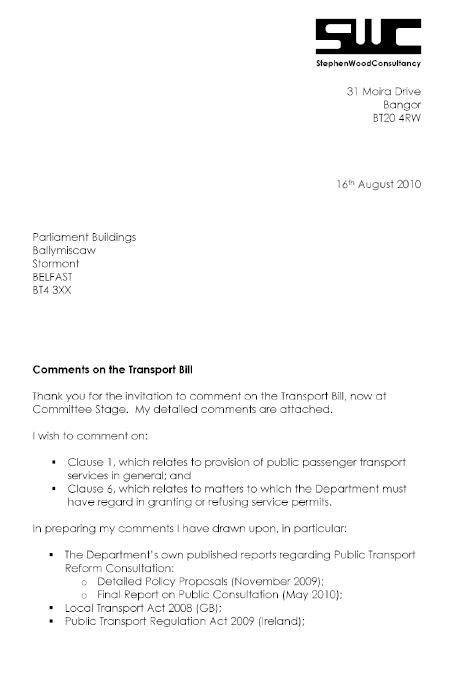
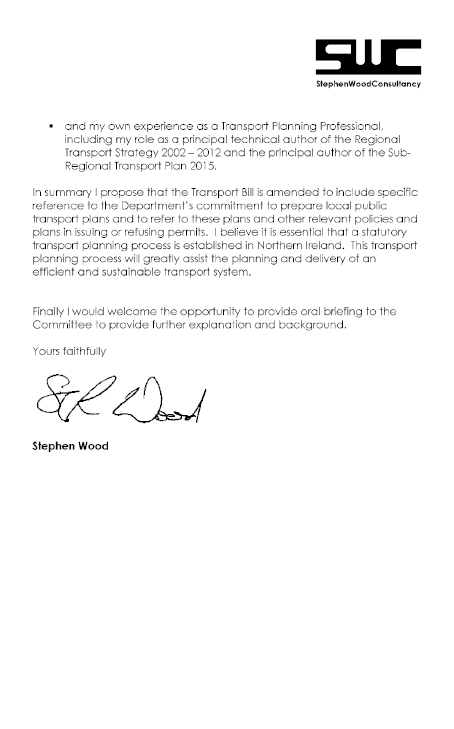
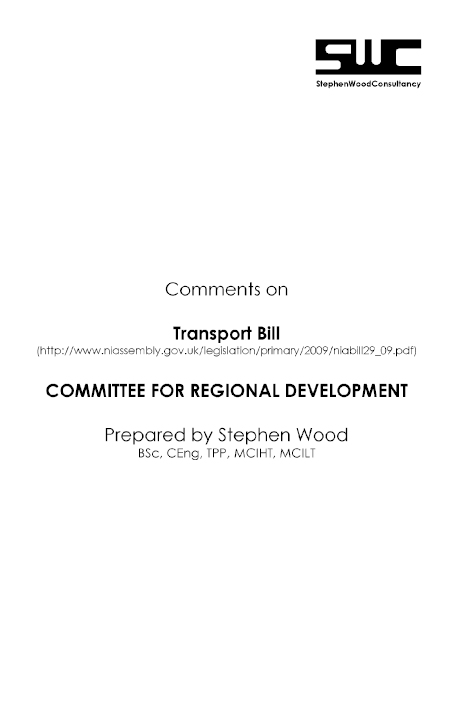
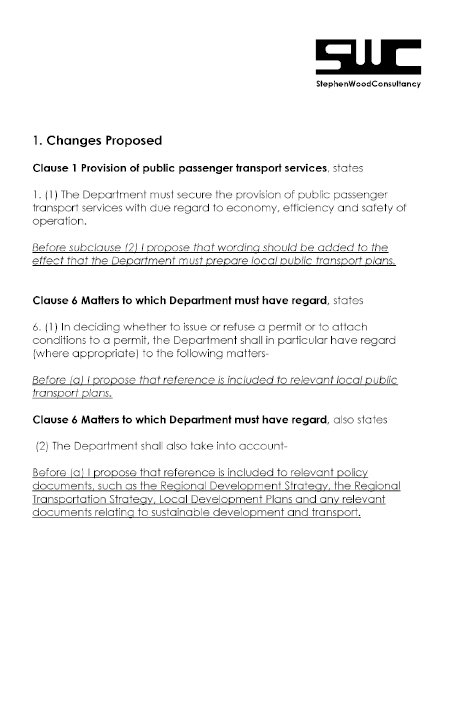
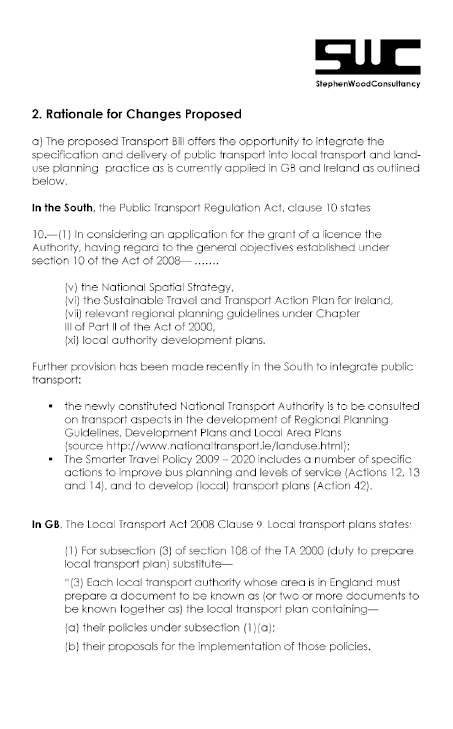
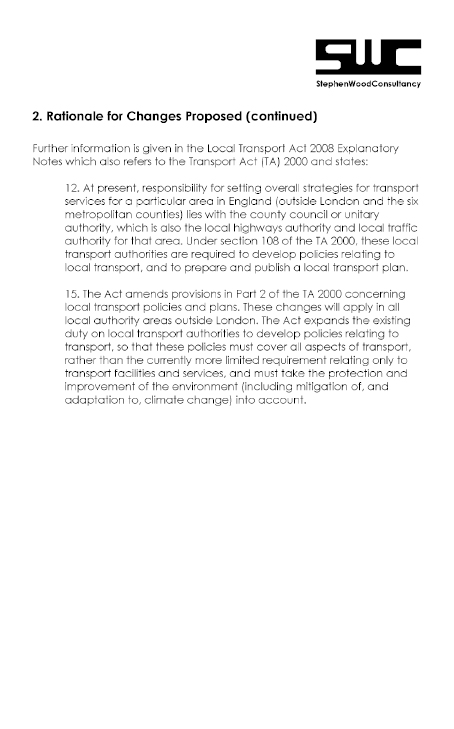
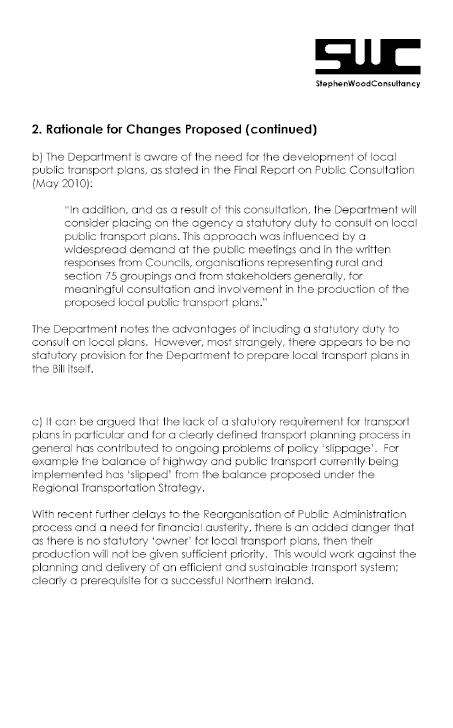
NILGA, the Northern Ireland Local Government Association, is the representative body for district councils in Northern Ireland. NILGA represents and promotes the interests of local authorities and is supported by all the main political parties in Northern Ireland.
Public Transport provision is a key issue for local government due to the huge impact it has on our communities.
NILGA is pleased to be able to have an opportunity to present evidence on the Transport Bill, particularly as work has been undertaken previously by NILGA during the consultation stage of the proposed reforms, including holding a consultation event on 17 December 2009 in Craigavon Civic Centre. This event enabled members and officers from local government to develop their thinking on the future of public transport and to consider current problems and potential solutions.
It is intended that the Bill will contain the necessary powers relating to the regulation of public transport service delivery in Northern Ireland. It will cover the duty of the Department to secure the provision of public passenger transport services, the power to enter into agreements and to award service permits for that purpose, the ability to attach conditions to and vary a service permit along with powers for the revocation, suspension and curtailment of service permits. It creates offences and provides enforcement powers in respect of contracting/ service permit regime. The Bill will also provide power for the Department to regulate fares, designate bus stations/ premises as shared facilities, regulate passenger conduct on bus premises, provide integrated and on-street ticketing systems, make grants for the provision of bus services of benefit to certain sections of the public, acquire and dispose of land, provide vehicles and facilities for public transport purposes and exploit commercial opportunities arising from its public transport functions.
At present all rail services and the majority of bus services are provided by a statutory public corporation, Northern Ireland Transport Holding Company (NITHC) through its subsidiary companies Ulsterbus, Citybus, (now operating under the commercial name "Metro") and Northern Ireland Railways (NIR). These companies operate collectively under the brand name Translink, which designs, plans and delivers the network for most public transport services.
The Department currently manages its relationship with NITHC/Translink mainly through an agreed Management Statement and Financial Memorandum and through the approval of the company's corporate and business plans.
The private sector share of the public transport market is relatively small when compared to Translink. There are currently 29 licensed private operators providing about 100 routes.
Services provided by private operators are limited mainly to niche routes that are not provided by Translink, such as university runs and some other localised services. For older people and people with disabilities the Department funds door-to-door transport services in all towns and cities with a population of ten thousand or more. These services are secured by way of public tender. Through the Rural Transport Fund, the Department also provides support for transport services designed to give people in rural areas improved access to work, education, healthcare, shopping and recreational activities. The Rural Transport Fund offers a range of specialised transport services to people living in rural areas who cannot avail of conventional public transport through subsidies for new rural services provided by Translink which would otherwise not be economically viable and revenue and capital funding for Rural Community Transport Partnerships that offer a range of complementary services to the public transport network for their members.
Public Transport provision is a key service to the community and economy in Northern Ireland and local government is keen to ensure that this service is provided efficiently, effectively and with value for money as a key principle, although this must always be balanced with the need for connectivity, and the role of public transport in overcoming isolation, particularly in rural areas. There are a number of concerns that local government has with the existing system and a variety of areas for improvement have been identified as local government priorities, which will be outlined in this document.
NILGA is keen to ensure that NI develops towards a more sustainable future within which public transport should play a key role. It is hoped that the Department applies due regard for sustainable development, encompassing economic, social and environment considerations when implementing the Transport Bill. NILGA would also encourage the Department to work closely with other departments, particularly DOENI, NIEA and OFMDFMNI to better utilise regional environmental and sustainable development policy and research. For example, air quality and pollution information could be used to show areas of traffic congestion and pollution information, indicating potentially viable new transport routes. NILGA would also encourage the development of better transport links for economic gateways such the airports and key towns and cities.
Clause 1 - Provision of public passenger transport servicesClause 1 imposes a duty on the Department to secure the provision of public transport services in NI and provides mechanisms for the Department to do so through service agreements and service permits for public transport services, and agreements for services ancillary to the provision of public transport services. It also allows the Department to determine the general level and structure of fares for these services, to provide vehicles, ticketing machines and systems, and to exploit any commercial opportunities which the Department considers appropriate. This clause also creates an offence to operate unregulated services. |
Local Government is keen to ensure a more integrated approach to public transport on a number of levels. Public transport needs to be easy for the public to use and understand, and integration of provision is imperative in working towards this goal. There is a need to integrate the local and strategic view, and to link plans, resources, partners and procurement/ financial commitment.
It is believed that if we are to increase public confidence in, and use of public transport there must be an appropriate frequency of service. Whilst it is necessary to have a high frequency of service provision at peak times, it is the opinion of our members that service may be unsatisfactory or non-existent at other times, and that this can have a serious socio-economic impact, particularly in the evenings.
It is felt that services at present, particularly in rural areas, are dedicated to schools and less focused on commuters. Commuter services need to improve, and in particular between towns, rather than 'all roads leading to Belfast'. This will become more pressing if the recommendations of the Bain review of public sector employment are followed. Our members are extremely keen to overcome problems related to rural isolation and would encourage the Department to focus attention on addressing the transport requirements geared towards targeting isolation and enabling access to services, developing a system of links to the main arterial services. This is likely to require improved funding for community transport and other public transport providers. NILGA is aware that the provision of services on lesser used routes by Translink might be difficult to justify, but we are of the opinion that this may be a 'chicken and egg' scenario and may require the Department to move first, through enhanced provision of (for example) BusyBus routes.
NILGA is supportive of the proposals regarding integrated ticketing, which will allow for better planning. However, NILGA would seek assurance that an integrated ticketing system would not push costs to the consumer up, and are wary of the added expense of the iLink system already introduced.
Clause 2 - Service AgreementsClause 2 deals with service agreements in more detail. It provides the Department with the power to make regulations as to the content of service agreements. It also provides that service agreements can include the award of 'public service contracts' in accordance with EC Regulation 1370/2007 and allows the Department to make provision for the review of decisions made in respect of the award of service agreements. |
We welcome the provision of public service contracts and hope that contracts can be targeted at private contractors for services which may not be financially expedient for Translink to run. Availability is the key issue, with the potential for link services to arterial route services vitally important.
There is great potential for private sector providers to fill gaps and complement existing service provision and NILGA would encourage this approach, with better liaison and integration between public and private, and potentially profit sharing contracts. However, any move towards privatisation of the main provider will be vigorously opposed, particularly as there is the possibility that unregulated competition could lead to a reduction in the number of operators and ultimately a reduction in services that are non-profitable but of social benefit.
Clauses 3 to 12 - Service PermitsClause 3 to 12 deal with the process for granting service permits. These clauses provide for the information that an applicant will have to furnish in the application, the matters to be taken into account by the Department when considering an application, the attachment of conditions to a permit, disqualification of operators from being able to hold a permit, and the revocation, suspension and curtailment of permits for any reasonable cause and other specified grounds outlined. Clause 6 outlines that in deciding whether to issue or refuse a permit or to attach conditions to a permit, the Department should have regard for the sustainability of routes on which the service may be provided and the extent to which the needs of persons likely to use the service to be provided are already adequately and economically served. The Department will also have to take into account any recommendations made by the Consumer Council and any representations by persons already providing public passenger transport services on any road along or near the routes which are the subject of the application, the Chief Constable, district councils, any NI government department and NITB. |
Local government is concerned that the original concept of district council involvement has been diminished. The Outline Business Case provides a summary of the original intention and the partial shift in approach:
"In August 2006 the then Regional Development Minister, David Cairns, announced the Government's intention to develop the bus and rail public transport services around the new three-tier model outlined above. The announcement was made against the backdrop of the Review of Public Administration (RPA) and it was envisaged that the new middle-tier body would be under the control of local Councils acting together in the form of a Passenger Transport Authority. Following the recent RPA local government review, however, the Executive has now decided that mainstream local roads functions will no longer be devolved to councils but instead retained within DRD. In light of this decision and the close interrelationship between public transport, roads and traffic management issues, the Executive agreed that the Minister should reconsider the future arrangements for public transport, including mechanisms for ensuring local government input to decision making."
There is concern with the change in approach attributed to RPA changes in terms of the shift from local authority responsibility to a very limited involvement, and accountability confined to the Minister on the basis of the narrow strategic business case conclusions:
"Although this was the favoured model [local authority control] for the previous administration, and would enable the achievement of many of the reform process objectives, it has been decided not to consider this model further due to recent RPA statements and implementation complexities."[1]
The key to drawing up the details of the contracts and permits will be to consult on the service requirements for an area. There must be more involvement of the public transport providers in developing town master plans. The greatest opportunity for the community to influence service provision will be in the development of local transport plans between the agency and local councils.
There needs to be a strategic link between the proposed agency, DRD, Translink and local community planning/ local transport area planning structures. Local government, as a civic leader, rooted in the community, can easily identify the local issues and deal with those, with central government focusing on strategic policy. An effective link between the two within the community planning/ local transport area planning process will be the lynchpin of these proposals. There is a need to work more effectively locally, with a reporting mechanism to a strategic regional level. Although there is uncertainty as to the methodology and timeframe for taking community planning forward, it is clear that there is a strong link between the place shaping role of local councils and the provision of public transport. There must also be a mechanism for democratic approval of public transport plans. One of the chief concerns of NILGA regarding the proposed new Public Transport Agency is the lack of elected member involvement. It is the view of local government that democratic accountability of public transport structures will be key to developing a service that the public views as useful, responsive and appropriate to their needs, whilst ensuring value for money. Having meaningful elected member on the proposed new Public Transport Agency is critical.
Clause 13 – FeesClause 13 deals with the payment of fees for permit applications and issuing of permits. |
It is important that fees are reasonable and reflective of real cost of processing applications and issuing permits in order to allow small operators to apply for such permits.
Clause 14 – Permits not to be transferrableClause 14 provides that permits are neither transferrable nor assignable. It also allows the Department to make directions for the treatment of permit in circumstances where the permit-holder dies or becomes a patient under the Mental Health (NI) Order 1986. |
NILGA has no comment to make in regard to this clause.
Clause 15 – Holding Companies and SubsidiariesClause 15 allows the Department to make regulations to provide that service agreements with and service permits held by a company or other body corporate also applies to services provided by any of its subsidiaries. |
We welcome the provision of public service contracts and hope that contracts can be targeted at private contractors for services which may not be financially expedient for Translink to run.
Clause 16 – Forgery, etc.Clause 16 creates the offence to forge, alter or use a permit with intent to deceive. It will also be an offence under clause 17 to knowingly make a false statement or produce false or misleading material in relation to an application for a service permit. |
NILGA agrees that this clause seems to be prudent and sensible.
Clause 18 to 21 – Buses, Taxis and TrainsClauses 18, 19 and 20 amend the function and name of the 'Road Service Licence' in the Transport Act (NI) 1967. Clause 21 deals with amendments to the Taxis Act (NI) 2008 as a result of the changes to the current 'Road Service Licences'. |
NILGA has no comment to make in regard to this clause.
Clause 22 – Provision of Railway ServicesClause 22 amends the duty of NI Railways under section 55 of the Transport Act (NI) 1967 to reflect that this duty will be exercised in accordance with any agreement under the Transport Act (NI) 2010. |
NILGA has no comment to make in regard to this clause.
Clauses 23 and 24 – Consumer CouncilClauses 23 and 24 provide arrangements for the production by the Consumer Council of a forward work programme in relation to its transport functions and for the production of a memorandum by the Department and the Consumer Council detailing arrangements for co-operation and consistent treatment of matters in relation to the Consumer Council's transport functions. |
In broad terms, NILGA would support the role, function and intended responsibilities of the Consumer Council in this role. Local government is concerned that there is no reference to the role of councils in relation to the work between DRD and the Consumer Council.
Whilst there is a reference to the 'Local Transport Plans' in the Explanatory Memorandum paragraph 18: "The Partial Regulatory Impact Assessment concluded that the reforms should generally have a positive impact on bus operators through the potential to participate in the development of local public transport plans...", it is a concern that there is no specific provision for such an important activity within the Bill or a prescribed formal relationship to councils in terms of the work of the Consumer Council. We would reiterate that whilst the Consumer Council may represent the wider interests on the Agency, democratic accountability is still of optimum importance to ensure effective implementation of the new proposals.
Clauses 25 to 31 – EnforcementClauses 25 to 31 set out the provisions on the enforcement of the provision of public transport services. The Department will have the power to enter into and inspect certain premises that are being used in connection with the carriage of passengers and their luggage by road and to seize certain documents and obtain certain information. It will be an offence to obstruct and authorised officer in the exercise of functions under the Act. Clause 31 provides for prosecutions for offences under this Act. |
NILGA has no comment to make in regard to this clause
Clauses 32 to 37 – GrantsClauses 32 to 37 deal with the payment of grants by the Department in relation to the provision of public transport services, provision of advice, information or training relating to public transport services and capital expenditure for the purchase of vehicles. |
NILGA welcomes the payment of grants by the Department, particularly when focused at those within the community at greatest need.
Clauses 38 to 40 – Acquisition and disposal of landClauses 38 to 40 provide for the acquisition and disposal of land, including powers for the Department to obtain information as to ownership of land and to enter onto land. |
NILGA has no comment to make in regard to these clauses.
Clause 41 – Appointment of directors of NI Transport Holding CompanyClause 41 applies section 18(2) of the Interpretation Act (NI) 1954 to appointments to the NI Transport Holding Company made under section 47 of the Transport Act (NI) 1967 to include power to remove or suspend persons from appointments under this section. |
NILGA has no comment to make in regard to this clause
Clause 42 – Conduct of persons at bus stationsClause 42 provides the Department the power to make regulations in respect of the conduct of persons at bus stations. |
NILGA has no comment to make in regard to this clause
Clause 43 – Shared Transport FacilitiesClause 43 gives the Department the power to issue directions in respect of the shared use of facilities used for the provision of services under a service agreement. |
NILGA is of the view that a rolling programme of improvements and investment needs to be put in place for local bus stations. A lack of facilities in some areas needs to be urgently addressed, prioritising key routes: for example, provision of bus stations in Banbridge and Portadown.
It will be vital for community transport services to have access to bus stations to ensure integration of service provision, and certainly, community transport must feature significantly in the tendering of contracts process (particularly for rural areas).
Clauses 45 to 50 - Miscellaneous and SupplementaryClauses 45 to 50 contain a number of miscellaneous and supplementary provisions, including powers to make regulations. Clause 45 provides for the Department to make orders, subject to affirmative resolution, for any further provisions in connection with this Act. |
NILGA has no comment to make in regard to this clause.
The staffing costs of the new public transport agency are expected to be around £3.5m, of which almost £2m would be covered by the transfer of existing resources within DRD. The additional £1.5m is in relation to functions amounting to around £600k transferring from NI Transport Holding Company/ Translink and a further £900k required for new functions that are not currently being carried out – mainly in relation to local planning and the EC Regulation 1370/2007 requirement for contracts. This additional expenditure is necessary to create the structures through which longer term efficiencies and improved services will be achieved and sustained. Furthermore, the Strategic Outline Case for a Bus Rapid Transit identified 3 pilot routes for the Bus Rapid Transit system in Belfast, at an estimated cost of £147m.
Better funding is required for public transport, which should be appropriately targeted, as value for money is a key consideration when utilising public funding. Furthermore, it is the NILGA view that more consideration needs to be given to funding for local transport plans, which must be developed in conjunction with community planning/ local transport area planning. It is imperative that funding is available to facilitate this process throughout, and not just in the short-term; costs must not be passed to the ratepayer through the district rate.
There must be an alignment of policy, citizen need and resource prioritisation, focusing on the issues of greatest need first. This prioritisation must be well-communicated to elected members and the public. NILGA is of the view that local councils must be given a meaningful role in local prioritisation of actions and resources, and should have an input into strategic regional decisions, as previously highlighted. A targeted budget is a necessity particularly in these austere times. NILGA would also query the source of the additional funding required to set up the new structures and new functions, particularly as the NI Assembly are facing a decreased budget for operation.
Local government is also concerned with the proposed role for the new Agency in relation to Planning Applications and potential Development Plans. It is felt that this would be another potential level of complexity in relation to the determination of applications and what could be the discretionary application of any developer contributions.
[1]http://archive.niassembly.gov.uk/io/research/2008/10008.pdf
Your ref:
Our ref: Misc/1 M/L 9309
Date: 16th August 2010
Being dealt
with by: Chief Executive's Department
Email:
Committee for Regional Development
Committee Office, Room 402
Parliament Buildings
Ballymiscaw
Stormont
BELFAST
BT4 3XX
Dear Sir/Madam
RE: Call for Evidence on the Transport Bill
I am writing on behalf of Omagh District Council in response to the call for evidence on the Transport Bill.
The Council asks that its response to this consultation is considered in conjunction with its previous responses to the consultation on 'Public Transport Reform' in February 2010 and the 'Future of Bus Operator Licensing in Northern Ireland' in July 2010. It also wishes to advise that it concurs with the response to the call for evidence on the transport Bill made by NILGA, the Northern Ireland Local Government Association.
The Council has a particular concern regarding the lack of public transport infrastructure in the rural areas which has resulted in a significant dependency on private cars and which has adversely impacted on social inclusion and economic prosperity. The Council wishes to see rural transport given priority and being adequately resourced within the reform process and the implementation of the Transport Bill.
The Council is also keen to promote sustainable development and would hope that the Department through the implementation of the Transport Bill will give due consideration to the economic, social and environmental factors associated with a more sustainable future. To this effect, the Council would seek assurance that joined up cross-departmental and cross agency working is undertaken so that public transport reform is not taken forward in isolation.
The Council wishes to make the following comments relating to the Clauses of the Bill:-
The Council notes that this Clause imposes a duty on the Department to secure the provision of public transport services in Northern Ireland and provides the mechanisms for it to do so. The Council welcomes the provision in this clause to create an offence to operate unregulated services.
The provision of public passenger transport services needs to be on an equitable basis across Northern Ireland and priority needs to be given to the provision of such a service in those rural areas where the current infrastructure is poor. A more integrated approach to strategic and local level transport planning needs to be undertaken to make this happen and to create the confidence of the public to make greater use of public transport.
The Council notes that this Clause provides the power to make regulations as to the content of service agreements. The Council is keen to see contracts being targeted at filling the gaps in service provision and therefore it welcomes the inclusion of the provision of public service contracts.
The Council notes that Clauses 3 -12 relate to the process for granting service permits and it welcomes the need for the Department to take into account recommendations made by the Consumer Council and District Councils among others. Whilst the Review of Public Administration is stalled, the responsibility for Community Planning is still to be given to local Councils. In this context, the need for greater consultation and involvement of Councils as a key stakeholder in the development of regional and local Transport Plans is essential to ensure they are compatible with and complimentary to Community Plans and Local Development Plans.
The Council notes that Clause 13 relates to Fees for permit applications and would ask that fees are set at a fair and reasonable rate so as to be affordable to small and reputable operators.
The Council notes that Clause 14 relates to Permits not being transferrable and is in agreement with the content of this clause.
The Council notes that Clause 15 permits the making of regulations to provide service agreements with and service permits held by a company or other body corporate to also apply to services provided by any of its subsidiaries. It welcomes
The potential to provide public service contracts as this should provide a meaningful way to fill gaps in service provision.
The Councils fully agrees with Clauses 16 and 17.
The Council notes the content of clauses 18 -20 and is content with the details outlined.
The Council notes the content of clause 21 and is content with the details outlined.
The Council notes the content of clause 22 and is content with the details outlined.
The Council notes the content of Clauses 23 and 24 and is supportive of the role of the Consumer Council as a voice for the customer. It agrees there is a need for consultation and co-operation between the Department and the Consumer Council on the transport projects to be included in the Consumer Council's annual forward work programme. However, the Council is concerned that the Consumer Council may not have the voice of all communities or Section 75 groups and it is concerned also that there is no reference to the role of local government in relation to consultation or co-operation between Councils, the Consumer Council and the Department on such transport related projects. The Council would ask that these issues of representation are given due consideration.
The Council notes the details of clauses 25-31 and is content with the enforcement details outlined.
The Council notes that clauses 32 – 37 relate to the payment of grants by the Department in relation to the provision of capital expenditure for the purchase of vehicles or facilities for passenger transport, public transport services and the provision of advice, information or training relating to passenger transport. The Council welcomes the payment of grants by the Department and would seek assurance that the criteria for payment of grants give a priority weighting to the distribution of grants for the provision of such services in the areas of greatest need.
The Council notes that clauses 38 – 40 relate to acquisition and disposal of land by the Department and it is content with the details set out.
The Council notes that clause 41 relates to the appointment of Directors of NI Transport Holding Company and to include powers to remove or suspend persons from appointments and it is content with the details set out.
The Council notes that clause 42 relates to the Department's ability to make regulations for dealing with the conduct of persons at bus stations and it agrees with the details set out.
The Council notes that clause 43 relates to shared transport facilities and would seek assurance that community transport providers particularly in rural areas, will have access to bus stations and their facilities to ensure the integration of service provision.
The Council notes that clause 44 relates to the provision within the Act to apply to partnerships and it is content with the detail set out.
The Council notes that clauses 45 – 50 relate to miscellaneous and supplementary provisions and it is content with the details set out. The Council notes the Act's short title of 'Transport Act (NI) 2010.
The Council notes the total staffing costs of £3.5m for the new Public Transport Agency. It is essential that in the current economic climate, value for money is a priority and that funding is appropriate and properly apportioned to the delivery of an effective and efficient public transport system. Funding must be apportioned towards local transport plans which are integral to and should be developed in conjunction with community plans.
There needs to be a focus on areas of greatest need and in particular the rural areas which are heavily reliant on public transport but are poorly served. The West of the Province for example does not have a railway infrastructure and the bus service is limited in the more rural hinterlands. Priorisation of funding for transport planning should be towards such under-provided for areas and the Elected Representatives should be heavily involved in the development of both regional and local transport plans as they are best place to inform the Department what is required to meet the needs of the people they represent.
The Council welcomes the opportunity to respond to this consultation as public transport is of particular concern in the rural West where there is a significant dependency on private cars due to the lack of public transport infrastructure. This Council is keen to promote sustainable alternative transport from an environmental and health promotion perspective. However, the difficulty in encouraging people to use public transport as an alternative to cars is compounded in the rural areas by the connectivity gaps in the bus service and the absence of rail transport in this area. Until such times as priority is given to and adequate funding is targeted at the rural towns, villages and hinterlands to develop the public transport network, it will be difficult if not impossible to get people living and working in these areas to use public transport instead of private cars. It is therefore impacting on the ability of this part of the region to promote and act positively towards sustainable development now and into the future.
On behalf of Omagh District Council, I would like to thank you for the opportunity to respond to this consultation and we await the outcome of the call for evidence process and the final Transport Bill.
Yours sincerely

Chief Executive
The Council welcomes the opportunity to comment on the draft Transport Bill and is broadly supportive of it.
The Council is very supportive of the main purpose of the Bill and the associated Policy Objectives.
The Council would agree with the selection of Option 3 and believes the avoidance of potential and perceived conflicts of interests is of paramount importance for all public sector organisations.
The Council would have liked to have seen details of the potential efficiency savings against which the operational efficiency could have been gauged at a later date.
One area of concern for the Council is in relation to the Department's responsibility to secure the provision of passenger services. There are many areas throughout Northern Ireland where there is insufficient public transport provision to allow the workforce to easily access areas of employment. By way of example, the Council would highlight the employment opportunities at Mallusk but the lack of public transport from areas like Longlands, Bawnmore, Rathcoole and Monkstown within the Borough.
The Council supports the offence of operating an unregulated service.
The Council has previously highlighted the need to have easily accessible non e-ticket sales and would again re-emphasise this point.
The Council is very supportive of the idea of shared premises and integrated ticketing.
The Council welcomes the extension of the responsibilities of a provider to its subsiduaries.
The Council welcomes the formalising of the role of the Consumer Council and the inspection powers being given to the Department.
Although not part of the Bill the Council hopes that the Agency, when established, will take all possible steps to ensure a more integrated, affordable and well publicised public transport system particularly in regard to maximising the potential of linking bus and train timetables and services.
 Written Submission on the Clauses of the
Written Submission on the Clauses of the To
The Committee for Regional Development
by
The Consumer Council
August 2010
1. The Consumer Council welcomes the opportunity to represent the voice of passengers in the development of the Transport Bill.
2. The Consumer Council's legislative role is to give consumers a voice - and to make sure that voice is heard by those who make decisions that affect consumers. A Non-Departmental Public Body, the Consumer Council was set up by statute in 1985 to promote and safeguard the interests of all consumers in Northern Ireland.
3. The Consumer Council campaigns for better public transport for Northern Ireland passengers and handles complaints from passengers travelling by bus, train, air and sea. We help individual passengers with their complaint and also work with companies at a policy level to improve systems and procedures that cause complaints in the first place. The Consumer Council holds operators to account to ensure public transport services deliver for passengers. We have established relationships with all the main transport providers and Government Transport policy divisions in Northern Ireland.
4. Passenger involvement in how public transport is governed, designed and delivered in the future is key to ensure we can develop a passenger-focused, value for money and better integrated public transport system.
5. The Consumer Council plays a key role in representing the role of consumers in relation to public transport. It is essential the new arrangements have the voice of the passenger embedded at every level to ensure it remains passenger focused and can meet the growth in passenger numbers required to meet the various transport and sustainable development strategies.
The Consumer Council continues to support the principles agreed by the stakeholders for moving forward in bus regulation:
6. The Consumer Council has played an integral role in the Stakeholder Forum. Along with NITHC / Translink, Federation of Passenger Transport, Department of the Environment and the Department for Regional Development the Consumer Council has informed the development of these proposals, ensuring that the needs of consumers are integrated into the future delivery of public transport services in Northern Ireland.
7. The Consumer Council also contributed to the public consultation process on the Reform of Public Transport. Throughout this process we engaged directly with consumers, groups representing older passengers and those with disabilities and local government. This process also allowing for a range of other stakeholders and the public to become involved and influence the process. The Consumer Council views this as vital to ensure buy in from passengers and stakeholders and to allow for the development of a robust and future proofed system for the delivery of public transport.
8. In our response to the Transport Bill, we have emphasised the issues and needs of consumers in our response. Where a clause is not listed, the Consumer Council has no further comment to add.
| Article No | Consumer Council Comment | Consumer Council Proposed Amendment |
| Article 1: Provision of public passenger transport services (1) |
The clause does not state that the provision of public transport should meet the needs of passengers. | "The Department must secure the provision of public passenger services with meets the needs of thepublic" |
| Article 7: Duration (4) |
The Consumer Council supports the provision for expired permits to continue to be in force where an operator has an application for a new permit to allow for the continuation of services for passengers in the interim period. | |
| Article 11: Disqualification (1) |
To ensure the protection and standard of service for passengers, the Consumer Council welcomes the provision for the Department to disqualify operators from holding or obtaining a permit where they have previously been disqualified "either indefinitely or for such a period as the Department thinks fit". To ensure that both passengers and transport providers can have confidence in the system, this will be need to undertaken in a transparent and consistent manner in all situations and provide a process for operators to challenge. | |
| Article 23 Consumer Council – Forward Work Programme |
The Consumer Council welcomes the opportunity to consult with the Department and other stakeholders in the development of Forward Work Programmes to deliver the most benefit for passengers. | |
| Article 24: Co-operation between the Department and the Consumer Council |
welcomes the opportunity to develop a Memorandum of Understanding to establish arrangements which ensure that the consumer voice is embedded within the design and delivery of public transport services. The Consumer Council will ensure that the parameters for information sharing are clearly defined and that the Consumer Council will challenge the Department and hold them to account in the spirit of a positive and pro-active working relationship to ensure the voice of consumers is heard. We aim to facilitate our respective roles through cooperation and understanding of responsibilities (examples of how this could be developed exist with recent agreements such as the protocol for public transport fare revisions). The Consumer Council requests that the agreed memorandum be laid before the Assembly. | |
| Article 33: Services for certain sections of the public Article 34: Services in certain areas |
The Consumer Council supports the provision for the Department to fund services which facilitate travel by members of the public with a disability to allow for the provision of specialised services as part of the overall public transport network. Lack of public transport in rural areas has a major impact on the ability of many people (including older people and those with a disability) to access services such as healthcare, education and employment. Ensuring the Department has the ability to provide grant funding for services which are not commercially viable will allow for the provision of socially-necessary routes in future. | |
| Article 42: Conduct of persons at bus stations: |
Improving safety (and the perceptions of safety) in bus stations will help to increase patronage on services and ensure passengers are aware of both their rights and responsibilities within these shared facilities. Passenger required clear and concise information on their rights and responsibilities to bemade available in a timely and accessible manner. The Consumer Council welcomes the opportunity to work with the Department to promote awareness of these topassengers. | |
| Article 43: Shared transport facilities |
The Consumer Council supports the clause to allow forpassengers facilities to be made available for use by all licensed bus operators. As facilities have been funded by public funds, the public should be able to avail of the use of these facilities regardless of which operator is providing the service they are using. |
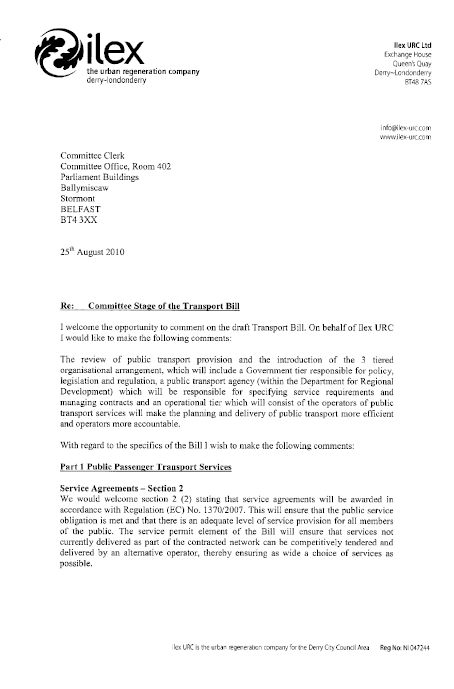
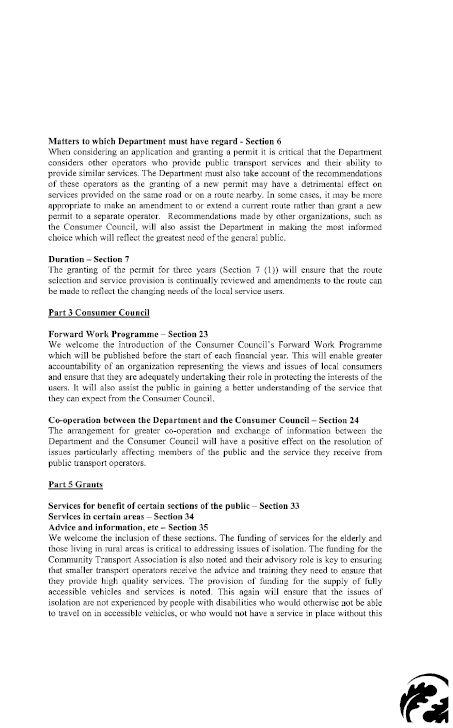
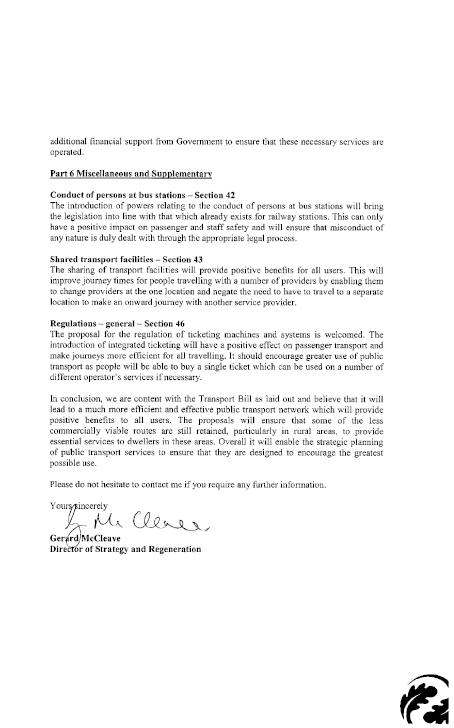
Committee for Education
Room 241
Parliament Buildings
Ref: 269/10/I/04
I refer to your correspondence of 6 July 2010 regarding the Transport Bill which the Committee for Education forwarded to the Department of Education for its comments. The Department's response of 18 August 2010 was noted by the Committee for Education at its meeting on 1 September 2010 and the Committee agreed to forward it to the Committee for Regional Development.
In light of the Department's response the Committee for Education has no comment to make on the Transport Bill.
Regards
Committee Clerk
Belfast City Council welcomes this opportunity to respond to the Transport Bill. We take this opportunity confirm that there will be Council representation at the oral briefings to the Committee.
As outlined in the response to the previous consultation on Public Transport Reform, Belfast City Council does not support the proposed creation of a new agency with within the Department for Regional Development with responsibility for public transport provision. The main issues relate to the uncertainty in respect of provision to ensure local accountability for the proposed transport agency.
There has been a considerable shift from the 2006 position which included an option of transferring responsibility for public transport to local councils under the Review of Public Administration to the current proposals whereby local council involvement in minimal. After consideration of the Transport Bill the Council's initial concerns remain.
The Council considers that effective local public transport is a critical for the continued development of the City in terms of community well-being; connectivity; and continuing to attract local enterprise and trade. Integrated public transport will be one of the key facets in the future development of the City; it is therefore essential that direct channels and formal mechanisms are provided for local council involvement in the future of public transport.
Despite the delay in the Review of Public Administration it has been made clear by the Minister of the Environment that local Councils can expect to receive a range of additional functions or responsibilities. Included within this transfer of functions is a Community Planning responsibility for local Councils. A priority for the Council will be to ensure the integration between land use planning, community planning and transportation: a coordinated approach to local service delivery across agencies is a necessity.
It should be noted that the Council, in exercising these functions, would seek to support local residents and communities by ensuring an approach that integrates transportation to enhance connectivity for local neighbourhoods thereby making them safer, healthier and more inclusive.
As stated by the Department in the Final Rapid Transit Consultation Report there is considerable overlap of legislative requirement between rapid transit and public transport reform. The Department consistently responded to our concerns in the rapid transit consultation by stating that the Council would be a key stakeholder in taking the project forward. The Council feels that to be fully involved in the future of public transport, particularly the rapid transit proposals, there must be some formal engagement processes proposed between the new agency and the Council.
The detailed comments in relation to the specific clauses contained in the draft Bill are outlined below:
imposes a duty on the Department to secure the provision of public transport services in NI and provides mechanisms for the Department to do so through service agreements and service permits for public transport services, and agreements for services ancillary to the provision of public transport services. It also allows the Department to determine the general level and structure of fares for these services, to provide vehicles, ticketing machines and systems, and to exploit any commercial opportunities which the Department considers appropriate. This clause also creates an offence to operate unregulated services.
Local public transport networks to support communities should be an important consideration of the commissioning and regulation framework. The specifications for the contracts and permits must be developed through consultation to establish the service requirements for an area including the involvement of the public transport providers. The development of local transport plans between the DRD (agency) and local councils offers the opportunity for the community to influence service provision within the context of strategic and longer term Transport Plans.
The daft Bill explanatory memorandum (Para 18) in considering the regulatory impact refers to the potential benefits to operators from the opportunity to "participate in the development of local public transport plans". Public Transport is an important local service and will be an important element of local strategies to progress Community Planning and influence statutory land-use planning. The Council would wish to see the Bill provide for a more integrated approach to public transport on a number of levels. It is essential that the proposed Bill provides for accessible local provision and links plans, resources, partners and service procurement / commitments.
The Council would be supportive of the proposals regarding integrated ticketing, which will allow for better journey planning.
deals with service agreements in more detail. It provides the Department with the power to make regulations as to the content of service agreements. It also provides that service agreements can include the award of 'public service contracts' in accordance with EC Regulation 1370/2007 and allows the Department to make provision for the review of decisions made in respect of the award of service agreements.
The potential exists for private sector providers to fill gaps and complement existing service provision and the Council would encourage this approach in the context of a local transport plan providing better liaison and integration between public and private contracts.
deal with the process for granting service permits. These clauses provide for the information that an applicant will have to furnish in the application, the matters to be taken into account by the Department when considering an application, the attachment of conditions to a permit, disqualification of operators from being able to hold a permit, and the revocation, suspension and curtailment of permits for any reasonable cause and other specified grounds outlined. Clause 6 outlines that in deciding whether to issue or refuse a permit or to attach conditions to a permit, the Department should have regard for the sustainability of routes on which the service may be provided and the extent to which the needs of persons likely to use the service to be provided are already adequately and economically served. The Department will also have to take into account any recommendations made by the Consumer Council and any representations by persons already providing public passenger transport services on any road along or near the routes which are the subject of the application, the Chief Constable, district councils, any NI government department and NITB.
The Council is concerned that initial proposals included the option of transferring responsibility for public transport to the new local councils proposed under the Review of Public Administration. This option was abandoned by DRD on the basis of the revised RPA proposals for the retention of local roads functions within the Department for Regional Development. The Council had requested clarification of the basis for the decision to abandon the council led agency option from detailed consideration and the subsequent failure to clarify the role of local councils in this important local service.
"In August 2006 the then Regional Development Minister, David Cairns, announced the Government's intention to develop the bus and rail public transport services around the new three-tier model outlined above. The announcement was made against the backdrop of the Review of Public Administration (RPA) and it was envisaged that the new middle-tier body would be under the control of local Councils acting together in the form of a Passenger Transport Authority. Following the recent RPA local government review, however, the Executive has now decided that mainstream local roads functions will no longer be devolved to councils but instead retained within DRD. In light of this decision and the close interrelationship between public transport, roads and traffic management issues, the Executive agreed that the Minister should reconsider the future arrangements for public transport, including mechanisms for ensuring local government input to decision making."
There is concern with the change in approach attributed to RPA changes in terms of the shift from local authority responsibility to a very limited involvement, and accountability confined to the Minister on the basis of the narrow strategic business case conclusions:
"Although this was the favoured model [local authority control] for the previous administration, and would enable the achievement of many of the reform process objectives, it has been decided not to consider this model further due to recent RPA statements and implementation complexities."
Whilst the Bill states under Clause 6 ("Service Permits") that the Department must have regard to any representations made by a District Council there is consistent lack of clarity in respect of the formal role for local Councils in the future of local public transport. Outside of Clause 6 there is no further reference to Council involvement. There is no mechanism proposed or outline of how the new agency process will work within the draft Bill.
As outlined above local public transport networks to support communities should be an important consideration of the commissioning and regulation framework. There needs to be strategic linkages between the proposed transport agency, DRD, Translink and local community planning/ local area transport planning structures. Local government working with local communities could more effectively identify the local issues and link to the central government strategic policy. Although there is uncertainty as to the methodology and timeframe for taking community planning forward, it is clear that there is a strong link between the place shaping role of local councils and the provision of public transport.
There should also be a mechanism for democratic approval of local public transport plans that could provide the context for contracts and permits.
The daft Bill explanatory memorandum (Para 13) in considering the Financial Effects of the Bill outlines potential additional costs from the creation of the new transport agency which are attributed to new work such as "local planning". Whilst appropriately targeted increased public transport funding would be welcomed where it enhances delivery and provides value for money in the absence of details in respect of the agency and the structural relationships it is impossible to gauge the potential value. Greater clarity is also required in relation to funding for local transport plans, which must be developed in conjunction with community planning/ local transport area planning. It is important to ensure the alignment of policy, community requirements and resource prioritisation, focusing on the integration and needs. Local councils should have a meaningful role in the prioritisation of local actions and resources, and should have an input into strategic decisions.
deals with the payment of fees for permit applications and issuing of permits.
The charges and processes should be reasonable and reflective of the direct costs associated with applications.
provides that permits are neither transferrable nor assignable. It also allows the Department to make directions for the treatment of permit in circumstances where the permit-holder dies or becomes a patient under the Mental Health (NI) Order 1986.
allows the Department to make regulations to provide that service agreements with and service permits held by a company or other body corporate also applies to services provided by any of its subsidiaries.
creates the offence to forge, alter or use a permit with intent to deceive. It will also be an offence under clause 17 to knowingly make a false statement or produce false or misleading material in relation to an application for a service permit.
amend the function and name of the 'Road Service Licence' in the Transport Act (NI) 1967. Clause 21 deals with amendments to the Taxis Act (NI) 2008 as a result of the changes to the current 'Road Service Licences'.
amends the duty of NI Railways under section 55 of the Transport Act (NI) 1967 to reflect that this duty will be exercised in accordance with any agreement under the Transport Act (NI) 2010.
No comments
provide arrangements for the production by the Consumer Council of a forward work programme in relation to its transport functions and for the production of a memorandum by the Department and the Consumer Council detailing arrangements for co-operation and consistent treatment of matters in relation to the Consumer Council's transport functions.
Clauses 23 and 24 ("Consumer Council") of the Transport Bill outline the arrangements for the relationship between the Consumer Council and the Department. The Council is concerned at the lack detail in respect of the provisions for local accountability proposed within this arrangement.
It was previously suggested that the Consumer Council will have formal role in relation to the new public transport agency and that the new agency would have a formal consultative role in the planning system. There are no provisions within the Bill for changes in the relationship between local councils and the Consumer Council or consultation requirements. The Bill does not include any reference to the potential statutory planning role for any new transport agency.
Whilst the Consumer Council may be considered to provide or represent the wider interests on the Agency this does not ensure local democratic accountability enable effective local integration or implementation of the new proposals.
set out the provisions on the enforcement of the provision of public transport services. The Department will have the power to enter into and inspect certain premises that are being used in connection with the carriage of passengers and their luggage by road and to seize certain documents and obtain certain information. It will be an offence to obstruct and authorised officer in the exercise of functions under the Act. Clause 31 provides for prosecutions for offences under this Act.
Clauses 32 to 37 deal with the payment of grants by the Department in relation to the provision of public transport services, provision of advice, information or training relating to public transport services and capital expenditure for the purchase of vehicles.
provide for the acquisition and disposal of land, including powers for the Department to obtain information as to ownership of land and to enter onto land.
applies section 18(2) of the Interpretation Act (NI) 1954 to appointments to the NI Transport Holding Company made under section 47 of the Transport Act (NI) 1967 to include power to remove or suspend persons from appointments under this section.
provides the Department the power to make regulations in respect of the conduct of persons at bus stations.
No comments
Clause 43 gives the Department the power to issue directions in respect of the shared use of facilities used for the provision of services under a service agreement.
It will be important for all transport services to have access to bus stations to ensure integration of service provision, and certainty, alternative private, community or social enterprise providers should be encouraged to utilise facilities through specification and procurement processes.
Clauses 45 to 50 contain a number of miscellaneous and supplementary provisions, including powers to make regulations. Clause 45 provides for the Department to make orders, subject to affirmative resolution, for any further provisions in connection with this Act.
No comments
The Bill does not include any reference to the potential statutory planning role for any new transport agency. The Council would have concerns in relation to the with the proposed role for the new Agency in relation to Planning Applications and Development Plans as outlined in previous consultations. This could introduce additional complexity in relation to the determination of applications and affect the discretionary Council responsibility in respect of any developer contributions.
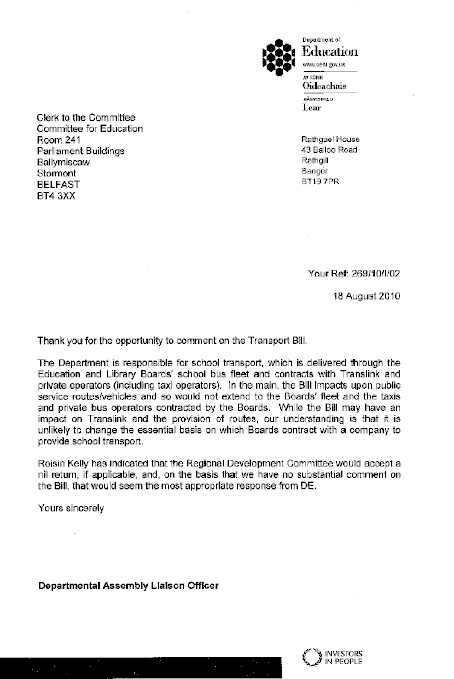
Room 245
Parliament Buildings
From:
Clerk to the Committee for the Environment
Date: 10 September 2010
To:
Clerk to the Committee for Regional Development
1. At its meeting on 9 September, the Committee for the Environment considered the attached response from the Department of the Environment regarding the Transport Bill and agreed to forward it to your Committee.
2. The Committee also considered the implications of the Transport Bill on the Taxis Act and had no further comment in this regard.
3. However, the Committee wished to note that whilst it recognises the aspiration for the Bill to help to reduce the number of cars on the road it is concerned about the effect this could have on transport in rural areas and urged your Committee to remain mindful of this while scrutinising the Bill.
Island Civic Centre
The Island
Lisburn
BT27 4RL
www.lisburn.gov.uk
Norman Davidson Chief Executive
Our Ref: IW/SF
15 September 2010
The Northern Ireland Assembly
Committee for Regional Development
Committee Office Room 402
Ballymiscaw
Stormont
Belfast
BT4 3XX
For the Attention of Ms Roisin Kelly
Dear
Re Committee Stage of the Transport Bill
Thank you for the opportunity to be consulted on the above Bill.
At a recent Meeting of Lisburn City Council the Elected Members endorsed the comments of our Leisure Services Committee, which you previously received in mid-August 2010 (further copy enclosed).
These comments can be considered the views of Lisburn City Council but we would also reserve the right to further comment should your Committee alter or amend the proposed Bill.
Please contact me should you have any queries in relation to the matters I have raised.
Yours sincerely
Ian Wilson
Assistant Director of Environmental Services
(Building Control)
Appendix 4
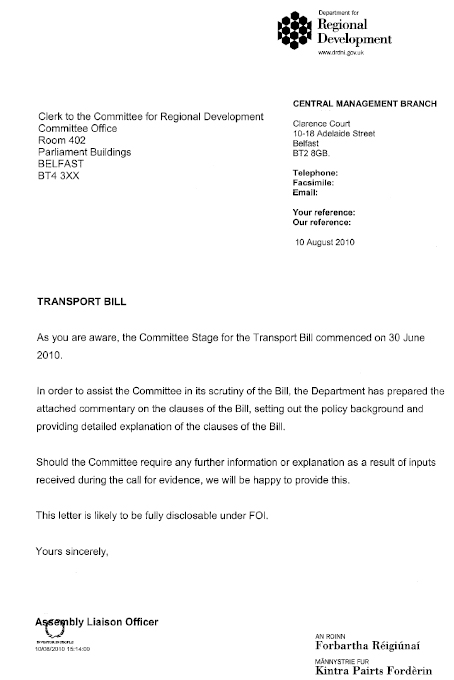
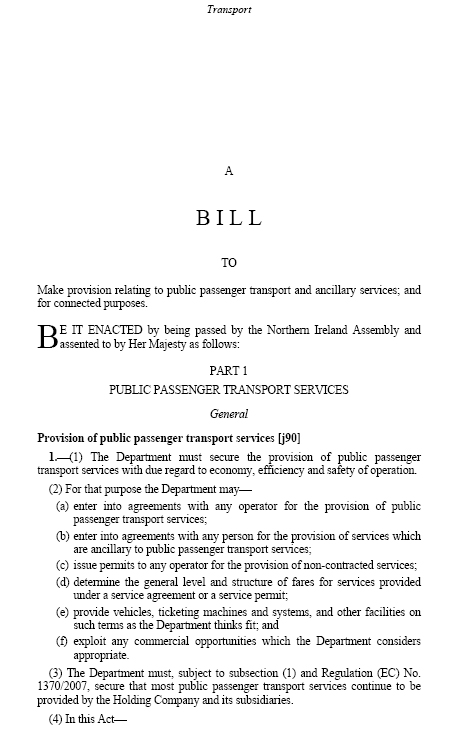
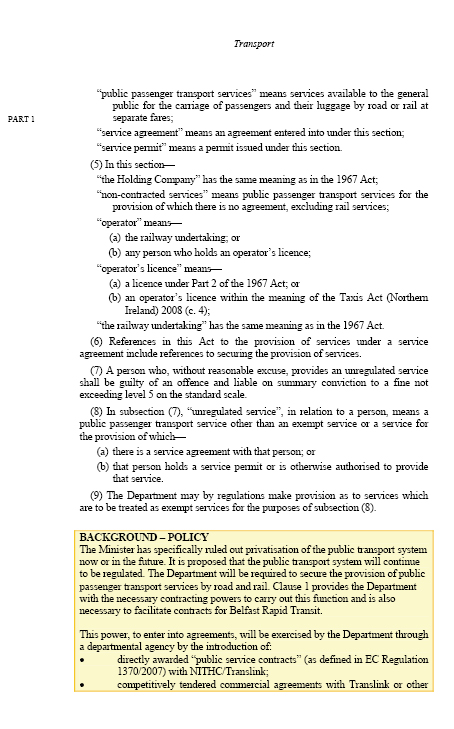
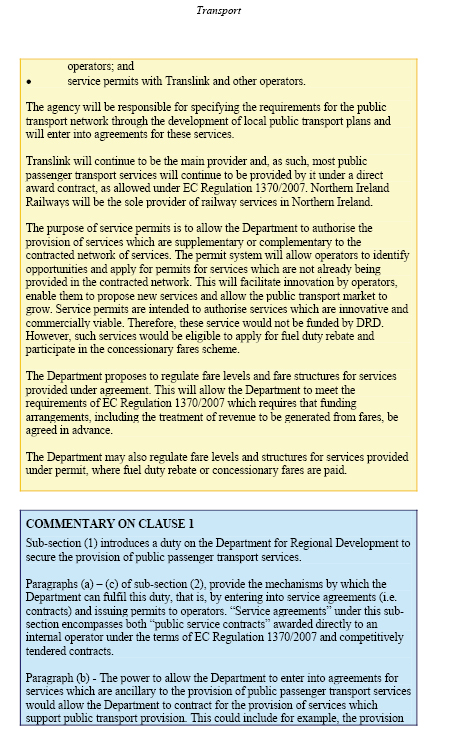
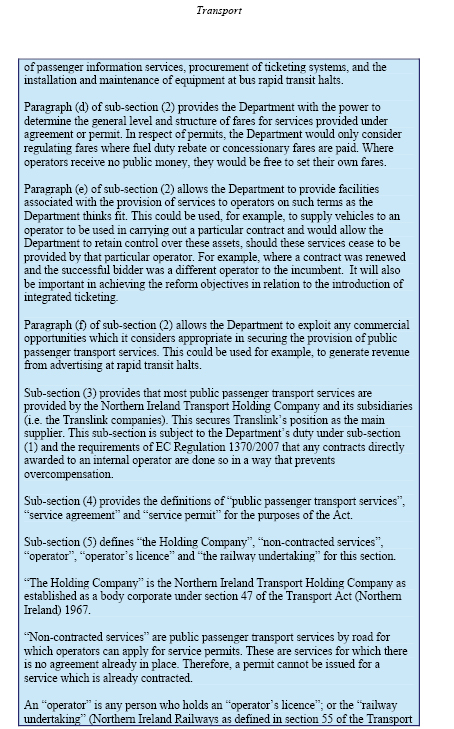
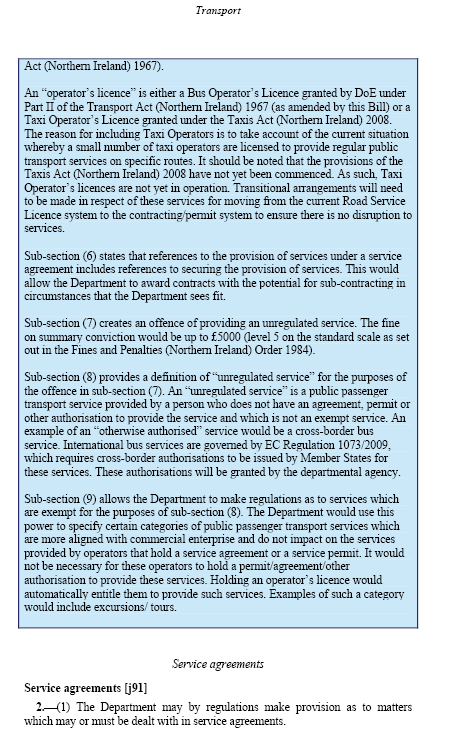
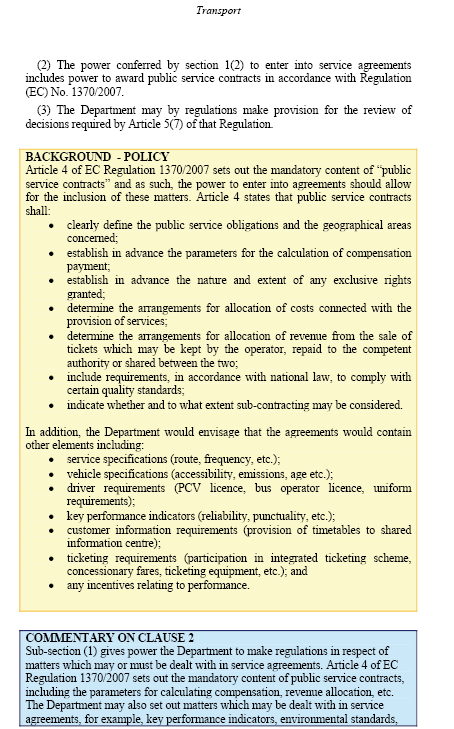
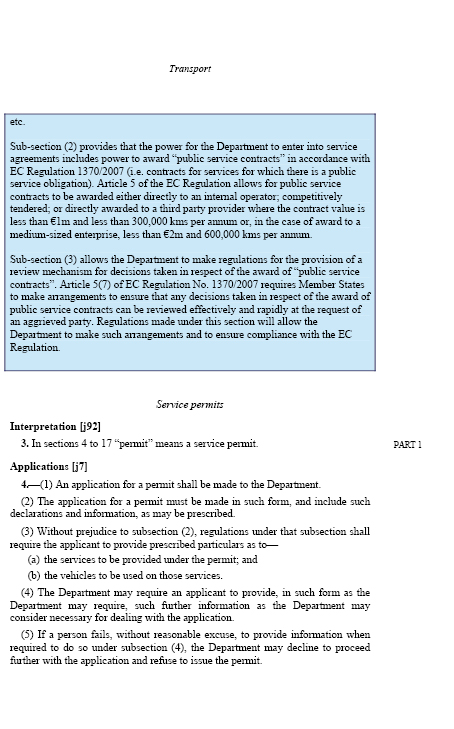
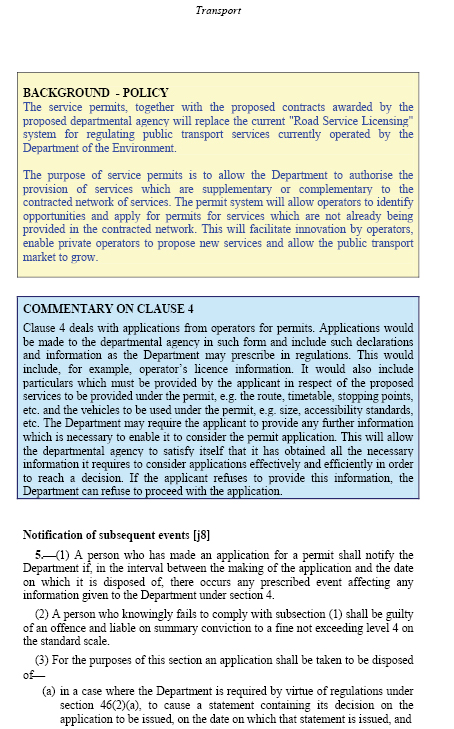
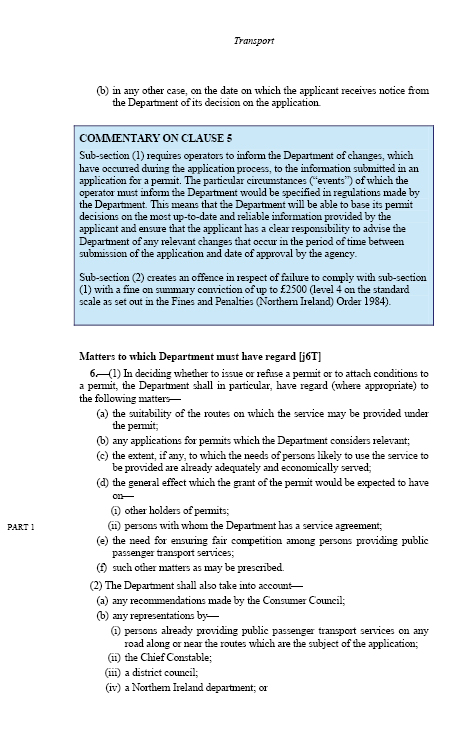
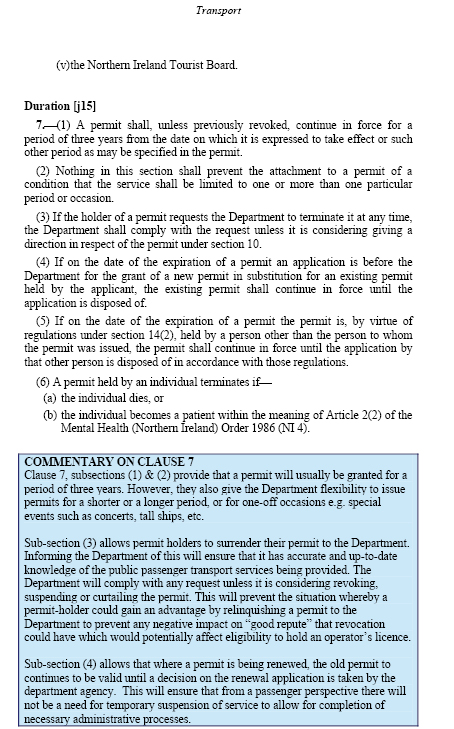
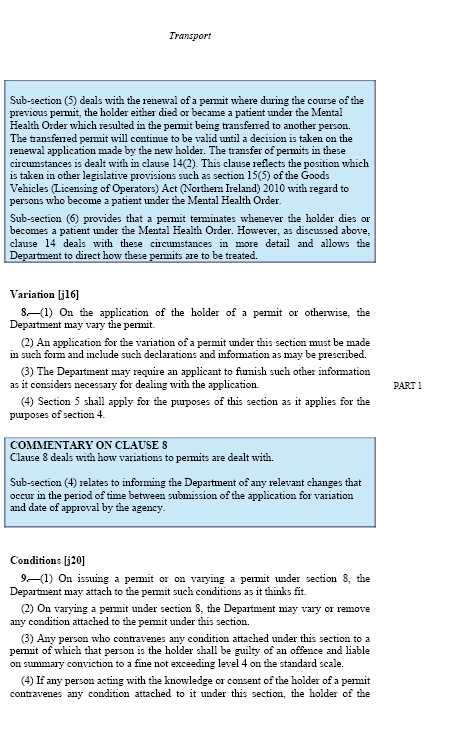
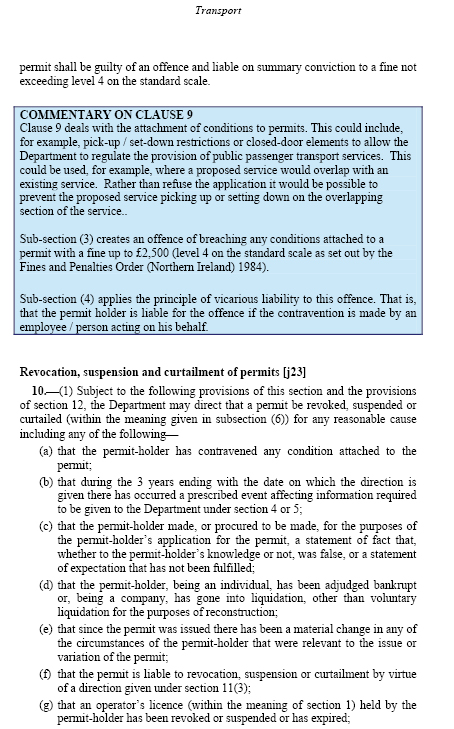
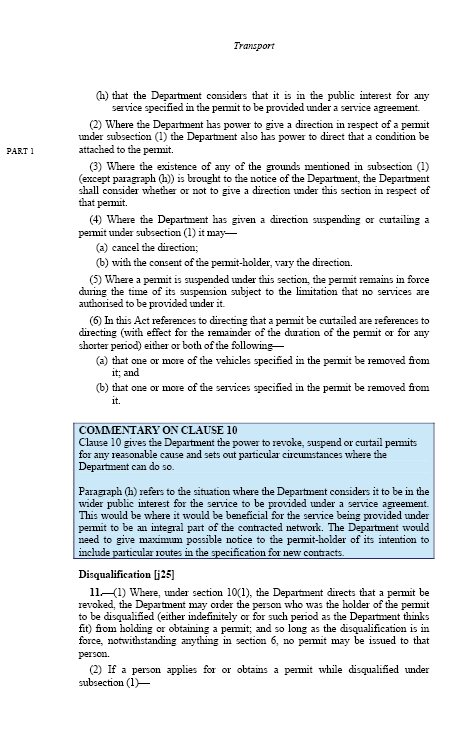
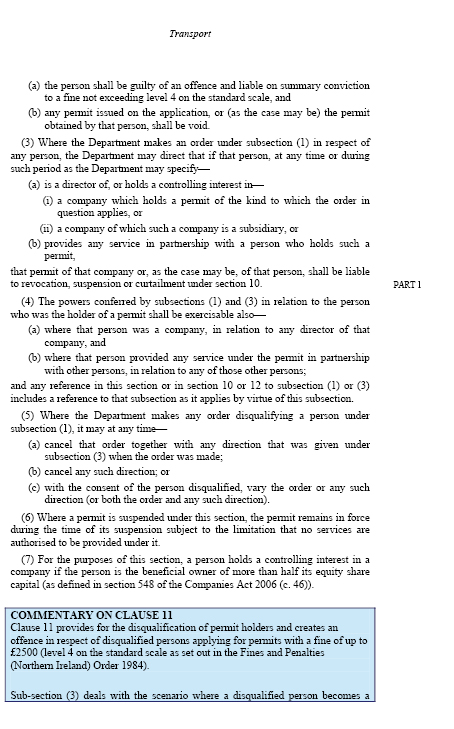
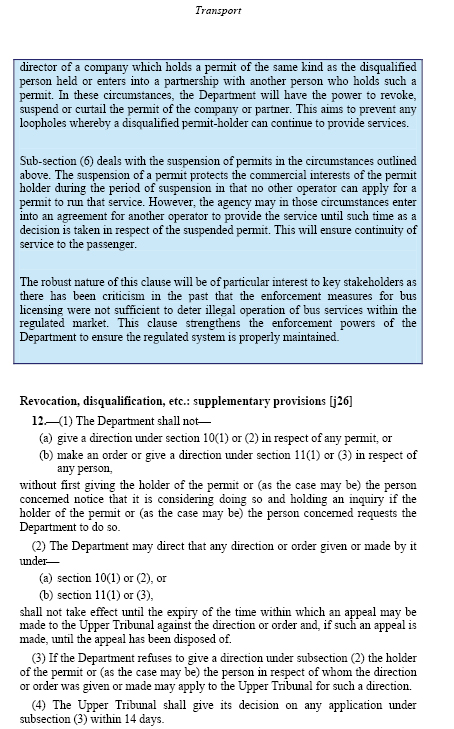
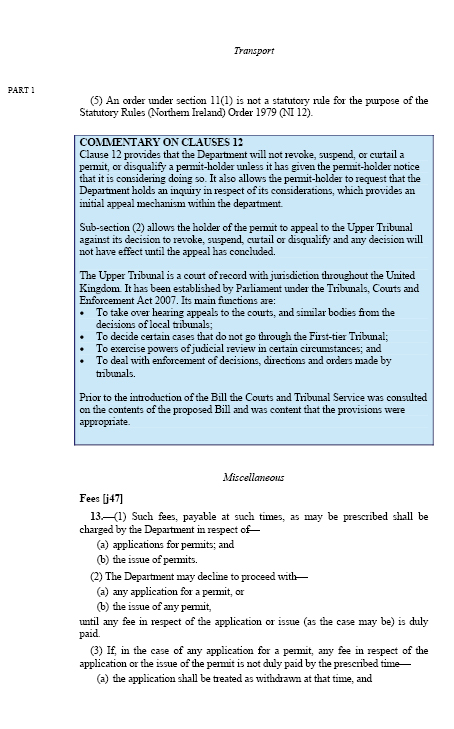
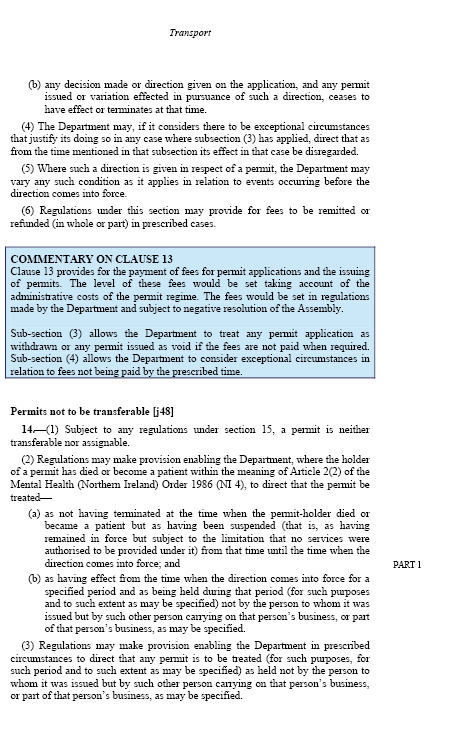
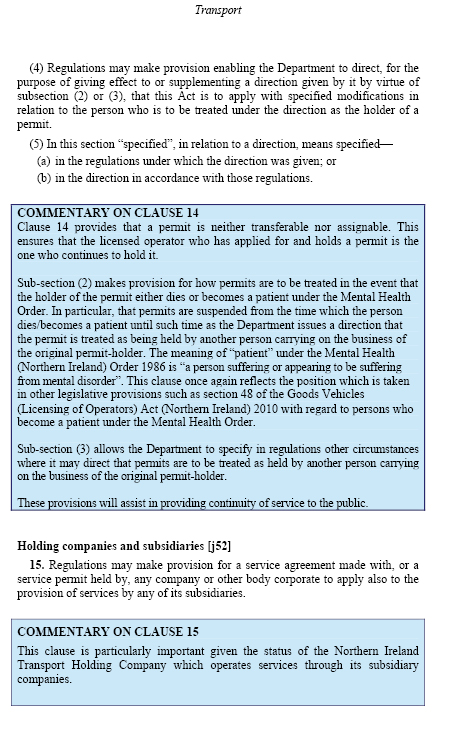
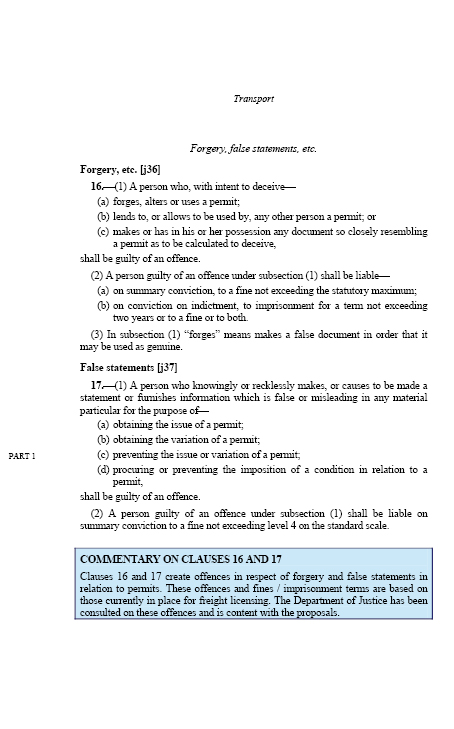
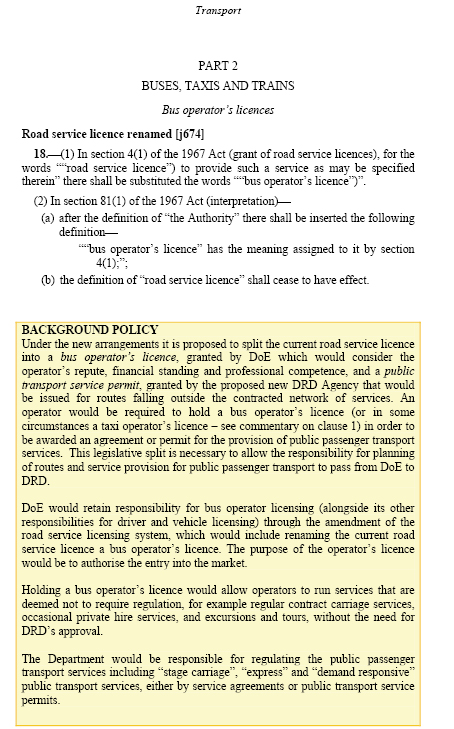
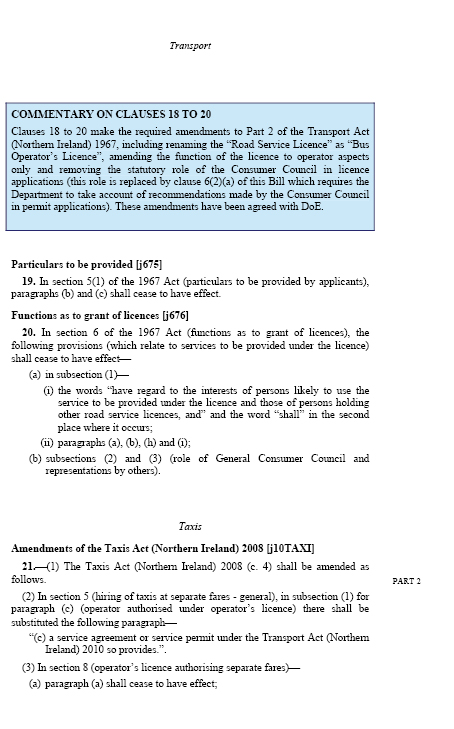
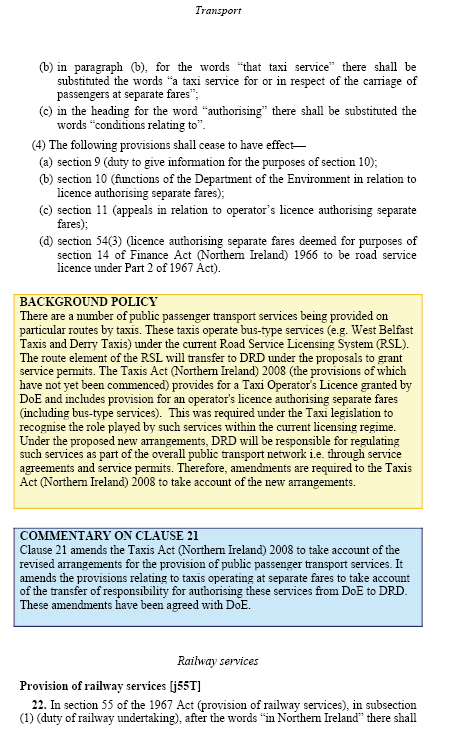
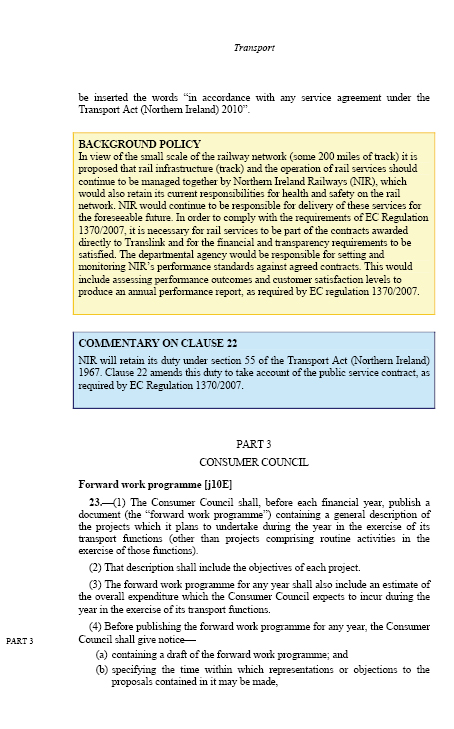
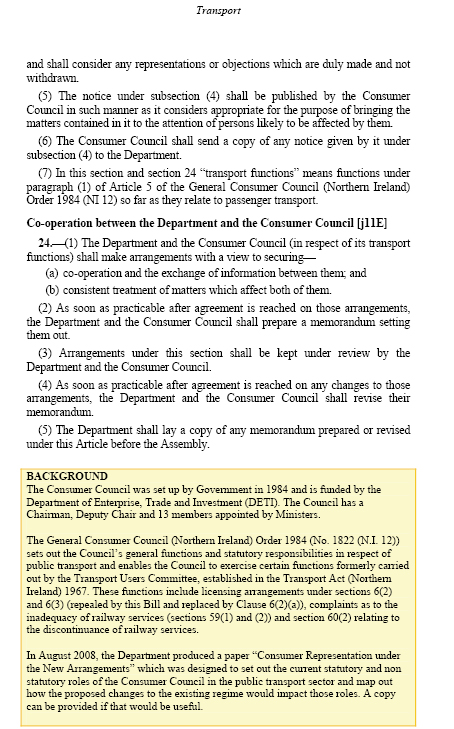
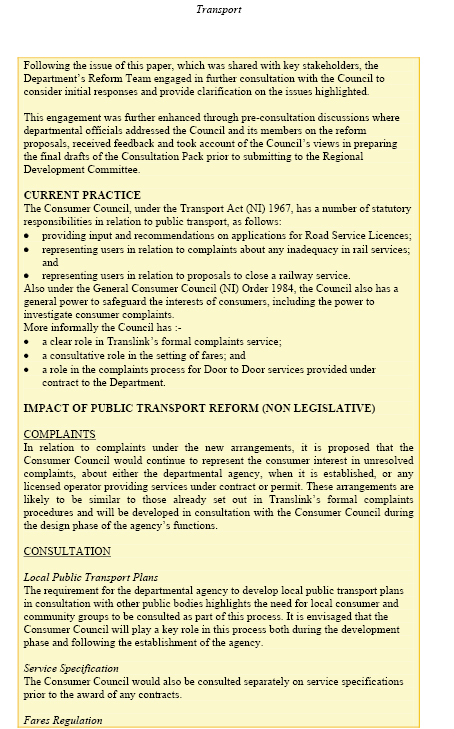
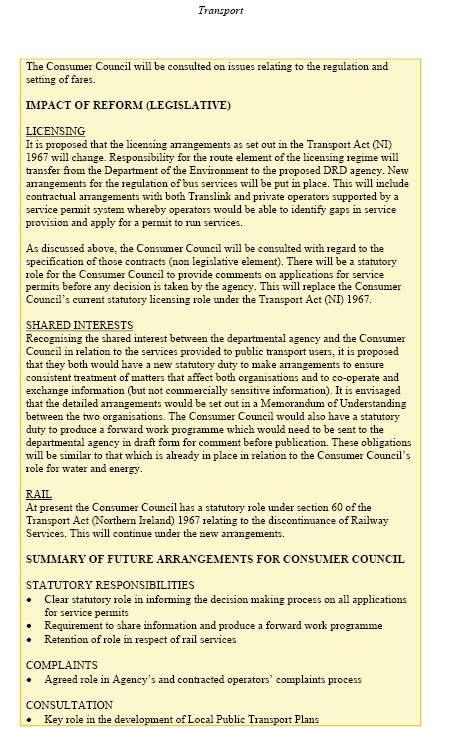
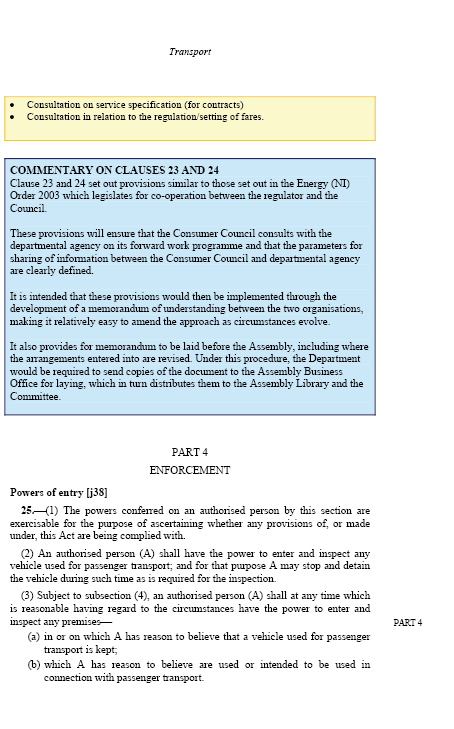
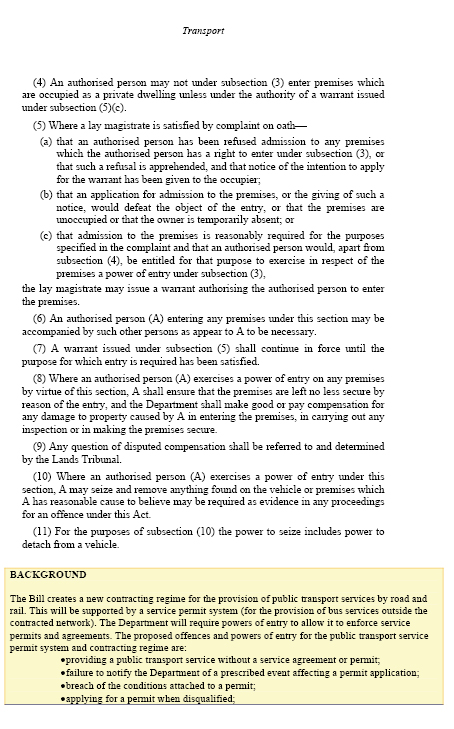


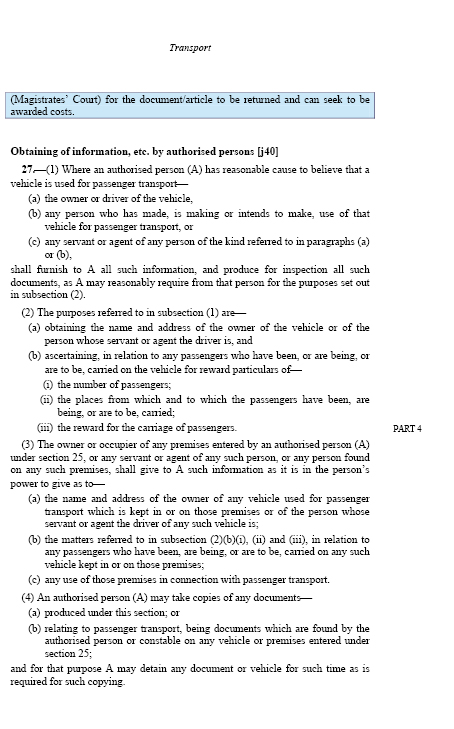
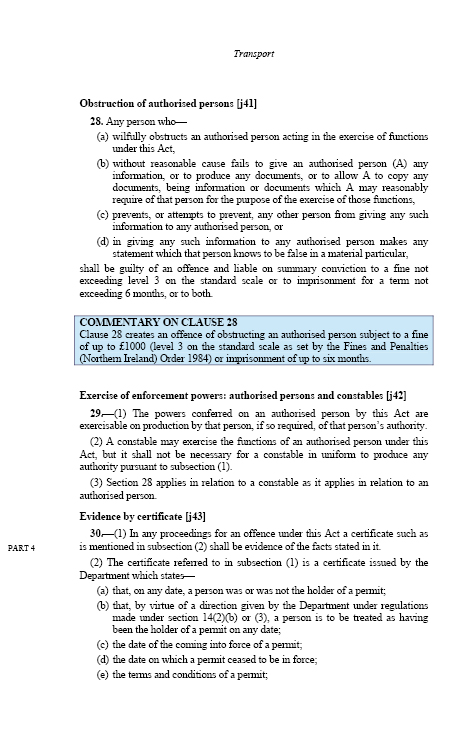
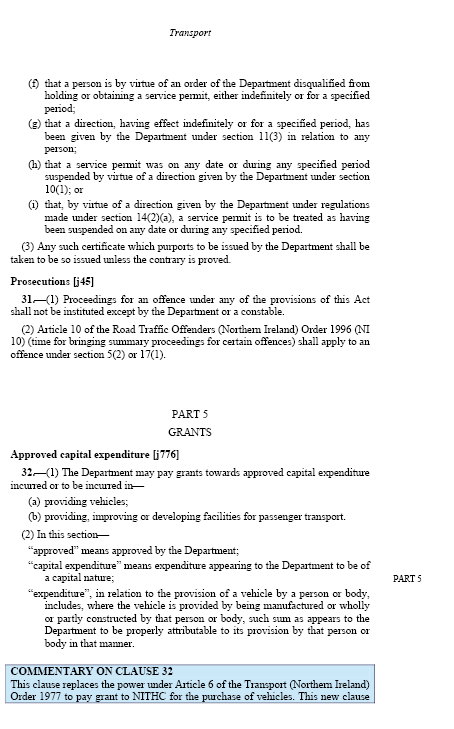
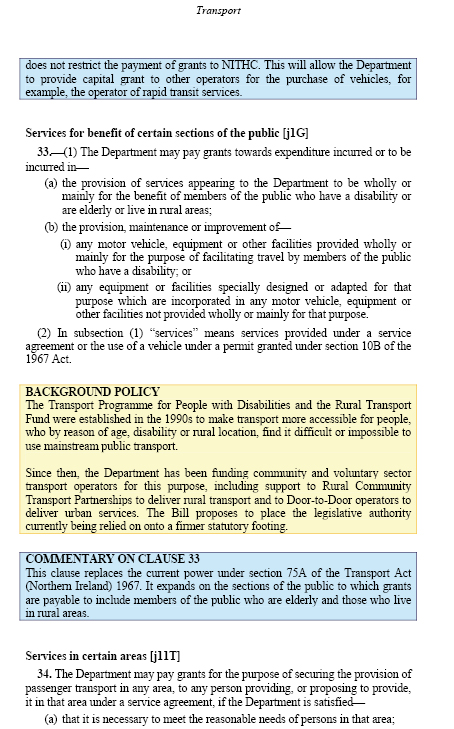
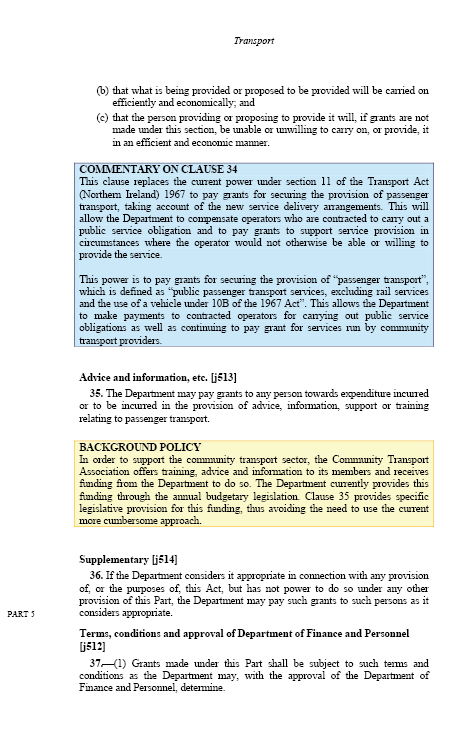
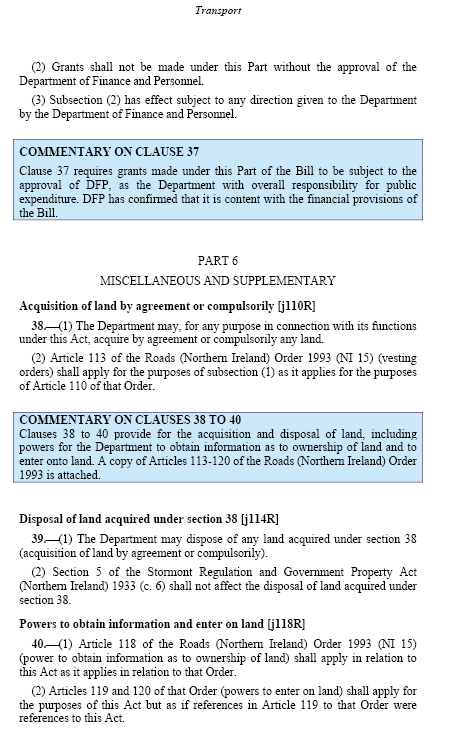
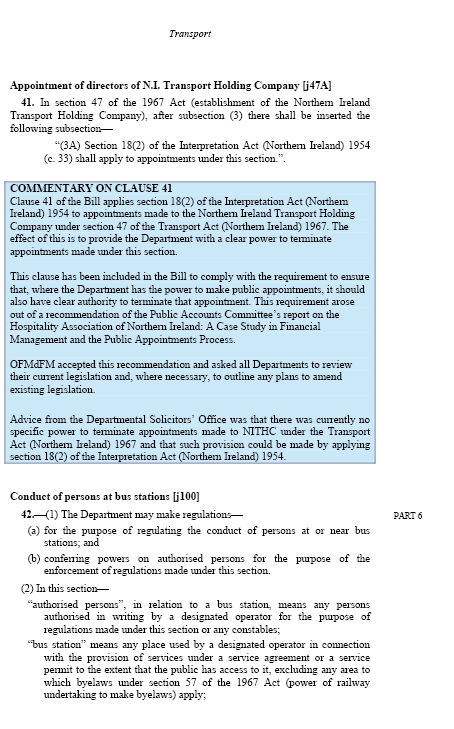
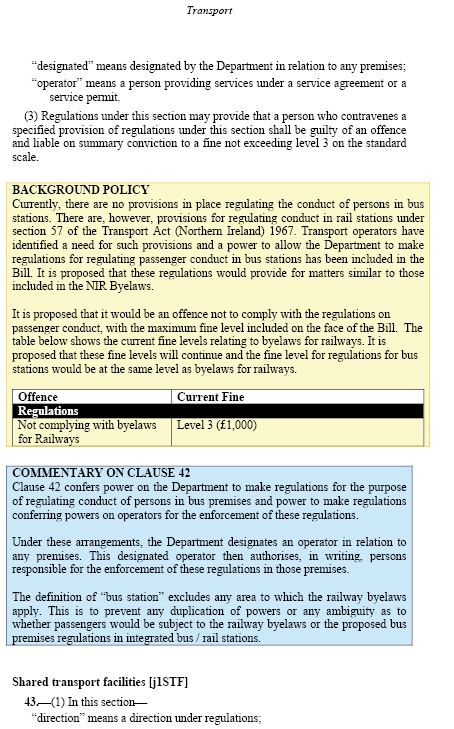
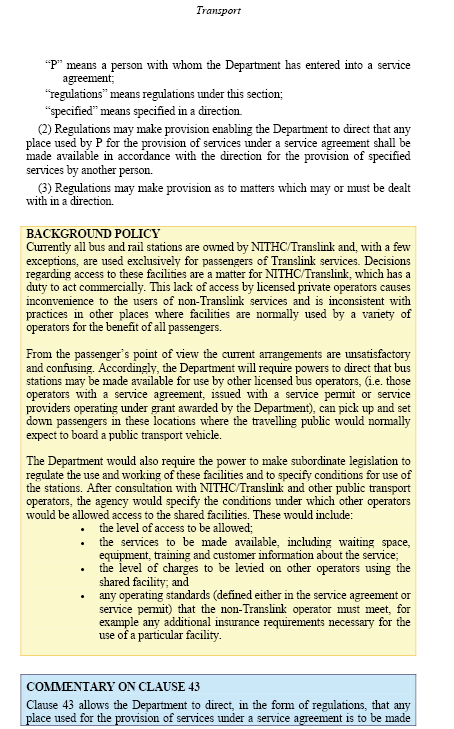
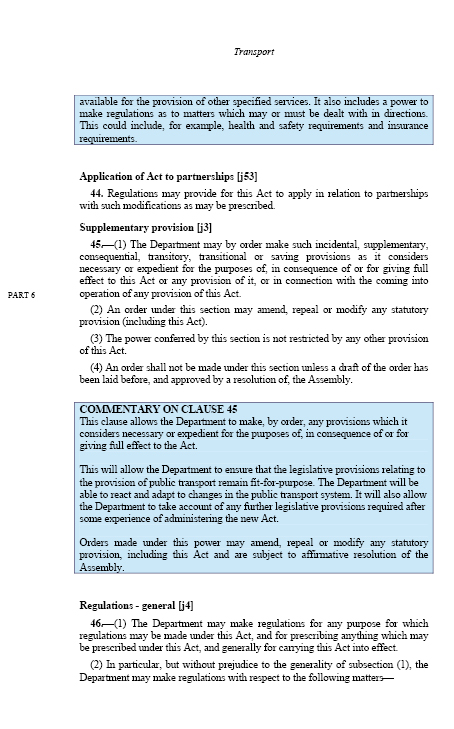
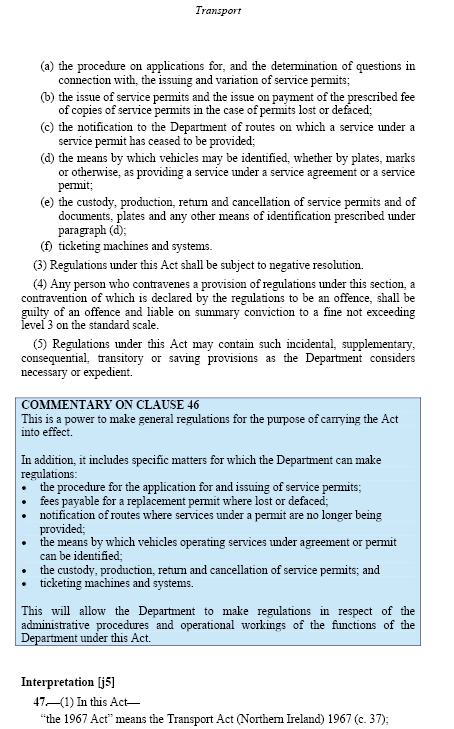
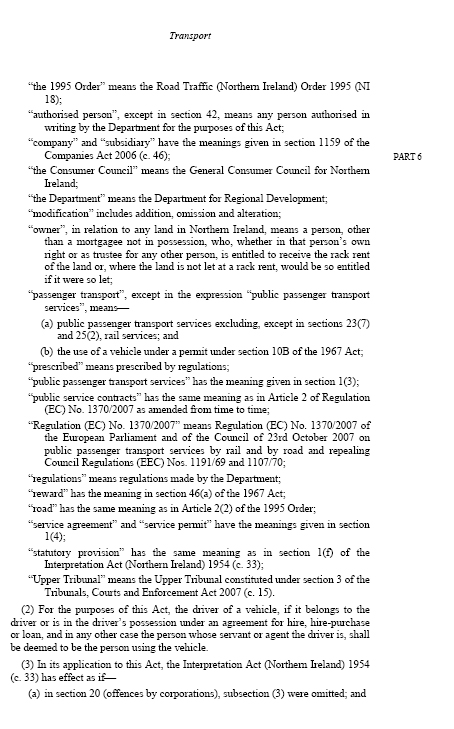
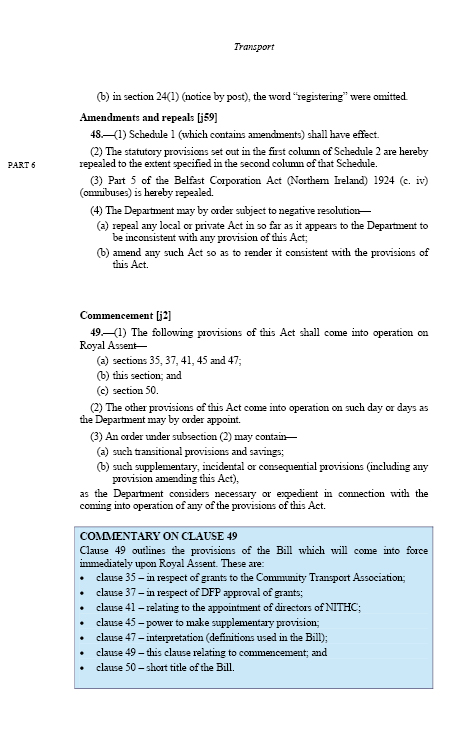
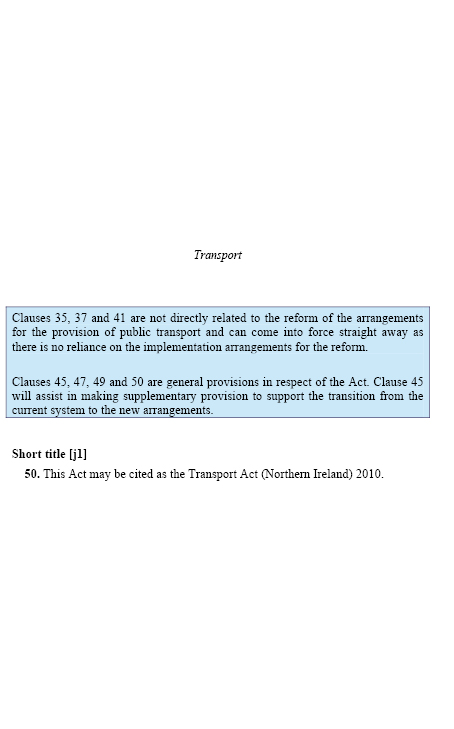
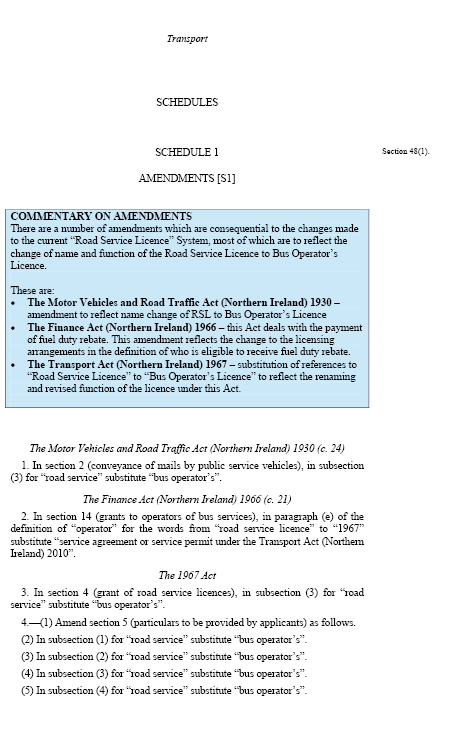
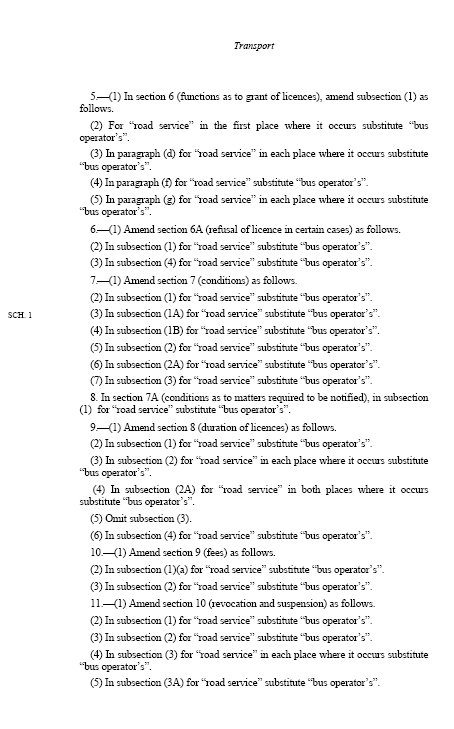
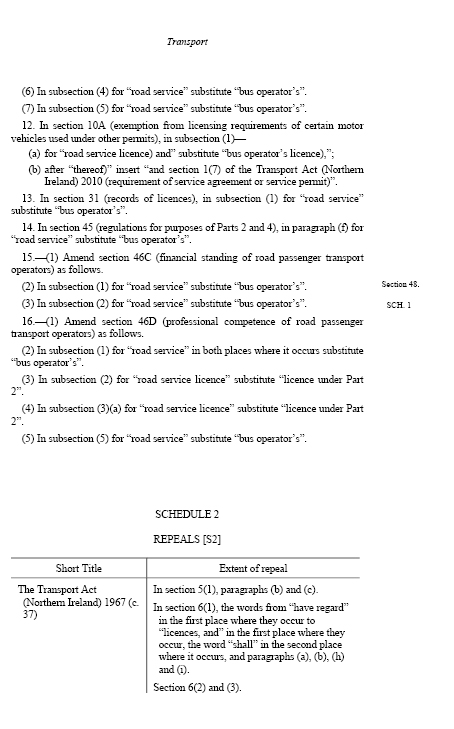
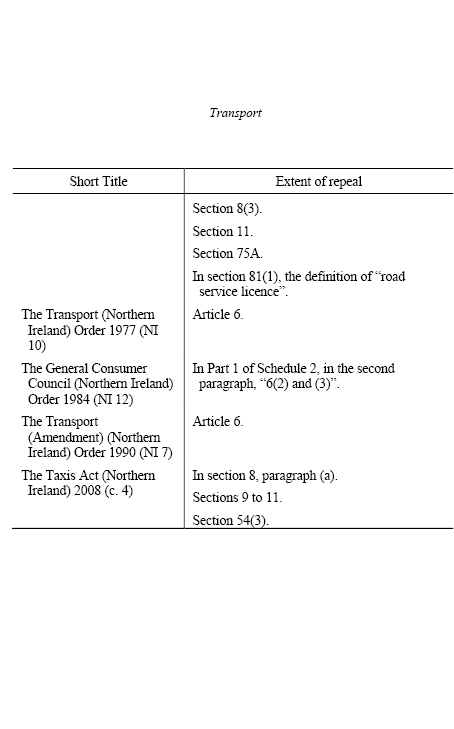
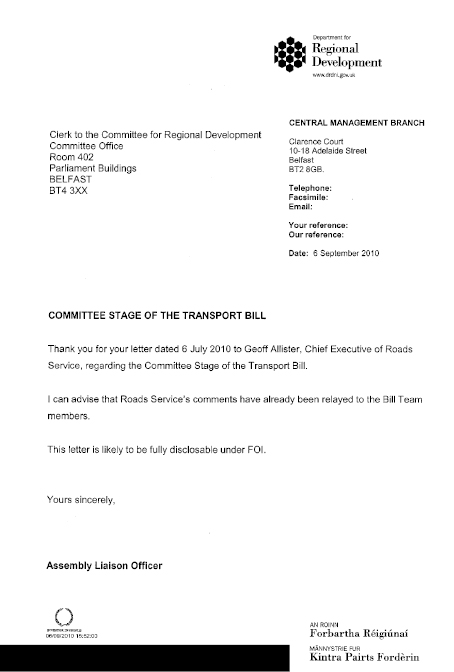
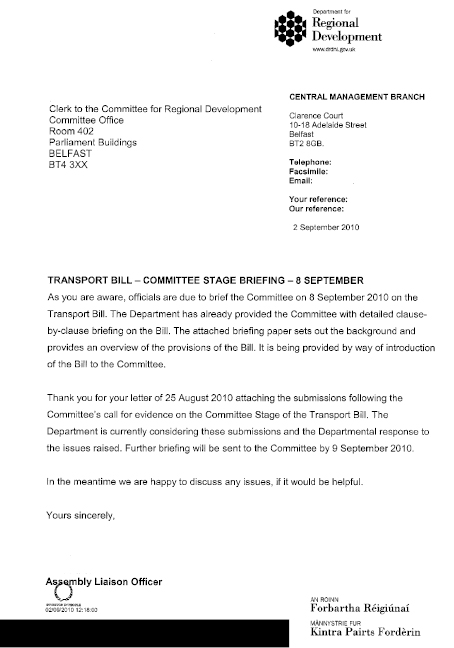
DRD Briefing
8 September 2010
1.0 Background to Public Transport Provision
2.0 Reasons for the Reforms
3.0 Overall Policy Objectives of Reform Programme
4.0 Legislative Provisions
5.0 Benefits to Public Transport Users
6.0 Benefits for Governance of the Public Transport Sector
Annex
Provisions Not Required in the Bill
1.1 All rail services and the majority of bus services in Northern Ireland are provided by a statutory public corporation, the Northern Ireland Transport Holding Company (NITHC) through its subsidiary companies Ulsterbus, Citybus (now operating under the commercial name "Metro"), and Northern Ireland Railways (NIR). These companies operate collectively under the brand name Translink, which designs, plans and delivers most public transport services.
1.2 Ulsterbus and Citybus (Metro) provide bus services regulated by Road Service Licences issued by the Department for the Environment (DoE) under the Transport Act (Northern Ireland) 1967. Northern Ireland Railways provides railway services under a statutory duty laid down in section 55 of the Transport Act (Northern Ireland) 1967: "to provide or secure the provision of, railway services in Northern Ireland with regard to efficiency, economy and safety of operation".
1.3 NITHC was established under the Transport Act (NI) 1967. Its objects are set out under section 48 of the Act as follows:
The Minister may direct NITHC on matters of policy under section 49 of the Act but not on matters that would affect its ability to act commercially. The Department currently manages its relationship with NITHC/Translink mainly through an agreed Management Statement and Financial Memorandum and through the approval of the company's corporate and business plans. The Management Statement and Financial Memorandum sets out the roles and responsibilities of NITHC and its transport operating subsidiaries, and contains specific information regarding corporate and business planning requirements and monitoring arrangements.
1.4 NITHC inherited the power to provide bus services in Northern Ireland from two sources:
1.5 The private sector share of the public transport market is relatively small when compared to Translink. There are currently 29 private operators licensed by the Department of the Environment providing stage carriage or express services on about 100 routes. These services are limited mainly to niche routes that are not provided by Translink, such as university runs and some other localised services.
1.6 For older people and people with disabilities the Department funds door-to-door transport services in all towns and cities with a population of ten thousand or more.
1.7 Through the Rural Transport Fund, the Department also provides support for transport services designed to give people in rural areas improved access to work, education, healthcare, shopping and recreational activities. The Rural Transport Fund offers a range of specialised transport services to people living in rural areas who cannot avail of conventional public transport through:-
1.8 In order to support the community transport sector, the Community Transport Association offers training, advice and information to its members and receives funding from the Department to do so.
2.1 The need for reform of public transport was first proposed in 2002 when the "A New Start for Public Transport" consultation document was published. This identified the need for reform of the institutional arrangements involved in the design and delivery of public transport. Following extensive consultation with key stakeholders (the Consumer Council, Translink and representatives of licensed private operators), the Department announced in August 2006 its intention to develop bus and rail public transport services in the context of a three-tier structure:-
2.2 Since the original consultation in 2002, the policy proposals for reform have evolved to take account of developments in relation to the Review of Public Administration and new regulations on public transport introduced by the European Union – EC Regulation 1370/2007.
2.3 In order to comply with EC Regulation 1370/2007, which came into force in December 2009, the Department must introduce contracts for delivery of public transport services, whether these are awarded directly to a publicly owned operator such as Translink or through competition. The current legislation does not enable the Department to award contracts for public transport – it just provides powers to provide grant aid. This would prevent the introduction of a contract for rapid transit in Belfast.
2.4 The policies which have now been developed relate to:-
2.5 Following consultation with the Regional Development Committee, an Outline Business Case was completed for the reforms. The Outline Business Case considered a number of potential options for the future middle tier organisation and concluded that an agency model was the preferred option. This Outline Business Case is currently under review and its outcome will serve to better inform the Department and the Regional Development Committee with regard to the costs and benefits of the proposed agency model.
2.6 The current public transport system has evolved over many years, designed largely by operators. Inevitably, operators tend to focus on retaining and growing their customer bases and it is difficult for them to deliver more integrated services, particularly where this would involve collaboration with other providers. There are multiple operators - Translink, private operators, the education and health authorities, community transport, as well as specialised services grant aided by the Department. The current system delivers insufficient integration of services, limited involvement of end users and is not as efficient or effective as it could be.
2.7 The current system was established in 1967 in a very different set of circumstances. This resulted in the establishment of NITHC as a public corporation that is required by law to act commercially but which has increasingly been expected to act in the public interest, despite being at arm's length from Ministers and public representatives. The introduction of the new legislation and the proposed new organisational arrangements will ensure that the Department will have greater involvement in the planning and integrating of public transport services and in monitoring performance-based contracts.
3.1 The overall policy objectives are to deliver a public transport system that:-
4.1 The proposed Transport Bill will provide new arrangements for the delivery of public transport services in the North. It is over 40 years since the last major change in legislation. The law now needs to change to keep pace with the requirements of a modern public transport system and comply with European Law.
4.2 Under the Transport Act (Northern Ireland) 1967, the Department of the Environment was responsible for granting Road Service Licences for the carriage of passengers and their luggage by road. Such a licence included both an operator element and a route element. Under the reform proposals, the Department for Regional Development will take over responsibility for the route element of the licence and the Department of the Environment will retain responsibility for bus operator licensing alongside its other driver and vehicle licensing responsibilities.
4.3 The Bill retains a regulated public transport system and introduces a duty on the Department for Regional Development to secure the provision of public passenger transport services, with due regard to economy, efficiency and safety of operation. It provides the framework for the Department to do so through a new contracting regime, supplemented by a service permit system.
4.4 The Minister for Regional Development has ruled out the privatisation of public transport now or in the future and it is, therefore, intended that Translink will continue to deliver most of the public transport services through a direct award contract. EC Regulation 1370/2007 requires that where a public service obligation exists in respect to the provision of public passenger transport services by road or rail, a public service contract must be awarded. The Regulation allows for this public service contract to be either awarded directly to an internal operator like Translink or competitively tendered.
4.5 The proposed contracting powers will also allow for the Department to award contracts for services, not included in the direct award contract, on a competitively tendered basis. It will be open for all operators (including Translink) to bid for these contracts. For example, the contracting powers will allow the Department to take forward the Executive's objective of introducing Belfast rapid transit and to award this contract on a competitively tendered basis.
4.6 It is envisaged that the contracting regime be complemented by a service permit system that will replace the route element of the current road service licence. This permit system will allow operators to apply to the Department for Regional Development for a permit to run public transport passenger services which are not already being provided in the contracted network. This will facilitate innovation by operators, enable them to propose new services and allow the public transport market to grow.
5.1 The main purpose of the proposed Transport Bill is to put in place the arrangements which will create an effective, efficient and sustainable public transport system that contributes to the Executive's transportation, environmental, social inclusion and equality objectives, while supporting the development of the wider economy.
5.2 The Department anticipates that the legislative provisions in the Transport Bill will enable the following benefits for public transport users:-
6.1 The introduction of the reforms and associated legislation represents a major shift in how the Department for Regional Development will regulate and administer the public transport sector. The new legislation and organisational arrangements will enable improved operational and investment planning to co-ordinate better the delivery of functions that are currently dispersed across the Department of the Environment (DoE), different divisions of the Department for Regional Development (including Roads Service) and Translink.
6.2 The new arrangements should also enable a more integrated approach to be taken to decision making on sustainable transport matters such as public transport and road space usage, including issues such as bus priority, park and ride, congestion, car parking and traffic management which should also help improve the public transport experience for users.
6.3 In order to deliver these services an agency with expertise in public transport planning would be established within the Department for Regional Development. It will be an integral part of the Department using the powers given to the Department by legislation. The agency will not be a stand alone body requiring separate administrative support services and it will not be a QUANGO. The development of the agency will for the first time provide a centre of expertise and focus on public transport network design both on a local and regional basis. The agency will drive change seeking ongoing efficiencies from the publicly owned operator, promoting greater integration of the various publicly funded transport services (Translink, community transport, schools and hospitals) and will engage with local councils and local people through the development of local transport plans. It will also continue to secure the provision of specialist services such as door-to-door services and will seek to fund, within budgetary constraints, improvements in public transport infrastructure and assist those within the community sector who provide services which are complementary to the contracted network.
6.4 Through greater involvement by a departmental agency in the planning and integration of public transport services there will be greater accountability to the Minister and the Assembly. This will enable key "public interest" decisions to be taken by an organisation that is directly responsible to Ministers and the Assembly rather than an "arm's length" organisation. The delivery of services under this model will place the planning of public transport under the control of the NI Executive. The Chief Executive of the agency would be responsible for delivering Ministerial and Executive policy and targets. Any changes to the policy proposals covered by this legislation will need to be brought to the Assembly for approval.
6.4 The new arrangements will achieve a shift away from a budgetary and administrative focus to one which will focus on more cohesive network design and integration of services delivered through performance based contracts which will be designed to ensure that services are delivered economically, efficiently and safely. This customer focus will help to meet the needs of passengers irrespective of their age, disability or where they happen to live.
1 Enforcement of rapid transit lanes: The Department considered whether any additional powers were required in the Bill to allow for the enforcement of rapid transit lanes, including for the immediate towing of vehicles. However, the current powers under the Road Traffic Regulation (Northern Ireland) Order 1997 and the Traffic Management (Northern Ireland) Order 2005 are sufficient to allow the Department to fix penalty charges to vehicles, tow and clamp vehicles which have been affixed with penalty charge notices, with no grace period between the notice being affixed and the vehicle being towed / clamped.
2. The Department also has the power to make regulations specifying the contraventions of traffic regulation orders to which any specified penalty charge is payable. This would allow the Department to set a specific penalty charge level for vehicles parked illegally in rapid transit lanes.
3. Establishment of an Agency: The public transport agency would be part of the Department for Regional Development and, as such, there is no legal distinction between it and the Department. Because the agency can be set up by administrative action, under powers conferred by Article 4 of the Departments (Northern Ireland) 1999, there is no requirement to allow for the creation of an agency in the Bill. The agency would, of course, be reliant on the new powers given to the Department in the Bill in order to perform many of its functions.
4. Local Public Transport Plans:- The introduction and development of local public transport planning cannot be considered in isolation from the Department's current wider transport planning responsibilities including the Regional Transportation Strategy (RTS) which is underpinned by three more detailed transportation plans:-
As such, the Department considers that a wider statutory duty to produce local transportation plans would be more appropriate when both the outcome of the Regional Transportation Strategy (RTS) review and the way forward on the Review of Public Administration (RPA) become clearer. This is because such plans will need to address wider transportation issues, in addition to public transport plans. There also needs to be greater clarity about any new structures/functions for local government which arise out of the Review of Public Administration, including any statutory duty for community planning.
5. At this stage, the proposed new local public transport plans will cover only the public transport element of the transportation plans. The absence of a statutory duty on local public transport plans as part of this Bill does not undermine or alter in any way the Department's intention or commitment to produce and consult widely on the new public transport plans as they are developed and introduced.
6. Developer Contributions: The Department considered the mechanisms by which developer contributions are paid through planning agreements under Article 40 of the Planning (Northern Ireland) Order 1991. Currently agreements can only require money to be paid to DoE. Planning legislation being taken forward by DoE includes an amendment to allow contributions to be paid to any government department. This will clarify the position with regard to the payment of monies required under a planning agreement directly to the department in question rather than being transferred via DoE.
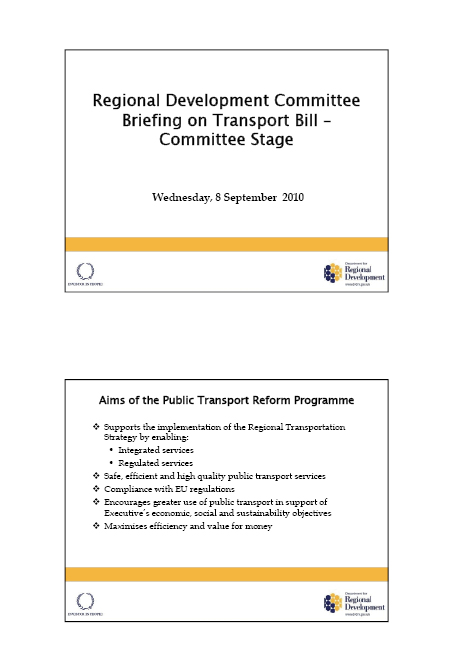
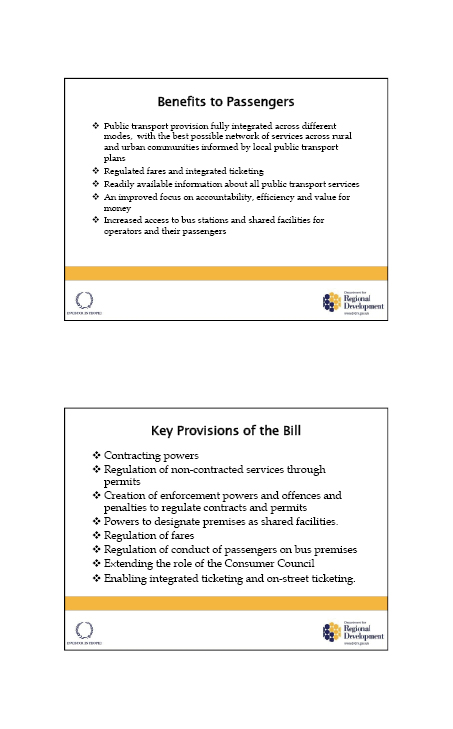
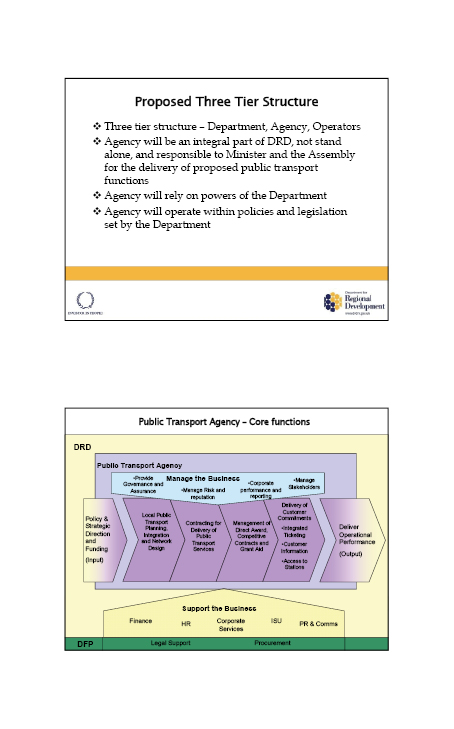
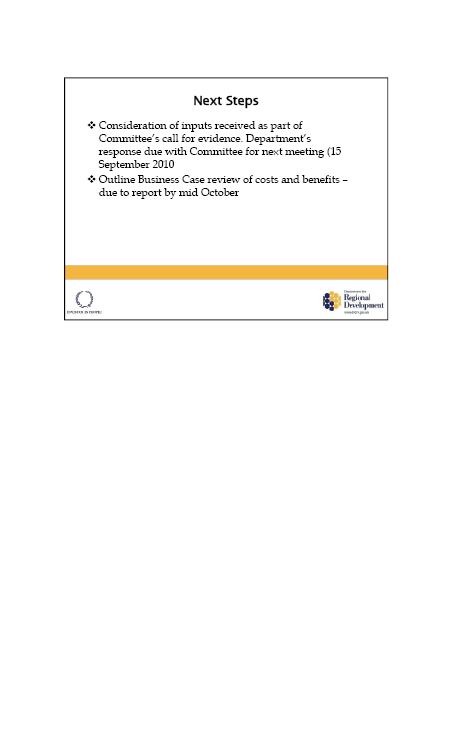
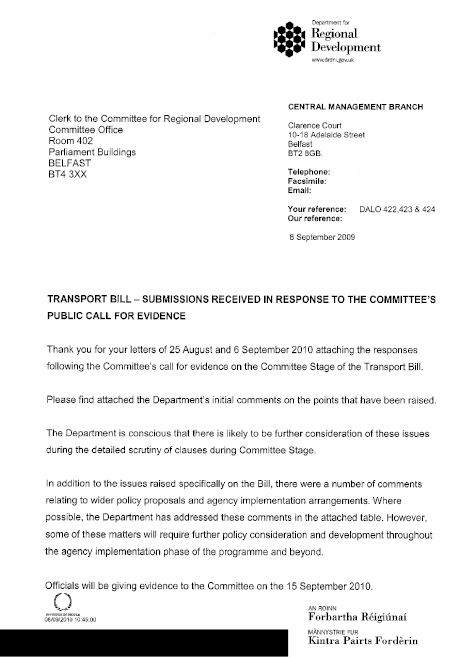
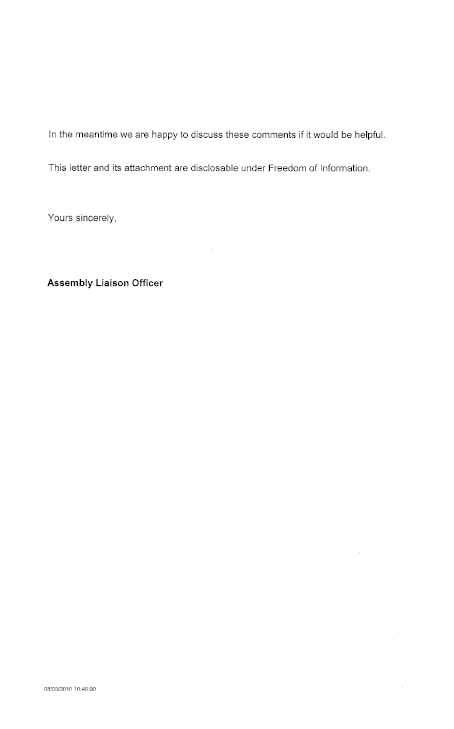
| No. | Organisation |
| 1. | Northern Ireland Transport Holding Company / Translink |
| 2. | Northern Ireland Committee – Irish Congress of Trade Unions |
| 3. | Northern Ireland Local Government Association |
| 4. | Omagh District Council |
| 5. | Newtownabbey Borough Council |
| 6. | Consumer Council |
| 7. | Older People's Advocate |
| 8. | Northern Ireland Environment Link |
| 9. | Belfast Healthy Cities |
| 10. | Federation of Passenger Transport |
| 11. | Community Transport Association |
| 12. | Inclusive Mobility Transport Advisory Committee |
| 13. | Stephen Wood Consultancy |
| 14. | Institute of Public Health |
| 15. | ILEX Urban Regeneration Company |
| 16. | Institute of Directors |
| 17. | Law Centre NI |
| 18. | Craigavon Borough Council |
| 19. | Parker Green Consultancy |
| 20. | Committee for Education |
Transport Bill – Responses to RDC Call for Evidence
| Part of Bill |
| Part 1: Public Passenger Transport Services |
| Duty to Secure the Provision of Public Passenger Transport Services |
| Service Agreements |
| Service Permits |
| Service Levels and Specification |
| Most Services to be Provided by NITHC |
| Integration of Services |
| Fare Regulation |
| Commercial Opportunities |
| Operator Licences |
| Part 2: Buses, Taxis and Trains |
| Part 3: Consumer Council |
| Part 4: Enforcement |
| Part 5: Grants |
| Part 6: Miscellaneous and Supplementary |
| General Comments / Other Issues |
| Issue | Raised by | Clause | Comments* | Department's Response (Including Rationale) |
| PART 1: PUBLIC PASSENGER TRANSPORT SERVICES: SERVICE AGREEMENTS AND SERVICE PERMITS | ||||
| Duty to Secure the Provision of Public Passenger Transport Services | ||||
| Regard to Needs of the Public | Consumer Council | 1(1) | The clause does not state that the provision of public transport should meet the needs of passengers. Proposed Consumer Council amendment: "The Department must secure the provision of public passenger services with meets the needs of the public" | The Department will consider this proposed amendment. The extent to which user needs can be met will always, however, be dependent on the availability of funding. In respect of ensuring transparency in securing the provision of public passenger transport services, the Department considers that these issues are already appropriately addressed through current procurement and FOI legislation and the reporting requirements of EC Regulation 1370/2007. |
| Regard to Needs of the Public | Older People's Advocate | 1(1) | Suggested amendment: "The Department must secure the provision of public passenger transport services according to need and with due regard to economy, efficiency and safety of operations." There must be this acknowledgement of the 'need' for services and in 1(2)(b) a requirement for 'transparency of delivery by both the operator and the Department'. Both need and transparency are essential criteria when considering the effectiveness and efficiency of services provided for older people and all those with special needs. | |
| Regard to Sustainability and Carbon Emissions | Northern Ireland Environment Link | 1(1) | In Part 1 Section 1 we feel it is very important that the concept of sustainable technology and use of resources, in particular carbon, is mentioned along with the other areas with which the Department must ensure compliance. Insertion of words to this effect, such as environmental sustainability, carbon efficiency or resource efficiency is necessary in this first paragraph of the Bill to demonstrate that the Department is ensuring that the delivery of this Bill plays its part in the drive to reduce greenhouse gas emissions in Northern Ireland. | The Department accepts that the inclusion of sustainability would help to clarify the factors that the Department must take into account in securing public passenger transport services and would reflect Executive policy in relation to sustainability. The Department will consider this proposed amendment. |
| Regard to Affordability for Passengers / Potential Passengers | Belfast Healthy Cities | 1(1) | Clause 1 states that 'The Department must secure the provision of public passenger transport services with due regard to economy, efficiency and safety of operation'. We would note here that public transport providers also should take into account how economic the service provided is for passengers and potential passengers. When setting fare structures, ensuring affordability is essential to promote the mobility and social inclusion of the most vulnerable groups in society, including older people, people with disabilities and people on low incomes. Affordable fares can also help incentivise public transport usage, especially in comparison to private cars, and can contribute to increasing patronage. | The Department is particularly conscious of the affordability issue for passengers and intends to take account of this when considering the regulation of fare levels and structures as provided for under clause 1(2)(d). |
| Regard to Accessibility | IMTAC | 1(1) | We still believe there is a requirement from the Department to reaffirm the commitment made in the RTS to build in accessibility as a condition of spending public monies on transport. We recommend this should be achieved by including accessibility under the relevant clauses of the Bill as a matter the Department must pay due regard to when using powers under the Transport Act to secure services. | The accessibility requirements in respect of public transport vehicles are covered by the Disability Discrimination Act 1995 (as amended by the Disability Discrimination Act 2005). In addition, the Department, in specifying the contract requirements, will define the accessibility standards to be complied with in any contract. As such, the Department considers that there is adequate legislative provision to ensure the Department addresses disability requirements. It is not good practice to duplicate legislative provision. The Department is already committed to the implementation of the Accessible Transport Strategy. In addition, in preparing local public transport plans, the proposed agency will consult fully with representative groups such as IMTAC in order to ensure that public transport needs and impacts are fully considered. |
| Regard to Local Public Transport Plans | Stephen Wood Consultancy | 1 | I propose that a reference is included to relevant local public transport plans. | The introduction and development of local public transport planning cannot be considered in isolation from the Department's current wider transport planning responsibilities including the Regional Transportation Strategy (RTS) which is underpinned by three more detailed transportation plans:-
|
| Issue | Raised by | Clause | Comments* | Department's Response (Including Rationale) |
| Service Agreements | ||||
| Content of Public Service Contracts | NITHC/ Translink | 2 | In light of recent events this July at Lurgan, it is germane to the delivery of future rail public service contracts that full account is taken of the impact of civil unrest and other factors outside the control of the operator. We believe that the Committee and the DRD will take cognisance of this factor when considering the scope and drafting of public service contracts. Like any contract, there will be circumstances and events which cannot be envisaged, where experience and authority will necessarily take precedence over the strict letter of terms and conditions. Translink has unparalleled experience of dealing with such circumstances often on an emergency basis, and will continue to deploy the skill and experience of trained local staff whenever unrest or other unforeseeable events occur in future. Common sense treatment of such (not uncommon) incidents will be important for performance measurement and contract monitoring by the Agency. | Clause 2 of the Bill allows the Department to make regulations as to matters which must or may be dealt with in service agreements. The impact of civil unrest is an example of a matter which would be taken into account when assessing the performance of the operator under the contract. In developing these regulations and in designing the contract specification for the direct award contract, the Department will wish to engage with Translink to ensure a pragmatic approach to issues such as this. In addition, Article 5(5) of EC Regulation 1370/2007 allows the competent authority to take emergency measures in the event of disruption to services or the immediate risk of such a situation. |
| Direct Award Contract / Exclusive Rights | NIC / ICTU | 1 | The Bill does not adequately cater for the direct award concept contained in EC Regulation 1370/2007. An exclusive right for Translink to operate (no other operator permitted to compete) should be the preferred option. However, we do believe that there is a role for small private operators to be used as sub-contractors in the provision of supplementing a public transport entity. NIC ICTU welcomes the commitment in the Bill that most public transport services will be provided by NITHC and its subsidiaries but there is nothing to prevent all of the service provision being contracted to Translink by DRD. NIC ICTU is confident that by complying with EC Regulation 1370/2007, public service contracts will ensure transparency and consistency in the provision of an efficient and quality service. | Translink currently provides the majority of public passenger transport services and it is the Department's policy that it continues to do so. The Department plans to directly award contracts to Translink for most of the existing services that it delivers. This is provided for in clause 1(3) of the Bill. It is subject to both the Department's duty under clause 1(1) to secure services with due regard to efficiency, economy and safety of operation and to EC Regulation 1370/2007, which requires Translink to demonstrate on an ongoing basis that it is providing the services in an efficient manner and that it is not being over-compensated. There is already a degree of regulated competition in the public transport market. The market currently includes, in addition to Translink, private bus operators, black taxi operators, door to door services, demand responsive services and this will continue under the provisions of the Bill. In the future some services such as rapid transit and park and ride services may be open to competitive tender subject to the provisions of clause 1(3). The Bill also provides for the granting of service permits for routes which fall outside the contracted network. The purpose of service permits is to allow the Department to authorise the provision of service which are supplementary or complementary to the contracted network of services. The permit system will allow operators to identify opportunities and apply for permits for services which are not already being provided in the contracted network. This will facilitate innovation by operators, enable private operators to propose new services and allow the public transport market to grow. |
| Current Services Operated by Private Operators | Federation of Passenger Transport | 1 | The Bill secures Translink's position as the main transport supplier of services and directly awards most of the current services to them subject to mandatory requirements laid down in regulation EU1370/2007. However, there is no mention made to the other services currently carried out by private sector transport providers. Will these services be included under the same directly awarded contract? Or will they remain with the original operator? If they are directly awarded to Translink, then how will this process be handled? Is there an appeal against this decision to award to Translink or a compensation scheme for the loss of livelihood? | The Department envisages that in most cases a permit will be granted to private operators for the existing services they provide under the Road Service Licensing system. The Department will put in place transitional arrangements to facilitate the move from the current Road Service Licensing System to the new permit arrangements. There may, however, be circumstances where the Department considers that it is in the wider public interest for those services to be provided under contract. Under these circumstances, the operator will be given maximum notice where an existing permit (or route licence in the case of taxi bus services) is not being renewed. |
| Issue | Raised by | Clause | Comments* | Department's Response (Including Rationale) |
| Service Permits | ||||
| Fees | Northern Ireland Local Government Association | 13 | It is important that fees are reasonable and reflective of real cost of processing applications and issuing permits in order to allow small operators to apply for such permits. | The fee for a service permit will be reflective of the administrative costs associated with the permit application, consideration and issue. In prescribing the fees, the Department will ensure that they are reasonable and not prohibitive to smaller operators. The level of fees will be prescribed in regulations, which would be subject to the scrutiny of the Regional Development Committee. |
| Fees | Omagh District Council | 13 | The Council notes that Clause 13 relates to Fees for permit applications and would ask that fees are set at a fair and reasonable rate so as to be affordable to small and reputable operators. | |
| Consideration of Views of Public Transport Users | Belfast Healthy Cities | 6(2) | Clause 6 does not include views of users or potential users of a service, or persons living along the proposed route, among issues to which the Department must have regard. Such consultation can, however, provide valuable qualitative information on how a service would affect these stakeholders, and improve decision making. For example, a new route may improve people's access to jobs and services. In some cases, in particular where a new or additional service is provided in rural areas, new job opportunities may become viable, which contributes directly to Programme for Government aims of a fair and prosperous Northern Ireland. A mechanism for gaining views could therefore support the objective of an economically sound and sustainable public transport system. | Clause 6(2) deals with the issue of permits to mainly private operators and not for the majority of services which will be secured by the Department through service agreements which will be informed by local public transport plans, developed in consultation with key stakeholders including local councils, transport operators, community groups, local users and other Government Departments. The purpose of the service permits is to facilitate commercial innovative services where operators have identified a gap in the market and are prepared to offer services at their risk. These services would be in addition to the contracted network of services. As such, the Department considers that any such service is likely to be beneficial to users/potential users providing it does not compromise or undermine existing services. In applying for a permit, the operator will be asked to support its application with evidence for demand. Such evidence can include passenger / customer surveys, letters of support from local resident / community groups, businesses, customer requests or a change to the demographics of the local area (e.g. a new housing development). In addition, the Department must have regard to any recommendations made by the Consumer Council whose role is to represent public transport passengers. |
| Consideration of General Effect on Users and Views of Public Transport Users | Older People's Advocate | 6(2) | General effect – this should include 'users' as this has a particular relevance for older people, those with disabilities and those without other access to transport. Would it also not be appropriate to include representations from users of the service at this point? | |
| Representations by Equality Commission | Older People's Advocate | 6(2) | Would it not be appropriate to include representations from the Equality Commission for Northern Ireland who have responsibility for monitoring equal treatment of everyone in Northern Ireland within the 9 categories identified under S75? | |
| Consideration of Local Community Views and Representations made by the Community Transport Association | Community Transport Association | 6(2) | The CTA recommends consideration should be sought from the local community. By taking into account community need the Transport Bill will ensure isolation and exclusion zones are not created through 'cherry picking' of economically advantageous routes. The CTA plays an integral role in supporting community led transport planning. We would urge the Transport Bill to include the CTA alongside the Consumer Council in representing community issues. | |
| Service permits are for operators to provide services along a route where they have identified a gap in the market and a viable commercial opportunity. The initiative for services provided under permits lies with the operator. Operators are not designated bodies in relation to section 75 and as such the Department does not consider that the Equality Commission would have a role in considering permit applications. The Department considers that it may be appropriate in future to consult the CTA, as a service provider, in respect of any permit applications and will consider an amendment to include community transport providers. However, it should be remembered that applications for most permits will be commercially driven and will not necessarily be targeted at addressing social need. In planning the service network and specifying contract requirements, the Department will consider the needs of passengers, including where the service is not-profitable. | ||||
| rWording "shall" – Consideration of Recommendations / Representations | Older People's Advocate | 6(2) | "The Department shall also take into account any recommendations…and any representations by…" 'shall' does not appear to be strong enough in this context 'must' would seem more appropriate to ensure effectiveness and efficiency. | In respect of the legislative interpretation of "shall" and "must", both terms are equally as strong in indicating the requirement on the Department. There is no difference between the terms. |
| "Suitability of Routes" - clarification | Federation of Passenger Transport | 6(1) | What exactly is meant by suitability of a route? And what criteria are applied when considering this? | During the implementation phase of the reform programme, the Department will design the application and consideration processes for permit applications. This will involve developing detailed guidance and criteria to be applied when considering permit application. The Department will put appropriate administrative safeguards in place to ensure a fair, transparent and equitable system. The Department does not consider that it is appropriate to include specific details of the application process in primary legislation. This would be more appropriately dealt with in subordinate legislation and the Department has the power to make such regulations under this clause. In considering the "suitability" of a route, the Department may consider matters such as the availability of stopping points, start/end points and the roads to be traversed, in addition to the other matters set out in clause 6. |
| Application Process | Older People's Advocate | 4 | Will the information prescribed as necessary for the application of a permit comprise a robust set standards for all applicants with which applicants must comply and indicate scrutiny that will be undertaken before a service permit will be granted. The current wording lacks sufficient clarity to ensure a transparent process. | |
| Duration | Older People's Advocate | 7 | Should there not be a requirement to 'monitor annually' | The Department considers that three-years duration for a service permit is appropriate in order to secure a degree of stability and a reasonable return on any investment by the operator. Nevertheless, the Department will have a "use it or lose it" policy to ensure that once a service permit is granted, the operator provides the service on the agreed route. The Bill also includes powers to revoke, suspend and curtail permits in the event that the conditions of it are not being met. In addition, the Bus Operator's Licence and PSV certificates for vehicles are currently renewed annually. The Department will put in place adequate checks with the Driver and Vehicle Agency to ensure the validity of these operating requirements. |
| Revocation, Suspension and Curtailment | Older People's Advocate | 10 | Should there not be provision for the public to make complaints which will be taken seriously in deciding on the continuation of the permit? There is no reference to the public or specifically to ‚users' under this article. | The Department will require permit holders to put in place an appropriate complaints procedure as a condition of the permit. Any breach of this condition will be investigated and, where appropriate may be revoked or suspended. The agency will also have a complaints process. |
| Revocation, Suspension and Curtailment | Community Transport Association | 10 | The Bill does not state clearly how transport can be delivered during times when transport is affected by suspension. Section 11 (6) states while a permit is suspended no alternative services may be provided through that permit. CTA would encourage an additional clause is included to allow the Department to continue transport provision through issue of a temporary permit to enable another supplier to deliver transport services in the interim and until the original permit is out of suspension or awarded to an alternate supplier. | The Department agrees that continuity of service is important and that provision is made for the continuation of suspended services. The Department is content that there is adequate provision in the Bill to allow it secure the provision of services during any period of suspension. Under clause 1(2)(a), the Department would be able to directly award a contract to the internal operator to meet passenger need during any period of suspension. In addition, clause 14(3) could be utilised to allow the transfer of a permit to another operator if the incumbent operator is not in the position to deliver services for a specified period. As such, the Department does not consider that there is a requirement for powers to award temporary permits. |
| "Non-contracted services" - clarification | Federation of Passenger Transport | 1(5) | Examples of what is meant by non contracted services would be helpful to understand exactly which services are being referred to. | "Non-contracted services" means services which are not part of either the directly awarded contract to Translink or a competitively tendered contract for service provision. They are additional to or complementary to the contracted network of services and will be operated under a permit. These services will allow operators to identify commercial opportunities which are not already provided for and could include a variety of service types, including stage carriage, express and demand responsive services. |
| Issue | Raised by | Clause | Comments* | Department's Response (Including Rationale) |
| Service Levels / Specification / Socially Necessary Services | ||||
| Cherry Picking | NITHC/ Translink | When applying for a contract, or a service permit, the matters to which DRD must have regard prior to award should be fairly clear to all. Customers need to be protected from operators 'cherry picking' the most remunerative routes to the detriment and neglect of non-profitable routes - for example many of Northern Ireland's rural community services. In various industries which serve the public interest, different mechanisms are used (grants in the water sector, postalised tariffs in the gas sector, cross-subsidies etc) to bring a form of assurance and equalisation to ensure universal protection to all users of a wide and disparate network. For public transport purposes, country-wide safeguards in the award of contracts and permits and for the setting of fares should be put in place. The Committee will want to satisfy itself that Translink retains the ongoing commercial ability to maintain the contracted network (through grants, or cross subsidies or through other means) in order to discharge its public service obligations for all of Northern Ireland's transport users. | The provisions of the Bill provide for the continuation of a regulated system. Clause 6 of the Bill sets out the matters to which the Department shall have regard in deciding whether to issue or refuse a permit. These matters include the impact on existing contract and permit holders and the extent to which the needs of the passengers are already served. The Department will ensure that the appropriate administrative safeguards are in place in the application procedures to ensure that the legislative provisions and policy guidance are adhered to in consideration of these matters. This will allow the Department to prevent operators from targeting only the profitable routes to the detriment of non-profitable but socially necessary routes. | |
| Cherry Picking | NIC / ICTU | NIC-ICTU is deeply concerned with the policy thrust contained in the Bill on Service Agreements and Service Permits. Our concern specifically relates to our experiences in other countries whereby operators who have received licences as per the content of this Bill do not adhere to the parameters set out in the licence and set about to take existing passengers off the current Operator. | Part 1 of the Bill contains a number of powers in relation to the consideration of permit applications; the conditions attached to permits; the revocation, suspension and curtailment of permits; and the disqualification of permit holders. These powers will allow the Department to deal with operators who do not comply with the terms of the permit and who attempt to encroach on existing services. The Department proposes to put enforcement arrangements in place to help ensure that the conditions of permits are not being breached. | |
| Frequency of Services | Northern Ireland Local Government Association | It is believed that if we are to increase public confidence in, and use of public transport there must be an appropriate frequency of service. Whilst it is necessary to have a high frequency of service provision at peak times, it is the opinion of our members that service may be unsatisfactory or non-existent at other times, and that this can have a serious socio-economic impact, particularly in the evenings. It is felt that services at present, particularly in rural areas, are dedicated to schools and less focused on commuters. Commuter services need to improve, and in particular between towns, rather than 'all roads leading to Belfast'. This will become more pressing if the recommendations of the Bain review of public sector employment are followed. Our members are extremely keen to overcome problems related to rural isolation and would encourage the Department to focus attention on addressing the transport requirements geared towards targeting isolation and enabling access to services, developing a system of links to the main arterial services. This is likely to require improved funding for community transport and other public transport providers. The key to drawing up the details of the contracts and permits will be to consult on the service requirements for an area. There must be more involvement of the public transport providers in developing town master plans. The greatest opportunity for the community to influence service provision will be in the development of local transport plans between the agency and local councils. | The specification of service requirements will be determined through the development of local public transport plans. As the organisation with lead responsibility for developing the plans, the departmental agency will work with key stakeholders, such as Road Service, operators, local councils, education authorities, consumers and community representatives. Arrangements will need to take account of the local councils' responsibilities for community planning as the policy on this evolves. The plans will provide a more explicit approach to identifying passenger needs and planning and prioritising service provision within the overall funding and resources available. The agency model brings responsibility for planning the overall public transport network within the responsibility of Ministers and Assembly rather than as currently, transport operators. This enables more focus on decisions being taken in line with Executive policy and the wider public interest. | |
| There needs to be a strategic link between the proposed agency, DRD, Translink and local community planning/ local transport area planning structures. Local government, as a civic leader, rooted in the community, can easily identify the local issues and deal with those, with central government focusing on strategic policy. An effective link between the two within the community planning/ local transport area planning process will be the lynchpin of these proposals. There is a need to work more effectively locally, with a reporting mechanism to a strategic regional level. Although there is uncertainty as to the methodology and timeframe for taking community planning forward, it is clear that there is a strong link between the place shaping role of local councils and the provision of public transport. There must also be a mechanism for democratic approval of public transport plans. Whilst there is a reference to the 'Local Transport Plans' in the Explanatory Memorandum, it is a concern that there is no specific provision for such an important activity within the Bill. | ||||
| Local Public Transport Plans | Omagh District Council | The provision of public passenger transport services needs to be on an equitable basis across Northern Ireland and priority needs to be given to the provision of such a service in those rural areas where the current infrastructure is poor. A more integrated approach to strategic and local level transport planning needs to be undertaken to make this happen and to create the confidence of the public to make greater use of public transport. Whilst the Review of Public Administration is stalled, the responsibility for Community Planning is still to be given to local Councils. In this context, the need for greater consultation and involvement of Councils as a key stakeholder in the development of regional and local Transport Plans is essential to ensure they are compatible with and complementary to Community Plans and Local Development Plans. | ||
| Services to Enhance Access to Employment | Newtownabbey Borough Council | One area of concern for the Council is in relation to the Department's responsibility to secure the provision of passenger services. There are many areas throughout Northern Ireland where there is insufficient public transport provision to allow the workforce to easily access areas of employment. By way of example, the Council would highlight the employment opportunities at Mallusk but the lack of public transport from areas like Longlands, Bawnmore, Rathcoole and Monkstown within the Borough. | ||
| Local Public Transport Plans – Statutory Duty | Stephen Wood Consultancy | I propose that the Transport Bill is amended to include specific reference to the Department's commitment to prepare local public transport plans and to refer to these plans and other relevant policies and plans in issuing or refusing permits. I believe it is essential that a statutory transport planning process is established in Northern Ireland. This transport planning process will greatly assist the planning and delivery of an efficient and sustainable transport system. | The Department agrees that the development of local public transport plans will provide the foundations for contracts, permits and grant aid for public transport services in local areas. As noted above, the involvement of key stakeholders (operators, Councils, community representatives, etc.) will be critical in ensuring that, as far as resources allow, the plans meet community needs. The introduction and development of local public transport planning cannot be considered in isolation from the Department's current wider transport planning responsibilities including the Regional Transportation Strategy (RTS) which is underpinned by:-
|
|
| Community Transport Provision | Community Transport Association | The CTA would ask regard is made to allow provisions for innovative, non-economical routes that could be delivered by not-for-profit, community transport providers operating under the s10b permit regime. By its nature, not-for-profit transport delivered by and for the community remains outside commercial competition rules. The validity of transport routes on the basis of competition is mute in areas where there will be low patronage but much needed access links will ensure social exclusion and rural isolation are addressed. | The Bill includes powers (Clause 34) for the Department to pay grants for services in certain areas, such as rural areas, which would not otherwise be provided because it would not be profitable for operators. This allows the Department to either secure services through service agreement or by providing grant aid. DoE are currently reviewing the arrangements for operator licensing, including 10B permits. DRD will continue to work closely with DoE to ensure that any new arrangements for operator licensing are compatible. | |
| Issue | Raised by | Clause | Comments* | Department's Response (Including Rationale) |
| Most Services to be Provided by NITHC | ||||
| Non - Privatisation of Translink | Northern Ireland Local Government Association | 1(3) | There is great potential for private sector providers to fill gaps and complement existing service provision and NILGA would encourage this approach, with better liaison and integration between public and private, and potentially profit sharing contracts. However, any move towards privatisation of the main provider will be vigorously opposed, particularly as there is the possibility that unregulated competition could lead to a reduction in the number of operators and ultimately a reduction in services that are non-profitable but of social benefit. | The Minister has ruled out privatisation of the public transport system now or in the future. Under the provisions of the Transport Act (Northern Ireland) 1967 the Northern Ireland Transport Holding Company (NITHC) is a public corporation. Ulsterbus, Citybus and Northern Ireland Railways (branded as Translink), are wholly-owned subsidiaries of NITHC. There are no plans to privatise NITHC or its subsidiaries and any proposals to do so would require further legislation on which the Department would be required to consult. The legislation as drafted allows for:-
|
| NITHC / Translink as main provider | Older People's Advocate | 1(3) | The Explanatory Document indicates that three options for the organisational arrangements to deliver and sustain the reforms were considered and that the 'agency option offered best value for money' The Bill does not specify the nature of this agency or its relationship with the Holding Company. There is no indication as to why the Holding Company is deemed to be the most appropriate body to deliver transport services | The agency would be an executive agency within the Department for Regional Development. As the agency will be part of the Department, there is no distinction between them in the legislation. The relationship between NITHC and the agency will be set out in the contractual arrangements and, if necessary, in other procedural documents. The agency will be responsible for, among other things, specifying public transport requirements and managing the direct award contract with Translink. |
| EC Regulation 1370/2007 allows for a directly awarded contract to an internal operator, such as Translink. The Department included its proposal that Translink should remain the main supplier of public transport services in its public consultation and there was widespread support for this proposal. The Department considers that Translink is best placed to deliver the majority of public passenger transport services as it has significant experience, the necessary infrastructure in place and will help maintain continuity of service provision to customers. The introduction of contracts will allow the Department to specify the public transport requirements and to monitor the performance of Translink and other operators, as necessary. The Department will also carry out periodic benchmarking to ensure efficiency and value-for-money of Translink services. | ||||
| Issue | Raised by | Clause | Comments* | Department's Response (Including Rationale) |
| Integration of Services | ||||
| Integration of Services / Multiple Operators | NIC / ICTU | There has been improved integration of timetables, bus & rail park and ride schemes and services and we do not believe that if more service providers are involved that integration can ever be fully achieved. | The requirements for integrated ticketing and information systems are currently being considered in the IS/IT Strategy, which was commissioned by the Department. The outcome of this assignment, being carried out by PricewaterhouseCoopers (PWC) will provide expert analysis of information systems and technology which will benefit the customer and the sector and will be available to the Department by November 2010. The Committee will be fully apprised of the outcome of the review. It should also be noted that Translink is represented on the steering group set up to oversee the work in the strategy. There are examples of successful implementation of integrated customer information and ticketing systems in other jurisdictions where there is more than one transport provider. | |
| Integrated Ticketing – Cost to the Consumer | Northern Ireland Local Government Association | NILGA is supportive of the proposals regarding integrated ticketing, which will allow for better planning. However, NILGA would seek assurance that an integrated ticketing system would not push costs to the consumer up, and are wary of the added expense of the iLink system already introduced. | ||
| Integrated Ticketing | Newtownabbey Borough Council | The Council has previously highlighted the need to have easily accessible non e-ticket sales and would again re-emphasise this point. | ||
| Issue | Raised by | Clause | Comments* | Department's Response (Including Rationale) |
| Fare Regulation | ||||
| Fare Regulation | NITHC/ Translink | 1(2) | Recognising the new legal powers being taken by the DRD and/or the Agency, we note that DRD will be subject to greater consultation requirements as a result. In exercising the power at clause 1 (2) (d) to "determine the general level and structure of fares", the Department will be mindful of the need to exercise this Determination in the manner befitting of similar public law powers – i.e. after due procedural care, full ventilation of the fare options and only after intelligent debate with stakeholders has taken place. The way in which fares will be regulated is not a focal point of the Bill. That said it is probably one of the most important features of the new arrangements as viewed through the eyes of paying customers and service operators. The degree to which transport operators can cover their costs, make a reasonable margin, and bear commercial risk is not presently clear. Translink would like to draw attention to the logic that if this clause remains in the Bill, then greater commercial risk arising from fare-setting by a third party should be accompanied by greater commercial freedom for operators, not less. To illustrate the point, Translink and other operators need to understand whether or not the regulatory model will use risk-loaded 'net' cost contracts or fully recoverable 'gross' cost contracts, so that appropriate budgeting control can be used for particular services run by particular operators. | Consultation already takes place between Translink, the Department and the Consumer Council on fare level and structures. The Department will build on these consultation arrangements when it is determining the general level and structure of fares in the future. The specific way in which fares are to be regulated is an important issue which will need to be defined during the implementation phase of the reform programme, with regard to the specification and design of contracts e.g. where the revenue risk lies. The Department does not consider it to be appropriate to include specific detail on the methods of fare regulation in primary legislation, as it is will evolve and change depending on circumstances and experience of operating under the new system. The arrangement for contracting with Translink and other operators will be subject to detailed discussions and negotiations, including the arrangements for fare reviews and risk allocation. |
| Fare Regulation | NIC / ICTU | 1(2) | NIC-ICTU is unsure of what the Fares Regulation means in terms of who bears the commercial risk. We are unable to interpret whether the policy in the Bill will operate on a net or gross cost basis. | The Bill includes the enabling powers to allow the Department to regulate fares and to enter into service agreements. Whether the contracts will operate on the basis of a net-cost (operators take revenue and cost risk) or a gross-cost (the Authority (the agency) takes revenue risk while cost risks fall to the operator) is a matter for consideration and negotiation during the contract specification and design phase. The Department may wish to use a variety of contract types and the enabling power in the Bill provides the flexibility for it to do so. Transport for London (TfL) have a similar enabling power in respect of entering into agreements and regulation of fares and have utilised both gross-cost and net-cost contracts. |
| Issue | Raised by | Clause | Comments* | Department's Response (Including Rationale) |
| Commercial Opportunities | ||||
| Commercial Opportunities | NITHC/ Translink | 1(2) | We note with particular interest the Department's intended new power at clause 1 (2)(f) of the Bill to exploit commercial opportunities in the public transport arena. We would be keen to gain an appreciation as to how such a power sits alongside Translink's similar property holding and commercial mandate. The Committee will note that the Holding Company is required by law to act in accordance with the Transport Act (NI) 1967 "as if it were a company engaged in a commercial enterprise". Having successfully endeavoured to act as a commercial enterprise since 1967, and having benefited from the diverse private and public sector expertise from our non-executive and executive directors over the period, Translink has become accustomed to the identification and treatment of commercial risk. We have a track record of identifying and exploiting commercial opportunities. We trust that the DRD's new power to acquire and dispose of land and exploit commercial opportunities will be used thoughtfully and with care. Translink anticipates that such power will not conflict with or supervene in any case Translink's property holding and commercial mandate. | The Department intends to use this power to allow it to exploit commercial opportunities where vehicles or stops/halts are in the Department's ownership e.g. for rapid transit, where the contract will be open to competitive tender and therefore not necessarily provided by Translink. It is envisaged that Translink and private operators will continue to identify and exploit commercial opportunities in relation to the property they own and the services they provide. NITHC's role and powers under the Transport Act (Northern Ireland) 1967 will remain and it will continue to be required to act "as if it were a company engaged in a commercial enterprise". With regard to the Department taking powers for the acquisition and disposal of land this power will allow the agency to purchase land for the benefit of overall public transport provision to meet customer and operator need. This would include land required for Rapid Transit provision or in respect land to be used to enhance public transport provision for the benefit of operators and the travelling public. It is not intended that the Department will use these powers to purchase and dispose of land for commercial gain, as the response from NITHC/Translink suggests. |
| Commercial Opportunities | Federation of Passenger Transport | 1(2) (f) | Whilst there is agreement that the Department should be able to exploit commercial opportunities, this should only be under certain conditions and not where there is direct competition with other transport providers or companies who are private organizations and not publicly funded. It is important that any commercial activities undertaken should be specific to certain activities such as advertising on vehicles or bus depots but not on passenger transport services , otherwise the parameters of what is socially necessary and the exploitation of commercially activities becomes somewhat clouded and could potentially cause problems. | |
| Issue | Raised by | Clause | Comments* | Department's Response (Including Rationale) |
| Operator Licences | ||||
| Operator Licences | NIC / ICTU | 18 | In the context of Northern Ireland where there is high non-compliance with the National Minimum Wage legislation and other non-compliance in areas of taxation, etc, we fear for the Employment Rights of those employed by small operators. In order to achieve any sort of compliance in such a system necessitates a policing of those Operators and high financial penalties and removal of license for those found in breach of contract. Applicants for an Operators License must be subject to a rigorous test of their professional ability, competence, financial security and other assessments commensurate with the provision of an efficient high quality service. | Responsibility for monitoring compliance with the national minimum wage rests with HM Revenue and Customs. Under the reform proposals, Bus Operator's Licences will remain the responsibility of the Department of the Environment. The Bill makes the required amendments to Part 2 of the Transport Act (Northern Ireland) 1967, including renaming the "Road Service Licence" as "Bus Operator's Licence", amending the function of the licence to operator aspects only. In considering applications for Bus Operator's Licences, the DoE takes account of repute, financial standing and professional competence to ensure safety and quality standards. |
| Issue | Raised by | Clause | Comments* | Department's Response (Including Rationale) |
| PART 2: BUSES, TAXIS & TRAINS | ||||
| Taxi Regulation | NITHC / Translink | 21 | Clause 21: Whilst noting the modernising changes to the 2008 Taxis Act, Translink is of the view that in time there may be merit in extending the scope of transport law to include taxi "regulation" more formally within the public transport network. This could be achieved by looking at network coverage, fares, ticketing, information, service quality, general regulation and enforcement. We query whether it is a little premature and possibly outside the scope of the present, all be it permissive Bill, to facilitate this future extension. The Committee should note though that allowing for discretionary regulations which can be made in future is not uncommon in Northern Ireland statutory terms. Such a step would avoid the need for future primary legislation to enter into the Assembly timetable in the short to medium term future. | Under the new arrangements, the Department for Regional Development will be responsible for issuing permits to taxi operators providing public passenger transport services on specific routes, such as West Belfast Taxi Association and Derry Taxis. All other taxi regulation is the responsibility of the Department of the Environment, alongside its responsibilities for vehicle and passenger safety. There are no plans for taxi regulation to transfer from DoE to DRD. |
| Issue | Raised by | Clause | Comments* | Department's Response (Including Rationale) |
| PART 3: CONSUMER COUNCIL | ||||
| Consumer Council | NIC / ICTU | 23 & 24 | NIC-ICTU welcomes clarification on the role of CCNI but is unclear as to how a non-elected Body bereft of any Public Transport expertise is granted a status in the Bill which ignores representatives of the employees. There is a view in the Trade Union Movement that in recognising 'the shared interest' between Departmental Agency and Consumer Council may well pose a threat to the retention of Public Transport Services as a public good. | The Consumer Council is a statutory body and its role and functions in relation to public transport are set out in the General Consumer Council (Northern Ireland) Order 1984 and the Transport Act (Northern Ireland) 1967. The changes to the current system require the Department to clearly identify the impact on the Consumer Council's statutory role and to clarify its statutory role in light of the new arrangements. The clauses in this Bill seek to strengthen and clarify the relationship between the Department and the Consumer Council, in particular to facilitate co-operation and consistent treatment of public transport. In respect of the "shared interest" it is the Department's view that in order to enhance public transport service provision it is imperative that statutory bodies work seamlessly to consider and meet the needs of all those who avail of and provide services in the public transport sector The involvement of Councils can most appropriately be addressed through their involvement in the development of local public transport plans. As regards the democratic accountability of the Department and the agency, this is achieved through the accountability to the Minister and the Assembly. |
| Consumer Council / Local Councils | Northern Ireland Local Government Association | 23 & 24 | In broad terms, NILGA would support the role, function and intended responsibilities of the Consumer Council in this role. Local government is concerned that there is no reference to the role of councils in relation to the work between DRD and the Consumer Council. It is a concern that there is no specific provision for a prescribed formal relationship to councils in terms of the work of the Consumer Council. We would reiterate that whilst the Consumer Council may represent the wider interests on the Agency, democratic accountability is still of optimum importance to ensure effective implementation of the new proposals. | |
| Consumer Representation | Omagh District Council | 23 & 24 | The Council notes the content of Clauses 23 and 24 and is supportive of the role of the Consumer Council as a voice for the customer. It agrees there is a need for consultation and co-operation between the Department and the Consumer Council on the transport projects to be included in the Consumer Council's annual forward work programme. However, the Council is concerned that the Consumer Council may not have the voice of all communities or Section 75 groups and it is concerned also that there is no reference to the role of local government in relation to consultation or co-operation between Councils, the Consumer Council and the Department on such transport related projects. The Council would ask that these issues of representation are given due consideration. | |
| Issue | Raised by | Clause | Comments* | Department's Response (Including Rationale) |
| PART 4: ENFORCEMENT | ||||
| Enforcement | NIC / ICTU | Part 4 | NIC-ICTU believes that the proposed Offences and Fine Levels for Service Agreement/Public Transport Service Permit System are too lenient for those who would breach the contracts. Furthermore with regard to the appointment of Enforcement Officers it is the view of NIC-ICTU that the proper way forward is the appointment of a Transport Police Unit similar to those operating in GB and European countries. | The offences and fine levels take account of recent precedent for similar offences for freight, under the Goods Vehicles (Licensing of Operators) Act (Northern Ireland) 2010. The Department of Justice which has oversight of these matters was consulted, as is required, on the proposed offences and fine levels and was content. It should be noted that there is no limit to fines imposed on conviction on indictment. The Department also believes that whilst the creation of Transport Police Unit similar to that used in Great Britain would provide benefits the size of the sector here compared with service provision in GB would not justify associated costs and that robust enforcement by the Agency will meet the needs of the sector here. That said, should future policy direction result in the establishment of a Transport Police Unit, the legislation as drafted would allow for its designation as an authorised person. |
| Penalties | NITHC / Translink | Part 4 | Translink accepts and agrees with the need for strong enforcement powers, backed by criminal law where necessary, to police the compliance with permits, agreements and other requirements. We note that a civil regime replete with financial penalties and legally binding undertakings has not been preferred as a means to deliver compliance in public transport. We question whether this is a missed opportunity, as in other industries here (e.g. water and energy regulation), civil sanctions have led to improved company behaviour and the prospect of more finances being retained in Northern Ireland for the benefit of the industries and the infrastructure concerned. | The Department proposes to deal with service agreement compliance through the terms of the contract, including financial penalties where appropriate. The Bill also contains powers to allow the Department to revoke, suspend or curtail service permits where its conditions have been contravened. However, a key part of effectively enforcing the system is dealing with those operating with no authority to provide services (i.e. hold neither an agreement nor a permit). It is not possible to deter these operators through either financial penalties through the terms of an agreement or through revocation or suspension of a service permit. It is the Department's view that criminal offences and appropriate fines are warranted in order to maintain quality and safety standards on the public transport network and to deter illegal service provision. |
| Authorised Persons | NITHC / Translink | 25 | Clause 25 et seq: Authorised officers are an important part of the enforcement framework to ensure that the highest operational standards are adhered to. Perhaps more detail will be released in due course, but it is not completely clear to Translink as to the types and numbers of DRD staff, Agency staff, and other "constables" which may be enlisted and named as Authorised persons from time to time. To have a somewhat flexible group of authorised officers may be helpful, but to have no clear boundaries or lists about who is or who can be an authorised person probably requires further thought. One risk with a loose definition of an authorised person is that the regime may be subject to abuse by rogue-enforcers purporting to inspect and seize other operators property; for these reasons greater assurance as to the identities, experience and numbers of authorised persons would be greatly welcomed. Clauses 26-28: We wonder what type or quality of evidence will be required before an authorised person moves to having the reasonable suspicion or "reason to believe" that an offence is taking place allowing him or her to exercise the considerable power to seize property? Training in handling evidence and dealing with suspected persons fairly would be a pre-requisite which we are sure the Department (or Agency) will properly consider and wish to set in place. |
Powers of this nature are already exercised widely by the Department of the Environment in providing enforcement measures in the wider transport sector and particularly with regard to freight. Highly trained professional officers work in conjunction with the other law enforcement agencies and government departments seeking to prevent unlawful practices occurring. This includes preventing fraud, ensuring the safety and welfare of people and animals and other compliance issues set out in statute. The agency staff employed to ensure compliance will be trained to the same high standards and will hold the professional expertise to provide appropriate enforcement measures and will work with the Police Service, Revenue and Customs and operators alike to ensure that timely, appropriate and commensurate action is taken to ensure enforcement requirements are met. The drafting of this clause mirrors that for legislation which supports similar enforcement regimes for freight and taxi licensing. |
| Authorised Persons | Federation of Passenger Transport | 25 | What constitutes an authorised person? Will authorised persons be specific personnel employed by the Department or can an 'authorised person' also be DVA Enforcement personnel and PSNI personnel? | |
| Issue | Raised by | Clause | Comments* | Department's Response (Including Rationale) |
| PART 5: GRANTS | ||||
| Apportionment of Grants | Omagh District Council | 32 - 37 | The Council notes that clauses 32 – 37 relate to the payment of grants by the Department in relation to the provision of capital expenditure for the purchase of vehicles or facilities for passenger transport, public transport services and the provision of advice, information or training relating to passenger transport. The Council welcomes the payment of grants by the Department and would seek assurance that the criteria for payment of grants give a priority weighting to the distribution of grants for the provision of such services in the areas of greatest need. | The Bill brings together and clarifies the circumstance in which the Department may pay grant aid. The priorities for the allocation of such funding will depend on the Executive's Programme for Government and the Minister's priorities as set out in the Department's annual business plan and its corporate plan. |
| Capital Grants | Federation of Passenger Transport | 32 | Will capital grants be available to all transport operators equally as this is not specifically detailed? | The question raises issues of policy rather than legislation. The current power, under Article 6 of the Transport (Northern Ireland) Order 1977, to pay capital grant for the purchase of buses only allows for payment to NITHC. The Department currently provides capital funding to NITHC/Translink for the purchase of buses, trains and other infrastructure. It also provides grant aid for the purchase of buses for community transport. This funding is provided because both Translink and the community transport partnerships are required to deliver many public transport services which are not commercially viable without Government subsidy. This clause broadens the power by removing the restriction of payment only to NITHC. This is because, in the future, there may be a need to purchase vehicles for use by a contracted operator, e.g. for rapid transit. The current Investment Strategy envisages capital funding being made available for the Rapid Transit project for the purchase of vehicles. |
| Other than the capital grants identified above, it is not envisaged that any further capital grant will be available to private transport operators for bus purchase – these permitted services are expected to be commercially viable in their own right. | ||||
| Wording – "may". | Northern Ireland Environment Link | 33 & 34 | In Part 5, sections 33 and 34 the use of the word 'may' should be supplemented by an indication that this is an important service to be provided. The wording at present leaves it appearing that this is an optional and therefore unimportant service. The need for public transport provision for residents in these categories should be fully acknowledged in the Bill. | The word "may" is used to indicate that power is conferred on the Department to pay grants for services of benefit to vulnerable sections of the community and socially necessary services. The Department is committed to the provision of such services and currently operates a number of schemes, including door-to-door transport and the Rural Transport Fund. However, primary legislation is not an appropriate vehicle for indicating Departmental priorities or designating the importance of particular policies. The inclusion of the power in the Bill reaffirms the Department's commitment to these issues. The continuing funding of these schemes is dependent on the funds available and Executive priorities, which will evolve over time. Therefore, it would be difficult to commit to providing a minimum level of service in primary legislation. |
| Commitment to Minimum Service Levels | Belfast Healthy Cities | 33 & 34 | Clause 33 and Clause 34 appear to relate to the Door-to-Door scheme and community transport schemes across Northern Ireland. These services significantly contribute to the health and wellbeing of older people, people with disabilities and rural dwellers without access to a car, by offering affordable access to services. For many users, these transport services also provide a vital opportunity for social interaction, which underpins mental wellbeing as well as social cohesion. It is to be welcomed that support for these services is enshrined in the Bill. However, for the long term wellbeing of users of these services it would also be important that a minimum service is defined and commitment to providing such level of service is given. | |
| Sharing of Costs Across Departments | Older People's Advocate | Is there not an opportunity in the provision of services for the sharing of costs across Departments where a service specifically addresses a need for people to get to where the services of other Departments are being delivered. | The development of local public transport plans will assist in the identification of services which could be better integrated and more efficiently provided, to ensure value-for-money in overall service delivery. | |
| Services in Certain Areas | Older People's Advocate | 34 (a) | How will the Department define 'reasonable needs'? This is not clear and would leave it to the Department to interpret, there needs to be robust structures with clear criteria for assessing such need. | When the Department is developing local public transport plans and contract specifications, it is inevitable that it will have to define what are "reasonable needs". In deciding whether to pay grants, the Department will need to take account of the funding and other resources available to it. This is not a matter that can be defined in primary legislation. |
| Services in Certain Areas – "efficiently and economically" | Older People's Advocate | 34 (b) | How will these criteria be assessed against the needs of individuals particularly older people without access to other forms of transport? | When plans are being produced for any new services it is always necessary to produce a business case for the proposed service to examine the costs and benefits (including the benefits accruing to beneficiaries) and the value for money of providing the service. This process, which would include an assessment of the funding available, would be used to determine whether or not it is viable to provide the required service. |
| Supplementary - clarification | Older People's Advocate | 36 | "If the Department considers it appropriate in connection with any provision of, or the purposes of, this Act, but has not power to do so under any other provision of this Part, the Department may pay such grants to such persons as it considers appropriate." This may be good legal speak but is obtuse when its meaning is trying to be deciphered | This power allows the Department to pay grants where there is no other explicit power to do so. This will ensure that the Department has sufficient powers to provide funding in respect of the provision of public transport and provides the flexibility to allow for future developments in public transport. |
| DFP Approval | Older People's Advocate | 37 | While it may be necessary to give this power to DFP should there not be some requirement on that Department to take the advice of DRD or at the very least be required to give very clear reasons for not allowing payment where a clear need has been identified. | If Departments have the legal power to do something they will only be able to pay for it if they have the financial authority to expend the money. This must be provided through the Assembly which provides the necessary resources through the Supply Estimate system and confirming Budget Act. Public expenditure is controlled by DFP, authorised by the Assembly and accounted for in public. It is important to note that DFP agreement to budget provision in spending reviews does not alone provide adequate authorisation, nor does the existence of specific legal authority. Departmental budgets are agreed in spending reviews. Departments need DFP consent before undertaking expenditure or committing to other resource consumption. Usually DFP agrees general approvals for resource consumption subject to delegated limits and/or exclusions. This avoids the need for specific consent to each item. |
| Issue | Raised by | Clause | Comments* | Department's Response (Including Rationale) |
| PART 6: MISCELLANEOUS AND SUPPLEMENTARY | ||||
| Shared Facilities | NIC / ICTU | 43 | NIC-ICTU is concerned that the use of the term Shared Transport Facilities could be construed as a carte blanche opportunity for private licensed Operators to utilise publicly paid for facilities for private gain with no obligations to contributing to the upkeep of these services. NIC-ICTU is concerned that private Operators may seek to utilise: - Staff Canteen Facilities - Bus Depots - Cleaning Facilities - Office Accommodation - Maintenance and Engineering Services NIC-ICTU is opposed to the extension of these facilities based on our arguments of private gain and health and safety dangers. |
Clause 43 of the Bill allows the Department to issue directions (in the form of regulations) that "any place used for the provision of services under a service agreement shall be made available for the provision of specified services by another person". The purpose of this power is to make public transport more convenient and accessible to the public. Under the provisions in the Bill, after consultation with NITHC/Translink and other public transport operators, the Department would specify the conditions under which other operators would be allowed access to the shared facilities. These would include: the level of access to be allowed; the services to be made available; the level of charges to be levied on other operators using the shared facility; and any operating standards that the operator must meet, for example any health and safety or additional insurance requirements necessary for the use of a particular facility. The Department envisages that the facilities to be made available under such a direction would include: customer waiting areas; bus stands / pick-up and drop-off areas; and customer information (boards, announcements, etc.) |
| Shared Facilities | NITHC / Translink | 43 | Clause 43: Having been accustomed to managing and owning various properties and premises since its establishment, Translink would helpfully suggest that quite significant powers to direct "shared transport facilities" need to be exercised with some measure of sensitivity and care. Directions under Part 6 need to take a balanced approach when weighing multiple-operator interests against the rights of businesses and owners of "shared" facilities to lawfully enjoy their property and possessions. There would need to be proportionate limits and thresholds as to what can be done on someone else's property (especially as in most cases the property in question would not in fact comprise public space or public property). Translink, as a significant property holder, respectfully reserves a right to constructively contribute to any subordinate Regulations which DRD intend to use to flesh out the details underlying shared facilities. | |
| Translink recommends that the Committee satisfies itself as to the intended use of shared facilities directions, and to the types of premises they can cover. Clause 43: On a point of clarification we suggest that the Bill's description of shared transport facilities as comprising "any place" is amended to realign with the more precise language of the Explanatory and Financial memorandum, and of previous Hansard reporting (Volume 54, No 2). We suggest that the potential designation of "any place" is wider than the designation of any "premises or facilities". We believe that even the prospect of using "premises or facilities" is potentially too wide. The designation could alternatively refer to those essential facilities used by passengers to access services, including bus stops. Specific exclusions could encompass engineering works, back-office areas and financial/HR premises. Designations of shared facilities are therefore not without their challenges. Wide designations may be practically difficult, legally and commercially problematic and operationally inefficient. Nevertheless we remain committed to assisting the DRD to the fullest extent to deliver future sharing arrangements which are well thought through, commercially fair and most importantly, beneficial to the paying customer. |
The Department is aware that the proposal for shared access to passenger transport facilities may present health and safety issues. However, in taking forward the implementation arrangements, the Department will engage with NITHC/Translink to identify and resolve these matters. There are many examples in other jurisdictions of successfully managing access by multiple operators to bus stations and related facilities. The reference to "any place" in the power to direct, is to avoid any potential ambiguity as to what can and cannot be included. For example, use of the word "premises" could be interpreted as excluding bus stops. The specific "places" to which operators will be granted access would be more appropriately dealt with in the direction itself. | |||
| Shared Facilities | Northern Ireland Local Government Association | 43 | NILGA is of the view that a rolling programme of improvements and investment needs to be put in place for local bus stations. A lack of facilities in some areas needs to be urgently addressed, prioritising key routes: for example, provision of bus stations in Banbridge and Portadown. It will be vital for community transport services to have access to bus stations to ensure integration of service provision, and certainly, community transport must feature significantly in the tendering of contracts process (particularly for rural areas). | The Department recognises the importance of linking community transport with mainstream public transport services. The power to direct that bus stations are made available for use by others will allow the Department to facilitate access. Applications for access will need to be carefully considered using clear criteria based on service requirements, the capacity of the facilities and health and safety considerations. |
| Shared Facilities | Omagh District Council | 43 | The Council notes that clause 43 relates to shared transport facilities and would seek assurance that community transport providers particularly in rural areas, will have access to bus stations and their facilities to ensure the integration of service provision. | |
| Shared Facilities | Northern Ireland Environment Link | 43 | Part 6 Section 43 would benefit from specific mention of the importance for all those involved in provision of public transport to work together to provide integration of their services to benefit the users of the service. | The Department does not consider that primary legislation is an appropriate vehicle for designating the importance of particular functions/activities. The inclusion of a power for the Department to issue directions in respect of shared use of bus stations will facilitate the integration of services provided by different operators for the benefit of passengers. |
| Shared Facilities | Federation of Passenger Transport | 43 | There is the obvious fear based on past experiences that transport facilities will not be available equally to all operators providing public transport services. The new arrangements must ensure that there is both equality of use and access to, transport facilities for all transport operators providing passenger transport services? | The purpose of clause 43 is to allow the Department to issue directions in respect of the use of shared facilities, including the criteria/conditions for access. |
| Conduct in Bus Stations | Belfast Healthy Cities | 42 | Clause 42 considers the important issue of conduct of persons at bus stations. As safety concerns are one barrier to increased public transport use, in particular among vulnerable groups such as older people, regulations that are appropriately publicised and enforced can help tackle this barrier, which not only limits patronage but also may limit mobility for some population groups. It would be helpful if it was clarified whether regulations also apply to all waiting areas for public transport, eg. larger bus shelters. Providers should also consider the design and maintenance of bus station buildings, as this can play a significant role in promoting and ensuring safety and comfort of public transport passengers. In addition, it is important that conduct of persons on public transport vehicles is regulated through appropriate provisions. | Regulations made under this section would apply at or near bus stations. This is intended to mean areas both inside the station building and outside e.g. bus stands, yards, etc. However, it is not envisaged that they would apply to bus stops/shelters. Attempting to regulate conduct at bus stops/shelters would present enforcement difficulties in that stops/shelters are unmanned and there is no distinction between the public street and bus stop/shelter area. The regulation of the conduct of passengers and drivers on buses is already provided for under the Public Service Vehicles Regulations (Northern Ireland) 1985. |
| Conduct on Buses | Older People's Advocate | 42 | What about behaviour on the bus both of passengers and drivers? | |
| Issue | Raised by | Comments* | Department's Response (Including Rationale) |
| GENERAL COMMENTS / OTHER ISSUES | |||
| Split between Agency and Department Functions | NITHC/ Translink | We note the new powers and functions being given to the DRD in what we would call "blanket terms". Translink, being one of a number of transport operators, will have a direct and extremely important regulatory relationship with the new Agency. The Bill does not demarcate which of the DRD functions, powers and duties will be vested in the Agency and which will be vested in the DRD as transport policy lead (and Translink sponsor). It would be very helpful for the industry and for customers to understand what new powers, competencies and role will go to the new Agency, and indeed how the DRD envisage the day to day interactions and operation of the Agency's new regulatory relationships will work. Neither the Bill nor the sub- Regulations appear to address this information gap Translink recommends that it would be helpful for the Committee and for stakeholders in general to have a better understanding of the nature and extent of the work and remit of the new DRD Agency (for example by way of an information-memorandum which would deal with items such as constitution, operation, interactions, and costs). | The public transport agency will be part of the Department for Regional Development and, as such, there is no legal distinction between the two. Because the agency can be set up by administrative action, under Article 4 of the Departments (Northern Ireland) Order 1999, there is no requirement to allow for the creation of an agency in the Bill. The agency will, of course, need to make use of new powers that would be given to the Department in the Bill. However, it is not possible to assign these powers specifically to the agency within the Bill. Work to design the specific functions and responsibilities of the agency is ongoing, in consultation with key stakeholders, including Translink. The key functions of the agency will include:
|
| The three tier model which is proposed will allow for some of the Department's transport functions to be carried out within the core of the Department (i.e. The Government Tier). It is envisaged that the functions carried out by the Government Tier would include overarching policy development, legislative provisions and transport funding issues. The Core of the Department will continue to exercise control over the Northern Ireland Transport Holding Company (NITHC) scrutinising the overall performance of the group of companies over and above that which would be carried out by the Agency in respect of the monitoring of performance-based contracts entered into with NITHC and its subsidiary companies. | |||
| Use of Subordinate Legislation | NITHC/ Translink | The permissive nature of the Bill, which cedes prescriptive detail to possibly more than nine sets of subordinate Regulations, requires some further thought. The real prospect of less legislative scrutiny for the detailed Regulations (using the negative resolution procedure) could have unintended effects. For example, the Committee may wish to seek better information on the scope of bus passenger conduct rules, the rationale the DRD will use when designating "shared facilities" or indeed whether there might be any further indirect extensions of the criminal law by use of Regulations. Translink recommends that the Committee explores the intended use and phasing-in of subordinate Regulations by the DRD, and considers the case for alternatives. (i.e. using Directions instead of Regulations, or conversely, by adding more primary-legislative certainty to the existing Bill where it can be accomplished (for example by incorporating 'subsidiary company' provisions into the Bill and thereby dispensing with potentially unnecessary Regulations which Clause 15 envisages). |
The delegated powers memorandum which has been provided to the Committee sets out the specific clauses of the Bill which confer powers to make subordinate legislation, including how these powers would be used and the rationale for the power being delegated. Although most of the subordinate legislation made under the Bill will be subject to the negative resolution procedure of Assembly control, this does not mean that the Committee will not be able to scrutinise the legislation. Under the negative resolution procedure, the Department is required to consult formally with the Committee at a number of stages throughout the process. Where a statutory rule is to be made under the powers in the Bill, the Department will formally write to the Committee outlining its proposal for a statutory rule. The Committee may then consider the proposal, taking evidence from officials or the Minister, where necessary. The Department will then take account of the issues raised by the Committee. Once the statutory rule has been drafted, made and laid before the Assembly, it is referred to the Committee along with the Explanatory Notes. At least 21 days should elapse between the date on which a statutory rule is laid and the date it comes into operation. This is to allow the Assembly (including the Committee and Examiner of Statutory Rules) an opportunity to consider the rule before it comes into operation. |
| Local Government Involvement | Northern Ireland Local Government Association | Local government is concerned that the original concept of district council involvement has been diminished. There is concern with the change in approach attributed to RPA changes in terms of the shift from local authority responsibility to a very limited involvement, and accountability confined to the Minister on the basis of the narrow strategic business case conclusions | Following the review of RPA, it was decided that responsibility for local roads would not be devolved to the local councils. Given the inextricable links between public transport and road space usage, it is not considered viable to devolve responsibility for public transport to the councils. This issue was addressed in the Strategic Business Case, which was completed in May 2008 following the RPA review undertaken by the Assembly. However, it is envisaged that local councils will have an important input to the development of local public transport plans. This will allow local involvement whilst retaining the benefits of integration with roads planning and consideration of the overall network of services. |
| Agency Composition | Northern Ireland Local Government Association | One of the chief concerns of NILGA regarding the proposed new Public Transport Agency is the lack of elected member involvement. It is the view of local government that democratic accountability of public transport structures will be key to developing a service that the public views as useful, responsive and appropriate to their needs, whilst ensuring value for money. Having meaningful elected member on the proposed new Public Transport Agency is critical. | The agency will be directly accountable to the Minister for Regional Development and in turn to the Northern Ireland Assembly. This accountability will help ensure transparency and value-for-money. |
| Agency Funding | Northern Ireland Local Government Association | Better funding is required for public transport, which should be appropriately targeted, as value for money is a key consideration when utilising public funding. Furthermore, it is the NILGA view that more consideration needs to be given to funding for local transport plans, which must be developed in conjunction with community planning/ local transport area planning. It is imperative that funding is available to facilitate this process throughout, and not just in the short-term; costs must not be passed to the ratepayer through the district rate. | The Department agrees that the development of local public transport plans is critical to ensuring a more integrated approach to service delivery and to meeting the needs of passengers by maximising the services that can be delivered for the resources available. |
| There must be an alignment of policy, citizen need and resource prioritisation, focusing on the issues of greatest need first. This prioritisation must be well-communicated to elected members and the public. NILGA is of the view that local councils must be given a meaningful role in local prioritisation of actions and resources, and should have an input into strategic regional decisions, as previously highlighted. A targeted budget is a necessity particularly in these austere times. NILGA would also query the source of the additional funding required to set up the new structures and new functions, particularly as the NI Assembly are facing a decreased budget for operation. | The funding required for the new arrangements and the associated benefits was considered in the Outline Business Case, which is currently under review. It will take account of the proposed functions and processes (including those not currently being undertaken by the Department) under the proposed new institutional arrangements. The Outline Business Case will be shared with the Committee as soon as it is completed, which is expected during October 2010. The funding for the new arrangement was made available at the 2007 Spending Review but this will be subject to the outcome of the 2010 Spending Review, which is uncertain at present. In any case, any funding required will be from central government, rather than local government. The resources allocated will be a matter for decision by the Assembly as part of the budgeting process. | ||
| Agency Funding | Omagh District Council | The Council notes the total staffing costs of £3.5m for the new Public Transport Agency. It is essential that in the current economic climate, value for money is a priority and that funding is appropriate and properly apportioned to the delivery of an effective and efficient public transport system. Funding must be apportioned towards local transport plans which are integral to and should be developed in conjunction with community plans. There needs to be a focus on areas of greatest need and in particular the rural areas which are heavily reliant on public transport but are poorly served. The West of the Province for example does not have a railway infrastructure and the bus service is limited in the more rural hinterlands. Prioritisation of funding for transport planning should be towards such under-provided for areas and the Elected Representatives should be heavily involved in the development of both regional and local transport plans as they are best place to inform the Department what is required to meet the needs of the people they represent. | The Outline Business Case (OBC) on Public Transport Reform considered the potential monetary benefits, non-monetary benefits and potential efficiency savings for the shortlisted options for reform, including a breakdown of the estimated staffing costs by function. A review of the OBC is currently underway and is due to conclude in October 2010. This will be shared with the Committee as soon as it is completed. |
| Agency Funding | Older People's Advocate | In relation to the financial effects of the Bill I note that an additional £1.2m is required for staffing of the new public transport agency -this includes £600K for the transfer of responsibilities of the NlTHC/Translink and £900K for new functions not already being carried out. It is appropriate to ask if, considering the current financial constraints on the Northern Ireland Government is under, this expenditure is necessary, the allocation of £900K for additional responsibilities is identified mainly for local planning and the implementation of EC Regulation 1370/2007 but does not specify the detail or 'other' costs. Such specificity is necessary in order to assess the validity of the claim that 'longer term efficiencies and improved services will be achieved and sustained'. | |
| Efficiency Savings | Newtownabbey Borough Council | The Council would have liked to have seen details of the potential efficiency savings against which the operational efficiency could have been gauged at a later date. | The efficiency savings were addressed in the Outline Business Case (OBC), which is available on the DRD website and will be reviewed as part of the OBC Review. |
| Planning Applications / Developer Contributions | Northern Ireland Local Government Association | Local government is also concerned with the proposed role for the new Agency in relation to Planning Applications and potential Development Plans. It is felt that this would be another potential level of complexity in relation to the determination of applications and what could be the discretionary application of any developer contributions. | The Department at present works closely with Planning Service and Translink with regard to the provision of public transport where building development is taking place. The Agency will continue to fulfil this role and will comply with any new arrangements arsing out of the review of the Planning (Northern Ireland) Order 1991 which is currently being considered by the Department of the Environment. The Transport Bill is silent on this issue on that basis. |
| DoE Licensing Review | Community Transport Association | The reference to the 'section 10b permit' may be mute. The DoENI Review of Operator Licensing (June 2010) proposes a fundamental change in licensing arrangement for all community and voluntary sector transport provision. The consultation proffers the DoE's preference to remove in its entirety the s10b bus operating permit replacing it with a yet confirmed Community Licence Tier 3 and a semi commercial licence Tier 2. Given the high level of community outrage and concern over the proposal to decimate community led transport solutions it is expected DoE will restructure proposals and reissue a new consultation autumn 2010. This could have impact on the progress of the Transport Bill. | The drafting of legislation is done on the basis of the current legislation on statute. As such, the Transport Bill amends the current system and introduces new arrangements. That said, the Department has been liaising closely with DoE on both the drafting of the Transport Bill and the proposals for operator licensing, with a view to making the provisions of the Bill as future proofed as possible. Any legislative changes to the operator licensing system will need to take account of the new legislative arrangements introduced by the Transport Bill and will contain consequential amendments to ensure that the legislation is compatible and fit-for-purpose. The Department will continue to engage with DoE on this matter. |
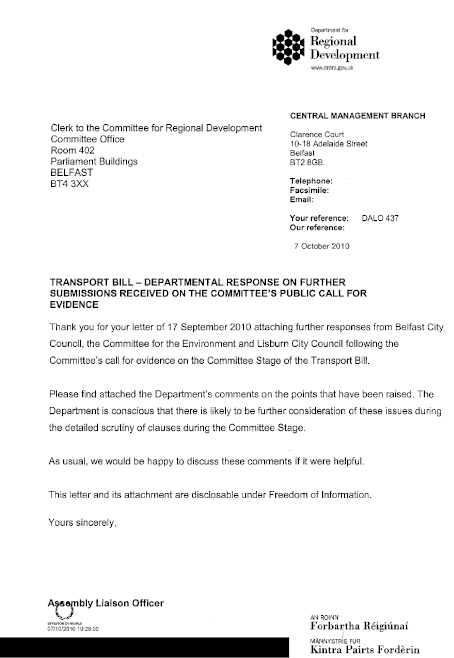
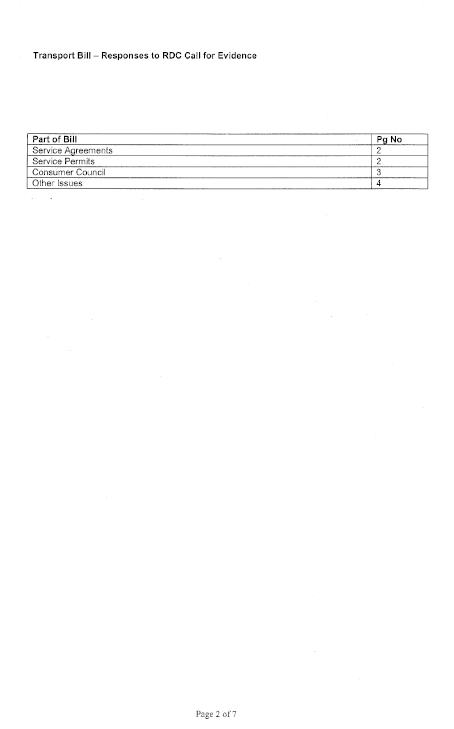
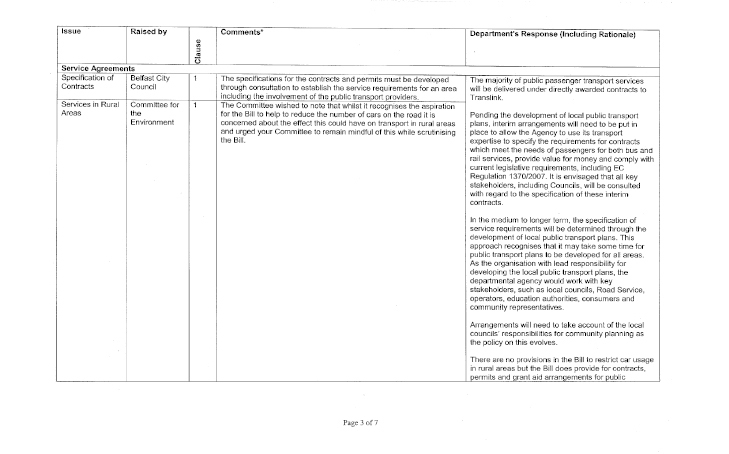
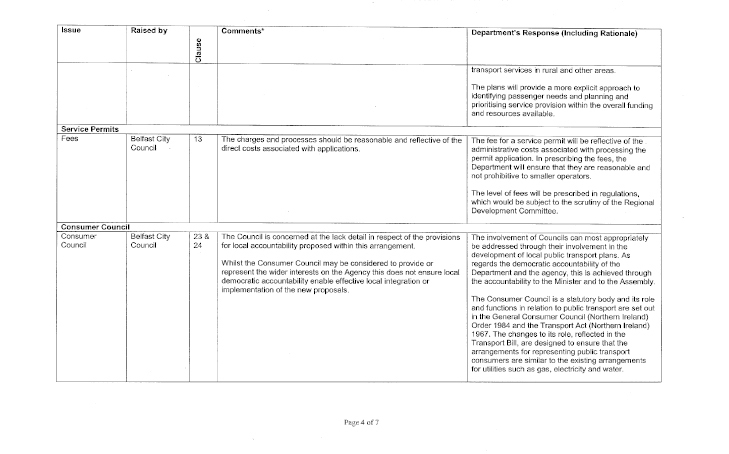
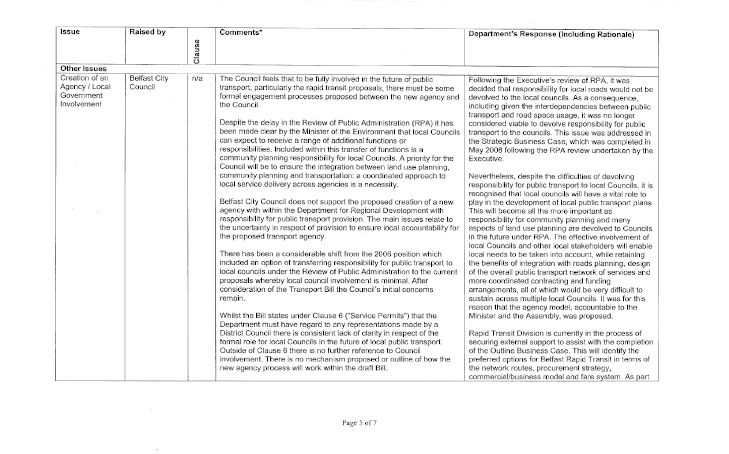
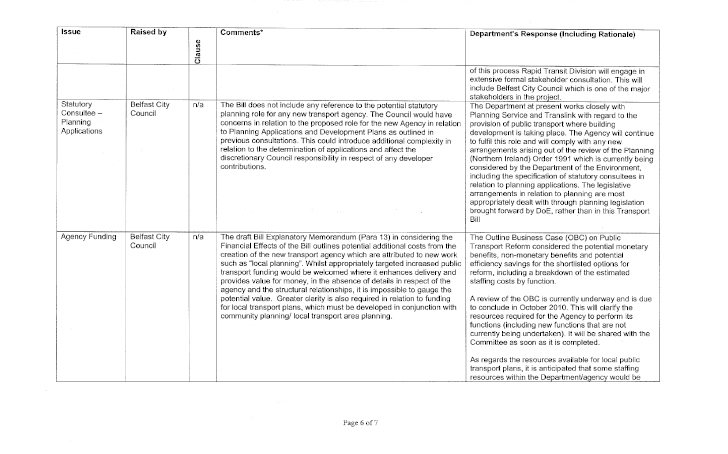
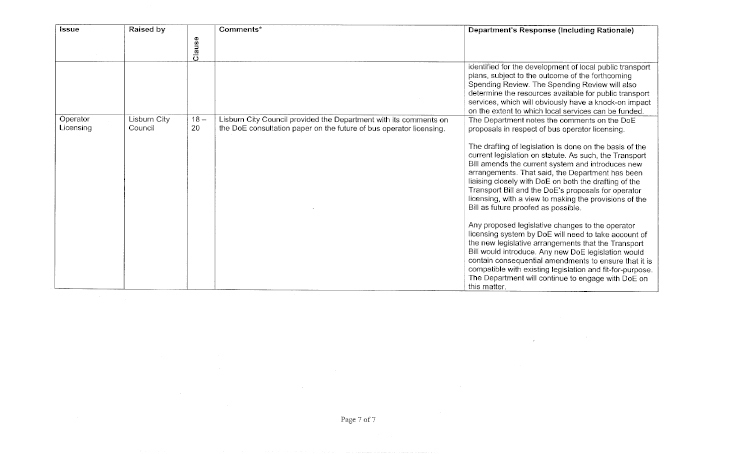
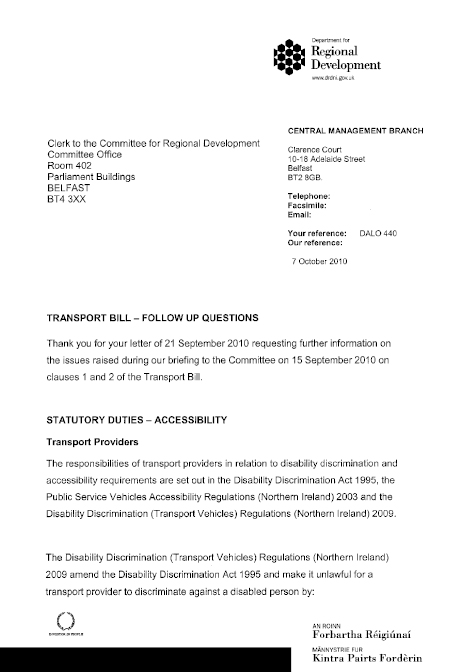
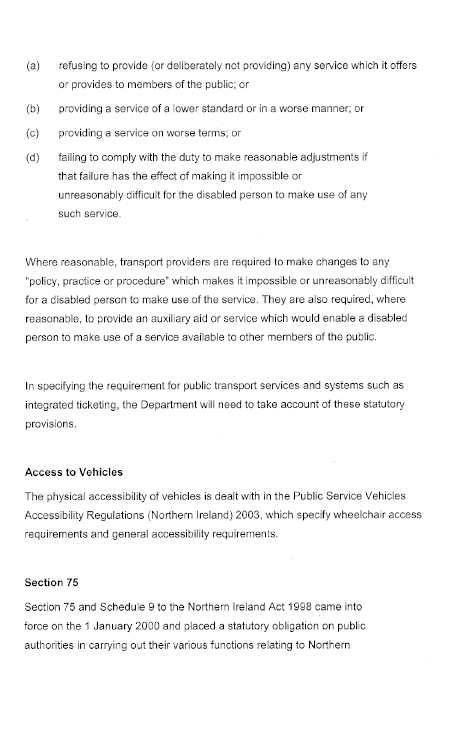
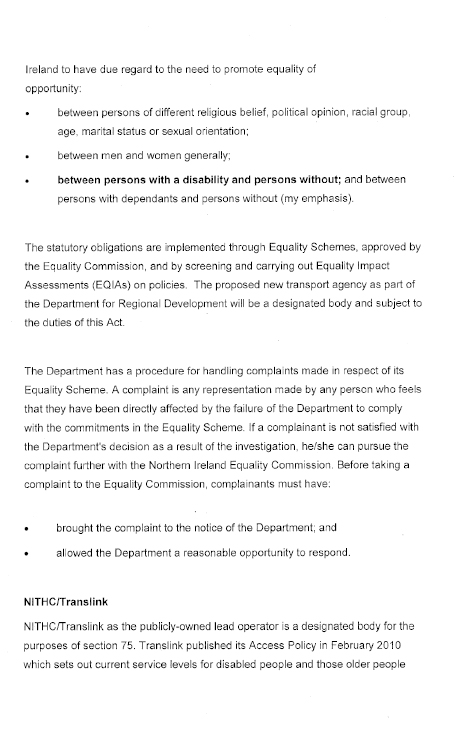
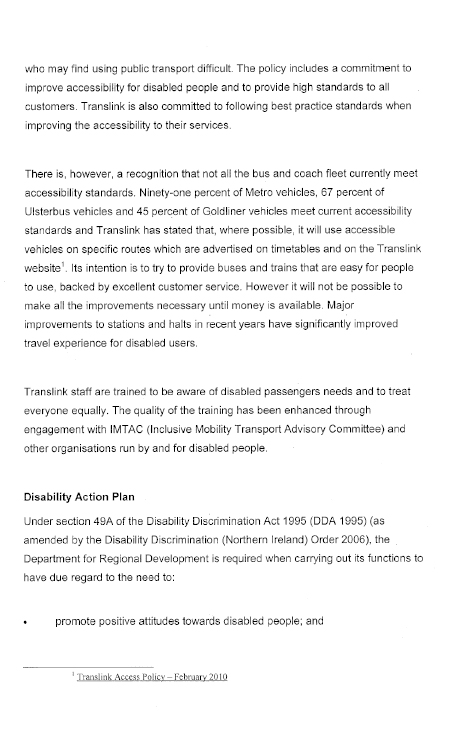
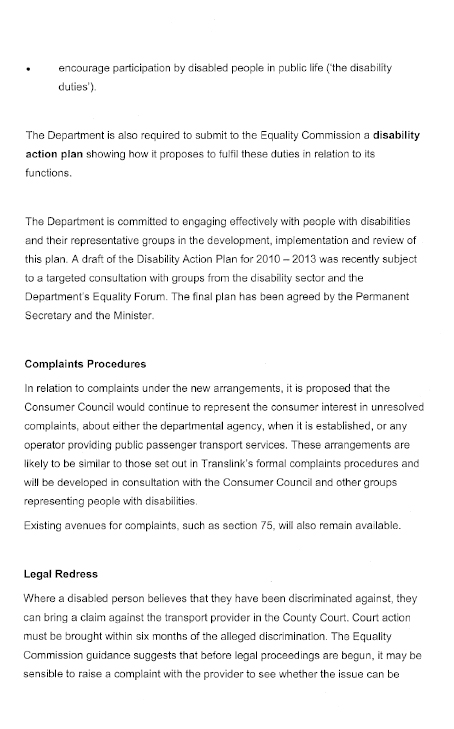
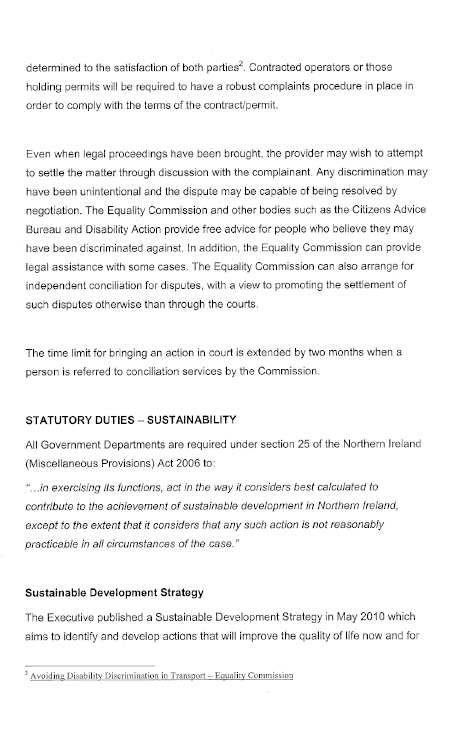
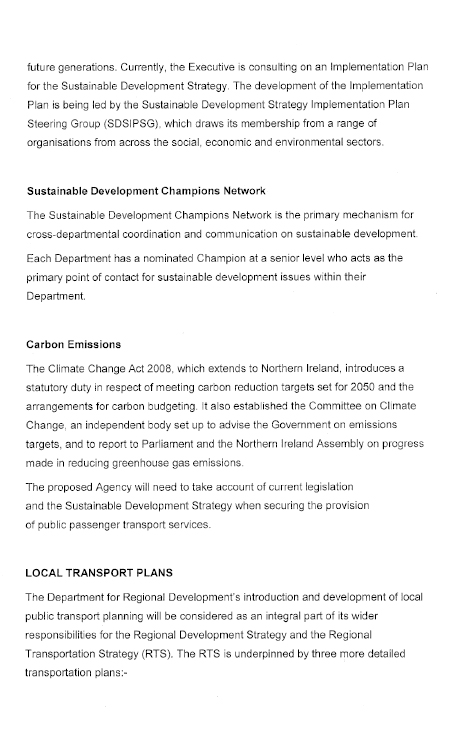
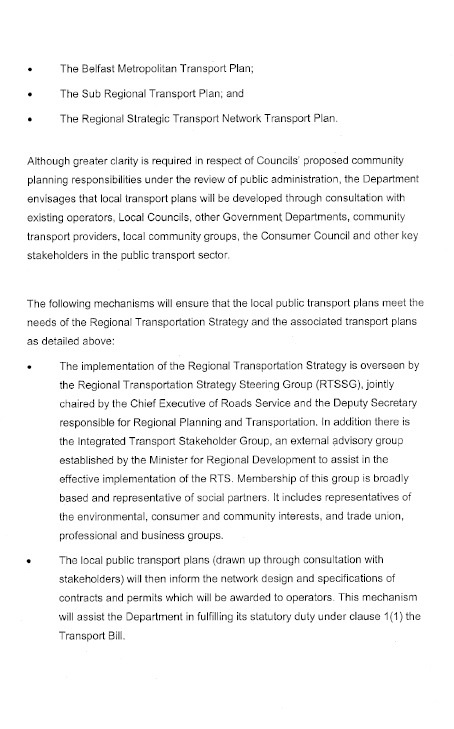
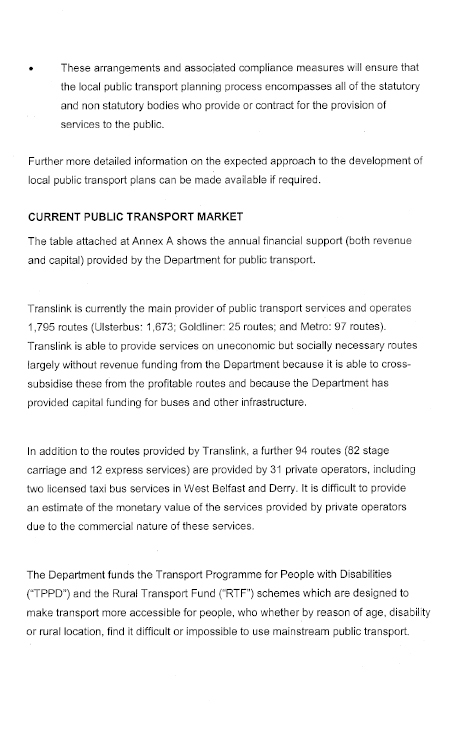
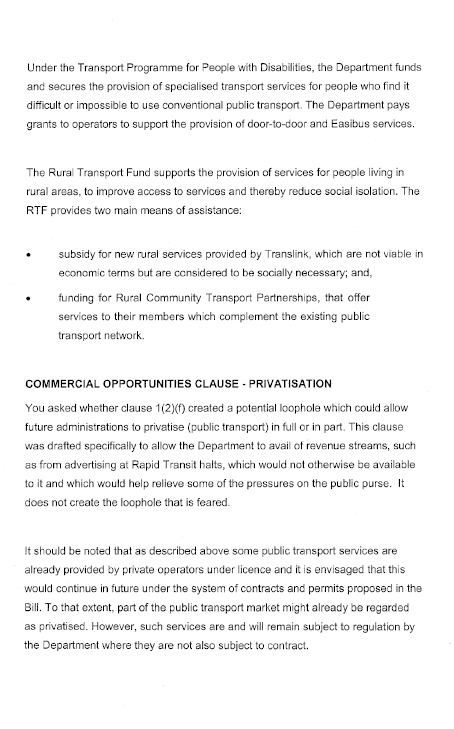
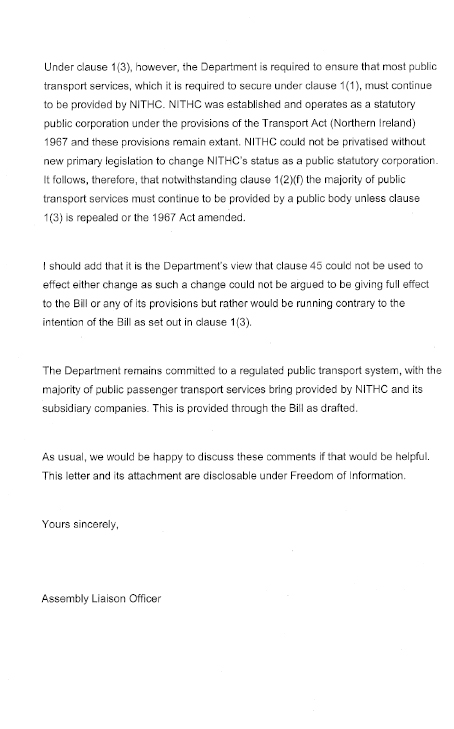
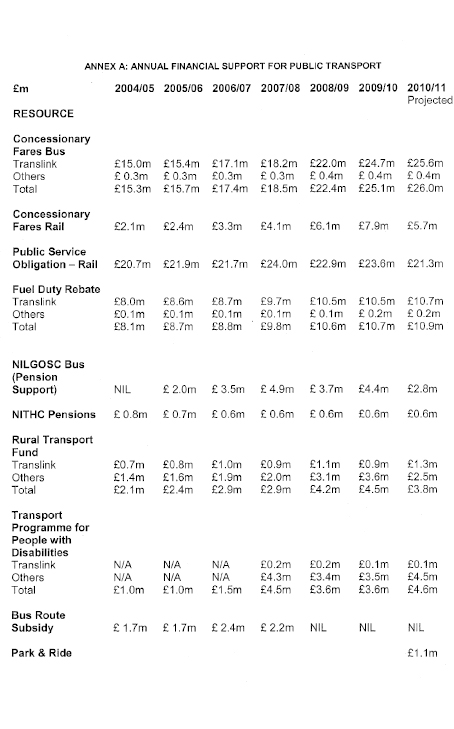
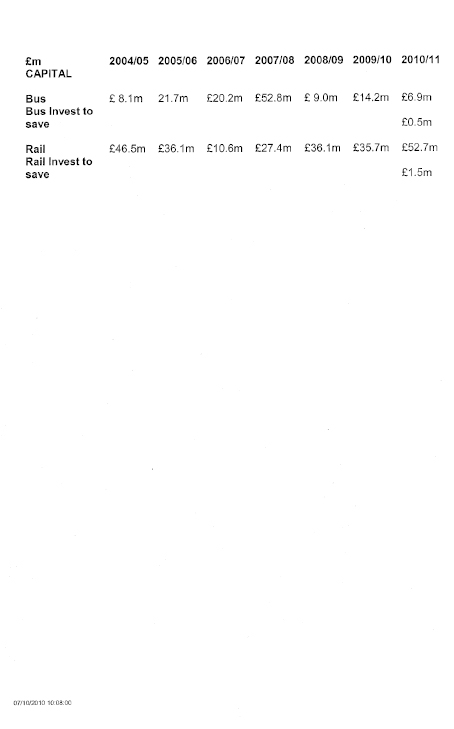
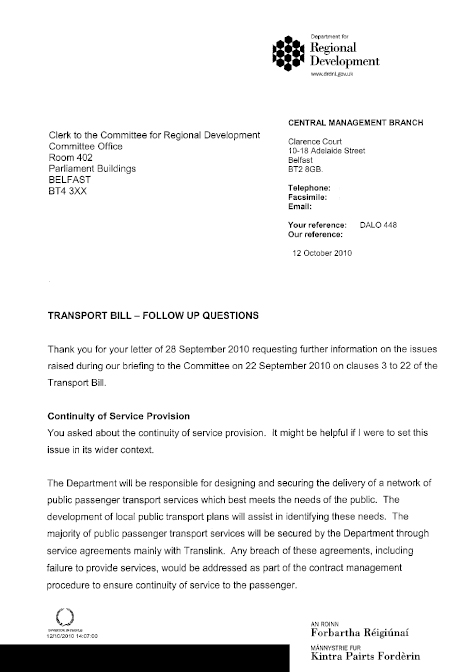
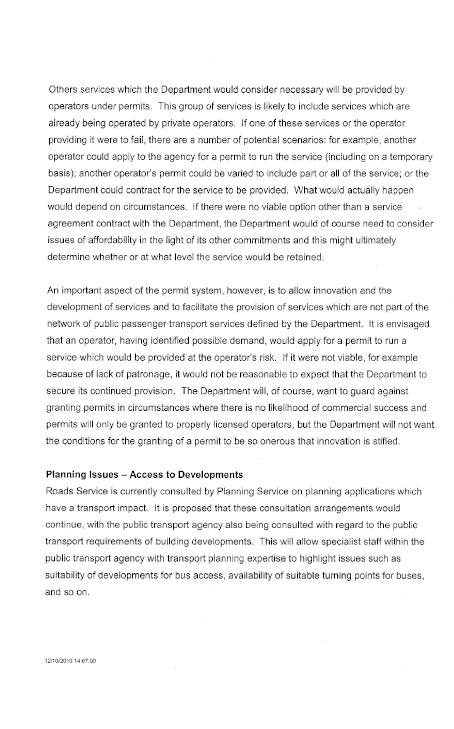
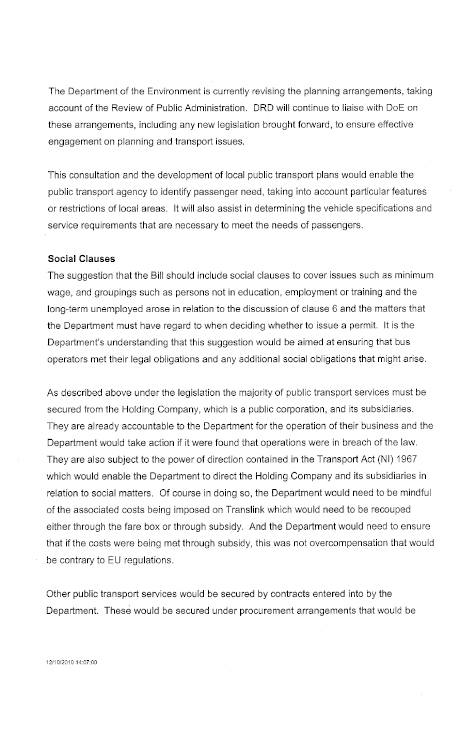
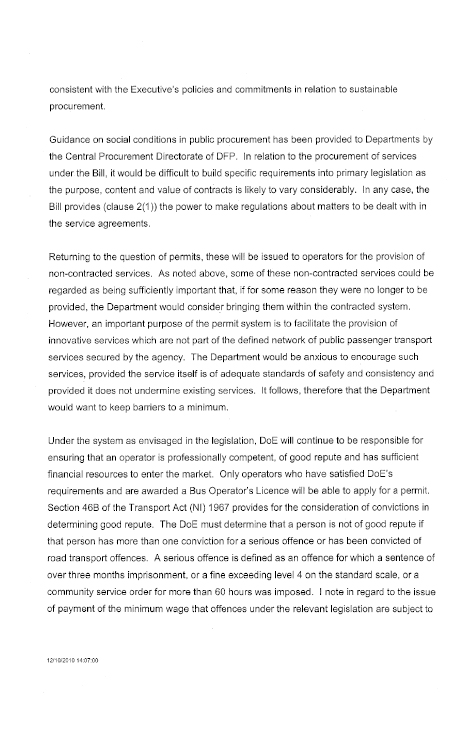
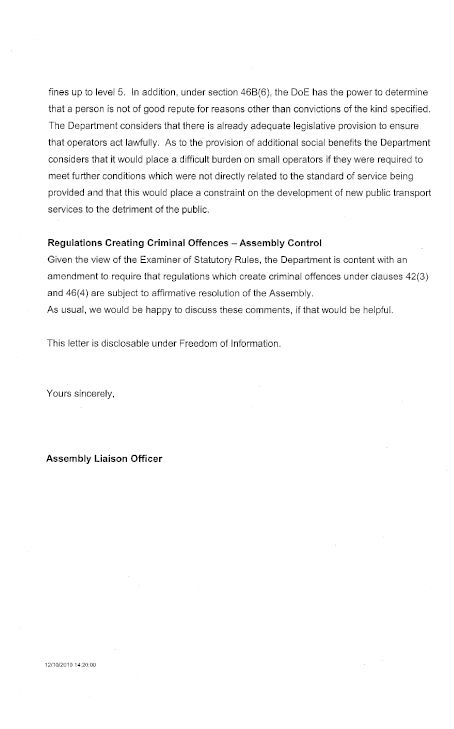
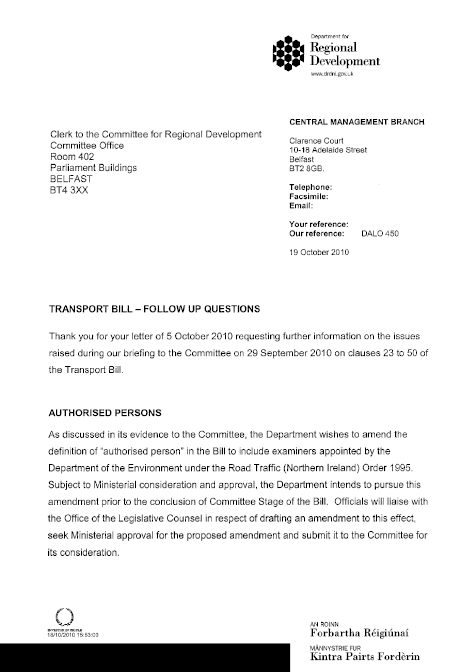
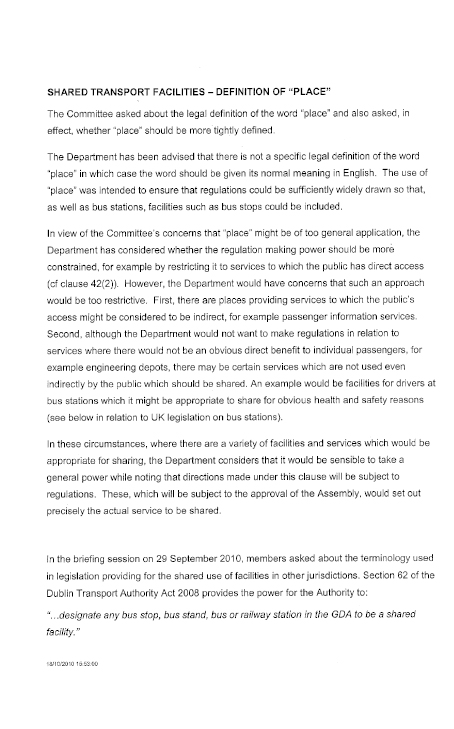
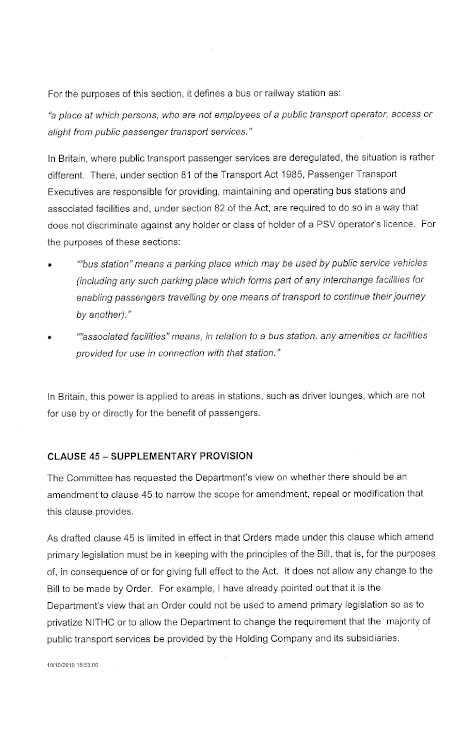
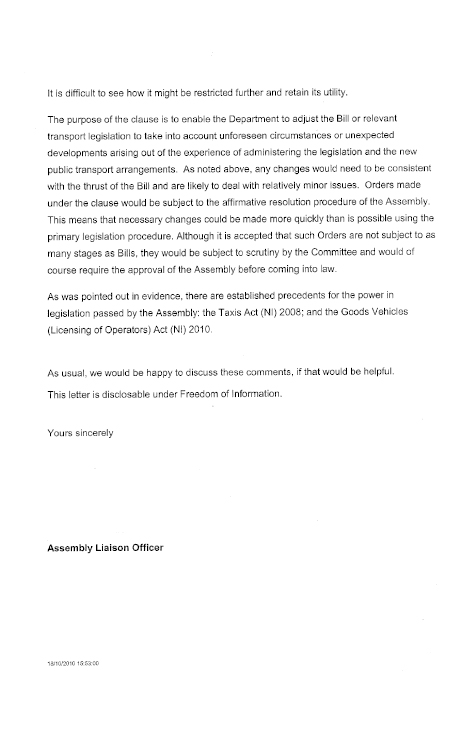
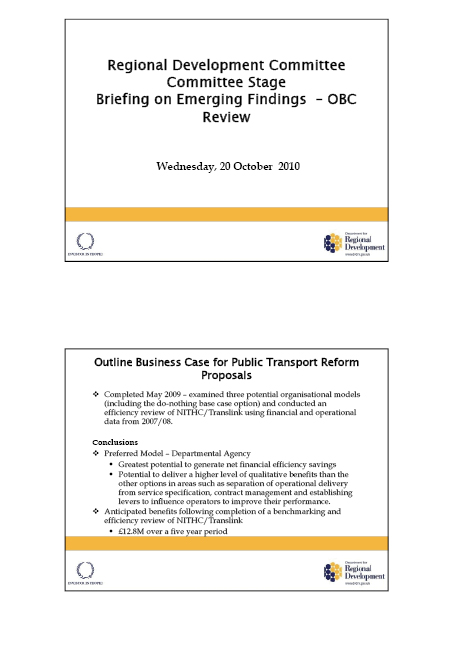
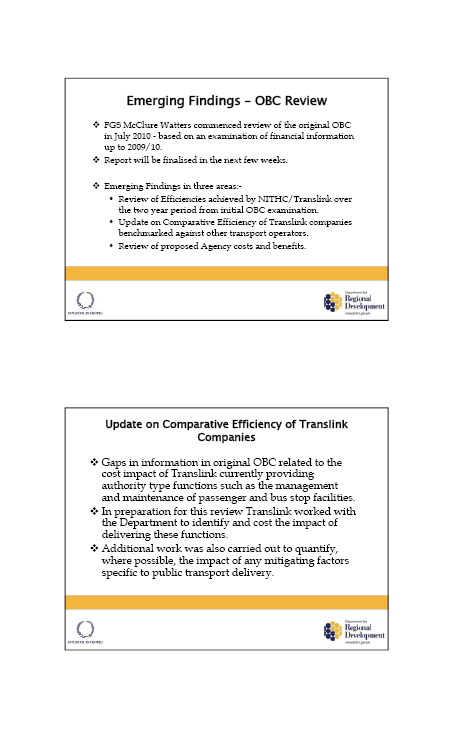
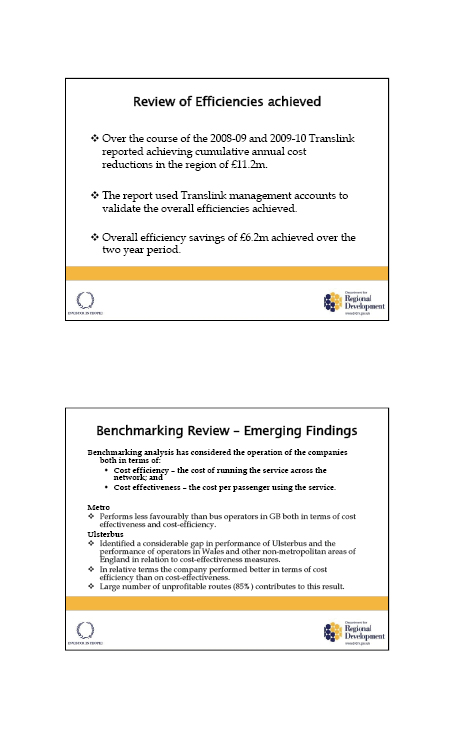
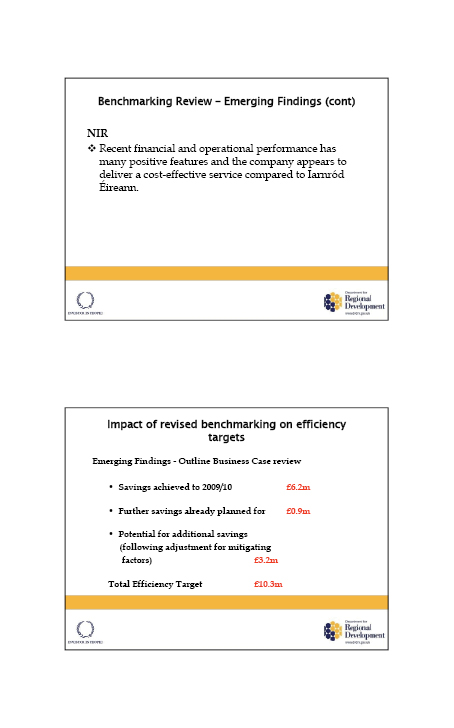
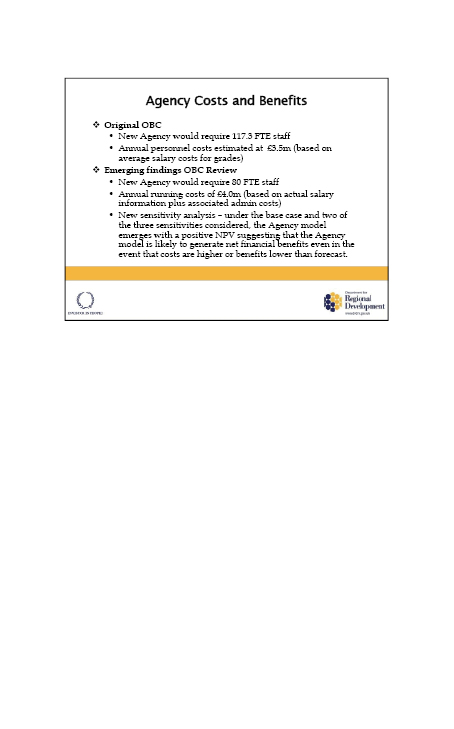
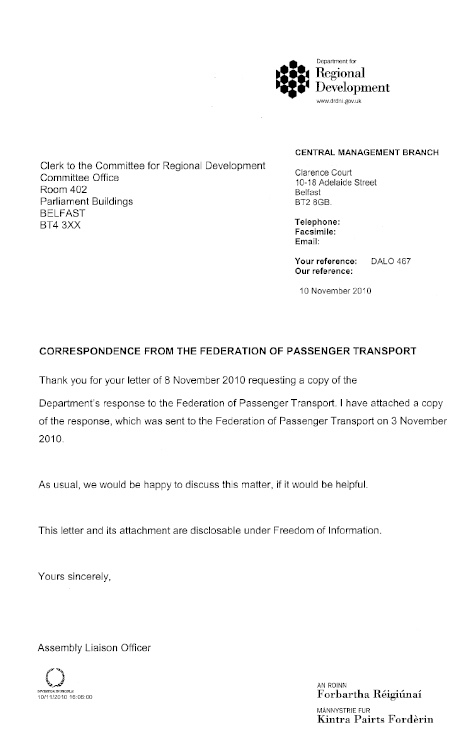
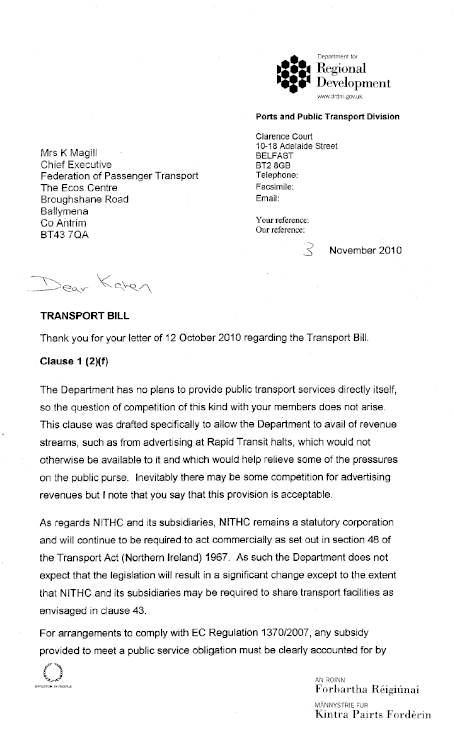
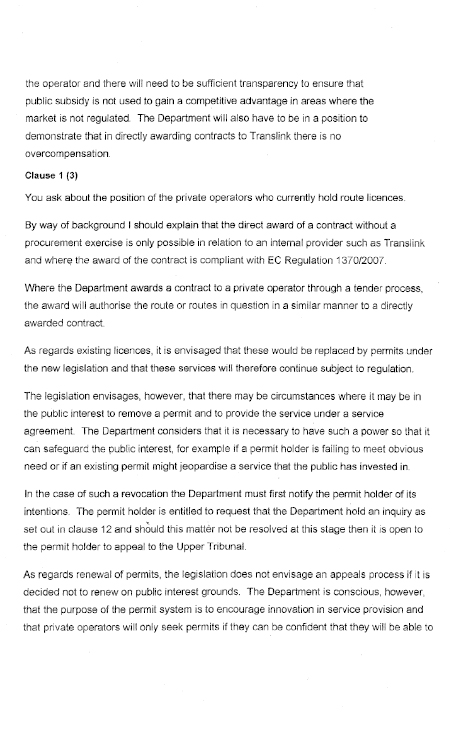
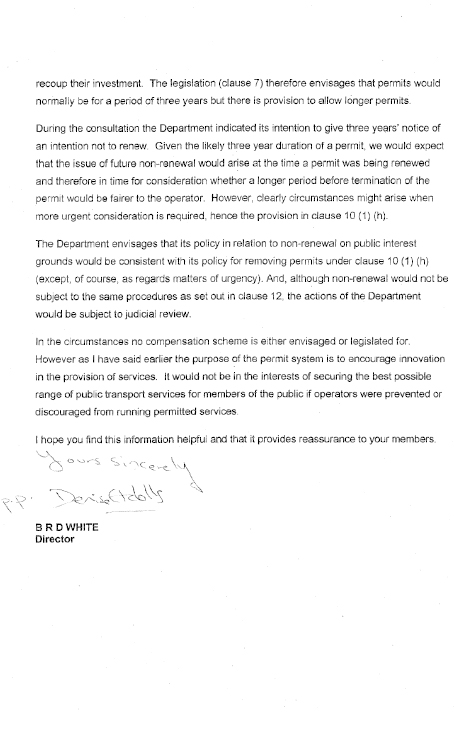
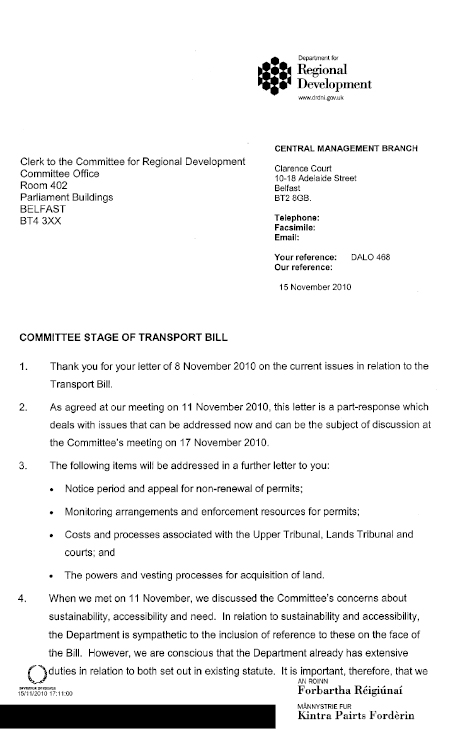
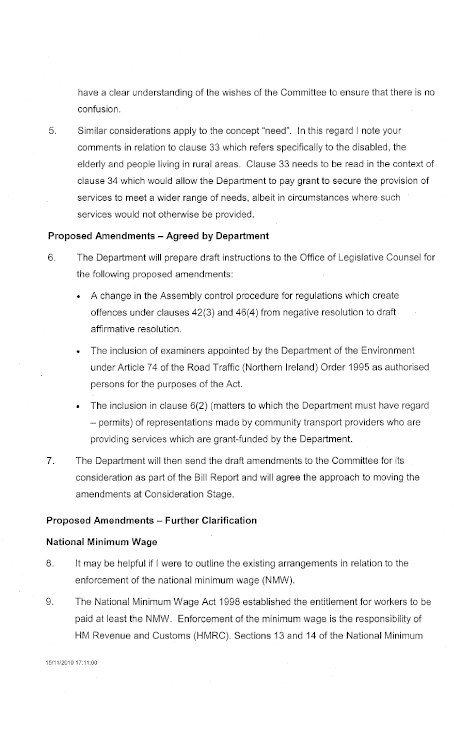
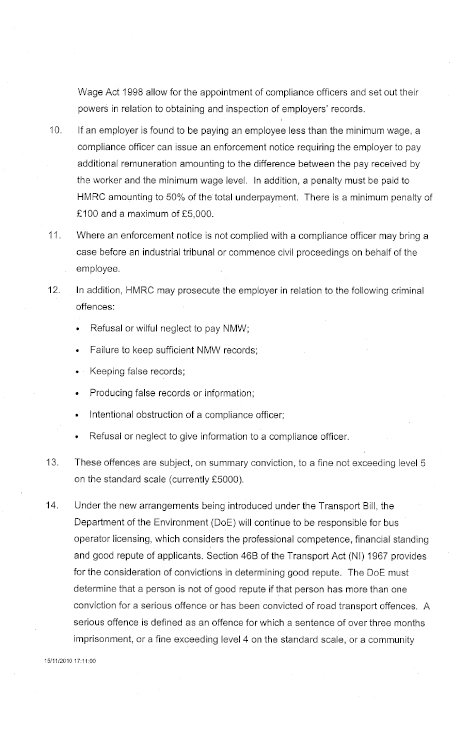
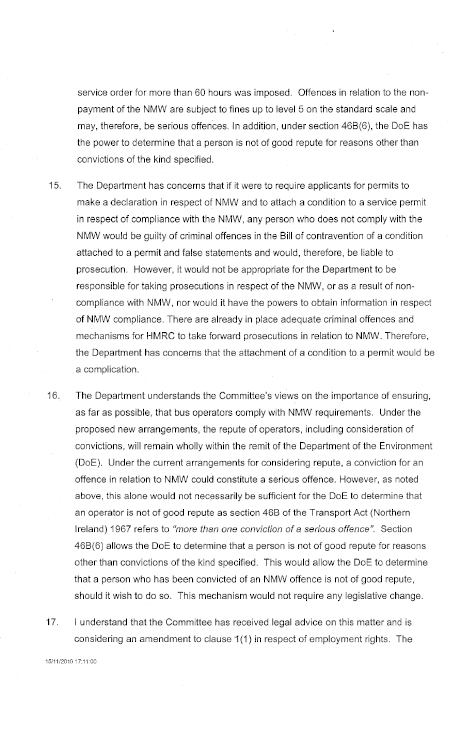
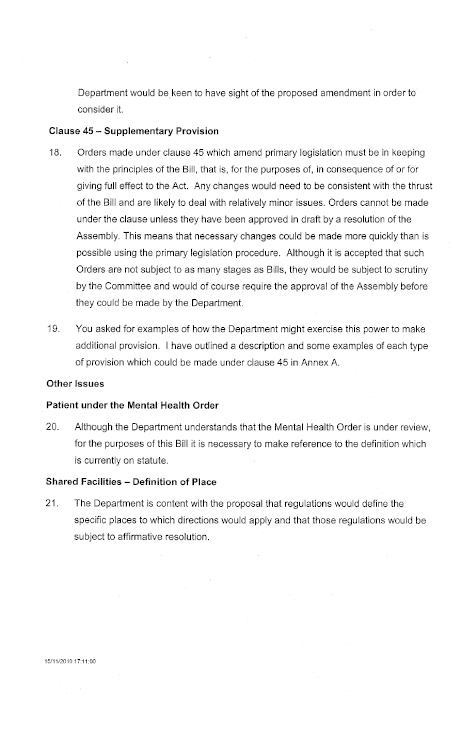
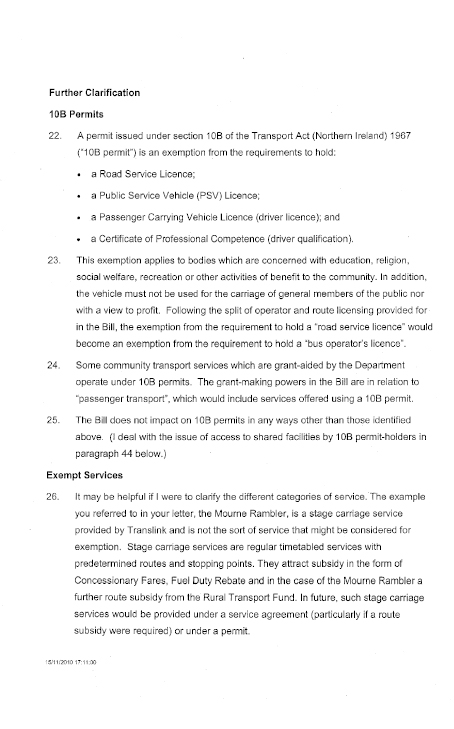
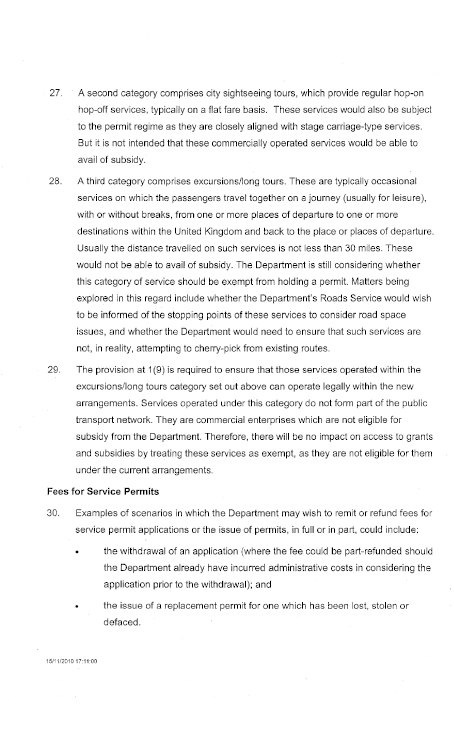
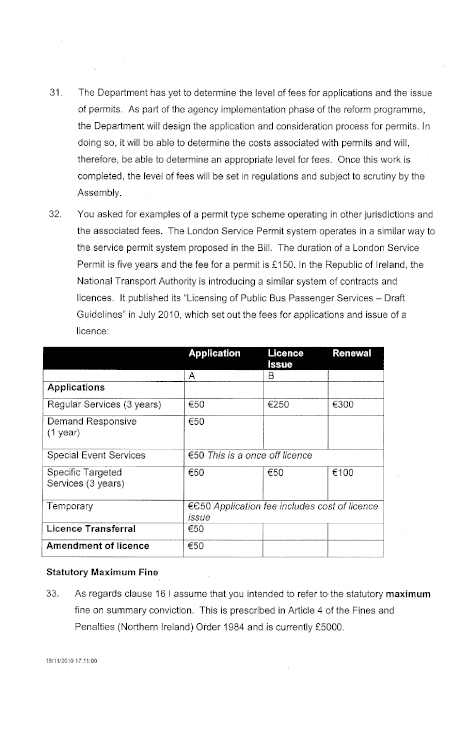
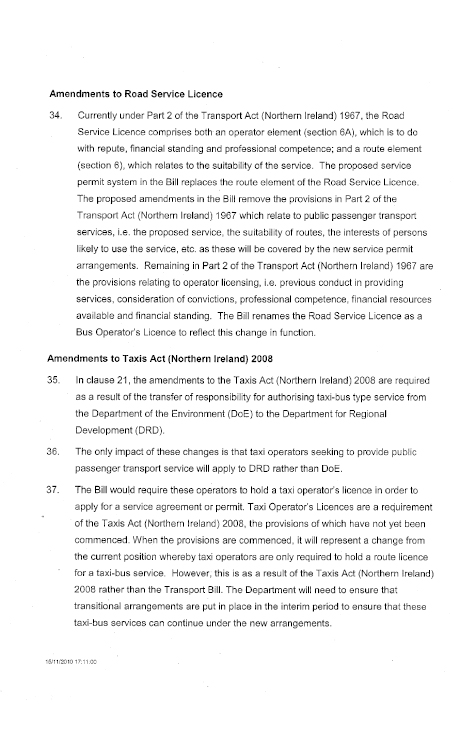
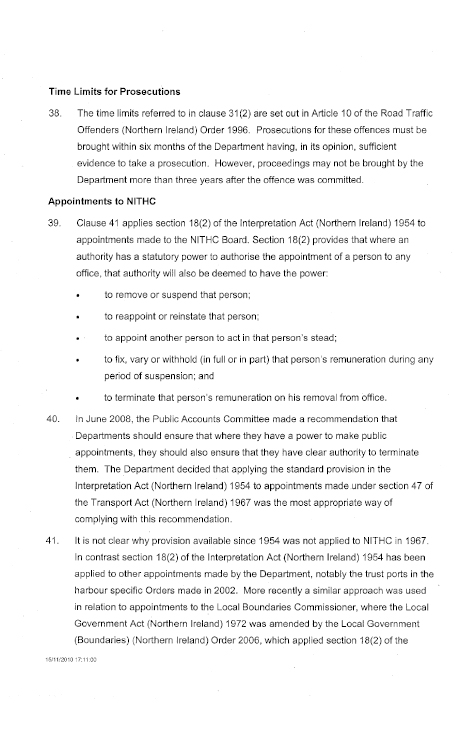
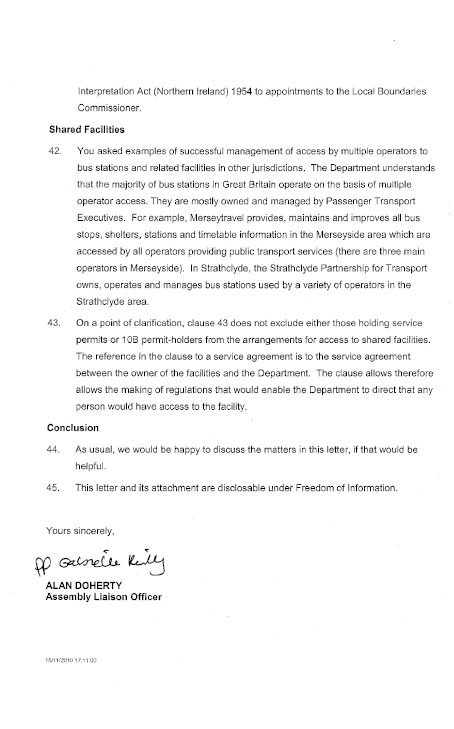
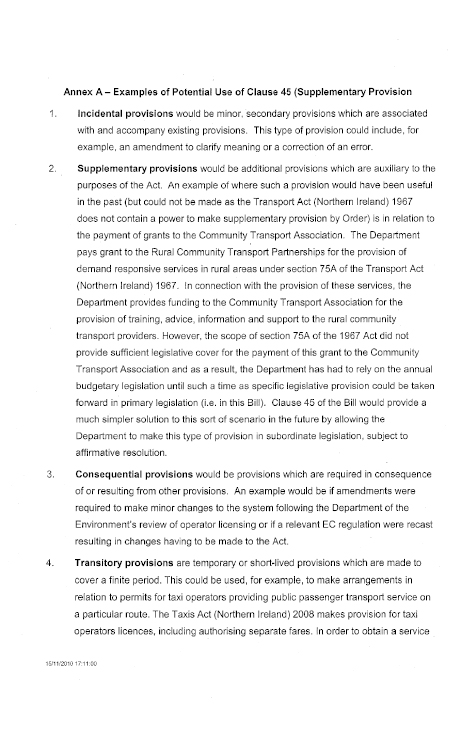
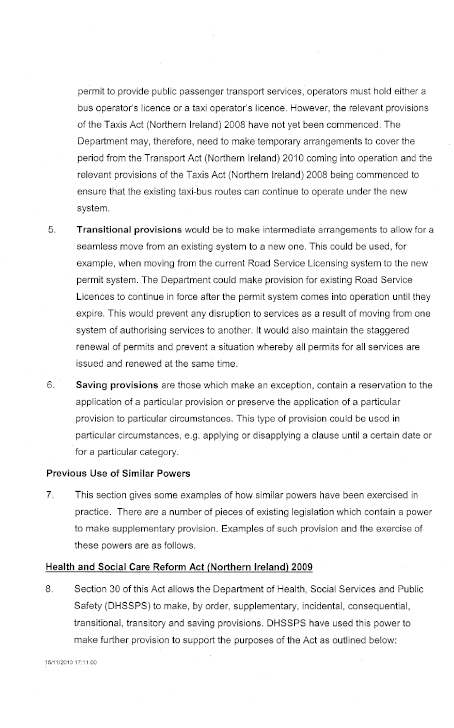
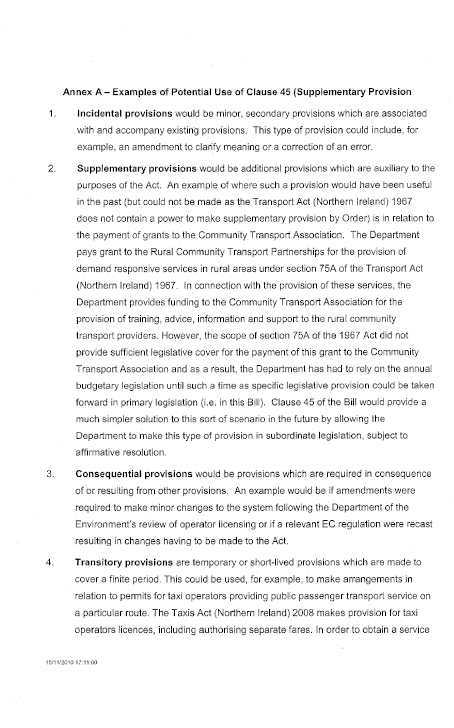
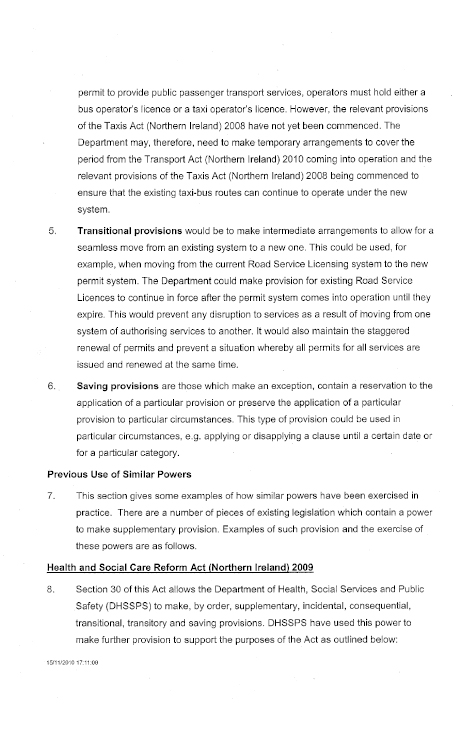
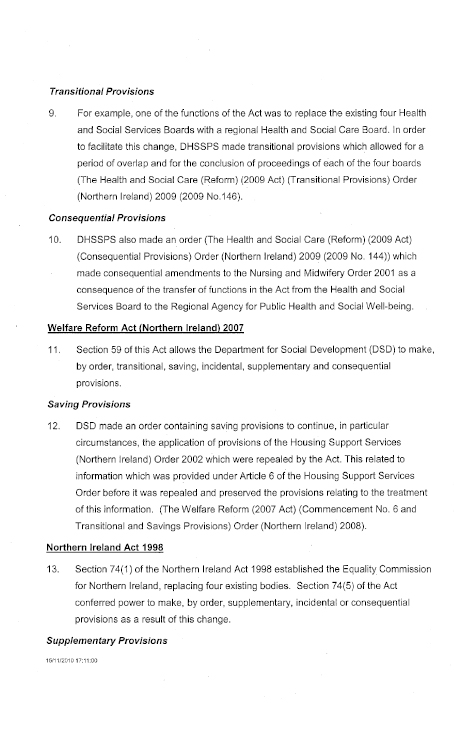
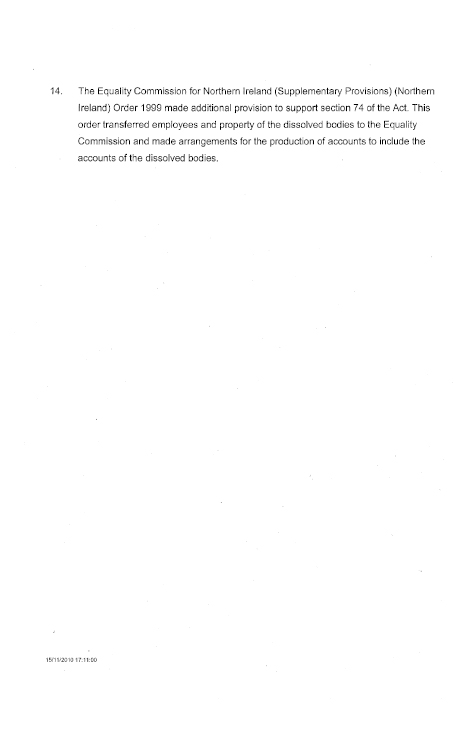
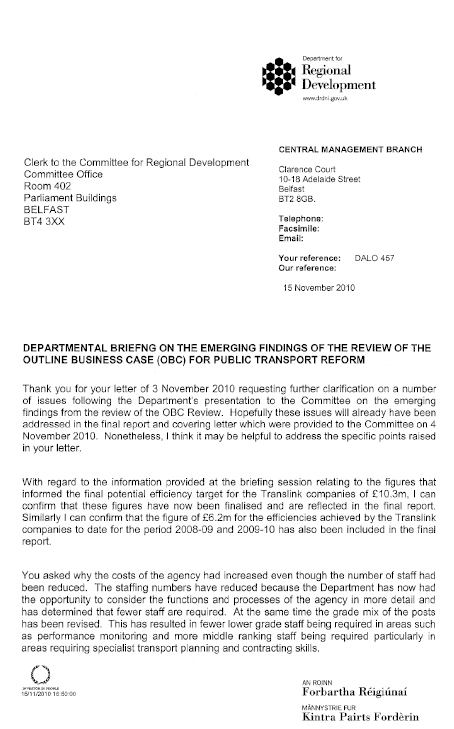
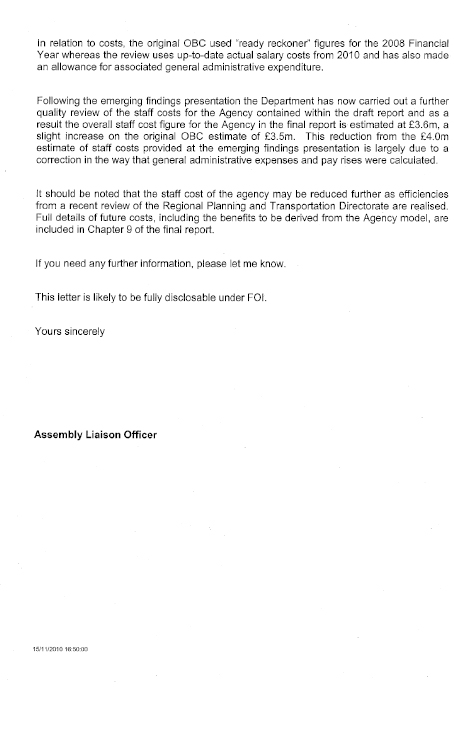
_20101122_-_Committ_fmt.jpeg)
_20101122_-_Commit_fmt1.jpeg)
_20101122_-_Commit_fmt2.jpeg)
_20101122_-_Commit_fmt3.jpeg)
_20101122_-_Commit_fmt4.jpeg)
_20101122_-_Commit_fmt5.jpeg)
_20101122_-_Committ_fmt.jpeg)
_20101122_-_Commit_fmt1.jpeg)
_20101122_-_Quierie_fmt.jpeg)
_20101122_-_Quieri_fmt1.jpeg)
_20101122_-_Quieri_fmt2.jpeg)
_20101130_-_Committ_fmt.jpeg)
_20101130_-_Commit_fmt1.jpeg)
Clause 6, Page 4, Line 11
Leave out 'public passenger transport'.
Clause 6, Page 4, Line 17
At end insert -
'(3) In subsection (2)(b)(i) "services" means -
(a) public passenger transport services; or
(b) any other services to which section [j ] 33(1)(a) applies.'
Clause 10, Page 5, Line 42
At end insert -
"( ) that the permit-holder has been convicted of an offence under the National Minimum Wage Act 1998 (c. 39);".
Clause 12, Page 7, Line 26
At end insert-
'(1ZA) This subsection applies where-
(a) an application is made for a new permit in respect of a service for which there is an existing permit;
(b) the applicant is the holder of the existing permit; and
(c) the Department considers that it is in the public interest for that service to be provided under a service agreement.
(1ZB) Where subsection (1ZA) applies, the Department shall not refuse the application without first giving the applicant notice that it is considering refusing the application for the reason mentioned in paragraph (c) of that subsection and holding an inquiry if the applicant requests the Department to do so.'
Clause 46, Page 20, Line 24
For 'Regulations' substitute 'No regulations to which this subsection applies shall be made unless a draft of the regulations has been laid before, and approved by resolution of, the Assembly.
(3A) Subsection (3) applies to regulations under this Act if they include -
(a) regulations under section [j ] 42(3) or [j ]43(2); or
(b) regulations under this section which make the declaration mentioned in subsection (4).
(3B) Any other regulations'.
Clause 47, Page 20, Line 37
After "means" insert "¬-
(a)".
Clause 47, Page 20, Line 38
At end insert "or
(b) an examiner appointed by the Department of the Environment under Article 74 of the 1995 Order;".
_20101206_-_Outstan_fmt.jpeg)
_20101206_-_Outsta_fmt1.jpeg)
_20101206_-_Outsta_fmt2.jpeg)
_20101206_-_Outsta_fmt3.jpeg)
Clause 1, Page 1, Line 6
After 'to' insert 'accessibility,'.
Clause 1, Page 1, Line 6
Leave out 'and'.
Clause 1, Page 1, Line 6
At end add 'and sustainability'.
Clause 1, Page 1, Line 6
After 'to' insert 'accessibility,'.
Clause 1, Page 1, Line 6
Leave out 'and'.
Clause 1, Page 1, Line 6
At end add 'and sustainability'.
Clause 6, Page 4, Line 11
Leave out 'public passenger transport'.
Clause 6, Page 4, Line 17
At end insert -
'(3) In subsection (2)(b)(i) "services" means -
(a) public passenger transport services; or
(b) any other services to which section 33(1)(a) applies.'
Clause 10, Page 5, Line 42
At end insert -
"( ) that the permit-holder has been convicted of an offence under the National Minimum Wage Act 1998 (c. 39);".
Clause 12, Page 7, Line 26
At end insert-
'(1ZA) This subsection applies where-
(a) an application is made for a new permit in respect of a service for which there is an existing permit;
(b) the applicant is the holder of the existing permit; and
(c) the Department considers that it is in the public interest for that service to be provided under a service agreement.
(1ZB) Where subsection (1ZA) applies, the Department shall not refuse the application without first giving the applicant notice that it is considering refusing the application for the reason mentioned in paragraph (c) of that subsection and holding an inquiry if the applicant requests the Department to do so.'
The Minister for Regional Development gives notice of his intention to oppose the question that Clause 45 stand part of the Bill.
Clause 46, Page 20, Line 24
For 'Regulations' substitute 'No regulations to which this subsection applies shall be made unless a draft of the regulations has been laid before, and approved by resolution of, the Assembly.
(3A) Subsection (3) applies to regulations under this Act if they include -
(a) regulations under section 42(3) or 43(2); or
(b) regulations under this section which make the declaration mentioned in subsection (4).
(3B) Any other regulations'.
Clause 47, Page 20, Line 37
After "means" insert "¬-
(a)".
Clause 47, Page 20, Line 38
At end insert "or
(b) an examiner appointed by the Department of the Environment under Article 74 of the 1995 Order;".
Appendix 5
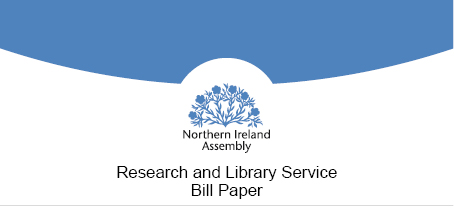
27th August 2010
Transport Bill,
8 September 2010
This paper provides background to the key issues in public transport reform which have led to the drafting of the Transport Bill. This Bill issues powers in relation to the awarding of service contracts for public transport services, grant making for infrastructure and vehicles and powers to ensure the security and safety of passengers. The powers conferred in this Bill are designed to allow the Department to create an efficient, effective and sustainable public transport service in support of the Executives transportation, environmental, social inclusion and equality objectives, while supporting the development of the wider economy.
NIAR 362-10 27 August 2010
The transport Bill provides the statutory arrangements for bringing forward the reform of public transport which has been in development since 2002
The aim of public transport reform is to create an efficient, effective and sustainable public transport service that contributes to the Executive's transportation, environmental, social inclusion and equality objectives, while supporting the development of the wider economy
The Bill introduces a duty on the Department of regional Development to secure the provision of public transport services
As part of public transport reform the formation of an Executive Agency within the Department of Regional Development has been recommended to deliver public transport, combining the roles of the Northern Ireland Transport holding Company (NITHC), Translink, the Department of Regional Development (DRD) and the Department of the Environment (DoE).
The new departmental agency will initiate the process of developing local transport plans in line with community development policy
This policy comes from the Review of Public Administration and draws on Experiences from England, Wales and Scotland where community planning has been a statutory requirement of local authority's sine 2000 and 2003 respectively.
In compliance with regulation (EC) 1370/2007 the Bill enables the continued regulation of public transport in Northern Ireland while opening the market to controlled competition with new contracting and permit issuing powers
These new contracting powers will allow the DRD to take forward the Executive's objective of introducing a rapid transit service in Belfast, which will be competitively tendered.
The Bill amends powers to award grants for vehicles and infrastructure to accommodate new competition arrangements i.e. it allows grants to be awarded to operators other than Translink in recognition that Translink may not be the only provider.
The Bill extends the legislation allowing additional funding for services designed for disabled people to include other vulnerable people such as the elderly and those living in rural areas.
The Bill gives the Department statutory powers to fund community transport
The Bill gives the Department powers to make regulations in respect of conduct in bus stations while it introduces the power to allow other specified providers to use bus stop/centre facilities, once reserved for Translink vehicles only.
Since 2002 there has been an acknowledgement that the public transport system in Northern Ireland required reform in order to bring it up-to-date and make it a more attractive proposition for prospective passengers.
On November 6th 2009 the Minister for Regional Development (the Minister) launched a public consultation on proposals for Public Transport Reform (PTR) which emphasised the need to increase public transport use, in line with the 'Executive's transportation, environmental, social inclusion and equality objectives'[1]
A key proposal within PTR is to restructure the way in which public transport is delivered incorporating the roles of the Northern Ireland Transport Holding Company, Translink, the Department for Regional Development and the Department of the Environment into one Departmental Agency (Executive Agency).
Although Executive Agency's are sometimes mistakenly categorised as Arm's Length Bodies similar to Non Departmental Government Bodies (NDPB),[2] they are distinct in that they operate within Government; this Agency will be part of the Department for Regional Development and as such will be the responsibility of the Minister.
The Department has emphasised the need for an independent body such as this Executive Agency so the reformed public transport system will operate as a cohesive unit which will be necessary if the proposal to utilise local transport plans goes ahead.
The executive agency will have the responsibility of engaging all transport stakeholders into the overall system of Community planning, this is defined as:
"…the process through which public sector organisations work together and with local communities, the business and voluntary sectors, to identify and solve local problems, improve services and share resources".[3]
There has been a statutory requirement to use the community planning process to develop local plans and strategies in England and Wales since 2000 and in Scotland since 2003.
The relative success of this process is unclear i.e. if by success we mean has the process worked and successfully engaged with people? Then yes, it has worked. However, if success is based on hard outcomes, such as efficiency savings, then no, it hasn't worked.
According to the Department for Regional Development (the Department) the main purpose of the Transport Bill is to "create an effective, efficient and sustainable public transport system that contributes to the Executives transportation, environmental, social inclusion and equality objectives", effectively modernising the public transport system in Northern Ireland so that it is both fit for purpose and available to all those who wish to use it.
There are 50 clauses in the Transport Bill and 2 schedules. The Bill is divided into six parts.
A key driver of the Bill is the need to comply with European Regulation (EC) 1370/2007. This regulation introduces standard Europe-wide rules on the procurement and funding of contracts for passenger transport services and is designed to increase the provision, safety and quality of public transport through stimulating competition;
In compliance with the new European Regulation, the Bill is designed to accommodate the continued regulation of public transports services in Northern Ireland allowing for the awarding of service contracts to both Translink and any other provider. This bill also gives the Department the power to issue permits for additional bus services introducing the opportunity for innovation, entrepreneurship and innovation in public transport however it does give the Department the power to regulate fares which could potentially stifle this.
The Bill amends the statutory powers of the Consumer Council and requires it to publish a forward work programme in respect of its public transport duties
The Bill will allow grants to be paid to any eligible person for the purchase of vehicles and for the improvement/development of facilities for the provision of public passenger transport services. The previous legislation only allowed grants to be paid to the NITHC however as this Bill aims to increase competition it is necessary for this power to be expanded to include all potential providers who will either hold service agreements or permits.
In terms of the Rapid Transit tender, this clause provides the department with the power to proceed with the purchase of vehicles and construction of necessary infrastructure prior to awarding the contract for the management of the service.
The Bill gives the Department powers to make grants to community transport providers rather than having to allocate funding from annual budgets. This reduces uncertainties around funding which have restricted the sector for some time.
1 Context and Background to the Bill
1.1 Public Transport Reform
1.2 Public Transport Agency
1.3 Local Transport Plans and Community Planning
1.3.1 Community Planning in Scotland
1.3.2 Community Planning Partnerships (CPP)
1.3.3 CPP and transport
1.3.4 Local Transport Strategies
2.0 The Transport Bill
2.1 Regulation (EC) 1370/2007
2.1.1 Key points
2.2 Purpose of the Bill
2.3 Structure of the Bill
2.4 Public Passenger Transport Services
2.4.1 Regulated fares
2.5 Buses, Taxis and trains
2.6 Consumer Council
2.7 Enforcement
2.8 Grants
2.8.1 Capital expenditure
2.8.2 Provision of Community Transport
Annex 1: Table detailing and comparing the key characteristics of a Non Departmental Public Body (NDPB) and an Executive Agency
Northern Ireland is characterised by a disproportionate reliance on the private motor car which accounts for over 80 per cent of all journeys made, compared to public transports share of only 7 per pent.[4] On November 6th 2009 the Minister for Regional Development (the Minister) launched a public consultation on proposals for Public Transport Reform (PTR) which emphasised the need to increase public transport use, in line with the 'Executive's transportation, environmental, social inclusion and equality objectives'[5], changing it from the 'last resort' to a 'first choice'[6] for people in Northern Ireland.
The overall aims of the Public Transport Reform proposals are to deliver a public transport system that:
A key proposal within PTR is to restructure the way in which public transport is delivered. Currently the Northern Ireland Transport Holding Company, which is a publicly owned corporation,[9] oversees all rail services and the majority of all bus services in Northern Ireland. These are operated by three subsidiary companies; Metro, Ulsterbus and NI Railways under the collective brand name of Translink (see figure 1).
This proposal to reform the institutional arrangements for the delivery of public transport is the culmination of a process which has been ongoing since 2002[10] [11] when
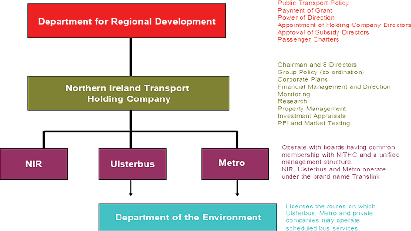
Source: Ports and Public Transport Division 200710
DRD launched a consultation 'A New Start for Public Transport in Northern Ireland'. This document, advocated the benefits of a more liberalised public transport market[12] with increased participation of the private sector.
Following consideration of an interim report in October 2004, further work with key stakeholders (Translink/NITHC, the Confederation of Passenger Transport (CPT) and the Consumer Council) led to the conclusion that future public transport needs in Northern Ireland would best be met by a three-tier structure with consumer representation at each level.[13] The three tiers envisaged were a Government tier responsible for policy, legislation and regulation; a middle tier for specifying service requirements and securing their provision; and a third tier of transport operators responsible for service delivery (see figure 2).
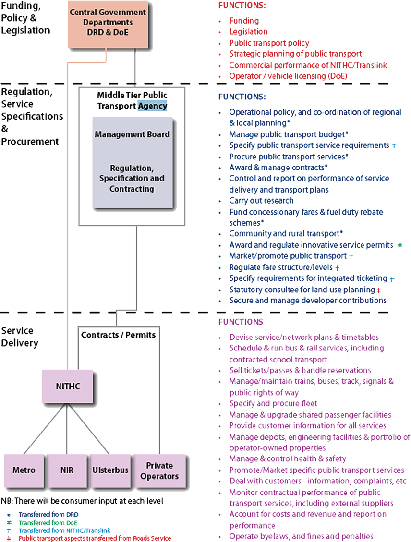
Source: DRD (2009)[14]
Fundamental to the proposed restructuring of public transport is the establishment of a Public Transport Agency.[15] This Executive Agency will operate within the Department for Regional Development taking control of the functions currently undertaken by the NITHC and its subsidiaries while also incorporating the various regulatory powers for public transport currently held by DRD and the Department of the Environment (DOE).[16]
According to the Cabinet Office Agencies and Public Bodies team, an Executive Agency can be considered in a variety of circumstances but commonly its creation will be most suitable when:[17]
Although Executive Agency's are sometimes mistakenly categorised as Arm's Length Bodies similar to Non Departmental Government Bodies (NDPB),[18] they are distinct in that they operate within Government; this Agency will be part of the Department for Regional Development and as such will be the responsibility of the Minister.
According to the Outline Business Case for Public Transport Reform[19] the proposed formation of an Executive Agency to oversee and manage public transport in Northern Ireland will bring benefits such as efficiency and improved service, a point that is echoed in the DRD's detailed policy proposals, which states:
"a single client body with expertise in the specification of integrated transport services and facilities, and in procurement and contract management is necessary in order to achieve and sustain the best possible value for money over the long term".[20]
According to the consultation report, the majority of respondents were supportive of the creation of a 'Departmental Public Transport Agency', although six[21] of the responses were not, citing reasons such as increased bureaucracy or, the perceived lack of input from local elected representatives.[22] In response to this the DRD stated the Agency Model was chosen based on consideration of a number of options and it was
"…concluded that the agency option provided greater independence and offered the prospect of a more efficient system overall." [23]
The Department emphasised the need for an independent body as an important factor in bringing together all the various stakeholders involved with public transport into a cohesive unit, in order to provide the best possible service; this would not be achievable through the existing NITHC model.
The importance of working together comes from the proposed introduction of Local Transport Plans which will be developed using the community planning process:
"As the organisation with lead responsibility for planning public transport, the departmental agency will be required to work with other organisations, such as Road Service, operators, local councils, education authorities and local consumer and community representatives to devise and agree local transport plans. In preparing such local plans, account will need to be taken of local councils' proposed new role in relation to community planning under the Review of Public Administration".[24]
Community Planning was a central theme in the options put forward in the Review of Public Administration (RPA). Community Planning aims to produce citizen-centred outcomes through joined up thinking and engagement between individual citizens, groups, local government and statutory service providers. Community planning is defined as:
"…the process through which public sector organisations work together and with local communities, the business and voluntary sectors, to identify and solve local problems, improve services and share resources".[25]
Under the proposals of the RPA, there will be a duty on local councils and other public service providers to engage in the community planning process[26] in order to create a community plan; the local community would also have the right to be consulted on the plan.
Already in England and Wales under the Local Government Act 2000 and in Scotland under the Local Government Scotland Act (2003) there is duty for local authorities to produce a local community plan (Scotland) or strategy (England and Wales) which is based on the community planning process.
The model for community planning recommended for Northern Ireland is based on the Scottish model.[27] This paper will now examine the components, application and effectiveness of this model.
Although community planning is essentially a process rather than a prescription for policy[28], it was one of three core elements within the Local Government in Scotland Act and as such it became a statutory duty for local government. Scottish local authorities are required to initiate and facilitate community planning. The NHS boards, the enterprise networks, the police, the fire and rescue services, and Regional Transport Partnerships (RTPs) are required to participate.[29]
Community Planning Partnerships (CPP) are central to the community planning process; co-ordinating initiatives within their locality and acting as principal connection between national and local priorities and policies. CPP's are a statutory body within each of Scotland's 32 local authority areas and are a central feature of the reform of local governance introduced by the Local Government Act. CPP's are intended to ensure that local authorities, other local public agencies, the voluntary, community and private sectors develop a shared vision for their area and work in partnership to implement this.[30]
Community Planning Partnerships are involved in the process of developing local transport strategies, ensuring they are consistent with community plans.[31] This is achieved through employing community planning mechanisms such as citizens' panel or forums[32] and is characteristic of the bottom up approach so endemic in Scotland following the reform of governance. Local issues then inform the regional strategy, which in turn feeds into the national strategy as shown in figure 3.
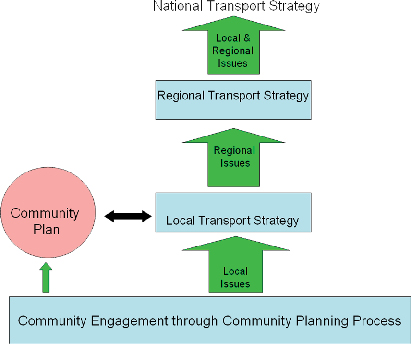
Local authorities throughout Scotland are required to prepare Local Transport Strategies (LTSs) under the provisions of the Transport (Scotland) Act 2001. The main purpose of an LTS is to set out a local authority's strategy and proposals for transport, over a three-year time period, but also with a longer term vision. Local Transport Strategies provide:
Generally these LTS cover a series of key strategic objectives, for example East Ayrshire LTS has five objectives:
1. Economic Growth;
2. Accessibility and Social Exclusion;
3. Environment;
4. Safety and Personal Security; and
5. Sustainability and Integration[34]
There is not a great deal of literature assessing the relative success or failure of the Scottish model of Community Planning although Sinclair (2008) observes that the processes and experiences are broadly similar to those encountered in local governance reform and partnership development elsewhere in the UK.[35] Common problems include: People/relationships; skills/capacity; and processes/decision making. Sinclair further suggests that CPPs role in aligning local and national priorities is a difficult one which may in fact be impossible often resulting in inefficiencies and disappointment.
An initial review of community published by Audit Scotland in June 2006 supported this view. The key issues coming out of that report were:
An OFMDFM analysis on Community Planning in Operation within the UK and Ireland found, in general that experiences were, 'positive' however, in real times it is hard to demonstrate hard outcomes in terms of both added value and impact.[36] It describes positive outcomes
"…in terms of processes, such as closer partnership understanding and improving community engagement, rather than in harder outcomes such as efficiency savings through shared budgets."
In terms of the effectiveness of community planning in the development of Local and Regional Transport plans there is also a paucity of published data, however, in providing guidance the Scottish Government aims to make local transport strategy's as comprehensive as possible ensuring they consider the needs of all transport users including passengers, drivers, pedestrians, cyclists, motorcyclists, freight companies and customers. It also forces authorities to consider the impact of transport users on other people as well as it impact on the environment. It does this through The Scottish Transport Appraisal Guidance (STAG) which provides
"…a clear and robust framework to identify potential transport interventions".[37]
On that point of providing guidance and structure however, Communities Scotland cautions that:
"Community engagement needs to be fit for purpose. It needs to be conditioned by the local situation and local aims and objectives. No single measure – or series of measures – can be used in every case. Given this, it is important that the expectations of community engagement are clarified and agreed in each area – and that local measures reflect this local agreement."[38]
On 10th June 2010, the Northern Ireland Executive gave approval for a Draft Transport Bill to be introduced into the Assembly which provides the legislative basis for bringing forward the proposed reform of public transport. To summarise, the key policy proposals for Public Transport Reform are:[39]
DRD Minister, Conor Murphy, introduced the Bill on 21st June 2010 and the second stage debate took place on 29th June 2010;[40] the Bill has now entered the Committee Stage. The remainder of this paper will focus on the major provisions of the Bill, drawing on issues raised by members in the second stage debate as well as the preceding consultation.
The Transport Bill proposes to modernise the way public transport is delivered in Northern Ireland, updating legislation (the Transport Act, 1967) which has remained largely unchanged in over 40 years.[41] The Bill will significantly alter how public transport services are delivered in Northern Ireland and allow for an improved and more accessible public transport system. In addition to the need to update public transport legislation to take account of the today's very different operating environment, there is also a statutory requirement to comply with Regulation (EC) 1370/2007.
The full title for Regulation (EC) 1370/2007 is: Regulation (EC) No. 1370/2007 OF THE EUROPEAN PARLIAMENT OF THE COUNCIL of the 23rd October 2007 on public passenger transport services by rail and by road and repealing Council Regulations (EEC) No's 1191/69 and 1107/70. This regulation came into force in December 2009.
According to the Department for Regional Development (the Department) the main purpose of the Transport Bill is to "create an effective, efficient and sustainable public transport system that contributes to the Executives transportation, environmental, social inclusion and equality objectives", effectively modernising the public transport system in Northern Ireland so that it is both fit for purpose and available to all those who wish to use it.
There are 50 clauses in the Transport Bill and 2 schedules. The Bill is divided into six parts, which are:
Clause 1 places a duty on the Department for Regional Development to provide an economical, efficient and safe public transport service. In order to comply with regulation (EC) 1370/2007 the Bill gives the Department the power to enter into service agreements with transport providers. It has already been decided that public transport will continue to be regulated with the Minister ruling out privatisation 'now or in the future'[42] therefore most public transport will continue to be provided by Translink. The Department will have to monitor the performance of Translink, over the duration of the contract ensuring that it is run efficiently and not being overcompensated for the services it provides including fulfilling its public service obligations.
In the discussion of Regulation (EC) 1370/2007 the power to award contracts to an 'internal operator' was highlighted however, it does also allow for public service contracts to be competitively tendered.
"This power will allow the Department to take forward the executive's objective of introducing Belfast rapid transit and of awarding that contract on a competitively tendered basis".[43]
This competition will be open to all licences transport companies, including Translink.
The Bill contains provision for the department to issue permits to operate services which are supplementary to the contracted network, it is believed this will allow for innovation and encourage the growth of the public transport market.[44] In response to the consultation, the Federation of Passenger Transport sought assurance that the process for awarding route permits would be handled properly and transparently, with the focus on passenger need. It also queried whether there would be an appeals procedure in the event that the application is refused. These issues are dealt with in the Bill.
In direct response to the issue of appealing, the Department stated that there would be no 'formal appeals mechanism' however, the decision to award or not to award a permit will be based on passenger need and fairness to other providers with decisions to be taken following consultation will all relevant parties including the consumer council and local councils.
Clauses 3 to 17 deal with service permits. These clauses provide for the information that an applicant will have to furnish in the application, the matters to be taken into account by the Department when considering an application, the attachment of conditions to a permit, disqualification of operators from being able to hold a permit, and the revocation, suspension and curtailment of permits. There is also a provision which states that the Department will not revoke a permit without giving the holder the chance to appeal the decision, although it is emphasised that permits are limited to three years and holders should 'not assume that they hold service permits permanently.'[45]
Having an agreement/permit will be a legal requirement for anyone wishing to provide public transport and the structure and level of fares will be determined in the contract (by the Department).
In terms of the consultation, 45 respondents commented on the proposals for fare regulation. A large majority of these responses agreed that fares should be regulated although four responses disagreed with the proposal, most of these indicating that fares should be set by supply and demand in the market. The Department responded by saying that it believes
"…the regulation of fares will help ensure that increases in fares on the public transport system will be kept to a minimum"[46]
this could be interpreted as a protectionist measure which ensures Translink prices are not undercut by private operators. The question is, whether or not this is a good or bad thing? Increased competition may lead to lower prices but as has been the case in Great Britain competition it can negatively affect consumers, not least through reduced service levels.[47]
Clauses 18 to 21 deal with the separation of bus operator and bus service licensing. Clauses 18, 19 and 20 amend the function and name of the "Road Service Licence" in the Transport Act (Northern Ireland) 1967. Clause 21 deals with amendments to the Taxis Act (Northern Ireland) 2008 as a result of the changes to the current "Road Service Licence".
Clause 22 amends the duty of Northern Ireland Railways under section 55 of the Transport Act (Northern Ireland) 1967 to reflect that this duty will be exercised in accordance with any agreement entered into under this Act.[48]
The Bill amends the statutory role of the Consumer Council (CC)[49] which is to protect and promote the interests of all passengers of public transport within Northern Ireland.[50] Clause 23 requires the CC to publish a forward work programme in respect of its functions containing projects, objectives, costs, and timescales. Clause 24 contains provision detailing co-operation between The Department and the CC.
Clauses 25 to 31 set out the provisions on the enforcement of the provision of public transport services i.e. they provide powers to enforce the powers of the rest of the Bill such as the requirement to hold a permit. The Department will have the power to enter into and inspect certain premises that are being used in connection with the carriage of passengers and their luggage by road and to seize certain documents and to obtain certain information. It will be an offence to obstruct an authorised officer in the exercise of functions under the Act. Clause 31 provides for prosecutions for offences under this Act.[51]
This section of the Bill amends and updates grant making powers previously held under article 6 of the Transport Order 1997. The Bill will allow grants to be paid for capital expenditure to any eligible person for the purchase of vehicles for the improvement/development of facilities for the provision of public passenger transport services." The previous legislation only allowed grants to be paid to the NITHC however as this Bill aims to increase competition it is necessary for this power to be expanded to include all potential providers who will either hold service agreements or permits. In terms of the Rapid Transit tender this clause provides the department with the power to proceed with the purchase of vehicles and construction of necessary infrastructure prior to awarding the contract for the management of the service.
This Bill allows the Department to make grants towards expenditure incurred in delivering transport services to the elderly, the disabled, and those living in rural areas. This includes making provision for the supply, maintenance or improvement of vehicles or facilities required for the purpose of serving these members of the public. This would allow, for example, grants to be awarded for adapted vehicles required by wheelchair users.
The grants made are for services provided by 10 B Licence holders. 10B Licences refer to exemptions which are granted by DoE from the need to hold a Road Service Licence where the bus is being used for education, religion, social welfare, recreation or activities which are of benefit to the community, commonly referred to as Community Transport.
Previously community transport had been funded from the annual budget. The Transport Programme for People with Disabilities and the Rural Transport Fund were established in the 1990s to make transport more accessible for people, who by reason of age, disability or rural location, found it difficult or impossible to use mainstream public transport. Any uncertainties around future funding have now been removed.
There are thirteen miscellaneous and supplementary provisions in the Bill including powers to acquire and dispose of land and to make regulations regarding the conduct of people in bus stations, in line with regulations currently applied by train stations. Clause 46 gives the Department the power to make regulations for a number of other processes enabled by this bill including: permit applications, service routes, cancellation of permits; and ticketing machines and systems.
Also in this section of the Bill is clause (43) enabling shared access at bus stations. This access would be carefully controlled and, in the main, would be made available to operators delivering licensed stage carriage services which are complementary to or included in the contracted network.[52]
| NDPB | Executive Agency | |
| Purpose |
|
|
| Key characteristics |
|
|
| Best Suited When |
|
|
[1] NI Assembly Official Report 29th June 2010 - The Minister for Regional Development moved the Second Stage of the Transport Bill (NIA 29/09).
[2] The Government used a different definition of Arm's Length Bodies, incorporating Executive Agencies, non-Ministerial Departments and executive and advisory NDPBs, in the December 2009 Smarter Government White Paper" reference taken from: Gay, O (2010) "Quangos: There is tension between reducing the influence of unaccountable 'Quangos' and de-politicising controversial decisions". In: Key Issues for the New Government: House of Commons Library/Research [online] available from: www.parliament.uk/documents/commons/.../key_issues/Full_doc.pdf
[3] Audit Scotland (2006) "Community Planning: An initial Review" [online] available from:
http://www.audit-scotland.gov.uk/docs/central/2006/nr_060616_community_planning.pdf
[4] (DRD) Department for Regional Development (2009) 'Travel survey for Northern Ireland 2007-2009:
headline Report'. DRD: Belfast [online] available from:
http://www.drdni.gov.uk/travel_survey_for_northern_ireland_headline_report_2007-2012.pdf
[5] NI Assembly Official Report 29th June 2010 - The Minister for Regional Development moved the Second Stage of the Transport Bill (NIA 29/09).
[6] (DRD) Department for Regional Development (2009) Public Transport Reform Consultation Launched (Press Release - November 6th 2009) available from: http://www.northernireland.gov.uk/news/news-drd/news-drd-november-2009/news-drd-061109-public-transport-reform.htm
[7] EU Regulation (1370/2007) on public transport by rail and road came into force in 2009. There is a 10 year transitional period during which progress towards full implementation will have to be demonstrated. The overall aim of this regulation is to ensure as much regulated competition as possible within public transport delivery. This has implications for the current system in Northern Ireland. It requires public authorities who award exclusive rights or provide funding to an operator to do so within the framework of a public service contract that must be strictly controlled and adhere to a performance-based contractual regime (NIAR 373/09) see
[8] (DRD) Department for Regional Development (2010) 'Public transport Reform: Final Report on Public Consultation May 2010' DRD: Belfast [online] available from: http://www.drdni.gov.uk/public_transport_reform_-_pdf_version_of_the_final_consultation_report_-_may_2010.pdf
[9] Established under the Transport Act (NI) 1967
[10] Pelan, K. (2009) "Critical overview and evaluation of the outline business case for public transport reform, the detailed policy proposals and accompanying impact assessments". NI Assembly Research and Library Service 373/2009
[11] NI Assembly Research and Library Service Briefing Note: 102/08 provides an overview of the Public Transport Reform process up to August 2008 [online] available from: http://archive.niassembly.gov.uk/io/research/2008/10208.pdf
[12] At the time of publication (in 2002) draft EU regulations were being considered on public service requirements and the award of public transport service contracts which would require that the rights to operate public transport be subject to regular open competition (A new start for public transport in Northern Ireland page 9). This has since come into effect as regulation 1370/2007 (see footnote 4)
[13] Ports and Public Transport Division (2007) "Future of Public Transport Services in Northern Ireland: Change Programme." DRD: Belfast [online] available from: http://www.drdni.gov.uk/ptr_changeprogv4.pdf
[14](DRD) Department for Regional Development (2009) 'Public Transport Reform Consultation: Detailed policy proposals' DRD: Belfast [online] available from: http://www.drdni.gov.uk/final_detailed_policy_proposals_nov_09.pdf (Page 37)
[15] This was one of five options considered in the DRD strategic business case, an analysis of which was provided by NI Assembly Research and Library Service [online] available from:
http://archive.niassembly.gov.uk/io/research/2008/10008.pdf
[16] The Department of the Environment (DoE) is currently the licensing authority for Road Service Licences, which are administered on its behalf by the Driver and Vehicle Agency.
[17] Annex 1 contains a table comparing the key characteristics on an Executive Agency and an Non Departmental Public Body (NDPB)
[18] The Government used a different definition of Arm's Length Bodies, incorporating Executive Agencies, non-Ministerial Departments and executive and advisory NDPBs, in the December 2009 Smarter Government White Paper" reference taken from: Gay, O (2010) "Quangos: There is tension between reducing the influence of unaccountable 'Quangos' and de-politicising controversial decisions". In: Key Issues for the New Government: House of Commons Library/Research [online] available from: www.parliament.uk/documents/commons/.../key_issues/Full_doc.pdf
[19] McClure Waters (2009) "Outline Business Case for Public Transport Reform". DRD: Belfast [online] available from: http://www.drdni.gov.uk/index/public_transport/pt-publictransportreform/pt-publictransportreformobc-2.htm
[20] (DRD) Department for Regional Development (2009) 'Public Transport Reform Consultation: Detailed policy proposals' DRD: Belfast [online] available from: http://www.drdni.gov.uk/final_detailed_policy_proposals_nov_09.pdf
[21] In total there were 109 written responses to the consultation; 56 responded on the agency issue, six of which were opposed.
[22] (DRD) Department for Regional Development (2010) 'Public transport Reform: Final Report on Public Consultation May 2010' DRD: Belfast [online] available from: http://www.drdni.gov.uk/public_transport_reform_-_pdf_version_of_the_final_consultation_report_-_may_2010.pdf
[23] Ibid (page 23)
[24] (DRD) Department for Regional Development (2009) 'Public Transport Reform Consultation: Detailed policy proposals' DRD: Belfast [online] available from: http://www.drdni.gov.uk/final_detailed_policy_proposals_nov_09.pdf (page 56)
[25] Audit Scotland (2006) "Community Planning: An initial Review" [online] available from: http://www.audit-scotland.gov.uk/docs/central/2006/nr_060616_community_planning.pdf
[26] Outlined in the RPA (2005)
[27] Department of the Environment Community Planning Subgroup Recommendation one, to the Taskforce, June 2006 [online] available from: http://www.flga.org.uk/uploads/docs/lgrt_cp_recommendations_to_the_taskforce.pdf
[28] Spicker, P. "Community planning in Scotland" Centre for Public Policy and Management, Robert Gordon University, Aberdeen [online] available from: www2.rgu.ac.uk/publicpolicy/cppm/complan.pdf
[29] The Scottish Government (2005) Scotland's Transport Future: Guidance on Local Transport Strategies [online] available from: http://www.scotland.gov.uk/Publications/2005/03/20775/53777
[30] Sinclair, S. (2008) "Dilemmas of Community Planning: Lessons From Scotland," Public Policy and Administration vol. 23(4 ) pp. 373-390
[31] The Scottish Government (2005) Scotland's Transport Future: Guidance on Local Transport Strategies [online] available from: http://www.scotland.gov.uk/Publications/2005/03/20775/53777
[32] The Scottish Government (2005) Scotland's Transport Future: Guidance on Local Transport Strategies [online] available from: http://www.scotland.gov.uk/Publications/2005/03/20775/53777
[33] (SPT) Strathclyde partnership for Transport (2010) "SPT in your area" [online] available from: http://www.spt.co.uk/rts/index.aspx
[34] East Ayrshire Council (2011) "East Ayrshire Council's Second Local Transport Strategy" [online] available from: http://www.east-ayrshire.gov.uk/devser/roadstrans/traffic_lts_draft.asp
[35] Sinclair, S. (2008) "Dilemmas of Community Planning: Lessons From Scotland," Public Policy and Administration vol. 23(4 ) pp. 373-390
[36] Blake Stevenson Ltd and Stratagem (2005) "Case Analyses for RPA on Community Planning in Operation within the UK and Ireland" OFMDFM: Belfast
[37] Transport Scotland (2010) "Scottish Transport Appraisal Guidance" [online] available from: http://www.transportscotland.gov.uk/about-us/corporate-reports/j9760-02.htm
[38] Communities Scotland (2006) Evaluation of the effective engagement of communities in regeneration: finall baseline report (Report no 77) [online] available from: http://www.scotland.gov.uk/Resource/Doc/1125/0086287.pdf
[39] Detailed discussion of these issues can be found in: Pelan, K. (2009) "Critical overview and evaluation of the outline business case for public transport reform, the detailed policy proposals and accompanying impact assessments". NI Assembly Research and Library Service 373/2009
[40] (DRD) Department for Regional Development (2010) 'Public transport Reform Website' [online] available from: http://www.drdni.gov.uk/index/public_transport/pt-publictransportreform.htm
[41] Ibid
[42] Introduction to the House of the Transport Bill by Regional Development Minister, Conor Murphy, Tuesday 29th July 2010
[43] Ibid
[44] Ibid
[45] (DRD) Department for Regional Development (2010) 'Public transport Reform: Final Report on Public Consultation May 2010' DRD: Belfast (page 17)
[46] (DRD) Department for Regional Development (2010) 'Public transport Reform: Final Report on Public Consultation May 2010' DRD: Belfast (page 19)
[47] McClure Waters (2009) "Outline Business Case for Public Transport Reform". DRD: Belfast [online] available from: http://www.drdni.gov.uk/index/public_transport/pt-publictransportreform/pt-publictransportreformobc-2.htm (page 140)
[48] Taken from the Transport Bill Financial and Explanatory Memorandum
[49] Under the Transport Act (1967)
[50] The Consumer Council (2009) "Response to the Department for Regional Development (DRD) on the Public Transport Reform Consultation" [online] available from: www.consumercouncil.org.uk/publications/?id=470
[51] Taken from the Transport Bill Financial and Explanatory Memorandum
[52] (DRD) Department for Regional Development (2010) 'Public transport Reform: Final Report on Public Consultation May 2010' DRD: Belfast (page 37)
[53] A public body is not part of a government department, but carries out its function to a greater or lesser extent at arm's length from central government see: (DFP) Department for Finance and Personnel (2009) 'Northern Ireland Public Bodies 2009.' DFP: Belfast [online] available from: http://www.dfpni.gov.uk/publications-foi/publications-browse/publication-scheme-who-we-are-what-we-do/northern-ireland-public-bodies-2009.htm
[54] The other types of NDPBs are Advisory and Tribunal, who provide expert or legal advice respectively but do not have their own staff or budgets
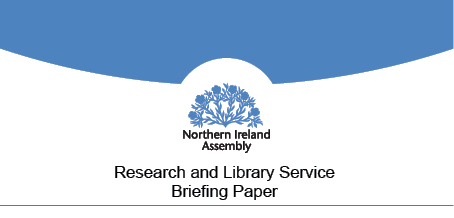
Paper 000/00 23rd November 2010 NIAR 000-00
Use of Audio Visual Technologies on Public Transport
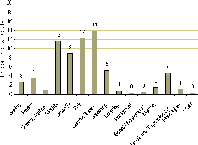
Figure 2: Talking bus stop system
18% of the population including 21% of all adults in Northern Ireland are limited in their daily activities for reasons associated with a disability or long-term condition. Of these, 3% have a sight related disability while 4% have a hearing impairment.[1]
Both these groups face unique and very different challenges when travelling. According to the Guide dogs for the Blind Association (GDFBA), the difficulties faced by blind and partially sighted people, such as reliance on others and associated feelings of anxiousness will
often lead to individuals choosing not to travel. The solution, which the GDFBA have been campaigning for, is laws which call for audio visual equipment on all forms of public transport.[2]
Already, the Rail Passengers Regulation (EC) 1371/2007 ensures that passengers with reduced mobility can travel in a way that is comparable to other citizens.[3] This regulation calls for particular attention to be paid to the needs of people with auditory and/or visual impairment. The European Commission is keen to extend passenger rights to all transport modes, with proposals to protect the rights of passengers travelling by water or by bus/coach expected to be ratified by 2013.[4] With regards to bus/coach services, the regulation guarantees "…an optimum level of accessibility compelling the operators and terminal managers to install adequate access means". These will no doubt be comparable to the provision made for trains and will call for audio visual technologies to be provided on all buses, coaches and associated infrastructure.
As part of the committee's ongoing scrutiny of the Transport Bill, a research paper exploring aspects of audio visual technology used in public transport was requested. The Committee were particularly interested in systems that allowed seamless use by members of the public, especially those who may have disabilities, through the use of the Internet and Mobile technology, and the direction in which technology is progressing towards new systems and processes. This paper therefore provides details of current best practice in the provision of audio visual systems.
All London Buses (approximately 8,000[5]) are now fitted with a system called iBus which provides passengers with on board, real-time, audio-visual information about their bus journey including where their bus is, what the next stop will be and what the final destination will be. This system benefits the visually impaired as well as those who are unfamiliar with the city. iBus employs a combination of technologies including satellite tracking and GPRS data transfer so it can precisely pinpoint the location of the bus and, as an addition to the on-board service it can relay this information to bus stops that are equipped with Countdown signs improving the accuracy of their predictions of bus arrival times.[6]
Figure 2: Talking bus stop system
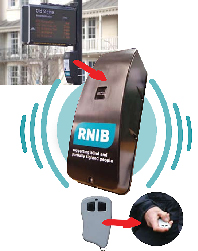
In 2007 Brighton and Hove Council in association with the Royal National Institute for the Blind (RNIB) launched the RNIB REACT talking sign system. This enables blind and visually impaired bus passengers to access travel information at bus stops. The RNIB React units link into the city's Real Time Bus Information signs enabling the users to get announcements detailing what stop they are at, which buses are coming and when they are due to arrive.
The various components of the REACT talking bus stop system are shown in figure 2. As the user walks past the REACT unit announcements are automatically triggered by key fobs which they carry. Additional information is also available via the two buttons on the fob. The first button starts a message that gives further information about the bus stop location while the second tells you when the next few buses are due.
The REACT audio sign system can be installed in other public areas and in addition to its application at bus stops, it can also act as a way finding tool providing information around town centres or inside bus or train stations enabling people to get around more safely, independently and with increased confidence.
The technology employed in the REACT system is called Radio Frequency Identification (RFID) and already this is being widely used in public transport to provide information for blind and visually impaired passengers. A Swiss public transport agency, Verkehrsbetriebe St. Gallen (VBSG) is rolling out an RFID based system, enabling blind passengers to not only check information at bus stops, but to check the destination of passing buses so they can flag them down. The system is known as the Personal Assistant for the Visually Impaired (PAVP) and the key fob used has the additional benefit of including additional technologies such as an MP3 player and digital voice recorder, while according to its manufacturers it has the potential to become a form of ticketless travel.[7]
Moving forward it is believed that RFID technology can create a world which is totally accessible to all including those with visual impairments. The project "Ways4all" is using passive RFID tags to identify indoor routes, barriers and means of public transport for visually impaired and blind people. Effectively the readers will be placed in strategic locations such as at doors, stairways, bus halts etc and will allow the user to pre-programme a destination with the system guiding them there. It is believed this technology is favourable to others such as GPS as there are less chances of interference or system failure.
Trekker is a system that does use GPS as well as talking digital maps and talking menus. Trekker can provide its user with real time information on surroundings, by pinpointing their location and can announce street names, landmarks, public transport access and any other amenity the user may require. The Trekker system would be a more expensive option that the RFID system as it requires a pocket PC or SmartPhone to operate.
[1] NISRA (2007) "The Prevalence of Disability and Activity Limitations amongst adults and children living in private households in Northern Ireland: The first Report from the Northern Ireland Survey of people with Activity Limitations and Disabilities"
[2] GDFBA (2010)"Talking Buses - are we there yet?" [online] available from: http://tiny.cc/yubqq
[3] Europa (2010) "Rail Passenger Rights" [online] available from: http://tiny.cc/o43h4
[4] See Eur-Lex: http://tiny.cc/qr48h
[5] TfL (2009) "All London Buses now fitted with iBus" [online] available from: http://tiny.cc/c9qzb
[6] TfL (2009) "All London Buses now fitted with iBus" [online] available from: http://tiny.cc/c9qzb
[7] Neely, B. (2008) Swiss Town Rolls Out RFID System for Blind Bus Riders. RFID Journal [online] available from: http://tiny.cc/80zif
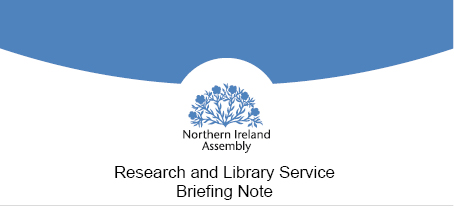
30 November 2010 NIAR 620-00
Mental Health:
Legislative Update
This paper has been prepared in relation to a research query submitted by the Committee for Regional Development. The query relates to the Mental Health (Northern Ireland) Order (1986) and a provision outlined within the Transport Bill. In response, this paper provides: 1) an overview of the current mental health legislation in Northern Ireland, 2) details of its imminent reform, and 3) an overview of how the NI Order (1986) differs from that in other nearby jurisdictions.
The fundamental aim of mental health legislation is to "protect, promote and improve the lives and mental well-being of its people".[1] However the nature of mental health law is complex and contentious. Most notable is the tension that exists between preserving the patient's autonomy and protecting the patient and others from harm or significant risk. Coupled with 'autonomy', is the notion of 'capacity' – where the decision making capabilities of the individual need to be considered. In such cases, the person may not be able to make decisions themselves due to the nature of their condition.
As part of the Committee Stage of the Transport Bill, the Regional Development Committee is considering provisions in the Transport Bill whereby a permit to provide public passenger transport services would be considered terminated if-
a. the individual dies, or
b. the individual becomes a patient within the meaning of Article 2(2) of the Mental Health (Northern Ireland) Order (1986).
[Clause 7 (6)(b)]
The next section of this paper considers Article 2(2) in more detail and provides further background to the use of the MHO.
At present, the Mental Health (Northern Ireland) Order (MHO), 1986 provides the legal framework regarding the compulsory admission and treatment of patients suffering from a mental disorder, as defined within the Order. This is a very powerful piece of legislation because it has the power to take away an individual's rights.
Under Article 2(2) of MHO (1986) a 'patient' is defined as a "person suffering or appearing to be suffering from mental disorder" (except Part VIII).2 In Article 3 of the 1986 Order, a 'mental disorder' is defined as "mental illness, mental handicap and any other disorder or disability of mind". This is further defined in the legislation as:
|
The MHO contains a number of duties which concern the care of the patient in relation to: compulsory admission into hospital, guardianship, consent to treatment, and management of a patient's property and affairs.[3] The legislation is also accompanied by a Code of Practice which provides guidance for professionals on everyday practical issues which are not dealt with in the primary or secondary legislation.[4] The Code also states that people suffering from a mental disorder should be cared for with dignity, have their needs and preferences taken into account, and have the least degree of control and segregation necessary as is consistent with their safety and the safety of others.[5]
If a person is suffering from severe mental health problems, they may become a patient under the Order, subject to a Mental Health Order assessment.[6] According to the World Health Organisation Primary Care Guide,[7] GPs can be involved in the MHO assessment in two ways:
Community: The patient may be causing serious concern to family or neighbours. An application can be made for compulsory hospital admission for seven days, renewable to 14 days for assessment (Article 4). In extreme circumstances, if access is denied, a warrant authorising a police officer to secure access may need to be used (Article 129). This warrant is obtained by an approved social worker (ASW), other officer of the Health and Social Services Trust or a police officer from a Justice of the Peace. If the officer has to enter the premises, by force or otherwise, they must be accompanied by a medical practitioner (usually a GP) who will administer medical treatment if required.
Hospital: The patient may have been admitted informally and now wants to leave or is refusing treatment. An application for assessment involves the patient's own GP (or another practitioner who has previous knowledge of the patient) in attending hospital to give the medical recommendation. A doctor on the staff of the hospital in which it is intended that the assessment should be carried out cannot give the recommendation, except in a case of urgent necessity.
In order for the MHO to be invoked, an application for compulsory admission must be made by: either 1) the 'nearest relative'[8] or 2) an Approved Social Worker (ASW), and supported by a medical recommendation (usually the patient's GP or a doctor who knows the patient personally). Compulsory admission for assessment of a patient can only occur when:
Given that the MHO was developed over two decades ago, it is now considered outdated in light of current policies, best practice and the different models of care delivery. The MHO (1986) has also been criticised for using stigmatising terminology and for lacking in a human rights approach.[10]
Unlike its neighbours, Northern Ireland has yet to update its mental health legislation. In light of the significant gaps in local policy and legislation, an independent and extensive Review of Mental Health and Learning Disability in Northern Ireland was established by Department of Health, Social Services and Public Safety (DHSSPS, 2002). This became known as the Bamford Review.[11] Taking account of a wide range of stakeholder views, the Review's final report, A Comprehensive Legislative Framework (2007) stipulated:
the need to respect the rights of all citizens, to provide rights for those whose freedoms may need to be interfered with on healthcare grounds, where appropriate, to protect public safety and the need to encourage best practice generally.[12]
The main crux of the Bamford Review proposed a rights-based approach as the guiding principle for the reform of mental health legislation. This approach respects the decisions of all who are assumed to have capacity to make their own decisions. It further states that there should be a "single, comprehensive legislative framework for the reform of Mental Health legislation and for the introduction of Capacity legislation in Northern Ireland…A framework is proposed for interventions in all aspects of the needs of persons who require substitute decision-making, including mental health, physical health, welfare or financial needs."[13]
The proposed legislative framework is underpinned by four guiding principles aimed at supporting the person's dignity. These include:[14]
Autonomy – respecting the individual's capacity to decide and act on his own and his right not to be subject to restraint by others
Justice – applying the law fairly and equally-persons with a learning disability or mental health disorder should retain the same rights and entitlements as other members of society.
Benefit – acting in the individual's best interests
Least Harm – treatment and care must be provided in the "least invasive manner and in the least restrictive environment compatible with the delivery of safe and effective care"
These principles are in keeping with other person-centred human rights statutes such as the UNs Principles for the Protection of Persons with Mental Illness and for the Improvement of Mental Health Care (1991), the Human Rights Act (1998), and the European Convention on Human Rights which has been incorporated into domestic law.
In 2008, a consultation response on improving services for people with a mental health or learning disability was published by the NI Executive entitled Delivering the Bamford Vision.[15] The government broadly accepted the thrust of the Bamford Review and the principles-based approach, and suggested that a number of changes be made in order for the vision to become a reality.
In 2009, an accompanying Action Plan (2009-2011) on Delivering the Bamford Vision was published which provided details about how changes should be progressed.[16] Following on from the consultation on the Department's proposal, A Legislative Framework for Mental Capacity and Mental Health Legislation (2009), the DHSSPS Minister announced a ground-breaking decision to prepare a single bill encompassing both mental health and mental capacity entitled the Mental Capacity (Health, Welfare and Finance) Bill. More recently, an Equality Impact Assessment consultation has been conducted to measure the impact that the single Bill may have on section 75 groups (Northern Ireland Act 1998).[17] A summary of the provisional timetable for the Mental Capacity Bill is presented in Table 1 overleaf.
Table 1 Provisional timeframe for the Mental Capacity Bill[18]
| Stages | Timeframe |
| EQIA consultation | July-October 2010 |
| Policy cleared by Minister and Executive | November/December 2010 |
| Bill Drafted | March 2011 |
| Bill consultation | July/August 2011 |
| Bill introduced to Assembly | Autumn 2011 |
| Bill enacted | Spring 2013 |
New but separate mental capacity and mental health legislation has been introduced in nearby jurisdictions in recent years. Table 2 below provides an overview of the current legislation and an overview of some of the new features.
Table 2 Mental health and capacity law: UK and R.O.I. legislatures
| Jurisdiction | Current legislation | Summary of key features |
| Northern Ireland | The Mental Health Order 1986 |
|
| Scotland | Mental Health (Care and Treatment) (Scotland) Act, 2003 Adults with Incapacity (Scotland) Act, 2000 |
|
| England and Wales Amended the Mental Health Act (1983) | The Mental Health Act, 2007 The Mental Capacity Act, 2005 |
|
| R.O.I. | Mental Health Act (2001) Capacity legislation underway |
|
Recent experiences have highlighted gaps and inconsistencies in the application of the separate Acts in the other jurisdictions.[19] Coupled with the continuing stigmatising effect of enacting separate mental health legislation, and the need to provide protection to the most vulnerable individuals, the decision to proceed with a capacity based single Bill approach signals a unique opportunity for Northern Ireland to create legislation which more effectively meets the needs of its patients, members of the public and professionals.
[1] WHO Resource Book on mental health, human rights, and legislation (2005). Available online at: http://www.who.int/mental_health/policy/resource_book_MHLeg.pdf page 19. Website accessed 26.11.10.
[2] Mental Health (NI) Order (1986), available online at: http://www.legislation.gov.uk/nisi/1986/595 Website accessed 26.11.10.
[3] http://www.nidirect.gov.uk/index/information-and-services/people-with-disabilities/health-and-support/your-rights-in-health/the-mental-health-act.htm. Website accessed 28.11.10.
[4] Department of Health and Social Services (1992) Mental Health (Northern Ireland) Order 1986 Code of Practice, Belfast, HMSO.
[5] Ibid, page 3.
[6] NIdirect Government Services: The Mental Health NI Order (1986) available online at: http://www.nidirect.gov.uk/index/information-and-services/people-with-disabilities/health-and-support/your-rights-in-health/the-mental-health-act.htm. Website accessed 29.11.10.
[7] WHO Guide to Mental and Neurological Health in Primary Care. Information available from: www.mentalneurologicalprimarycare.org/page_view.asp?c=16&fc=006003&did=2230. Website accessed 30.11.10
[8] The Order gives certain rights to the nearest relative which can be used to protect the patient's interests. Usually, the nearest relative is the older of the two people in the following list: husband, wife or civil partner; partner who has lived with the patient for at least six months; daughter or son; father or mother; brother or sister grandfather or grandmother, aunt or uncle, nephew or niece.
[9] Figures obtained from Patrick Convery of the Regulation, Quality and Improvement Authority on 30.11.10
[10] See: DHSSPS (2007) The Bamford Review of Mental Health and Learning Disability: A Comprehensive Legislative Framework, Consultation Report. Belfast: DHSSPS, p.11.
[11] The Bamford Review of Mental Health and Learning Disability. Available online at www.rmhldni.gov.uk
[12] DHSSPS (2007) The Bamford Review of Mental Health and Learning Disability: A Comprehensive Legislative Framework, Consultation Report. Belfast: DHSSPS, p.1.
[13] Ibid page 4.
[14] Ibid page 5.
[15] Delivering the Bamford Vision: The response of the Northern Ireland Executive to the Bamford Review of Mental Health and Learning Disability. Available online at www.dhsspsni.gov.uk/bamford_consultation_document.pdf Website accessed 28.11.10.
[16] Delivering the Bamford Vision www.dhsspsni.gov.uk/bamford_action_plan_2009-2011.pdf Website accessed 26.11.10.
[17] DHSSPS Consultation on an Equality Impact Assessment for New Mental Capacity Legislation. Available online at: www.dhsspsni.gov.uk/showconsultations?txtid=43469
[18] Information requested from DHSSPS about the verified timeline was not obtained in time for the writing of this paper.
[19] See for example, Thompson, J. (2008) Reform of mental health legislation in the UK. Northern Ireland Assembly Research paper 41/09
Appendix 6
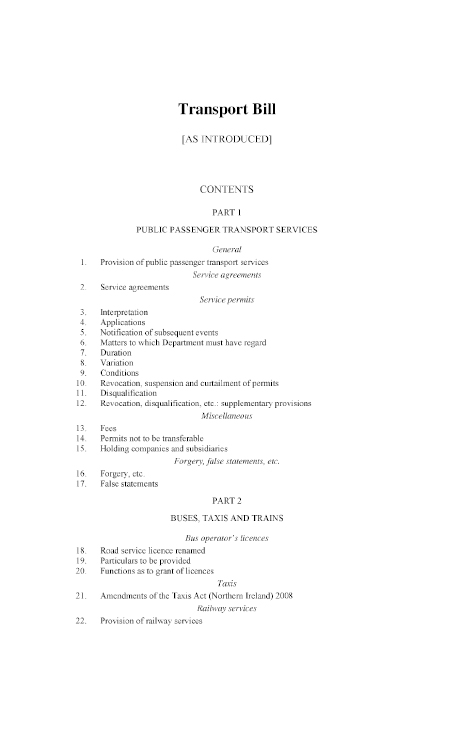
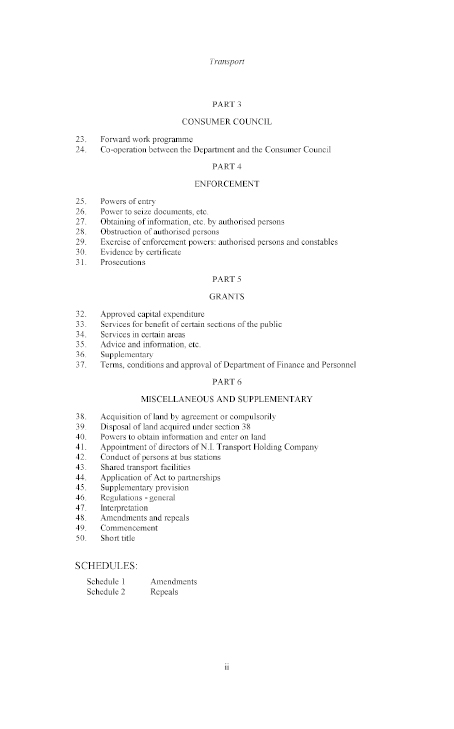
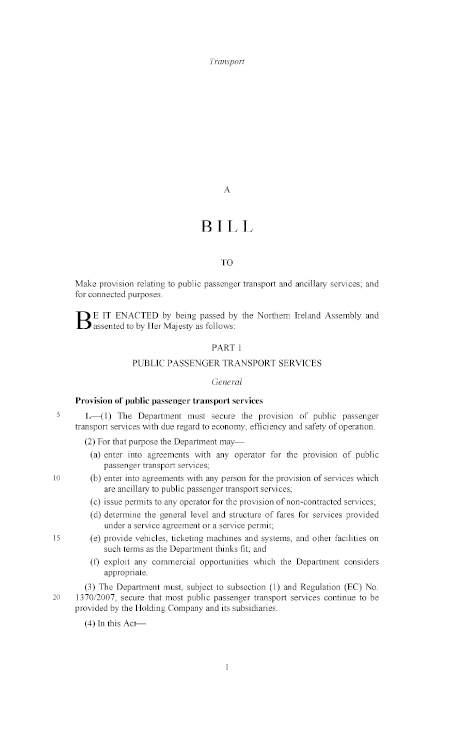
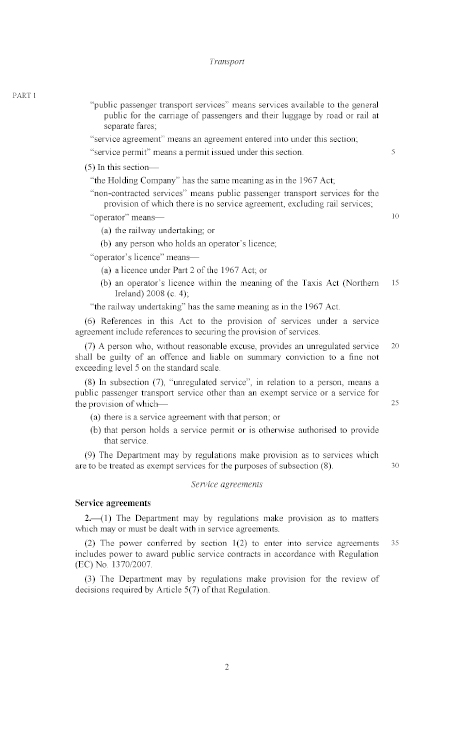
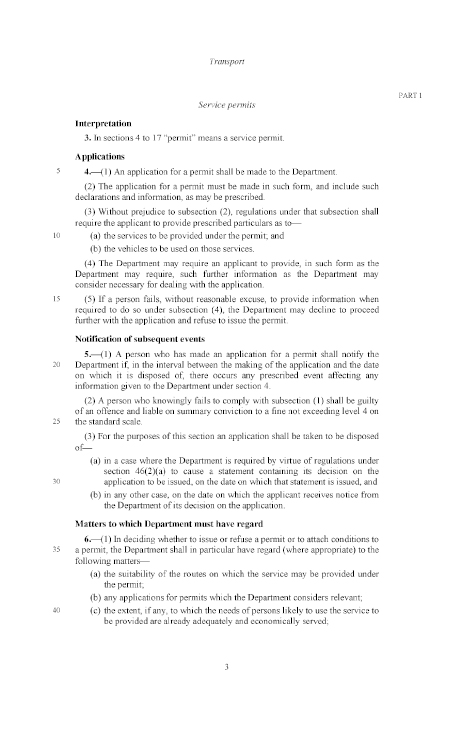
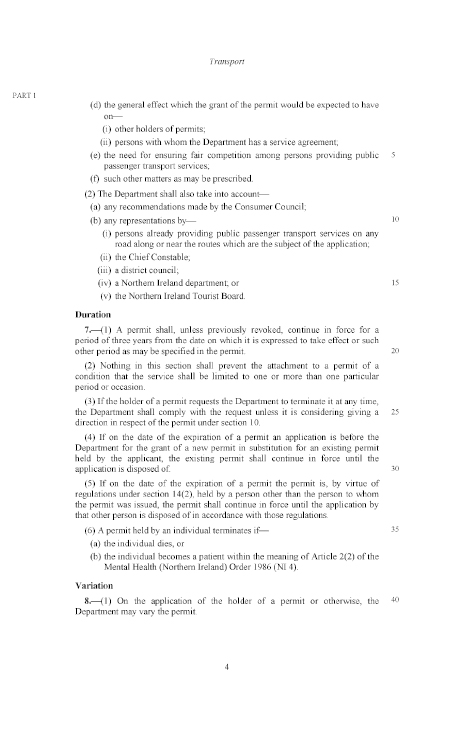
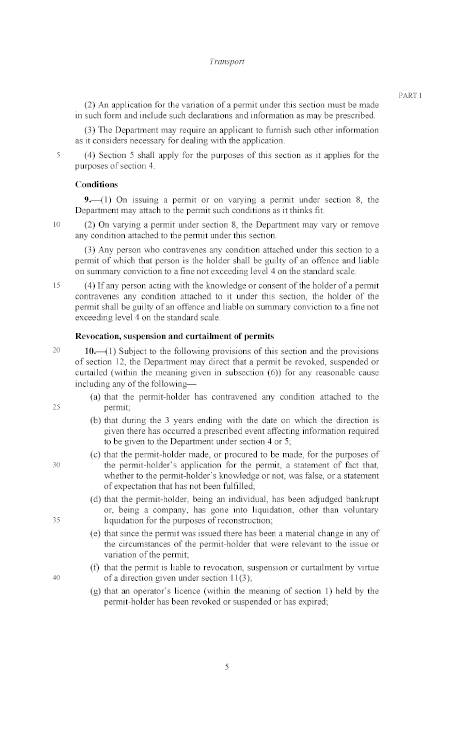
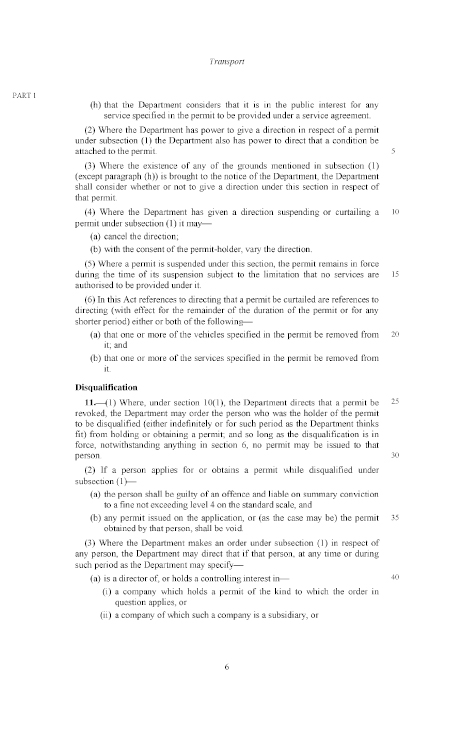
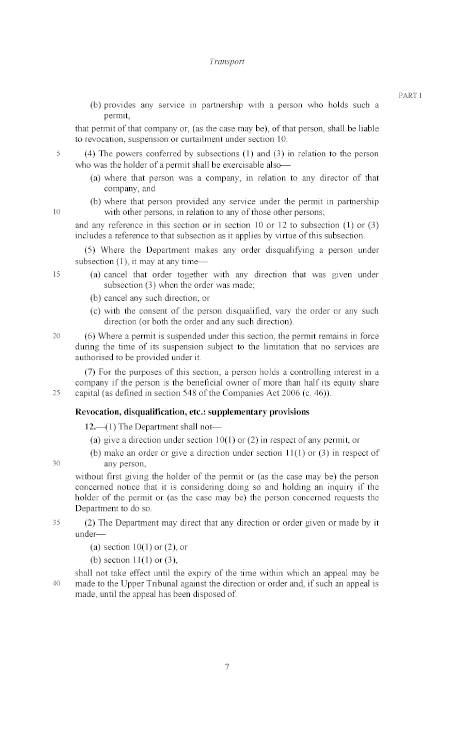
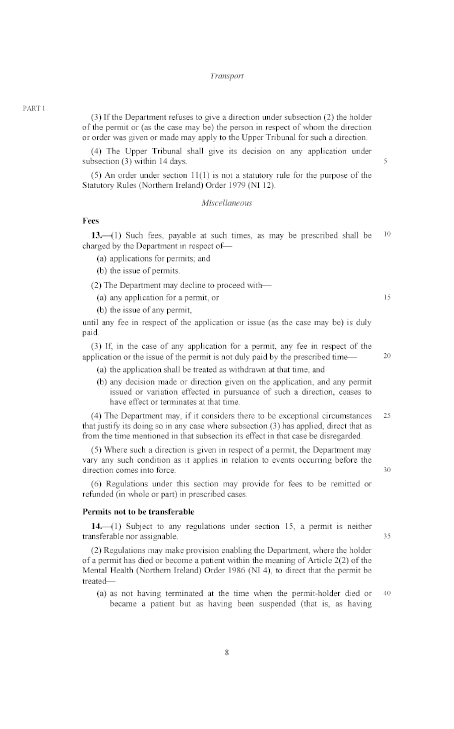
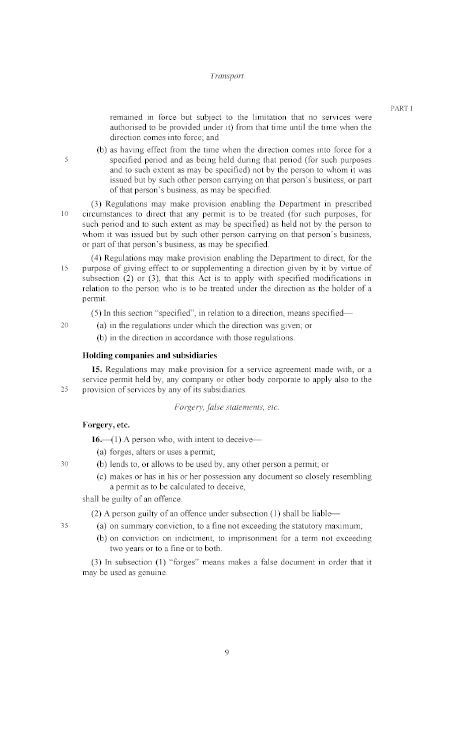
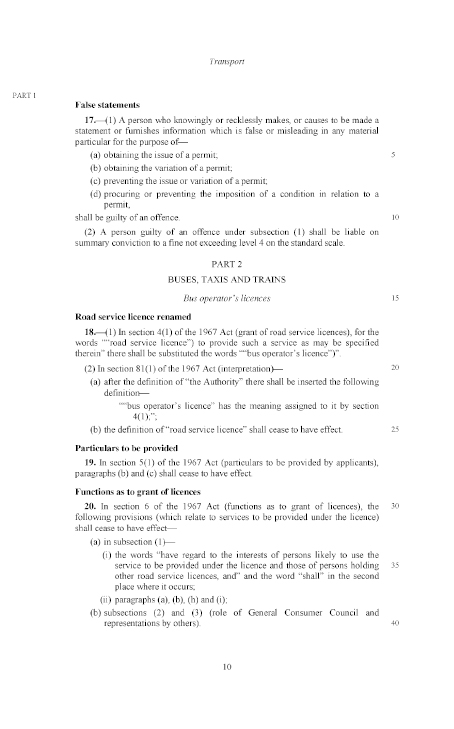
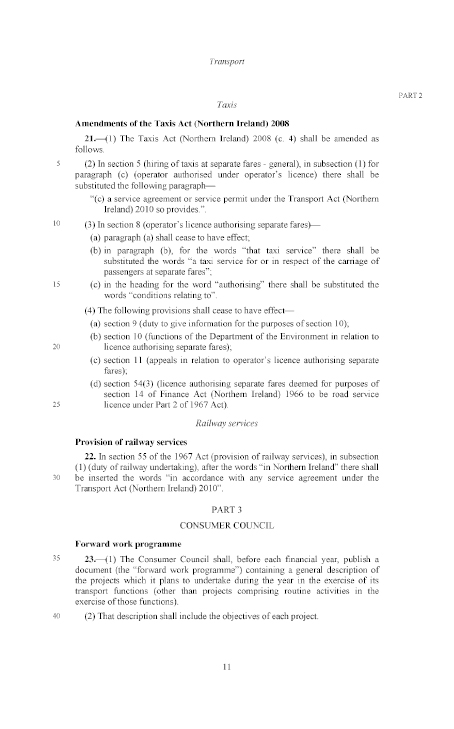
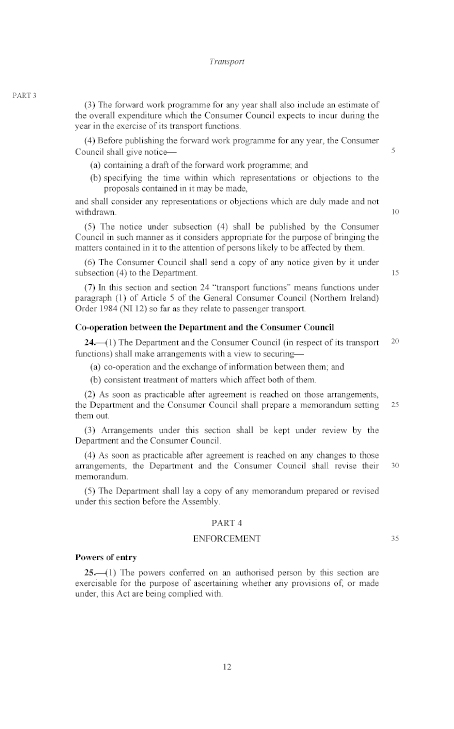
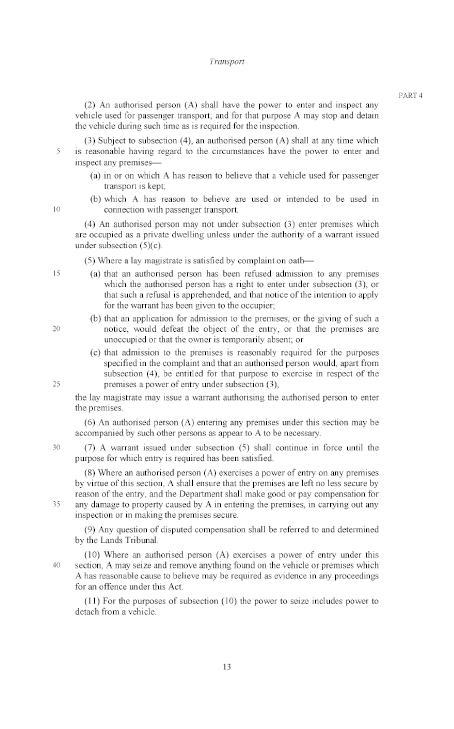
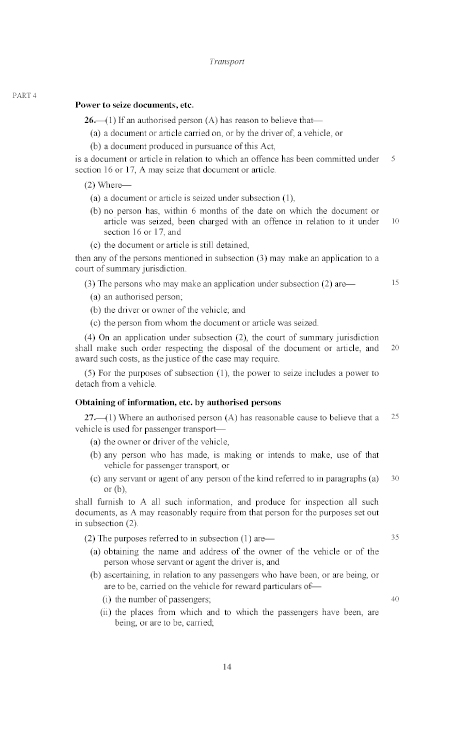
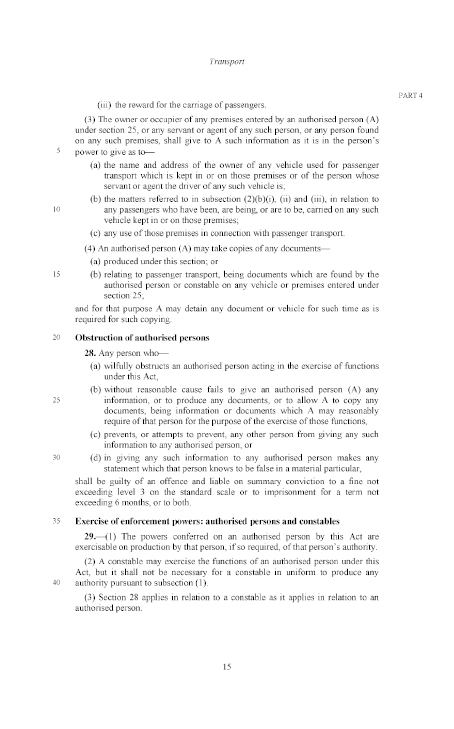
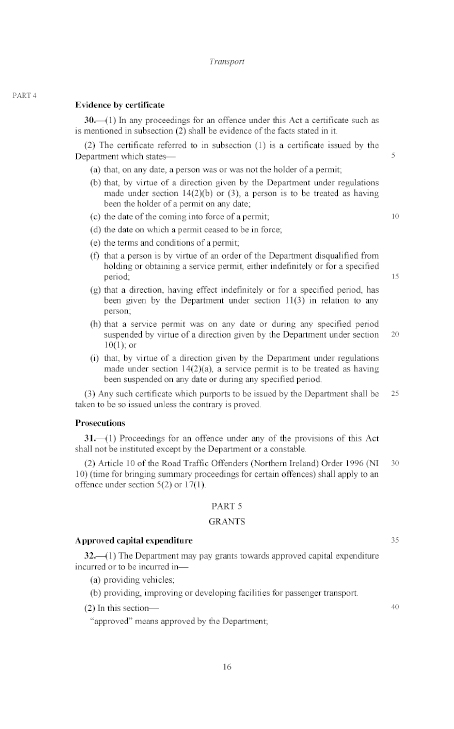
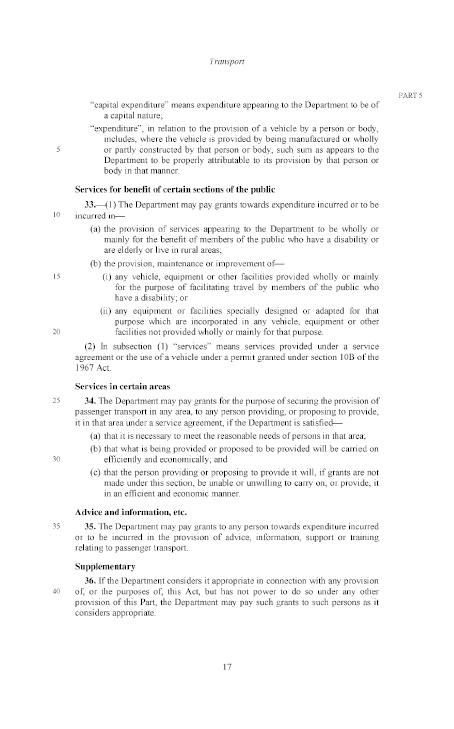
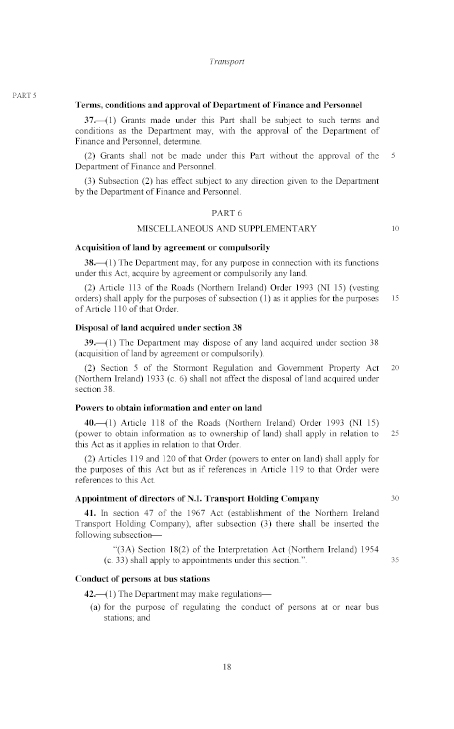
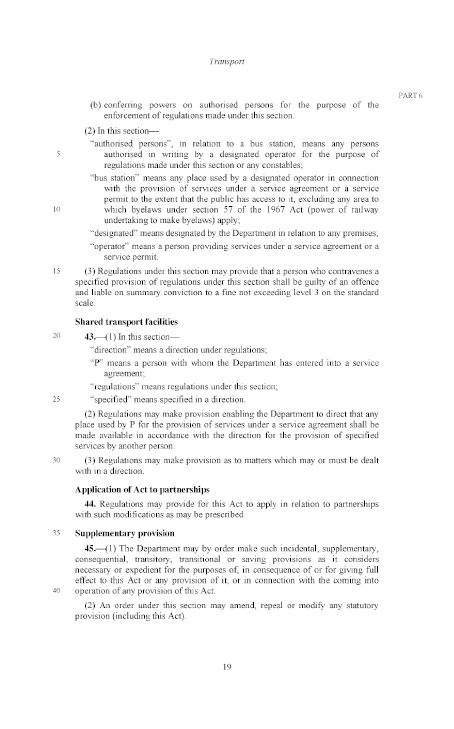
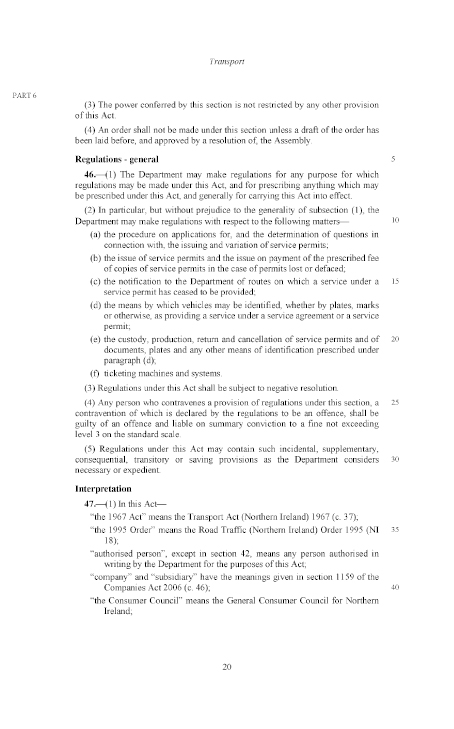
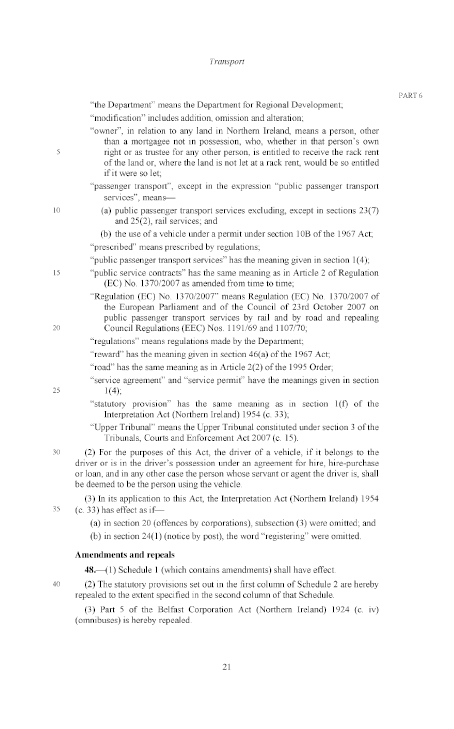
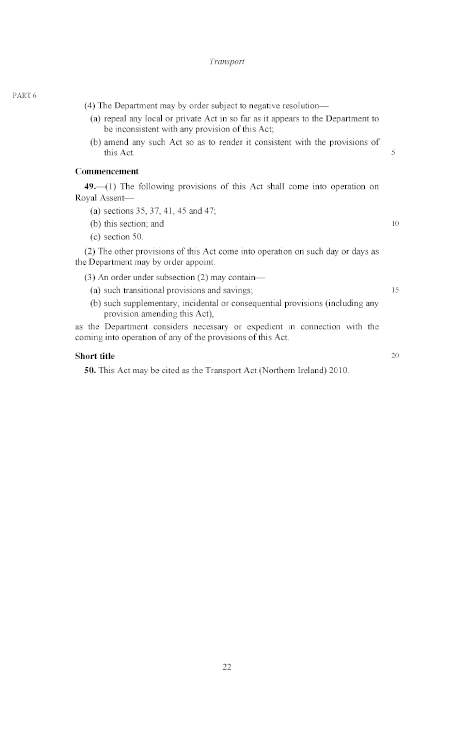
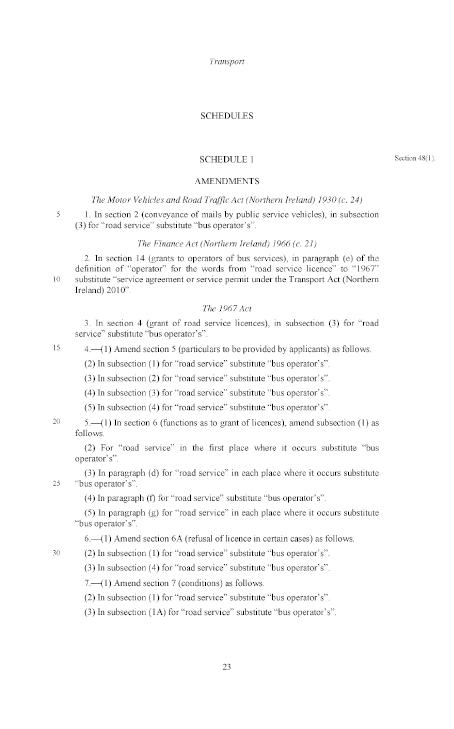
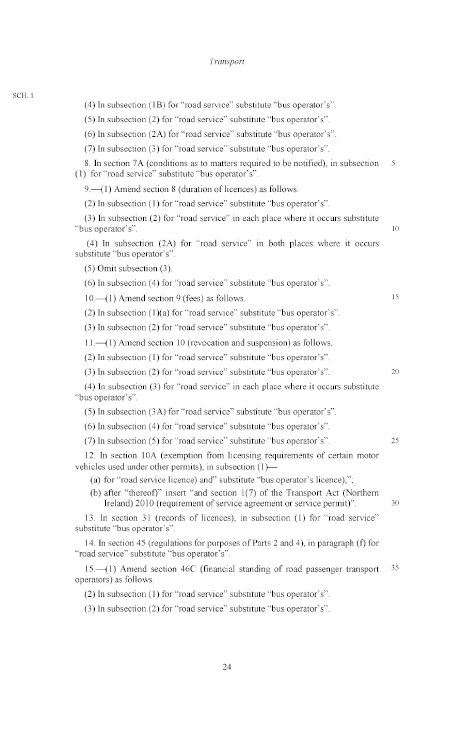
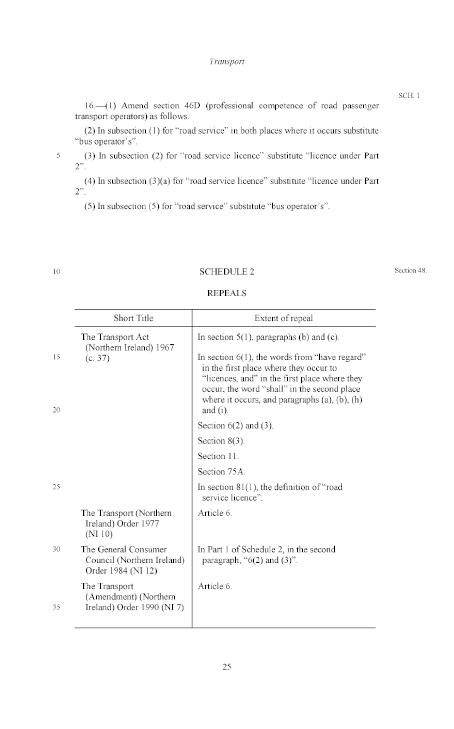

1. This Explanatory and Financial Memorandum has been prepared by the Department for Regional Development in order to assist the reader of the Bill and to help inform debate on it. It does not form part of the Bill and has not been endorsed by the Assembly.
2. The Memorandum needs to be read in conjunction with the Bill. It is not, and is not meant to be, a comprehensive description of the Bill. So where a clause or part of a clause or schedule does not seem to require an explanation or comment, none is given.
3. The main purpose of the proposed Bill is to create an effective, efficient and sustainable public transport system that contributes to the Executive's transportation, environmental, social inclusion and equality objectives.
4. This will be achieved through the introduction of new service delivery arrangements that will enable the Department to contract with public transport operators while ensuring compliance with EC Regulation 1370/2007. This will include powers to award contracts for Bus Rapid Transit.
5. Under the Transport Act (Northern Ireland) 1967, the Department of the Environment is responsible for granting Road Service Licences for the carriage of passengers and their luggage by road. This licence includes both an operator element and a route/service element. This Bill amends the definition and function of the Road Service Licence to a Bus Operator's Licence which will remain the responsibility of the Department of the Environment. The Department for Regional Development will become responsible for public transport service delivery through the contracting and service permit systems which will be introduced in this Bill.
6. The Department held a public consultation on its public transport reform policy proposals between 9 November 2009 and 5 February 2010. There were 103 written replies received. Eleven public meetings were held during the public consultation period, with a total of 194 attendees.
7. The Department carried out a public consultation on the Bus Rapid Transit policy proposals between 23 November 2009 and 19 February 2010. There were 36 written replies received.
8. An Outline Business Case was produced which evaluated three options for the revised organisational arrangements that will deliver and sustain the reforms. The three options were:-
9. The three options were evaluated against monetary and non-monetary criteria. It was concluded that the agency option offered the best overall value for money because:-
10. In respect of Bus Rapid Transit a strategic outline case (SOC) was completed in February 2008. The SOC demonstrated the feasibility for the proposed pilot Rapid Transit network in the Belfast Metropolitan Area and was endorsed by the Executive in November 2008.
11. The Bill will contain the necessary powers relating to the regulation of public transport service delivery in Northern Ireland. It covers the duty of the Department to secure the provision of public passenger transport services, the power to enter into agreements and to award service permits for that purpose, the ability to attach conditions to and vary a service permit along with powers for the revocation, suspension and curtailment of service permits. It creates offences and provides enforcement powers in respect of the contracting/service permit regime. The Bill provides power for the Department to regulate fares, designate bus stations/premises as shared facilities, regulate passenger conduct in bus premises, provide integrated and on-street ticketing systems, make grants for the provision of bus services of benefit to certain sections of the public, acquire and dispose of land, provide vehicles and facilities for public transport purposes, and exploit commercial opportunities arising from its public transport functions.
12. The Bill has 50 clauses and 2 Schedules. A commentary on the provisions follows below. Comments are not given where the wording is self-explanatory.
Clause 1 imposes a duty on the Department to secure the provision of public transport services in Northern Ireland and provides mechanisms for the Department to do so through service agreements and service permits for public transport services, and agreements for services ancillary to the provision of public transport services. It also allows the Department to determine the general level and structure of fares for these services, to provide vehicles, ticketing machines and systems, and to exploit any commercial opportunities which the Department considers appropriate. Most public passenger transport services will be awarded directly to the Northern Ireland Transport Holding Company and its subsidiaries, as the publicly-owned internal operator, under a service agreement in compliance with EC Regulation 1370/2007. This clause also creates an offence to operate unregulated services.
Clause 2 deals with service agreements in more detail. It provides the Department with the power to make regulations as to the content of service agreements. It also provides that service agreements can include the award of "public service contracts" in accordance with EC Regulation 1370/2007 and allows the Department to make provision for the review of decisions made in respect of the award of service agreements, as required by the Regulation.
Clauses 3 to 12 deal with the process for granting service permits. These clauses provide for the information that an applicant will have to furnish in the application, the matters to be taken into account by the Department when considering an application, the attachment of conditions to a permit, disqualification of operators from being able to hold a permit, and the revocation, suspension and curtailment of permits for any reasonable cause and other specified grounds as outlined.
Clauses 13 deals with the payment of fees for permit applications and issuing of permits.
Clause 14 provides that permits are neither transferable nor assignable. It also allows the Department to make directions for the treatment of permit in circumstances where the permit-holder dies or becomes a patient under the Mental Health (Northern Ireland) Order 1986.
Clause 15 allows the Department to make regulations to provide that service agreements with and service permits held by a company or other body corporate also applies to services provided by any of its subsidiaries.
Under clause 16, it will be an offence to forge, alter or use a permit with intent to deceive. It will also be an offence under clause 17 to knowingly make a false statement or produce false or misleading material in relation to an application for a service permit.
Clauses 18 to 21 deal with the separation of bus operator and bus service licensing. Clauses 18, 19 and 20 amend the function and name of the "Road Service Licence" in the Transport Act (Northern Ireland) 1967. Clause 21 deals with amendments to the Taxis Act (Northern Ireland) 2008 as a result of the changes to the current "Road Service Licence".
Clause 22 amends the duty of Northern Ireland Railways under section 55 of the Transport Act (Northern Ireland) 1967 to reflect that this duty will be exercised in accordance with any agreement entered into under this Act.
Clauses 23 and 24 provide arrangements for the production by the Consumer Council of a forward work programme in relation to its transport functions and for the production of a memorandum by the Department and the Consumer Council detailing arrangements for co-operation and consistent treatment of matters in relation to the Consumer Council's transport functions.
Clauses 25 to 31 set out the provisions on the enforcement of the provision of public transport services. The Department will have the power to enter into and inspect certain premises that are being used in connection with the carriage of passengers and their luggage by road and to seize certain documents and to obtain certain information. It will be an offence to obstruct an authorised officer in the exercise of functions under the Act. Clause 31 provides for prosecutions for offences under this Act.
Clauses 32 to 37 deal with the payment of grants by the Department in relation to the provision of public transport services, provision of advice, information or training relating to public transport services and capital expenditure for the purchase of vehicles.
Clauses 38 to 40 provide for the acquisition and disposal of land, including powers for the Department to obtain information as to ownership of land and to enter onto land.
Clause 41 applies section 18(2) of the Interpretation Act (Northern Ireland) 1954 to appointments to the Northern Ireland Transport Holding Company made under section 47 of the Transport Act (Northern Ireland) 1967 to include power to remove or suspend persons from appointments under this section.
Clause 42 provides the Department with the power to make regulations in respect of the conduct of persons at bus stations.
Clause 43 gives the Department the power to issue directions in respect of the shared use of facilities used for the provision of services under a service agreement.
Clauses 45 to 50 contain a number of miscellaneous and supplementary provisions, including powers to make regulations. Clause 45 provides for the Department to make orders, subject to affirmative resolution, for any further provisions in connection with this Act.
13. The staffing costs of the new public transport agency are expected to be around £3.5m, of which almost £2m would be covered by the transfer of existing resources within DRD. The additional £1.5m is in relation to functions amounting to around £600k transferring from NITHC/Translink and a further £900k required for new functions that are not currently being carried out – mainly in relation to local planning and the EC Regulation 1370/2007 requirement for contracts. This additional expenditure is necessary to create the structures through which longer term efficiencies and improved services will be achieved and sustained.
14. The Strategic Outline Case for Bus Rapid Transit identified three pilot routes for the Bus Rapid Transit system in Belfast, at an estimated cost of £147m.
15. The provisions of this Bill are compatible with the Convention on Human Rights.
16. An Equality Impact Assessment (EQIA) was completed in respect of the Department's proposals and included in the policy consultation pack. The Equality Impact Assessment concluded that there was no need for any mitigation or adjustments for section 75 groups in the general population as any potential impacts identified were positive. A further analysis of the staffing profile for NITHC/Translink compared to the NICS, carried out to consider any potential equality implications in the event of a need to transfer staff into the new Agency concluded that, although there was the potential for differential impact in terms of gender, there were no significant impacts on any section 75 groups.
17. The proposals for Bus Rapid Transit were included in both the Regional Transportation Strategy and the Belfast Metropolitan Transport Plan, both of which were the subject of Equality Impact Assessments. Following an Equality Screening of the policy proposals for Bus Rapid Transit, the Department concluded that an Equality Impact Assessment of the proposals to introduce enabling powers was not required. The Department proposes to carry out a full Equality Impact Assessment prior to the implementation phase of the project.
18. A Partial Regulatory Impact Assessment was completed in respect of the Department's public transport reform proposals and included in the policy consultation pack. The Partial Regulatory Impact Assessment concluded that the reforms should generally have a positive impact on bus operators through the potential to participate in the development of local public transport plans and by enabling licensed private operators to get access to bus stations. Similarly bus passengers will benefit in the longer term from improved accessibility to customer information on all services and through access to shared facilities. A full Regulatory Impact Assessment will accompany the Bill at Introduction.
19. No immediate impacts have been identified in respect of the Bus Rapid Transit proposals. It is, however, proposed that a further regulatory screening exercise will be undertaken prior to the implementation phase of the project.
The Minister for Regional Development had made the following statement under section 9 of the Northern Ireland Act 1998:
"In my view the Transport Bill would be within the legislative competence of the Northern Ireland Assembly."
Official Report (Hansard)
Monday 21 June 2010
Transport Bill: First Stage
The Minister for Regional Development (Mr Murphy): I beg to introduce the Transport Bill [NIA 29/09], which is a Bill to make provision relating to public passenger transport and ancillary services; and for connected purposes.
Bill passed First Stage and ordered to be printed.
Mr Deputy Speaker: The Bill will be put on the list of future business until a date for its Second Stage is determined.
Official Report
(Hansard)
Tuesday 29 June 2010
Transport Bill: Second Stage
The Minister for Regional Development (Mr Murphy): I beg to move
That the Second Stage of the Transport Bill [NIA 29/09] be agreed.
The aim of the public transport reform programme is to create efficient, effective and sustainable public transport services that contribute to the Executive's transportation, environmental, social inclusion and equality objectives, while supporting the development of the wider economy.
A major public consultation exercise and continued engagement with key stakeholders and the transport community and business sectors have served to underpin and significantly inform the proposals. The Transport Bill will provide new arrangements for the delivery of public transport services in the North. It is more than 40 years since the last major change in legislation. The law needs to change now to keep pace with the requirements of a modern public transport system.
Under the Transport Act 1967, the Department of the Environment was responsible for granting road service licences for the carriage of passengers and their luggage by road; that licence included both an operator element and a route element. Under reform proposals, the Department for Regional Development will take over responsibility for the route element of the licence and the Department of the Environment will retain responsibility for bus-operator licensing as well as its other licensing responsibilities.
The Bill introduces a duty on my Department to secure the provision of public transport services with due regard to economy, efficiency and safety of operation. It provides the framework for the Department to do so through a new contracting regime supplemented by a service permit system. The new contracting regime and permit system will allow the Department to enter into agreements with operators for the provision of public passenger transport services, enable the continual regulation of the market and, as I already stated, allow the Department to comply with EC regulation 1370/2007.
I should explain that the EC regulation requires that where a public service obligation exists in respect of the provision of public passenger transport services by road or rail, a public service contract must be awarded. The regulation allows for that contract to be awarded directly to an internal operator, such as Translink, or to be competitively tendered. I have ruled out the privatisation of public transport now or in the future; it is, therefore, intended that Translink will continue to deliver most public transport services through a directly awarded contract.
The proposed contracting powers will also allow the Department to award contracts for services that are not included in the directly awarded contract on a competitively tendered basis. It will be open for all operators, including Translink, to bid for those contracts. For example, contracting powers will allow the Department to take forward the Executive's objective of introducing Belfast rapid transit and of awarding that contract on a competitively tendered basis.
The contracting regime will be complemented by a service-permit system to allow operators to apply to my Department for a permit to run public transport services that are not already being provided in the contracted network. That will facilitate innovation by operators and enable them to propose new services and allow the public transport market to grow. Northern Ireland Railways will remain the sole provider of railway services. Its statutory duty under the Transport Act 1967 will remain.
The Bill contains offences and enforcement powers to allow my Department to enforce the regulated public transport system effectively. Under the Bill, the Department will have the power to determine the general level and structure of fares for all contracted services and for services that operate under a service permit where fuel duty rebate or concessionary fares are paid. The Bill contains powers for the Department to provide vehicles, information systems and technology and will allow for the introduction of on-street ticketing and integrated ticketing systems. It also contains powers for the Department to acquire and dispose of land where that is necessary for public transport purposes.
The legislation will allow the Department to exploit commercial opportunities arising as a result of its functions that relate to public transport. That power could be used to generate revenue from the sale of advertising, for example, at rapid-transport halts. The Bill amends the statutory role of the Consumer Council and requires it to publish a forward work programme in respect of its public transport functions. It also puts in place arrangements for co-operation and exchange of information between the Department and the Consumer Council.
The Bill amends and updates grant-making powers on the provision of passenger transport services. The Department has power under article 6 of the Transport Order 1977 to pay grants to the Northern Ireland Transport Holding Company towards capital expenditure for the purchase of vehicles to be used for the provision of stage-carriage services. The Bill will allow grants to be paid to any eligible person for the purchase of vehicles for the provision of public passenger transport services.
Under section 75A of the Transport Act 1967, the Department has power to make grants towards expenditure that is incurred in facilitating travel by members of the public who are disabled. The Transport Bill will extend that power to include two additional sections of the community: elderly people and those who live in rural areas. The Department provides funding to the Community Transport Association, which offers training, advice and information to its members. To date, the Department has relied on annual budget legislation for those payments. The Bill will introduce a power to allow the Department to fund transport advisory bodies and, therefore, to continue the funding of the Community Transport Association.
The Bill will also introduce a power to make regulations in respect of conduct in bus stations; in railway premises a power already exists to make by-laws to regulate conduct. Such a power would bring bus stations into line with railway premises, allowing effective enforcement against misconduct to improve passenger and staff safety.
Under the Bill, the Department will be able to direct that bus stations be made available for use by other specified service providers; that will allow operators who have been granted a permit or who receive grant aid to gain access to bus stations. In such circumstances as the Department determines, the aim is to improve service to public transport users.
The Bill will also clarify the Department's powers in relation to appointments and terminations to the Northern Ireland Transport Holding Company.
In conclusion, the enactment of the legislation will ensure the provision of a high-quality, integrated public transport system that will put greater focus on delivering efficient, affordable services that are responsive to local customer needs.
The Deputy Chairperson of the Committee for Regional Development (Miss McIlveen): As Deputy Chairperson of the Committee for Regional Development, I welcome the opportunity to speak at the Second Stage of the Transport Bill. The issue before the House is whether the Assembly is content to endorse the principles of the Transport Bill. The Bill, as introduced, makes provisions relating to public passenger transport and ancillary services, and for connected purposes. It is a substantial Bill, with 50 clauses and two schedules, and it allows the Department a substantial amount of delegated powers.
As the Minister has indicated, the Bill makes provision for powers relating to the regulation of public transport service delivery in Northern Ireland. It covers the duty of the Department to secure the provision of public passenger transport services by rail and by road; the power to enter into agreements and to award service permits for that purpose; the ability to attach conditions to, and to vary, service permits, along with powers for the revocation, suspension and curtailment of service permits. The Bill creates offences and provides enforcement powers in respect of the contracting service permit regime. It also provides powers for the Department to regulate fares; designate bus stations or premises as shared facilities; regulate passenger conduct in bus premises; provide for integrated and on-street ticketing systems; make grants for the provision of bus services of benefit to certain sections of the public; acquire and dispose of land; provide vehicles and facilities for public transport purposes; and exploit commercial opportunities arising from its public transport functions.
At its meeting on 23 June 2010, the Committee for Regional Development considered the Bill and was broadly content with its principles. The Committee took evidence from the Department for Regional Development, Translink, the Federation of Passenger Transport and the Consumer Council during the pre-legislative stage of the development of the Bill. During those sessions, the following issues, among others, were explored: access to public facilities for private sector operators; and the meaning of "most" in clause 1(3). That clause states:
"The Department must, subject to subsection (1) and Regulation (EC) No. 1370/2007, secure that most public passenger transport services continue to be provided by the Holding Company and its subsidiaries."
The Northern Ireland Transport Holding Company is the holding company, and its subsidiaries are the Translink companies.
The availability of data to underpin an understanding of the full costs and benefits, outside those identified in the explanatory and financial memorandum to the Bill, were also explored during the Committee sessions. With regard to that issue, the Committee has received an assurance from the Department that the additional work with Translink arising from the gaps in data identified and recommended in the outline business case would be completed and made available to the Committee during the Bill's Committee Stage. The Committee looks forward to receiving the Bill and exploring those and any other issues that arise in evidence during the Committee Stage, and it is broadly content with the principles of the Transport Bill.
I will speak now in my capacity as a Member and refer to a few aspects of the Bill that I feel need to be considered carefully by the Committee. I welcome the aim of the Bill in relation to seeking compliance with EC regulation 1370/2007, which came into effect in December 2009. That regulation on public transport services by rail and by road repeals earlier Council regulations 1191/1961 and 1107/1970. Although I am not an expert, my understanding of that regulation is that it introduces standardised European-wide rules on the procurement and funding of contracts for public transport services and introduces more competition into public transport, particularly in states relying on state involvement, the award of exclusive rights or direct awards of contracts without competition. That has particular impact in Northern Ireland, given the public funding of public transport services.
As a result of that regulation, it is incumbent upon the Department to show that it is not overcompensating in the award of contracts. It seeks to ensure that there is as much regulated competition as possible in public transport delivery and that that is as transparent as possible. However, I understand that, although not explicitly stated in the Bill, it is intended that the achievement of that be contemplated through the agency model. It is vital that in scrutinising the Bill, the Committee considers carefully whether the agency model is the best method to achieve greater transparency and value for money in practice.
We will have to determine whether creating another arm's-length body will allow for adequate scrutiny of how public money is spent in the public transport sector.
While there is limited scope for competition in the market at present, I welcome the potential opportunities for competition to arise in public transport provision in Northern Ireland under clause 4 of the Bill. This allows the Department to authorise the provision of services that are supplementary or complementary to services that are already in place. That will not just give the public transport network the capability to grow, but encourage innovation in a sector that can be replicated across that sector.
I am mindful of the effect that competition has had on services, for example, from Belfast to Dublin Airport, in frequency, fares and provision of services, specifically overnight services, which also had a knock-on effect on the frequency and fares of the service from Belfast to Belfast International Airport. I will, however, be keen to ascertain in the Committee how the Department will seek either to limit or promote that aspect of the Bill in practice. Consumers in Northern Ireland have suffered for some considerable time from a lack of competition in public transport services and, while the provisions in the Bill do not permit direct competition, I hope that the Department does not stifle innovation and entrepreneurship by interpreting clause 4 too narrowly.
The Bill proposes a raft of offences and powers of entry in relation to the service permit system, which will also have to be scrutinised carefully by the Committee. Clause 1(3) states:
"The Department must … secure that most public passenger transport services continue to be provided by the Holding Company and its subsidiaries."
I will be interested to hear during Committee Stage what the word "most" will actually mean in the context of regulation EC 1370/2007 and how that equates with the requirement in clause 1(1) that the Department should have:
"due regard to economy, efficiency and safety of operation."
In particular, I will also be keen to see how the Department will ensure improved value for money for customers. As I said earlier while speaking as Deputy Chairperson of the Regional Development Committee, there were substantial gaps in the data that were identified and recommended in the outline business case. Those gaps will need to be filled and acceptable answers given in that regard. Obviously, I have deep concerns that we will have to wait until Committee Stage to consider that information, rather than prior to this stage.
The Bill also provides the Department with the contracting powers that it requires to secure the provision of public passenger transport services, including rapid transport and integrated ticketing systems. The Bill is a particularly permissive piece of legislation, and not simply in that area. It will be important for the members of the Committee to satisfy themselves that such wide, permissive powers are appropriate.
In general, I welcome the wider principles of the Bill. I look forward to the opportunity for closer scrutiny that Committee Stage allows in order to address those issues that may give some concern at first glance.
Mr Leonard: There are many general principles in the Bill that we should welcome, such as the move towards integrated ticketing. The by-laws and provisions for misconduct in bus stations are important, bringing that into parity with other locations. People need to feel safe as they go to stations to embark on journeys, finish journeys or whatever. That is an important issue for the general public and is one of those things that can attract people to use public transport.
There is good provision for stations to garner economic benefits. We all know how tight budgets are, and it will be interesting to see how the practicalities of that will flow from the legislation and practice to follow.
Obviously, I welcome strongly the Minister's remarks about ruling out privatisation. We know of many examples around the world where privatisation has led to a fragmentation of services, whereby the ripe parts of the service are bought up to make fortunes, leaving the less ripe parts to others and creating unequal service provision. The Minister's statement makes that situation clear.
Then there is the whole idea of where we go with some of the provisions of the Bill, and there are a couple of issues at this point that it would be interesting to hear from the Minister on, today perhaps or even at Committee Stage. The Bill sets out how public transport services are to be provided, and it refers to economy and efficiency.
We need to look at possible fragmentation, although I am sure that that is not the Minister's intention; we have to be wary that those more or less profitable areas do not come out of the system. I know that, to balance that, there is a provision for grant-making powers. I will be interested to hear from the Minister, as he highlighted rural areas in his remarks, that rural provision will be equal to urban provision, that there will be connectivity, and that a service will be provided. The intention is that grant-making powers will provide for the elderly as well as the disabled.
In that meeting point of economy and efficiency of public transport services, the grant-making powers to service rural areas and the idea of community transport, it will be interesting to see how we roll out the practicalities and equality of provision across the board. Those are the main areas of principle that we will have to explore, but in general we welcome the Bill and will work hard at its Committee Stage. Go raibh maith agat.
Mr Kinahan: I too am very pleased to speak on the Second Stage of the Transport Bill, especially since its general principles aim at creating an effective, efficient and sustainable public transport system with its new service delivery arrangements. I note that there was a good consultation, with 103 written replies and 11 public meetings attended by 194 people. I sometimes wonder whether we should look at our consultation system from time to time. The public service agreement (PSA) target is for 77 million journeys to be undertaken by public transport, but we sound out only a very small number of people. Consultation is vital, but perhaps a better way of doing it would reach more people.
I welcome the agency idea outlined in the Bill; it brings independence and the freedom for the Minister to direct and choose a publicly owned company. Can we please include the Committee in that? Some Committees work well with their Ministers; others have less contact. The Committee for Regional Development does pretty well, but this is a plea that we be always kept as part of the system.
We want more people to use public transport, we want it more available, we want it to represent value for money and we want it integrated. We will see some of that coming through in the Bill. However, I am sometimes concerned about whether anyone has actually sat down and planned the long-term layout of our transport, because that is the basis of everything that we are trying to do and what we are trying to fit in on the back of the Bill. Integrated ticketing is welcome, but our use of roads means that we will not hit our carbon emission targets for 2025.
That is what law should be about: making things easier for the public and giving them more and better services. I welcome the Bill's powers to enter into agreements, award permits, create offences and give more enforcement powers; I also welcome the power to regulate fares, and, particularly, the power to cause shared facilities, the absence of which is holding us back. I also welcome on-street ticketing and the grants for the provision of bus services to benefit certain sections of the public. I am sure that there is a mass of people in Northern Ireland hoping for sorely needed community transport.
There is a need for rural transport and, of course, care and medical transport. There are many other areas in which Departments over 10 or 15 years have decided that transport is not their responsibility. It is our job, and we must ensure that we get the transport system working for everyone and reaching out to everyone.
I welcome the fact that the Bill provides for competition. Somewhere there is a balance between a state-owned system and a privatised one with many owners.
That has worked around the world in many different ways, and the Bill gives us a chance, through the agency, to explore both systems. I welcome the Bill, and I hope that we get there. I look forward to being part of the Committee Stage, when we will put our heads together to try to find ways of delivering a better transport system.
Mr G Robinson: As a Member of the Regional Development Committee, I welcome the opportunity to speak in the debate. I agree with the general principles of the Bill, although I am sure that there will be much debate at Committee Stage on particular aspects. As the Minister is aware, I am particularly interested in public transport and its development. I, therefore, wish to see the Bill make a good legislative base for providing public transport in all its forms.
Translink staff deserve praise for the proactive manner in which they have overseen public transport to date. The Bill seeks to aid them in continuing that approach into the future. The one topic that I am pleased to see included in the Bill is the provision of integrated ticketing and new ways in which that will be accessible for passengers. The Bill provides for the future direction of public transport and ensures that the vulnerable in society will continue to be supported. The powers of enforcement in relation to passenger conduct will help to ensure that public investment in facilities and equipment is protected through sound legal regulation. I look forward to exploring all those issues in Committee, and I support the progress of the Bill at this stage.
The Minister for Regional Development: A LeasCheann Comhairle, I thank the Members who commented in the debate on the Bill's Second Stage. I am a bit surprised that there were a limited number of contributions on what is a significant Transport Bill. However, perhaps that is because Members were relatively satisfied with the discussions that were held in Committee. Nonetheless, I am grateful to those Members who contributed. They raised a number of points to which I will now respond as best as I can. My officials and I will study the Hansard report and will endeavour to respond to any issues that I miss out or do not manage to pick up on.
I welcome the Deputy Chairperson's comments that the Committee is broadly content with the Bill. Of course, it will now have the opportunity to apply a much greater degree of scrutiny in Committee Stage and will be able to tease out certain issues, such as the use of bus stations. For example, the Committee may discuss and take evidence on the generally held view that people who wish to avail themselves of other coaches offering public transport in Belfast should not have to queue for them outside a hotel that is around the corner from the Europa bus station, which is paid for out of the public purse. If we address the issues in relation to that, such as who has control and authority over that service, we can make better use of public transport facilities and encourage a much broader uptake of public transport, which is the objective of the Bill.
Another issue that will be teased out during discussions in Committee Stage is the level of services that Translink will retain. The percentage of public transport services currently run by Translink is in the mid-nineties, and I do not envisage that changing very significantly. However, the system that we will set up will ensure that there is proper scrutiny of that. Miss McIlveen, when speaking as a private Member rather than as Deputy Chairperson of the Committee, raised an issue about scrutiny and described the agency as an arm's-length body. However, the agency will not be such a body. It will be part of the Department and will be directly responsible to me. I do not think that the work of private operators will lead to a significant change in the level of provision that Translink provides. However, the agency will ensure that the Department gets value for money from the public funding that it supplies and that customers get an efficient and effective transport service. Of course, Translink already provides such a service, but, as with every system, that can be improved, and the agency will help to make those improvements.
The Deputy Chairperson is correct about the fact that the issue has been driven by EC regulation, with which we are attempting to comply.
Billy Leonard raised the issue of fragmentation of the service and competition from private providers. In Britain, a number of years back, deregulation of the service was completed to allow private operators to compete. That proved to be a negative experience. Here, we have urban areas in which some routes would be commercially viable. However, we also have a large dispersed rural population, and routes in rural areas would not be profitable for private operators. Therefore, we want to ensure that we continue to provide a public service, which is, essentially, the purpose of public transport, and that we do not go down the route of deregulation, which would allow, as Billy Leonard said, for fragmentation in the provision of public transport. We do not want to deregulate public transport in any case, and our particular geographical circumstances reinforce our view that deregulation is not the way to go.
Billy Leonard and George Robinson raised the issue of integrated ticketing as a means of ensuring a better and more accessible transport system. As I said, this is the first major legislation in more than 40 years. The purpose behind it is to achieve a more clearly defined system of public transport, not only for ourselves in attempting to regulate and operate it but for members of the public whom we want to use it. To ensure that people will avail themselves of the system, we must make it as accessible, comfortable, reliable and efficient as possible.
Danny Kinahan raised the issue of carbon emission targets. If we do not up the usage of public transport, as opposed to the private car, we will struggle to meet the Programme for Government targets. The purpose of the legislation is to regulate and improve public transport. However, the general sense is that issues such as integrated ticketing, more information for travellers and better facilities will increase the public's understanding of how to use public transport and will lead, therefore, to an increase in the number of people who use it.
Billy Leonard also raised the issue of grant-making powers. As I said in my opening remarks, grants, particularly for rural community transport, were previously based on their inclusion in the annual budget. The legislation specifically provides for funding for community transport, which will be welcomed.
Danny Kinahan talked about a long-term plan for transport, which is, of course, the intention behind the Bill. That is why we are creating an agency that will allow for a strategic approach to regulate public transport and make it more understandable and accountable. The agency will also make other public transport providers that are not necessarily linked to Translink more comprehensible to the general public. It will give some strategic direction to developing and enhancing that transport to ensure that more people use it. Other features, such as the rapid transit system will also come on board. The objectives of the Bill are to provide to the general public a clearer sense of how public transport works, to make it easier to access and to run, to extract the maximum efficiency and effectiveness from the system and to allow for longer-term strategic planning through an agency that will be within the remit of the Department.
I look forward to continued engagement with the Committee and Members as the Bill progresses. The Committee will undertake detailed clause-by-clause scrutiny. I will ensure that my officials and I continue to be available, if required, for discussions with the Committee.
Danny Kinahan made a point about the breadth of consultation. We tried to make the consultation process as inclusive as possible, and there was a fairly good response to it. However, if, during scrutiny, the Committee considers that gaps exist in the responses to the consultation, it is at liberty to invite whomever it wishes to give evidence to assist it in its deliberations. The fairly decent consultation that took place on the Bill will strengthen its provisions. I look forward to further dealings with the Committee as the Bill progresses.
Question put and agreed to.
Resolved:
That the Second Stage of the Transport Bill [NIA 29/09] be agreed.
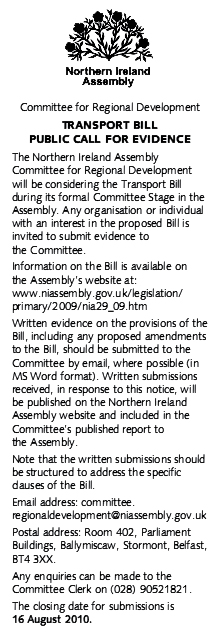
_20100915_-_Motion__fmt.jpeg)
Official Report (Hansard)
Monday 27 September 2010
Transport Bill:
Extension of Committee Stage
The Chairperson of the Committee for Regional Development (Mr Cobain): I beg to move
That, in accordance with Standing Order 33(4), the period referred to in Standing Order 33(2) be extended to 17 December 2010, in relation to the Committee Stage of the Transport Bill (NIA Bill 29/09).
Mr McGlone: On a point of order, Mr Deputy Speaker. There seems to be an increasing desire to extend the time on a number of Bills around the place for the Assembly. I note that other Bills are with the Executive. Of course, Members eagerly await a number of Bills coming to us from the Executive. Is there any indication at all that we will see the more efficient movement of those Bills to the Assembly?
Mr Deputy Speaker: My understanding is that that is a matter for the Committees.
The Chairperson of the Committee for Regional Development: The Committee Stage of the Transport Bill began on 30 June 2010. The Bill's aim is to create an efficient, effective and sustainable transport system. At Second Stage, I informed the House that the Committee for Regional Development did not oppose the principles of the Bill, and that remains the case.
Thus far in Committee, the Regional Development Committee has completed its public call for evidence, received departmental briefings and scheduled a stakeholder evidence-gathering event for 5 October 2010. Further departmental briefings are also scheduled. The Bill is complex, consisting of more than 50 clauses, the provision of which will have an impact on all citizens in Northern Ireland in determining their mode of transport and in considering sustainability.
To reflect the importance of what the Bill sets out to achieve and the need for robust and detailed scrutiny of all that the Bill entails, members seek to extend Committee Stage to 17 December 2010. That would allow Committee members time to take account of the contents of the Bill and the time to gather written evidence, hear oral evidence and compile and consider the Committee's report to the Assembly. The extension would also allow some leeway for detailed Committee consideration of the evidence received and of any amendments that it wishes to propose.
I reiterate the Committee's support for the Bill's principles. In seeking an extension of Committee Stage, members are, rightly, being prudent and cautious in their approach to discharging their scrutiny responsibilities. The Committee is committed to the timely passage of the Bill and will endeavour to report to the Assembly on the Bill as soon as possible, and, if possible, ahead of the proposed deadline of 17 December 2010. In the interim, I commend the motion to the House.
Question put and agreed to.
Resolved:
That, in accordance with Standing Order 33(4), the period referred to in Standing Order 33(2) be extended to 17 December 2010, in relation to the Committee Stage of the Transport Bill (NIA Bill 29/09).
_20101006_-_Transpo_fmt.jpeg)
_20101006_-_Transp_fmt1.jpeg)
_20101006_-_Transp_fmt2.jpeg)
_20101006_-_Transp_fmt3.jpeg)
_20101006_-_Transp_fmt4.jpeg)
_20101006_-_Transp_fmt5.jpeg)
_20101006_-_Transp_fmt6.jpeg)
_20101006_-_Transp_fmt7.jpeg)
_20101006_-_Transp_fmt8.jpeg)
_20101006_-_Transp_fmt9.jpeg)
_20101006_-_Trans_fmt10.jpeg)
_20101006_-_Trans_fmt11.jpeg)
_20101006_-_Trans_fmt12.jpeg)
_20101006_-_Trans_fmt13.jpeg)
_20101006_-_Trans_fmt14.jpeg)
_20101006_-_Trans_fmt15.jpeg)
_20101006_-_Trans_fmt16.jpeg)
_20101006_-_Trans_fmt17.jpeg)
_20101006_-_Trans_fmt18.jpeg)
_20101006_-_Trans_fmt19.jpeg)
_20101006_-_Trans_fmt20.jpeg)
_20101006_-_Trans_fmt21.jpeg)
_20101006_-_Trans_fmt22.jpeg)
_20101006_-_Trans_fmt23.jpeg)
_20101006_-_Trans_fmt24.jpeg)
_20101006_-_Trans_fmt25.jpeg)
_20101006_-_Trans_fmt26.jpeg)
_20101006_-_Trans_fmt27.jpeg)
_20101006_-_Trans_fmt28.jpeg)
_20101006_-_Trans_fmt29.jpeg)
_20101006_-_Trans_fmt30.jpeg)
_20101006_-_Trans_fmt31.jpeg)
_20101006_-_Trans_fmt32.jpeg)
_20101006_-_Trans_fmt33.jpeg)
_20101006_-_Trans_fmt34.jpeg)
_20101006_-_Trans_fmt35.jpeg)
_20101006_-_Trans_fmt36.jpeg)
_20101006_-_Trans_fmt37.jpeg)
_20101006_-_Trans_fmt38.jpeg)
_20101006_-_Trans_fmt39.jpeg)
_20101006_-_Trans_fmt40.jpeg)
_20101006_-_Trans_fmt41.jpeg)
_20101006_-_Trans_fmt42.jpeg)
_20101006_-_Trans_fmt43.jpeg)
_20101102_-_A_-_NIC_fmt.jpeg)
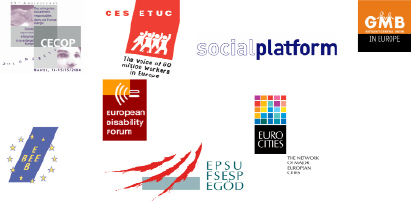
The European Union has just adopted two directives revising European rules on how public money is spent (Public Procurement Directives) – A General Directive combines public supplies, works and services (2004/18/EC), and the Utilities Directive covers energy, water, transport and postal services (2004/17/EC).
This guide has been developed by a group of European level non-governmental organisations in co-operation with European trade unions who have jointly campaigned within the EU institutions and EU Governments to strengthen the scope for considering social, employment, and disability, ethical and environmental issues throughout the public contracting procedure.
Our joint struggle has yielded several significant developments in the revised rules relating to these considerations, and it is vital that these achievements are fully embraced by implementing authorities in the Member States, and by public authorities in their contracting procedures. The guide seeks to emphasise that lowest price is not necessarily Best Value.
This guide is aimed at:
Though the guide sets out the scope for considering social and employment and environmental issues in different chapters, they should be considered jointly in an overall approach to developing a culture of achieving sustainable development goals through public procurement.
In the Annex to the document you will find the full text of the Articles and Recitals supporting the arguments we make in each section. Recitals provide the interpretative framework for the Directives. There is much of importance in these Recitals. When the provisions in the Articles of the Directives appear vague and ambivalent, the Recitals should be invoked to provide clarification. For example, where the Articles are not clear on use of reference to labour standards, the Recitals clarify that consideration of ILO Conventions and collective agreements is permitted.
Member states have 21 months from the date of publication in the Official Journal to implement Directives into national legislation i.e. by January 31 2006.
Public procurement rules relate to the procedures for the award of public supply, public service, public works and utilities contracts all over the European Union and the European Economic Area. Public procurement accounts for over 16% of the European Union's GDP equivalent to 1500 billion Euros. Moreover, it has a determining effect on certain sectors such as construction and public works, energy, telecommunications and heavy industry.
In addition to their economic importance, such rules have a direct impact on the daily lives of European citizens. It is through public procurement that decisions are made on public transport, building our schools, hospitals, and roads, making our towns and cities better places to live in, cleaning our schools and hospitals, as well as running their canteens, our water supplies, waste treatment, equipment of public offices, schools, hospitals etc.
Decisions taken by public authorities or entities responsible for public purchases of products, services, and works have a substantial impact on the environment, on social and employment conditions, and human rights in the local community and globally, as well as on health, and social inclusion of disadvantaged or discriminated groups, such as people with disabilities.
Provisions in public procurement legislation and their use might either favour or limit sustainable development, as they will affect an important share of the market. The possibility, for instance, to include requirements on noise reduction, CO2 emissions, respect for labour standards and working conditions, accessibility for people with reduced mobility, fair trade purchases, and employment of disadvantaged groups can contribute to greater sustainability and to changing practices both in the private and public sector. Public Procurement acts as a driver to industries to develop all their products or services according to the requirements of public authorities, rather than two lines of products or services, one environmentally sound or accessible and one not.
Public authorities have a major responsibility to ensure that all citizens can benefit from their investments, that they can live in healthy and environmentally sound community with a high level of social and employment protection and social inclusion. Moreover, neglecting these issues at the contracting stage of a project, often leads later to additional costs for public authorities.
A public authority's sustainable development strategy should not 'pick and choose' environmental over employment issues, but should develop an all encompassing culture, balancing all of these considerations in line with the draft EU Constitutional Treaty which sets the objectives that: The Union shall work for sustainable development of Europe based on balanced economic growth and price stability, a highly competitive social market economy, aiming at full employment and social progress, and with a high level of protection and improvement of the quality of the environment.
Public procurement is a key tool in delivering these goals and should be fully integrated into public authorities' sustainability strategies.
The revised Directives offer scope for contracting authorities to consider social, employment, ethical and environmental issues. The revision process has helped to clarify and strengthen the scope for considering such objectives. In the past, this scope was vague, and discouraged many public authorities from pursuing such objectives. For several of the brave, it lead to a generation of court cases (many of them helpful to our concerns) to clarify the rules, which have also helped to shape the revised Directives.
We are now in the national level implementation phase of applying these revised Directives with a deadline of 31 January 2006, and it is crucial that National and Regional Governments with the responsibility for implementing these provisions into their legal frameworks maximize the scope to include these considerations, and that public authorities develop their contracting procedures to ensure their use in practice.
Several aspects of the EU Directives offer Member States or public authorities' choices in applying certain provisions, and decision-makers should be urged to "gold-plate" the scope for extending the scope for applying social, employment, ethical and environmental considerations.
According to new rules, social, environmental, and ethical considerations can be included into the different stages of the public procurement procedure.
Social, employment, ethical, and environmental considerations can be taken into account in the final choice of a tender the award criteria, when an authority is deciding the most economically advantageous bid, now from the point of view of the contracting authority. Again these must be specified in the call for tender, and the Directive refers authorities to its base in European Court case law relating to the environmental and social area.
There are several references to environmental considerations in the new directives, which are also considered as an overarching theme, in line with EC Treaties provisions.
Following requirements of Article 6 of The Treaty, Recital 5 provides that "contracting authorities may contribute to the protection of the environment and the promotion of sustainable development" and Recital 6 states that the Directive should not prevent to protect animal and plant life.
These principles are spelled out in the provisions covering different phases of the public procurement procedure.
Technical specifications are all technical requirements, which are listed in the documents drafted by public authorities, constituting the call for tender. Such specifications can specify characteristics of materials, products, supplies or services.
The use of environmental characteristics in technical specifications is identified in article 23, and annex VI of the directives. Recital 29 provides further explanation.
Technical specifications may include environmental characteristics and may use for that purpose requirements that are laid down in eco-labels (Article 23 and Recital 29). These eco-labels might be European, multi-national or national. They must have been adopted through a procedure involving all relevant stakeholders, including environmental organisations, and be based on scientific information.
Technical specifications are further defined in Annex VI and shall include environmental performance levels, production processes and methods (Annex VI)
Environmental characteristics should take account of the entire life cycle of a product. Often the most important environmental impact occurs in the production phase. Apart from allowing public authorities to consider this, the Directives allow also for the use of eco-labels as selection criteria. National legislation should make differences between the different types of eco-labels. Full use should be made of the leeway given by the Directives in favour of Type I eco-labels. Type I eco-labels like European Flower, German Blue Angel, Nordic Swan a.o.m. have the advantage to provide quantitative criteria developed in multi-stakeholder processes and they put the producer under the obligation to either give detailed evidence on meeting the criteria or to have certified their products. Self-claims (Type II eco-labels) should not be recognized. Environmental declarations (Type III) should only be used if they are fulfilling the stricter options envisaged in ISO 14025, i.e.
|
These conditions may be imposed by public authorities and entities on companies which will have to respect them when they execute the contract. They must be indicated in the contract notice or in the specifications.
Article 26 states that authorities may lay down special conditions on performance of the contract and such conditions may concern environmental considerations.
These are further defined in Recital 33, which states that they may include conditions favouring the protection of the environment.
It is extremely important that public procurement subscribes generally to ecological principles. Many governments have clauses in their constitutions to claim for it and it should thus be reflected in the implementation of the Public Procurement Directives that public authorities should strive for sustainability. This should be indicated in the contract notices as e.g. in the following example. Timber products from legal and sustainable sources National legislation should favour, or insist on, timber products deriving from legal and sustainable sources. |
Both EU and WTO allow authorities to rule companies out of tenders on grounds that could include breach of international and national laws on forest management, harvesting and timber trade. In spite of restrictions imposed by EU and WTO rules, therefore, governments do have substantial scope to insist on timber products from legal and sustainable sources. To assist EU members in this, the EU Commission should revise its current guidance on procurement as soon as possible to remove all remaining ambiguity. It should also include specific guidance in relation to the procurement of timber products. At the same time, however, the EU's member states should not wait for clarification; they and other countries should seize the opportunity offered by their purchasing power to combat trade in illegal timber and to promote responsible forest management. Purchasing authorities would need to specify, in terms that could be evaluated objectively, what they meant by 'legal and sustainable' sources. Interpretation of 'Legal and Sustainable'The Scottish Executive has established criteria for 'legal' or 'sustainable'2. The policy requires purchasing authorities to ensure that suppliers provide documented or certified evidence under a credible scheme that demonstrates:
Where this requirement cannot be met, purchasers must obtain full assurance that the timber or timber product has come from a sustainably managed forest or a viable alternative. |
Companies submitting an offer for a tender may be excluded on the ground that they are not complying with legislation in force in the place where the contract will be enforced.
Contracting authorities may state in the contract documents, or be obliged to state by a Member State, information on fulfilment of obligations relating to environment protection provisions in force, in the State, region or locality where the works or services are carried out.
Companies submitting a tender should indicate that they have taken account in their proposal of these legal requirements (Article 27).
Candidates (tenderers) that have been the subject of a conviction by final judgement will be excluded from participation in public contracts. Conviction for breach of environmental legislation could mean exclusion from participation (Article 45).
When assessing in public works and public service contracts the company's technical abilities, an indication of the environmental measures that companies will be able to apply when performing a public contract will be considered (Article 48).
Contracting authorities can require companies to meet environmental management standards be it EMAS or the ISO standard through certificates delivered by independent bodies (Article 50 + Recital 44).
As an alternative to certification procedures, member States may draw an official list of companies meeting the requirements stated in Articles 45, 48 and 50 (Article 52).
National law should transpose the EU Directives requiring the tenderer to be in compliance with national, EU and international environmental legislation shall be a prerequisite before a purchasing authority decides awarding a contract to the tenderer. If the tenderer has been convicted on environmental crime, he shall be excluded from the process right away. EMAS registered and ISO 14001 certified companies have an environmental management system in place and can be presumed to have control of their environmental aspects. They merit to be given credit for it. This should be laid down in national legislation. Also other, more specialized standards, like forest management standards shall be recognized as long as they fulfil the requirements of Article 50. |
Environmental characteristics may be included as criteria on which the award of the contract is based when the choice is made on the basis of the tender 'most economically advantageous from the point of view of the contracting authority'.
Alternatively the contracting authority may choose a tender according to the lowest price offer.
The contracting authority will specify in the contract notice the order of importance of each of the criteria as well as the weighting criteria.
These criteria must be linked to the subject matter of the contract.
The Article must be read together with Recital 1 which states that the directives are based on case-law of the European Court of Justice on award criteria. In particular the European Court of Justice stated in the 'Helsinki Bus case' that the notion of "Most economically advantageous from the point of view of the contracting authority" can be related to the general interest of the Community interest. The Court ruling on the Helsinki Bus case[3] allows the award of the contract to be granted not only considering money terms but also taking account of value terms. In that case public authorities gave additional points to a company that offered buses emitting less noise and nitrogen oxides.
It is also important to note that if environmental criteria have been mentioned in the specifications of the contract, they can also be used as award criteria (Recital 46).
Concordia Bus Finland Oy Ab v Helsingin kaupunki and HKL-Bussiliikenne In its judgment of 17 September 2002 the ECJ ruled that "where, in the context of a public contract for the provision of urban bus transport services, the contracting authority decides to award a contract to the tenderer who submits the economically most advantageous tender, it may take into consideration ecological criteria such as the level of nitrogen oxide emissions or the noise level of the buses, provided that they are linked to the subject-matter of the contract, do not confer an unrestricted freedom of choice on the authority, are expressly mentioned in the contract documents or the tender notice, and comply with all the fundamental principles of Community law, in particular the principle of non-discrimination." Furthermore: [the Directive] cannot be interpreted as meaning that each of the award criteria used by the contracting authority to identify the economically most advantageous tender must necessarily be of a purely economic nature. It cannot be excluded that factors which are not purely economic may influence the value of a tender from the point of view of the contracting authority. That conclusion is also supported by the wording of the provision, which expressly refers to the criterion of the aesthetic characteristics of a tender." |
A contracting authority may include award criteria that are not of a purely economic nature, but they must be linked to the subject matter of the contract. This has to be made quite clear in national law. |
Social, employment and ethical considerations can be included in several phases of the contracting process. These vary from providing information and ensuring compliance relating to employment protection, working conditions, respect for ILO Conventions, support for longterm job seekers, and for the disadvantaged. Some of the provisions refer specifically to people with disabilities Overall, the revised Directives remove much of the past uncertainty in consideration of these issues, and we expect public authorities to embrace this clarity, and use the scope for considering these issues more extensively.
It is important nonetheless that framework provisions on social and employment aspects of the directive are broadened and made more explicit in national legislation. In several cases, Governments must decide how to implement certain requirements into national and regional rules. National and regional Government's should make these requirements compulsory while developing clear guidelines for their implementation and monitoring. The same recommendation applies to the need for introducing certification and quality labels to back up some of the requirements (for instance the possibility to meet contract performance conditions, or technical specifications for example relating to competence to ensure safe removal of asbestos) or to prove compliance with social legislation (employment conditions or employment quotas). |
Article 19 allows public authorities to reserve tenders for supported employment workplaces. (Article 19, recital 28, and Annex VII a).
This is a new Article and is a significant social issue. It gives contracting authorities the scope to positively support employment opportunities for disabled people, and will bring extensive benefits for disabled people, bring much needed, good quality work into supported employment factories and workplaces and programmes. As well as producing a large range of high specification manufactured goods such programmes are actively providing high quality services such as CCTV operators, information technology services, back office services, canteen and cleaning contracting, and public authorities and Governments should not underestimate the diversity of supplies, services and works that could be provided through reserved contract arrangements.
The Article recognises that a level playing field has to be created for sheltered workshops and/or sheltered employment programmes where most of the employees are disabled and cannot compete with commercial enterprises under normal conditions.
Recital 28 also specifies that public authorities may request companies winning a bid to perform their contract in the context of a sheltered employment contract.
If a public authority decides to reserve a tender to sheltered workshops on sheltered employment programmes, it must specify this in the contract notices. The provision applies for tenders from supported employment companies across the EU on an equal treatment basis.
It is important to ensure that the legislative framework adopted at national level obliges and encourages public authorities to make use of this opportunity. Public Authorities should work with providers to explore the wide range of high quality/high specification supplies, works and services that could be provided through this arrangement. We suggest including in national legislation, provisions obliging contracting authorities, who reach a certain number of contracts per year, to reserve a percentage of their public tenders or through establishing a threshold in terms of overall budget devoting to tendering to companies employing a majority of disabled persons. A system combining the two (percentage of overall number of contracts, and amount thresholds) would be also appropriate. |
Accessibility or design for all criteria for disabled persons can be included in the definition of technical specifications (requirements) of a contract bid, as established in article 23 and in Annex VI.
According to the article, accessibility criteria should be taken into account whenever possible. Design for all requirements and accessibility for disabled persons are also mentioned in Annex VI, which defines further the use of technical specifications.
Technical specifications may be also used as award criteria (when making the final choice of a tenderer) as outlined in recital 46.
Further explanation on the inclusion of accessibility or design for all criteria in technical specifications is included in Recital 29, where it is stated that these provisions should be clearly indicated.
Technical specifications and labour standards – though less clear, the case for inclusion of labour standards in the consideration of technical specifications is compelling, and should be given its fullest scope. Annex VI refers to characteristics….and conformity assessment, performance, safety or dimensions including procedures concerning quality assurance….production processes and methods. We would argue that the quality of the product and production method and process is affected by the labour standards applied during its production or provision (if a service), and we wish public authorities to establish this link, bringing in the Recital 33 reference to compliance with basic ILO standards. Would public authorities try to justify, for example, that the use of child labour in a production process for a product they had bought was an acceptable method of production? We think not, and therefore would like to see this consideration given the broadest consideration possible.
Conformity requirements relating to health and safety are also important considerations of technical specifications, for example in the safe removal of asbestos, gas fitting and maintenance, construction site safety including scaffolding etc. and should be a central consideration.
It is important that the reference to 'whenever possible' is interpreted in broad terms. Accessibility requirements should be defined as a general rule, and exceptions should be restricted to precise cases. National legislation should include clear guidelines on when public authorities should and may not take into account accessibility criteria. Consideration should be given to the inclusion of compliance with labour standards in the assessment of production processes and methods, as well as safety and quality assurance issues. Health and safety related conformity assessment should be a priority consideration in technical specifications. It is also critical that national legislation includes a definition of accessibility criteria for people with disabilities and design for all. Whenever a legislation at national or regional level imposes obligations on accessibility (for the built environment, products, services, etc..) across reference should be included in public procurement law. |
Public authorities may lay down special conditions on performance of the contract and such conditions may concern social considerations (Article 26).
Contract performance conditions are specified in Recital 33, which also includes a non-exhaustive list of social considerations. They may be intended to promote:
It is also possible to include requirements, which would be applicable during the performance of the contract:
Recital 34 also specifies that national legislation on employment, social security, health and safety as well as collective agreements must be applied in the performance of a contract. In cross border situations, the EU directive on posting of workers will apply. As tenders are EU wide, both domestic and non-domestic contractors must comply with these requirements. The fullest information relating to the details of the obligations to meet employment rights, working conditions and labour standards in force, by law or collective agreement, should be provided by contracting authorities.
The recital also clearly indicates that non-compliance with these provisions will lead to the exclusion of the bidding company.
It is crucial that this possibility is codified in national (or regional) legislation. In addition, the legislation should include a non-exhaustive list of social considerations (which can go beyond the list included in the EU directives), as well as guidelines on the use of social considerations and labour standards by contracting authorities. |
The new directives reinforce criteria for ensuring compliance with social legislation, and exclusion of companies in breach.
Contracting authorities may state in the contract documents, or be obliged to by a member state, the bodies for obtaining information on obligations relating to employment protection and working conditions in force in the place where the contract will be carried out. These obligations could be provisions covered by law or collective agreement, and this should be made clear. We would expect Member states and regional Governments implementing the legislation to oblige public authorities to state the bodies, but emphasise that contracting authorities can state the bodies for obtaining information regardless of whether prescribed in the implementing legislation, and in our view should do so.
Bidding companies have to indicate that they have taken account of these obligations (Article 27). This is not merely an information exercise, as these are conditions which "shall be applicable" to the works or services provided during the performance of the contract.
Suitability of Participants - Various articles in the Directives set out verification of suitability of participants relating to criminal records, bankruptcy etc., and scope for exclusion, (Articles 44-48).
Abnormally low (price) tenders - contracting authorities shall request further information on employment protection and working conditions in force at the place where the work, service or supply is performed (Article 55), before rejecting a tender on these grounds.
Finally Recital 43 indicates that companies found guilty by a public instance of breaching national provisions implementing EU legislation on non discrimination and equal treatment of workers, should be excluded from tenders.
National public procurement provisions should include the obligation for public authorities to state the body or bodies where information on employment protection and working conditions can be obtained, whilst recognising that public authorities can (and should) state this regardless of national provisions. Contracting authorities should ensure tenderers indicate in their tendering documents how they have taken into account key obligations (under law and collective agreements) in the area of employment protections, working conditions and health and safety. This should also include account of compliance with legislation on equal treatment and non-discrimination in access to employment. Contracting authorities should require a detailed declaration indicating awareness of the relevant employment protections, labour standards, and working conditions, as well as how they will apply them in the contract. |
The wording of the conditions for awarding contracts is now more subjective, in that it now states "most economically advantageous from the point of view of the contracting authority. (Article 53 (55)), as a choice, opposed to lowest price offer.
This opens up the scope for taking a wider view of Best Value, where consideration of sustainable development goals over the life of the product, or service may be considerably more economically advantageous than the lowest price offer. Awarding contracts to the lowest bidder, increases competitive pressure to present tight bids where tenderers squeeze staff levels below the level needed to provide a quality product, service or work; lower working conditions, training, and employment protections, which de-motivates workers and lowers the quality and productivity of their work, and encourages a high turn over of workers and difficulties in recruiting new workers. In the worst cases lowest price pressures can lead to illegal and unprofessional practices[4].
Though social considerations are not specifically included as award criteria in the Article itself, nevertheless, the list of criteria to consider most economically advantageous tenders in this Article is non-exhaustive. The political struggle that led to this compromise wording based much on the clarification of the Article based in Recital 1, and contracting authorities should apply this crucial clarification to its interpretation of the Article. Specifically, the Recital states that the Directives are based on Court of Justice case-law "which clarifies the possibilities for contracting authorities to meet the needs of the public concerned, including in the environmental and/or social area, provided they are linked to the subject of the contract"
Specifically, the case-law would include the Nord-pas-Calais case on long-term unemployed and the Helsinki Bus case on community interest in reducing pollution).
In the judgement of the Nord Pas de Calais case[5], the Court stated that the use of an award criteria relating to the fight against unemployment is legitimate as long as it is expressly mentioned in the tender documents.
In our view, this revised wording and inclusion of Recital 1 allows contracting authorities to argue that, from its subjective point of view, social and employment considerations are economically advantageous, and meet the needs of the public concerned.
Furthermore, Recital 46 states that contracting authorities may use criteria aimed at meeting social requirements in response to the needs of particularly disadvantaged groups of people to which those receiving/using the works, supplies or services, which are the object of the contract belong.
The wording in the article is ambiguous and unclear. What should be retained is the possibility for contracting authorities to use social considerations.
National or regional implementing legislation should maximise and encourage the scope for contracting authorities to apply social and employment criteria as far as the revised rules allow. Belgium has already included in their procurement legislation social and ethical criteria in the corresponding article on the award criteria. Also such provisions exist in a number of regional Governments' legislation. It is important that such examples are followed. Contracting authorities could provide a list of examples of social considerations they consider to be linked to the subject matter of the contract, and which they deem to be economically advantageous. |
Contracting authorities that wish to define environmental requirements for the technical specifications of a given contract may lay down the environmental characteristics, such as a given production method, and/or specific environmental effects of product groups or services. They can use, but are not obliged to use appropriate specifications that are defined in ecolabels, such as the European Eco-label, (multi-)national eco-labels or any other eco-label providing the requirements for the label are drawn up and adopted on the basis of scientific information using a procedure in which stakeholders, such as government bodies, consumers, manufacturers, distributors and environmental organisations can participate, and providing the label is accessible and available to all interested parties.
Contracting authorities should, whenever possible, lay down technical specifications so as to take into account accessibility criteria for people with disabilities or design for all users. The technical specifications should be clearly indicated, so that all tenderers know what the requirements established by the contracting authority cover."
Article 23 (Article 34)Technical specifications 1. The technical specifications as defined in point 1 of Annex VI shall be set out in the contract documentation, such as contract notices, contract documents or additional documents. Whenever possible these technical specifications should be defined so as to take into account accessibility criteria for people with disabilities or design for all users. ….. 3. Without prejudice to mandatory national technical rules, to the extent that they are compatible with Community law, the technical specifications shall be formulated: (a) either by reference to technical specifications defined in Annex VI and, in order of preference, to national standards transposing European standards, European technical approvals, common technical specifications, international standards, other technical reference systems established by the European standardisation bodies or - when these do not exist - to national standards, national technical approvals or national technical specifications relating to the design, calculation and execution of the works and use of the products. Each reference shall be accompanied by the words "or equivalent"; (b) or in terms of performance or functional requirements; the latter may include environmental characteristics. …. |
6. Where contracting authorities lay down environmental characteristics in terms of performance or functional requirements as referred to in paragraph 3(b) they may use the detailed specifications, or, if necessary, parts thereof, as defined by European or (multi-) national eco-labels, or by and any other eco-label, provided that:
……….. |
For the purposes of this Directive:
(a) "technical specification", in the case of public works contracts, means the totality of the technical prescriptions contained in particular in the tender documents, defining the characteristics required of a material, product or supply, which permits a material, a product or a supply to be described in a manner such that it fulfils the use for which it is intended by the contracting authority. These characteristics shall include levels of environmental performance, design for all requirements (including accessibility for disabled persons) and conformity assessment, performance, safety or dimensions, including the procedures concerning quality assurance, terminology, symbols, testing and test methods, packaging, marking and labelling and production processes and methods. They shall also include rules relating to design and costing, the test, inspection and acceptance conditions for works and methods or techniques of construction and all other technical conditions which the contracting authority is in a position to prescribe, under general or specific regulations, in relation to the finished works and to the materials or parts which they involve;
(b) "technical specification", in the case of public supply or service contracts, means a specification in a document defining the required characteristics of a product or a service, such as quality levels, environmental performance levels, design for all requirements (including accessibility for disabled persons) and conformity assessment, performance, use of the product, safety or dimensions, including requirements relevant to the product as regards the name under which the product is sold, terminology, symbols, testing and test methods, packaging, marking and labelling, user instructions, production processes and methods and conformity assessment procedures;
Contract performance conditions are compatible with this Directive provided that they are not directly or indirectly discriminatory and are indicated in the contract notice or in the contract documents. They may, in particular, be intended to favour on-site vocational training, the employment of people experiencing particular difficulty in achieving integration, the fight against unemployment or the protection of the environment. For instance, mention may be made, amongst other things, of the requirements - applicable during performance of the contract - to recruit long-term job-seekers or to implement training measures for the unemployed or young persons, to comply in substance with the provisions of the basic International Labour Organisation (ILO) Conventions, assuming that such provisions have not been implemented in national law, and to recruit more handicapped persons than are required under national legislation.
In appropriate cases, in which the nature of the works and/or services justifies applying environmental management measures or schemes during the performance of a public contract, the application of such measures or schemes may be required. Environmental management schemes, whether or not they are registered under Community instruments such as Regulation (EC) No 761/2001(17) (EMAS), can demonstrate that the economic operator has the technical capability to perform the contract. Moreover, a description of the measures implemented by the economic operator to ensure the same level of environmental protection should be accepted as an alternative to environmental management registration schemes as a form of evidence.
Conditions for performance of contracts
Contracting authorities may lay down special conditions relating to the performance of a contract, provided that these are compatible with Community law and are indicated in the contract notice or in the specifications. The conditions governing the performance of a contract may, in particular, concern social and environmental considerations.
The laws, regulations and collective agreements, at both national and Community level, which are in force in the areas of employment conditions and safety at work apply during performance of a public contract, providing that such rules, and their application, comply with Community law. In cross-border situations, where workers from one Member State provide services in another Member State for the purpose of performing a public contract, Directive 96/71/EC of the European Parliament and of the Council of 16 December 1996 concerning the posting of workers in the framework of the provision of services (11) lays down the minimum conditions which must be observed by the host country in respect of such posted workers. If national law contains provisions to this effect, noncompliance with those obligations may be considered to be grave misconduct or an offence concerning the professional conduct of the economic operator concerned, liable to lead to the exclusion of that economic operator from the procedure for the award of a public contract.
……
Non-observance of national provisions implementing the Council Directives 2000/78/EC and 76/207/EEC concerning equal treatment of workers, which has been the subject of a final judgment or a decision having equivalent effect may be considered an offence concerning the professional conduct of the economic operator concerned or grave misconduct.
Obligations relating to taxes, environmental protection, employment protection provisions and working conditions
1. A contracting authority may state in the contract documents, or be obliged by a Member State so to state, the body or bodies from which a candidate or tenderer may obtain the appropriate information on the obligations relating to … employment protection provisions and to the working conditions which are in force in the Member State, region or locality in which the works are to be carried out or services are to be provided and which shall be applicable to the works carried out on site or to the services provided during the performance of the contract.
2. A contracting authority which supplies the information referred to in paragraph 1 shall request the tenderers or candidates in the contract award procedure to indicate that they have taken account, when drawing up their tender, of the obligations relating to employment protection provisions and the working conditions which are in force in the place where the works are to be carried out or the service is to be provided. The first subparagraph shall be without prejudice to the application of the provisions of Article 55 concerning the examination of abnormally low tenders.
Personal situation of the candidate or tenderer
1. Any candidate or tenderer who has been the subject of a conviction by final judgment of which the contracting authority is aware for one or more of the reasons listed below shall be excluded from participation in a public contract:
…………
For the purposes of this paragraph, the contracting authorities shall, where appropriate, ask candidates or tenderers to supply the documents referred to in paragraph 3 and may, where they have doubts concerning the personal situation of such candidates or tenderers, also apply to the competent authorities to obtain any information they consider necessary on the personal situation of the candidates or tenderers concerned. Where the information concerns a candidate or tenderer established in a State other than that of the contracting authority, the contracting authority may seek the cooperation of the competent authorities.
2. Any economic operator may be excluded from participation in a contract where that economic operator:
(c) has been convicted by a judgment which has the force of res judicata in accordance with the legal provisions of the country of any offence concerning his professional conduct;
3. Contracting authorities shall accept the following as sufficient evidence….:
(a) as regards paragraphs 1 and 2(a), (b) and (c), the production of an extract from the "judicial record" or, failing that, of an equivalent document issued by a competent judicial or administrative authority in the country of origin or the country whence that person comes showing that these requirements have been met;
(b) as regards paragraph 2(e) and (f), a certificate issued by the competent authority in the Member State concerned.
they may be replaced by a declaration on oath or, by a solemn declaration made by the person concerned before a competent judicial or administrative authority, a notary or a competent professional or trade body, in the country of origin or in the country whence that person comes.
4. Member States shall designate the authorities and bodies competent to issue the documents, certificates or declarations referred to in paragraph 3 and shall inform the Commission thereof. Such notification shall be without prejudice to data protection law.
Article 48
Technical and/or professional ability
1. The technical and/or professional abilities of the economic operators shall be assessed and examined in accordance with paragraphs 2 and 3.
2. Evidence of the economic operators' technical abilities may be furnished by one or more of the following means according to the nature, quantity or importance, and use of the works, supplies or services:
……………
(f) for public works contracts and public services contracts, and only in appropriate cases, an indication of the environmental management measures that the economic operator will be able to apply when performing the contract
Environmental management standards
Should contracting authorities, in the cases referred to in Article 48(2)(f), require the production of certificates drawn up by independent bodies attesting the compliance of the economic operator with certain environmental management standards, they shall refer to the Community Eco-Management and Audit Scheme (EMAS) or to environmental management standards based on the relevant European or international standards certified by bodies conforming to Community law or the relevant European or international standards concerning certification. They shall recognise equivalent certificates from bodies established in other Member States. They shall also accept other evidence of equivalent environmental management measures from economic operators.
Official lists of approved economic operators and certification by bodies established under public or private law
1. Member States may introduce either official lists of approved contractors, suppliers or service providers or certification by certification bodies established in public or private law….
Abnormally low tenders
1. If, for a given contract, tenders appear to be abnormally low in relation to the goods, works or services, the contracting authority shall, before it may reject those tenders, request in writing details of the constituent elements of the tender which it considers relevant.
Those details may relate in particular to:
….
(d) compliance with the provisions relating to employment protection and working conditions in force at the place where the work, service or supply is to be performed;
Recital 1 (Recital 1)
….This Directive is based on Court of Justice case-law, in particular case-law on award criteria, which clarifies the possibilities for the contracting authorities to meet the needs of the public concerned, including in the environmental and/or social area, provided that such criteria are linked to the subject-matter of the contract, do not confer an unrestricted freedom of choice on the contracting authority, are expressly mentioned and comply with the fundamental principles mentioned in recital 2.
Under Article 6 of the Treaty, environmental protection requirements are to be integrated into the definition and implementation of the Community policies and activities referred to in Article 3 of that Treaty, in particular with a view to promoting sustainable development. This Directive therefore clarifies how the contracting authorities may contribute to the protection of the environment and the promotion of sustainable development, whilst ensuring the possibility of obtaining the best value for money for their contracts.
Contracts should be awarded on the basis of objective criteria which ensure compliance with the principles of transparency, non-discrimination and equal treatment and which guarantee that tenders are assessed in conditions of effective competition….. a contracting authority may use criteria aiming to meet social requirements, in response in particular to the needs - defined in the specifications of the contract - of particularly disadvantaged groups of people to which those receiving/using the works, supplies or services which are the object of the contract belong.
……………….
Where the contracting authorities choose to award a contract to the most economically advantageous tender, they shall assess the tenders in order to determine which one offers the best value for money. In order to do this, they shall determine the economic and quality criteria which, taken as a whole, must make it possible to determine the most economically advantageous tender for the contracting authority. The determination of these criteria depends on the object of the contract since they must allow the level of performance offered by each tender to be assessed in the light of the object of the contract, as defined in the technical specifications and the value for money of each tender to be measured.
In order to guarantee equal treatment, the criteria for the award of the contract should enable tenders to be compared and assessed objectively. If these conditions are fulfilled, economic and qualitative criteria for the award of the contract, such as meeting environmental requirements, may enable the contracting authority to meet the needs of the public concerned, as expressed in the specifications of the contract.
Contract award criteria
1. Without prejudice to national laws, regulations or administrative provisions concerning the remuneration of certain services, the criteria on which the contracting authorities shall base the award of public contracts shall be either:
(a) when the award is made to the tender most economically advantageous from the point of view of the contracting authority, various criteria linked to the subject-matter of the public contract in question, for example, quality, price, technical merit, aesthetic and functional characteristics, environmental characteristics, running costs, cost-effectiveness, after-sales service and technical assistance, delivery date and delivery period or period of completion, or (b) the lowest price only.
2. Without prejudice to the provisions of the third subparagraph, in the case referred to in paragraph 1(a) the contracting authority shall specify in the contract notice or in the contract documents or, in the case of a competitive dialogue, in the descriptive document, the relative weighting which it gives to each of the criteria chosen to determine the most economically advantageous tender.
Those weightings can be expressed by providing for a range with an appropriate maximum spread.
Where, in the opinion of the contracting authority, weighting is not possible for demonstrable reasons, the contracting authority shall indicate in the contract notice or contract documents or, in the case of a competitive dialogue, in the descriptive document, the criteria in descending order of importance
Employment and occupation are key elements in guaranteeing equal opportunities for all and contribute to integration in society. In this context, sheltered workshops and sheltered employment programmes contribute efficiently towards the integration or reintegration of people with disabilities in the labour market. However, such workshops might not be able to obtain contracts under normal conditions of competition. Consequently, it is appropriate to provide that Member States may reserve the right to participate in award procedures for public contracts to such workshops or reserve performance of contracts to the context of sheltered employment programmes
Reserved contracts
Member States may reserve the right to participate in public contract award procedures to sheltered workshops or provide for such contracts to be performed in the context of sheltered employment programmes where most of the employees concerned are handicapped persons who, by reason of the nature or the seriousness of their disabilities, cannot carry on occupations under normal conditions.
The contract notice shall make reference to this provision.
Open and restricted procedures, competitive dialogues, procedures, negotiated procedures:
….
2. Where appropriate, indicate whether the public contract is restricted to sheltered workshops, or whether its execution is restricted to the framework of protected job programmes.
Please send us examples of good practice for including environmental, social, and ethical considerations into public contracting rules!
[1] Directive 2004/18/EC of the European parliament and of the Council on the coordination of procedures for the award of public work contracts, public supply contracts and public service contracts, (O.J. L 134, 30.4.2004) and Directive 2004/17/EC of the European Parliament and of the Council of 31 March 2004 coordinating the procurement procedures of entities operating in the water, energy, transport and postal services sectors (O.J. L 134 30.4.2004).
[2] The Scottish Executive's procurement policy can be found at
http://www.scotland.gov.uk/about/FCSD/PCSD-POL/00017839/procpolicy.aspx
[3] Judgment of the Court of Justice in Case C-513/99; Concordia Bus Finland Oy Ab v Helsingin kaupunki and HKL-Bussiliikenne
[4] In the cleaning sector, the European Employers, EFCI, and trade unions, UNI Europa have produced a guide and joint social partner declaration on "Selecting Best Value for the public procurement of cleaning services" 4 seeking to encourage public authorities to look beyond lowest price to avoid driving companies with high social and environmental standards out of the market place to be replaced by a corral of cowboys, incapable of providing the quality and sustainable goods, services and works that tax payers deserve. See website www.union-network.org
[5] Commission vs France, case C-225/98.
[6] the numbering and text of the Articles refers to directive on the coordination of procedures for the award of public works contracts, public supply contracts and public service contracts. Numbering of the directive relating to energy, water, and transport are referred to in brackets.
_20101102_-_Consum_fmt.jpeg)
_20101102_-_Consu_fmt1.jpeg)
_20101102_-_Consu_fmt2.jpeg)
Committee for Health Social Services and Public Safety
Room 410
Parliament Buildings
From: Clerk to the Committee for Health Social Services and Public Safety
To: Clerk to the Committee for Regional Development
Date: 10th December 2010
Subject: Response from the Minister for Health Social Services and Public Safety – proposed changes to the Mental Health (NI) Order 1986.
At its meeting on 11th November 2010, the Committee for Health, Social Services and Public Safety considered a response from the Minister for Health Social Services and Public Safety to your correspondence regarding proposed changes to the Mental Health (NI) Order 1986.
The Committee agreed that I should forward this to you for consideration by your committee.
_Response_from_Min_fmt.jpeg)
_Response_from_Mi_fmt1.jpeg)
Appendix 7
The following Assembly Committees, Government Departments and stakeholders organisations were specifically invited to provide written evidence to the Committee during its call for evidence on the Transport Bill